
Title: The Corsair in the war zone
Author: Ralph Delahaye Paine
Release date: January 20, 2024 [eBook #72760]
Language: English
Original publication: Boston: Houghton Mifflin company, 1920
Credits: Bob Taylor, Peter Becker and the Online Distributed Proofreading Team at https://www.pgdp.net (This file was produced from images generously made available by The Internet Archive)


THE CORSAIR RESCUES THE CREW OF THE SINKING CALIFORNIAN
(page 234)
BY
RALPH D. PAINE
AUTHOR OF “THE FIGHTING FLEETS”
With Illustrations

BOSTON AND NEW YORK
HOUGHTON MIFFLIN COMPANY
The Riverside Press Cambridge
1920
COPYRIGHT, 1920, BY JOHN PIERPONT MORGAN
ALL RIGHTS RESERVED
[Pg vii]
| I. | The Call of Duty Overseas | 1 |
| II. | “Lafayette, we are here!” | 29 |
| III. | At Sea with the Breton Patrol | 55 |
| IV. | Tragedies and Rescues | 76 |
| V. | When the Antilles went down | 101 |
| VI. | Admiral Wilson comes to Brest | 122 |
| VII. | Smashed by a Hurricane | 146 |
| VIII. | The Pleasant Interlude at Lisbon | 174 |
| IX. | Uncle Sam’s Bridge of Ships | 198 |
| X. | The Corsair stands by | 225 |
| XI. | In the Radio-Room | 251 |
| XII. | The Long Road Home | 266 |
| XIII. | Honorably Discharged | 289 |
| XIV. | The Ship’s Company | 296 |
[Pg ix]
| The Corsair rescues the Crew of the Sinking Californian | Frontispiece |
| Admiral H. B. Wilson, commanding the U.S. Naval Forces in France | 4 |
| Commander Theodore A. Kittinger, U.S.N., commanding U.S.S. Corsair | 10 |
| Lieutenant Commander William B. Porter, later commanding U.S.S. Corsair, and Lieutenant Robert E. Tod, Navigator | 16 |
| Fitting the Corsair for the War Zone | 22 |
| Number Two Gun Crew on Watch | 26 |
| They are All Sea Dogs together | 26 |
| Some of the Officers and Crew, before leaving New York | 32 |
| With America’s First Convoy: Troop-Ships Henderson, Antilles, Momus, and Lenape | 38 |
| The Mine functions and a Lurking U-Boat would find it excessively Unhealthy | 38 |
| The Kind of “Gobs” the Country was proud of | 44 |
| The German Submarine was a Tiny Target even when on the Surface | 44 |
| Boatswain’s Mate Seger, from Passaic | 50 |
| Pharmacist’s Mate Feeley and Mess Attendant Martinez | 50 |
| Winning Boat Crew in Fourth of July Race with Aphrodite | 56 |
| “The Bridge Gang” | 56[Pg x] |
| Starting the Swimming Race from a Mooring Buoy | 62 |
| Water Sports on the Fourth of July: The Race between Life-Rafts with Coal Shovels for Paddles | 62 |
| A Wet Day for the Deck Watch | 66 |
| French and Underhill are dolled up for the Camera | 66 |
| The Burning American Schooner Augustus Weld | 70 |
| From the Corsair’s Main-Top: The Convoy steams out | 70 |
| “Coal on the Corsair, Fill every bin. We work like hell, boys, Till it’s all in” | 74 |
| A French Fishing-Smack which dared the Ruthless Warfare | 78 |
| The S.S. Manto, which sped through the War Zone At Five Knots | 78 |
| A Group of Chief Petty Officers | 84 |
| A Liberty Party at Brest | 84 |
| The Gunner’s Mates and the Long Row of Depth Charges ready to plop over the Stern | 88 |
| Another View of the Mine Track, showing the Y Gun or Double Mortar | 88 |
| French Fishermen who were set adrift | 92 |
| The Castaways find a Hearty Welcome on the Corsair | 92 |
| Gunner’s Mates Barko and Moore, and a Depth Charge | 98 |
| Watching the Aphrodite go out on Patrol | 98 |
| Engineering Force of the Corsair | 102 |
| Lieutenant J. J. Patterson, Engineer Officer, and [Pg xi]his Husky “Black Gang” | 102 |
| A Boat-Load of Survivors from the Antilles coming alongside | 106 |
| Naval Officers rescued from the Antilles, with General McNair, U.S.A. | 106 |
| The Antilles crowded with Troops on her Last Voyage to France | 110 |
| The Alcedo picks up the Antilles Survivors | 110 |
| The Corsair drops a Mine and shakes up Fritz | 114 |
| The Finland, just after she was torpedoed | 118 |
| Destroyer Preston, which was caught in the Hurricane and also found Refuge at Lisbon | 118 |
| Chief Yeoman Paulson | 122 |
| Gunner’s Mate Wiley | 122 |
| Bucking into the Winter Seas | 128 |
| She takes ’em aboard Green | 128 |
| The Ship’s Cooks and the Wardroom Steward | 134 |
| The Noble Job of peeling “Spuds” | 134 |
| Boatswain’s Mate Houtz in the Navy’s Storm Clothes | 140 |
| Swollen Sea, from the Forward Crow’s-Nest | 140 |
| A Letter from Home: Coaling Ship must wait | 144 |
| Carroll Bayne gets his Ensign’s Commission | 144 |
| How the Hurricane Seas pounded the Yacht: “The Poor Old Ship was a Mess” | 150 |
| What was left of the Emergency Wheel | 156 |
| When the Hurricane slapped the Windows | 156 |
| Assistant Engineer Hawthorn and his Watch | 160 |
| The Crew of Number Three Gun | 160 |
| Temporary Repairs, after the Hurricane | 164 |
| What the Forward Deck-House looked like while running for Lisbon | 164[Pg xii] |
| Cleaning up at Lisbon, after the Hurricane | 172 |
| Lisbon Harbor and the Tug that towed the Corsair to the Dockyard | 176 |
| The American Legation at Lisbon where the Corsair’s Crew found a Home | 176 |
| The Corsair in Drydock at Lisbon | 182 |
| At her Mooring Buoy, Brest | 182 |
| “Doc” Laub agrees that “this is the Life if you don’t weaken” | 188 |
| Coxswain Dave Tibbott waits with the Launch | 188 |
| The Cheery French Pilot, Lieutenant Mejeck | 194 |
| Chief Quartermaster Benton | 194 |
| The Home of the American Naval Officers’ Club in Brest | 200 |
| American Yachts clustered inside the Breakwater, Brest | 206 |
| The Faithful Wakiva, which was sunk in Collision | 212 |
| Big Transports in Brest Harbor | 212 |
| Chief Quartermaster Farr stands with Folded Arms and indicates that he has his Sea-Legs with him | 216 |
| Commander Kittinger says Good-Bye to Lieutenant Commander Porter as the Latter takes over the Command | 216 |
| Lieutenant Schanze, Ensign Gray, Lieutenant Commander Porter, Chief Engineer Hutchison, Commander Kittinger, and Lieutenant McGuire | 220 |
| At Rosyth: Lieutenant Nolan, Dr. Agnew, Commander Porter, Lieutenant McGuire, Ensign Acorn, Lieutenant Patterson, Ensign Wangerin, and Paymaster Erickson | 220[Pg xiii] |
| Rolling out to find a Convoy | 226 |
| A Little Water on Deck | 226 |
| The Sinking Californian: Going, Going, Almost Gone! | 232 |
| Californian Survivors aboard the Corsair | 232 |
| A Mascot from the Californian, known as “The Mutt” | 238 |
| The Newfoundland Pup saved from the French Fishing Bark | 238 |
| The Dagfin, broken down and helpless. The Corsair stands by | 244 |
| Admiral Henry T. Mayo, Commander-in-Chief of the Atlantic Fleet | 248 |
| H. A. Breckel, Chief Radio Operator | 256 |
| Electricians Swan and Plummer, of the highly Efficient Radio Gang | 256 |
| At the Emergency Wheel: Heavy Weather Offshore | 262 |
| The Trim, Immaculate Navy Man: After Coaling Ship | 262 |
| Boatswain’s Mate French bought a Pet Parrot in Lisbon | 268 |
| “Tommy,” the Ship’s Cat, who finished strong in the Hurricane | 268 |
| “Teddy,” who was given a Military Funeral when he swallowed a Nail | 268 |
| With the Grand Fleet at Rosyth | 274 |
| Surrendered German Submarines tied up at Portland | 274 |
| The Corsair at Queenstown as Flagship of Admiral Sims | 278[Pg xiv] |
| Seaman Henry Barry, before they wished Another Job on him | 282 |
| Gunner’s Mate Simpson hopes to spot that Sub | 282 |
| The Homeward-Bound Pennant: “We’re off for Little Old New York, thank God” | 286 |
| The Corsair when in Commission as a Yacht before the War | 290 |
| Admiral William S. Sims, commanding the U.S. Naval Forces in European Waters | 294 |
| Map showing the Corsair’s Wanderings in the War Zone | 304 |
[Pg xv]
[Pg 1]
THE CORSAIR
IN THE WAR ZONE

The task of the American Navy in the great conflict was performed exceedingly well, but so very quietly that even now the merits of the achievement are realized only by those who knew how near the German submarine campaign came to winning the war. There was no blacker period than the spring of 1917 when the losses of Allied merchant shipping were mounting toward a million tons a month, and the Admiralty was well aware that England stood face to face with starvation and defeat unless this piracy could soon be checked. It was when Admiral Sims cabled to his own Government, from London, “Briefly stated, I consider that at the present moment we are losing the war”; when Admiral Jellicoe privately admitted, “It is impossible for us to go on if losses like this continue”; and when Lord Balfour could see no escape from the same tragic conclusion.
The facts were purposely concealed from the people of both countries, and even after the declaration of war the attitude of the American mind[Pg 2] was all too leisurely, while the British grimly hung on and tightened their belts with the tenacity of the breed. The battleship squadrons of the Grand Fleet still dominated the surface of the Seven Seas, but they were helpless to aid in this vital problem. It was perceived that the chief hope of salvation was in massing destroyers to protect the converging trade routes of the Irish Sea and the English Channel and thereby increasing the supply of food and material. For this service the British Navy was able to spare a flotilla of less than a score of these craft, a patrol force obviously inadequate. These were the reasons why the fleet of thirty-five fast and powerful American destroyers was sent across the Atlantic, and why Queenstown was chosen as the strategic base port.
As soon as the troop-ships began to move overseas, these destroyers were able to extend their operations and to help guard and escort the convoys through the Bay of Biscay to the coast of France. Meanwhile another urgent situation had developed and an appeal no less insistent had been conveyed to Washington. The navy of France was mostly in the Mediterranean where it properly belonged, and the small patrol force off the stormy shores of Brittany was racked, weary, almost discouraged. Thousands of French sailors had been sent from the ships and bases to fight in the trenches. The little torpedo boats and trawlers were unable to cope with the U-boats which ran amuck among the[Pg 3] precious coastwise convoys or intercepted the ships that were homeward bound from distant voyages.
France was magnificent, but her maritime strength in the Atlantic was almost spent. To safeguard the approaches to her ports in which American regiments and divisions were to be landed, hundreds of thousands of men, with their mountains of supplies, was more than she could attempt. Help was needed and the American Navy was eager to respond, but no more destroyers were available. It was necessary to retain a certain number of them in home waters as units of the fighting fleet of big ships which was held in readiness for whatever emergency the war might suddenly unfold. To France, therefore, the Navy was compelled to send whatever it could lay hands on at short notice, planning to reinforce this vanguard with destroyers as fast as they could be launched and commissioned.
In these circumstances the only ships which could be hastily fitted out and sent across were the larger yachts, about twenty in number, whose owners had enrolled and offered them for service when the war clouds were gathering. It had been expected that these pleasure craft, with their volunteer officers and crews, would be used only in the coastal patrol areas and not for duty in the war zone, and in the naval organization they were defined as belonging to “Class IV,” which had a limited field of operation. This was no obstacle, it is needless to say, for when the greater opportunity[Pg 4] offered, the amateur bluejackets who manned these yachts were eager to shift into “Class II,” or combatant ships, and to sign on for the adventure in the war zone.
The story of one of these yachts which bravely endured almost two years of battering service in foreign waters is more than a record of a single ship, for it will convey, I hope, something of the spirit and the experiences which they all shared together and which the Navy at large regards with pride as worthy of its traditions. These ships were flung into work for which they were presumably unfitted, into a kind of warfare which was wholly novel, and they sailed with crews who were mostly greenhorns, but they passed the test with flying colors and their admiral who commanded the American Naval Forces in France took pleasure in writing, not long ago:
U.S.S. Pennsylvania
New York, N.Y.
8 September, 1919
My dear Mr. Paine:
I am glad that you are to write the war story of the Corsair because the story of the yachts that came to France in 1917 is well worthy of record. These vessels, designed for pleasure and manned, in large part, by officers and men of little naval training, but of unconquerable spirit, were by peculiar circumstances given an important rôle in the war.
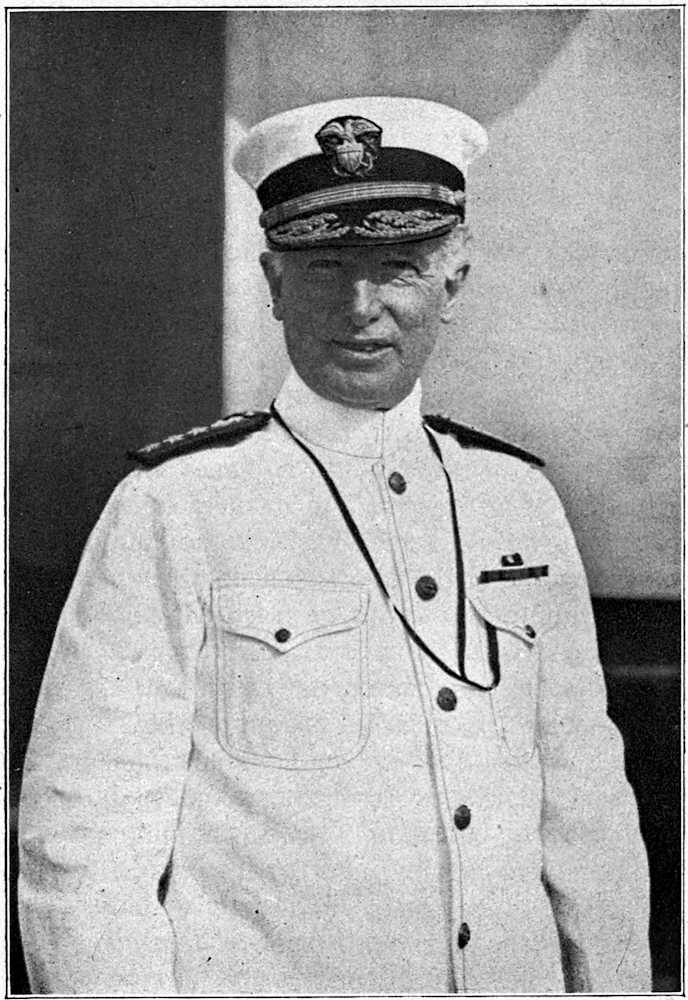
Copyright by Underwood and Underwood, N.Y.
ADMIRAL H. B. WILSON, COMMANDING THE U.S. NAVAL FORCES IN FRANCE
Because of the lack of destroyers, the yachts contributed a large share of the American naval effort on the French coast during the summer and fall of 1917—trying months of the submarines’ greatest activity. [Pg 5]Their work then and subsequently, whether on troop and store-ship escort in the Bay of Biscay, convoy escort through the difficult coastal channels of France, or on the Gironde convoys, was frequently hazardous and was always well done.
Very sincerely
H. B. Wilson
(Admiral, U.S. Navy)
Such was the “Suicide Fleet” as it was dubbed by certain pessimists who were later compelled to eat their words. Of these yachts one of the largest and fastest was the Corsair, owned by J. Pierpont Morgan, and the second of her name to fly the pennant of the American Navy in war-time. The first Corsair was renamed the Gloucester and won a well-deserved renown at Santiago in 1898, under Lieutenant Commander Richard Wainwright, who engaged two Spanish destroyers, driving one ashore and sinking the other in the most brilliant single exploit of that battle. In size and armament either destroyer was more than a match for the converted yacht, called a gunboat by courtesy, whose main battery consisted of four six-pounders. This was the kind of blue-water warfare which American sailors would have vastly preferred in 1917, ship to ship, between honorable foemen, as navies had fought in days gone by.
The contrast between the naval careers of these two Corsairs is wide and significant. The older ship had known what to expect, a certain chivalry of the sea which had never been obscured, even when[Pg 6] men slew each other with cutlass and boarding-pike upon reddened decks. It was exemplified in the conduct of the Spanish Admiral Cervera, and reflected in the behavior of Captain “Jack” Phillip of the Texas when he shouted to his bluejackets in the moment of victory, “Don’t cheer, boys. The poor devils are dying.”
The Corsair of twenty years later was to sail against an enemy who skulked beneath the sea with malice toward all and mercy toward none, who counted women and children as fair prey in war, and whose trail was marked by the agonies of unarmed and helpless castaways adrift in open boats.
This Corsair was no fragile, fair-weather yacht whose cruises had been confined to sheltered reaches, but a powerful ship familiar with the Atlantic in all seasons. She was no longer young, as vessels go, with eighteen years of service to her credit, but the Lloyd’s surveyor rated her as staunch and sound in every respect. As a yacht the Corsair had made six voyages to Europe, while owned by the late J. Pierpont Morgan, and her shapely lines were known to mariners from the Channel ports to the Mediterranean and the Golden Horn.
A faithful ship which has long withstood the ordeals of the sea becomes something more than a mere fabric of steel and wood. She seems almost sentient, like a living thing to those who have shared her fortunes, and therein is the immemorial romance which the sea peculiarly vouchsafes. It is[Pg 7] obvious to sailor-men that these many years of fidelity, in winter gales and summer breezes, should have endeared the Corsair to her owners, father and son.
Designed by J. Beavor Webb, the yacht was built for offshore work, although not with the expectation that she would be used as a “fourth-rate gunboat” in the Bay of Biscay for a year and a half on end. This was too much to ask of a vessel so planned and arranged, but like the men of the Navy she proved that she could do a little better than her best. Her length was three hundred and four feet, with a beam of thirty-three and a half feet, a draft of seventeen feet, and a measurement of sixteen hundred tons—noble dimensions for a pleasure craft. The unusual speed of nineteen knots was maintained, when necessary, in the war zone. Her yachting complement comprised fifty-five officers and men. With spacious decks and living quarters, the Corsair was rather comfortable than ornate.
Captain William B. Porter had been in command of her for sixteen years. He was a deep-water sailor whose youth had known a merchant marine now vanished, the stately sailing ships from ports “down east” which lifted sky sail yards to the breath of the Pacific trades or snugged down to breast the tempests of Cape Horn. He knew shipwreck and the peril and misery of an open boat adrift in Far Eastern seas. He had gone into steam, at first on the China coast, and later he became an officer in the American Line. During the Spanish[Pg 8] War he served on the auxiliary cruiser Yale with the naval rank of lieutenant (junior grade), and was given command of the Spanish Steamer Rita which was captured as a prize and used as a transport.
When the Corsair was taken over by the Navy, it was ruled that all vessels of this class should be commanded by an officer of the regular service. Captain Porter was appointed executive officer of the yacht, which position he held until promoted to command during her second year of duty in foreign waters.
In April and May of 1917 the Corsair was overhauled and refitted as a fighting craft at the yard of the W. & A. Fletcher Company in Hoboken, the firm which had built her. The Navy is severely practical and beauty was sacrificed to utility. The bowsprit, which had added the finishing touch to the fine sheer of the deck, was ruthlessly removed. Canvas-screened platforms, or crow’s-nests, disfigured the two tall masts. The white-pine decks, whose spotlessness had been the officers’ pride, were bored for gun mountings. Teakwood panels which had covered the steel plates of the bulwarks were sent ashore for storage. Plate-glass windows were boarded up and gleaming brass-work painted to decrease visibility and save the trouble of polishing it. The quarter-deck, no longer inviting to leisure with its awnings, cushions, and wicker chairs, was measured for the track and gear of the ready depth bombs.
[Pg 9]
The hardest problem was to stow a hundred and more men below. The large dining-room forward was stripped of its fittings and filled with tiers of bunks and a few hammocks. Down the middle ran two long mess tables, bare and scrubbed. Forty-five men were taken care of in this space, and although they could not have whirled a cat around by the tail, they were no more crowded than is customary in the Navy. Twenty-four more were berthed in the forecastle. By ripping out bulkheads, room was made in the “glory hole” for some of the petty officers. The old quarters of the yacht’s officers were given over to the chief petty officers. The bluejackets overflowed into the hold and slept close to the ice machine, where they philosophically reflected that they were sure to keep cool in the event of a torpedo attack.
The owner’s cabins and the library aft were occupied by the commissioned officers. Although the rugs and panels and much of the furniture were removed and the ship had a bare, business-like aspect, the officers found a certain luxury in the fact that there were bathrooms enough to go round. They ate in the forward house on deck and the library served as an office, with gun supports extending from the wide divans to the deck above. The rough-and-ready transformation must have seemed almost brutal to those of the crew who, for many years, had striven for perfection of detail in maintaining the Corsair as a yacht. As a fighting[Pg 10] ship the gleaming black of the hull and the mahogany houses were covered with sombre gray paint.
A naval crew was put aboard as soon as the quarters were ready. For the most part they were eager and youthful volunteers who had chosen the Navy because it seemed to promise speedier action than the Army. They had lost no time in enlisting, many of them preferring the humble station of a bluejacket to the delay incident to studying for a commission at Plattsburg. The lack of seafaring experience was atoned for by unbounded zeal and enthusiasm. Their sublime ignorance was unclouded by doubts. They yearned to fight German submarines and expected to find them.
It was a democracy of the forecastle in which social distinctions were thrown overboard as so much rubbish. The yachts recruited many of their men from the universities, from offices in Wall Street and Broadway, and as sweating “gobs” with blistered palms they rubbed elbows or bunked with youngsters of all sorts and were proud of it. Princeton was strong aboard the Corsair, and more than a dozen of her sons, as a stentorian glee club, enlivened the Bay of Biscay with praise of Old Nassau. The older officers of the regular service disliked this new word “gob” as undignified and untraditional, but the Reserve Force adopted it with pride as the badge of their high-hearted fraternity.
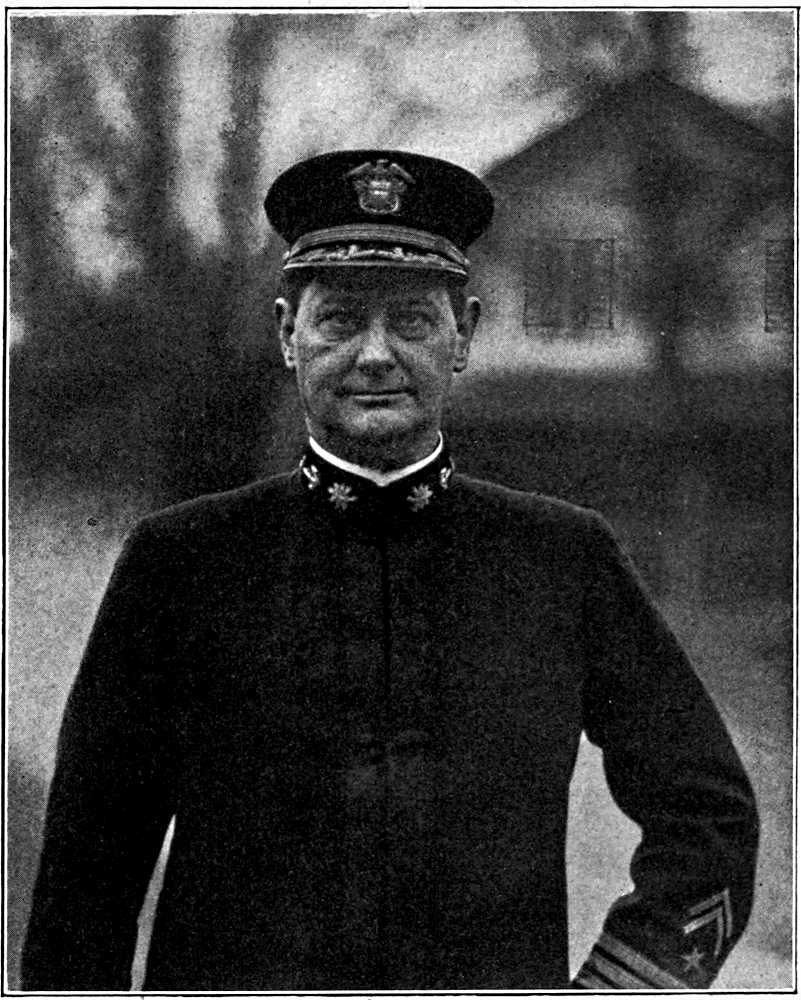
COMMANDER THEODORE A. KITTINGER, U.S.N., COMMANDING U.S.S. CORSAIR
The Corsair was fortunate in the officers assigned [Pg 11]for the hazardous employments of the war zone. Lieutenant Commander Theodore A. Kittinger, U.S.N., was in command of the yacht, having been transferred from the destroyer Cushing which had taken part in the long and arduous training that had whetted the flotilla personnel to a fine edge.
The service record of Commander Kittinger helps one to realize how varied is the experience and how rigorous the training of a naval officer, even in time of peace. Graduated from Annapolis in 1901, he served first in the battleship Alabama, of the North Atlantic Squadron, as junior watch and division officer, on deck and in the engine-room. As an ensign he was in the converted yacht Vixen in 1903 when she cruised in Caribbean waters and kept an eye on the attempt of the former Kaiser to meddle in the affairs of Venezuela. Then shifted to the China station, the youthful officer was in the monitor Monadnock and the cruiser New Orleans during the anti-foreign riots and the Russo-Japanese War.
Sent home to join the armored cruiser West Virginia, Lieutenant Kittinger was an assistant engineer officer in 1906 and again made the long voyage to the Far East and the Pacific. He became gunnery officer of the same ship before the tour of sea duty ended and he was appointed assistant inspector of ordnance at the Naval Gun Factory, Washington. In 1910-13 he was senior engineer officer of the battleship Minnesota, visiting Europe and then to Cuba and Vera Cruz. Again ashore,[Pg 12] he was in charge of the smokeless powder works at Indian Head and executive officer of the station of the Naval Proving Ground, going from there to the Fore River Shipyard as naval inspector of machinery. Then came two years of sea service in a destroyer.
As executive officer of the Corsair, Lieutenant Commander Porter was an uncommonly experienced and capable seaman and navigator and, of course, knew the ship from keel to truck and what she could do in all weathers. Third on the list was Lieutenant Robert E. Tod as navigating officer. He was one of the foremost yachtsmen of the United States, a commodore of the Atlantic Yacht Club, and a licensed master mariner who had sailed his own large vessels without the aid of a skipper. The gunnery officer, Ensign A. K. Schanze, was a graduate of the Naval Academy who welcomed the opportunity to return to the Service. The chief engineer of the Corsair, J. K. Hutchison, who had been in her for several years, decided to stand by the ship through thick and thin, as did his assistants, A. V. Mason and W. F. Hawthorn. This was true also of Lieutenant R. J. McGuire who had been the first officer of the yacht and of Boatswain R. Budani and a number of the enlisted force.
The day’s work of making the Corsair ready for sea, the unaccustomed drudgery and the uncertainty which filled the ship with rumors, are reflected in the letters and diaries of the youthful seamen whose motto was, “We don’t know where[Pg 13] we’re going but we’re on our way.” One of them wrote as follows:
April 3rd. 1917. The President of the United States to-day declared this nation to be at war with Germany.... 4th. Have determined that I had better join the Army or Navy, as we are really at war. Most of my friends are going to try to go to Plattsburg and get commissions. I do not think I shall do this.... 6th. A lot of men are planning to go to the Mosquito Fleet school at Newport. I can’t see it. Will go on a foreign-bound ship or none. Have decided to learn radio and join the Navy as an operator if I can learn it soon.
April 13th. Still plugging at radio. I am getting a little impatient. Think I shall enlist very soon.... 20th. Almost ready to leave the office. Hate to go, but war is war and it’s no fault of mine. Sorry there is war, but there is only one thing to do—see it through.... 26th. Finished all my work in the office and took away my things. I wonder if I’ll ever get through the war and come back to my old job.... 27th. On this day I made my final determination to enlist in the Navy. Saw Lieutenant Tod and Captain Porter who recommended me for the Corsair. Was enrolled in the Navy and assigned to this ship, with orders to report at once. My rank is seaman....
May 2nd. First day of decent weather on this ship and we worked like slaves. Coaling, cleaning decks, and drill. The food so far is good. Home liberty for the night.... 3rd. Was elected to mess, with Jack Faison. Worst job in the world. We washed hundreds of dishes, knives, etc., but got the fo’castle clean for the first time.... 4th. Same kind of work, although we added setting-up exercises and semaphore. We were signed out of the Reserves (for coast patrol) into Class II,[Pg 14] regular U.S.N. service call.... 5th. Spent most of the morning learning knots in ropes. Also had to clean decks. Brought aboard the small arms. Stood watch from noon to 4 P.M. Chased away two suspicious looking Wops. Six men are to be sent off the ship soon. If I am elected there is going to be one awful kick.
May 8th. This morning we had boat drill and I stroked the cutter. Then the head gunner and I showed the rest of the men how to take down, sight, and load a Springfield rifle. After that we practiced signals and had infantry drill with full equipment. The new boatswain treats ’em rough and he bawled me out all day. Rumors on this ship spread like wildfire. First we are to be a flagship and then a dispatch boat and then to patrol the English Channel until nobody knows anything. There goes the boatswain’s whistle which means turn to.
May 11th. Spent the entire day at the Armory getting clothes. The only decent thing about Navy red-tape is the cheap price which we pay for stuff. We stood in line just seven hours. The Corsair now looks like a real battleship. The paint is all on, also the gun mountings. We hear that the Kaiser has offered a big reward to the U-boat captain who sinks this boat, because it belongs to J. P. Morgan. Here’s hoping he is disappointed! I learned a new way yesterday of making a deck-mop out of canvas. It is very useful.... 14th. We got our orders to-day and sail for the Navy Yard to-morrow. The dope is that we leave for good on Friday. We expect to be sent to the coast of Maine for two weeks’ target practice, then to Newport where we get definite sailing orders for some foreign service.... 15th. Had a good trip from Fletchers’ to the Navy Yard and then a terrible day. We had to coal ninety tons of soft coal in buckets and shovels. The crew is[Pg 15] dog-tired and I never saw such a dirty crowd. I pray we may never have to live to-day again.
(Note. Inserted later. This day was repeated in France once a week. We soon got so used to it that it became routine.)
May 16th. We had been asleep two hours when the fire call was rung and all hands had to march double-quick to the Princess Irene, a converted German liner. It was a pretty bad fire and we were detailed to haul hose for three hours. To-day was spent in washing the ship and loading meat aboard. We are taking on provisions for six months. The work here in the Navy Yard is something fierce and I shall be glad to go to sea. I bought shore liberty from another gob for two dollars to go home and take a bath.
May 17th. To-day a strict censorship was put on us. All our mail is read by the executive officer before we send it out. Also no news of any kind is handed to us. We are not even allowed to tell our families when or where we sail. All the dope is that we are going abroad soon. I visited the Noma and the Harvard to-night, but they can’t compare with the Corsair. We also looked over some of the battleships and destroyers. Eleven of them left for France to-day. We now get home leave once a week. I washed some clothes to-day. They were in awful shape. We loaded ten tons more of provisions. Also got shot in the arm for typhoid and was vaccinated. I am all in to-night.
May 18th. To-day has been more like the real Navy. I was on anchor watch from 4 P.M. to 6 and again in the morning. I went aboard a submarine to-night and it was the most interesting craft I have ever seen, but I would not care to ship in her. My arm is a lot better to-night, but still sore. The food is not nearly as good as it was, mostly because the cook is lazy, but I think[Pg 16] the skipper has got his number.... 19th. It looks very much as if we would sail any day now. All stores, ammunition, etc., are aboard and we are living a life of comparative ease. Now they say we are going to convoy the United States Commission to Russia. I hope we do.... 21st. Captain Kittinger told us this morning to get all the warm clothes we could as we are going to a cold climate. This sounds like Russia or the North Sea. Everybody says for sure we are going over soon, so I guess that must be right. I was recommended by the chief boatswain for a coxswain’s job and I hope I get the appointment. Dave Tibbott got one, too. Pay-day to-day, but I did not get a cent, as by some error of the Department my name was not on the list. Am studying hard on the deck and boat book and the seaman’s manual.
May 22nd. Got offered a job as yeoman, but I don’t want to be a pen-pusher if I can help it. Mr. Tod advised me to take it and say nothing if the commander makes a point of it.... 24th. This has been a trying day. In the first place a lot more men were transferred off the boat and it makes us all nervous. So far eight have got the gate. I painted the skylights and covers all the afternoon. We are still at the Navy Yard. Because of the Mongolia accident all our ammunition was condemned, so we had to unload it. The weight to carry was enough to pull all the rivets out of your back-bone. I suppose it will be the same when we load it again. We still don’t know for sure whether we will be kept on the boat. Several more men expect to get the hook.
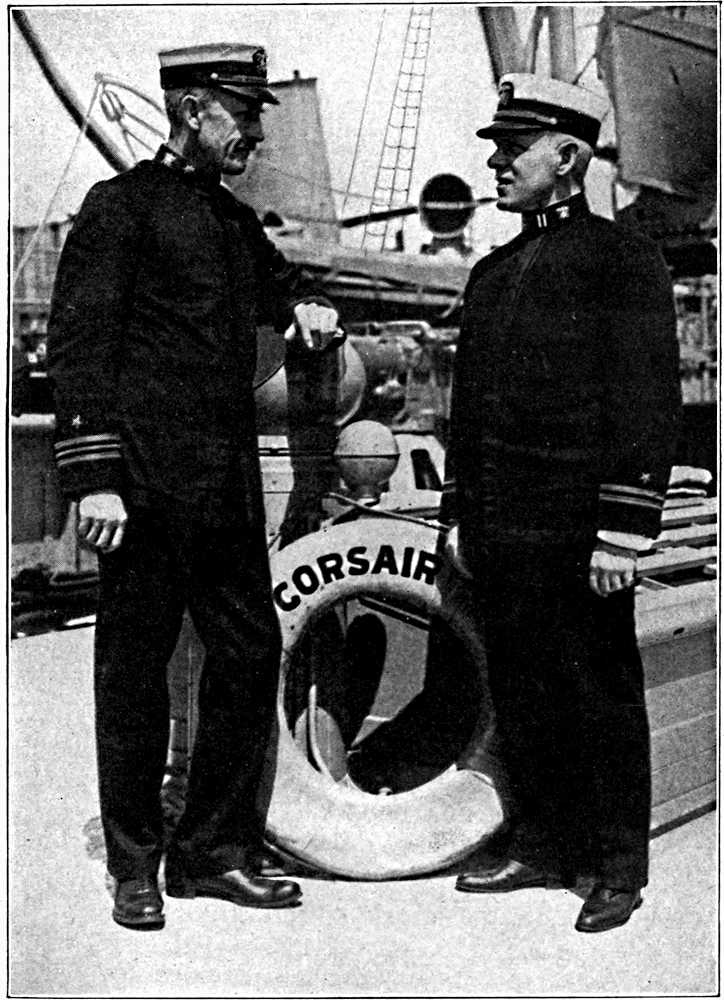
Copyright by Kadel and Herbert, N. Y.
LIEUTENANT COMMANDER WILLIAM B. PORTER, LATER COMMANDING U.S.S. CORSAIR, AND LIEUTENANT ROBERT E. TOD, NAVIGATOR
May 26th. I have the P.O. mess. Dirty job. Another man got canned to-day. I do wish they would settle on the crew. I understand now that the Corsair will sail for Gravesend, England, on Thursday. Mr. McGuire [Pg 17]told me last night that he is afraid some more men will have to be put off for lack of room. It certainly keeps us feeling jumpy.... 29th. Coaled ship all day. It was a frightful job. It was shot onto the decks and we shovelled it into the bunkers. We took on 350 tons and the dirt and coal dust are unspeakable. To add to the discomfort it rained all day. To-morrow is a national holiday, but not for us.
May 30. To-day we spent washing the ship. We turned loose the hose for four hours and it looks better, but is not clean by a long shot. I have caught a rotten cold. To-day more of the crew got fired. Thirty-two regulars from the South Carolina came aboard to fill up the crew. We now have a full complement.... 31st. Still raining. I have never known such beastly weather. We are still loading stores and I don’t understand where all the stuff is put. We are carrying the fleet paymaster and the fleet postmaster, so it looks as if we would also be the fleet dispatch boat on the other side. Heaven only knows when we will sail. We have been expecting to go every night. Liberty is very scarce these days.
June 1st. Still more rain. I don’t expect a decent day this summer. We are still loading, loading, loading. Food, clothes, and ammunition. A hundred and fifty pounds on my back is nothing any more. They first announced that we were to have liberty to-morrow and then cancelled it. Haven’t been mess cook or on watch for five days. Hope my good luck continues. The regulars are a good bunch, with few exceptions, and I am surprised that most of them are so young. They run from nineteen to twenty-two on an average, barring the petty officers who are older.
June 4th. We sail definitely to-morrow, nobody knows where. In the afternoon I went to the Subtreasury[Pg 18] with the paymaster to get money. We both carried guns and brought back $10,000 in gold to the ship. It was some load to carry.... 5th. We shoved off from the Navy Yard at 8.30 A.M. and are now heading north in Long Island Sound. No idea yet where we are heading for. We cruised in the Sound all day and anchored at Whitestone for the night. Got our battle billet to-day. I am as follows:
Fire. Extinguisher in crew quarters.
Boat. Big motor sailer.
Gun. Fire control aft.
Arm and away. Fire control aft.
This is a joke on me. It was raining the other morning and we were getting under way. Everybody was dressed in dirty working whites. The bos’n yelled at me, “Hey, get the messenger for’ard.” I immediately rushed down to my locker, broke out a clean suit of whites, and reported to the bridge for messenger watch. I could hear the bos’n cursing all over the deck. The mate finally spotted me and asked what I was doing on the bridge. I told him the bos’n had put me on messenger watch, and the mate said, “Messenger watch! Hell! The messenger is a rope, you poor boob!” It turned out that the “messenger” was a long line which was stowed forward and he was wondering what in Sam Hill had happened to me. The “messenger” is used to hoist the motor sailer.
June 6th. Spent the morning overside, scrubbing the ship. At one o’clock we hove anchor and cruised down to Staten Island. There are eleven warships here with us.... 7th. Coaled ship all day at the Navy Yard. Filled the bunkers and then put thirty tons on deck in bags. The ship was a holy mess. Before breakfast we were over the side scrubbing.... 8th. Spent most of the day washing the whole ship. We left the Navy[Pg 19] Yard and are tied to a dock at the foot of 80th Street in the Hudson River. The Seattle, Birmingham, and the Aphrodite are anchored near us. Got paid $13.00 to-day. So much money makes me dizzy.
June 11th. I got what amounts to a promotion. I am signal-man on the bridge. I handle all the signals, flags, semaphore, blinker, and searchlights, excepting radio. It lets me out of all the hard deck work. It will take lots of practice to make good, but I am coming along fairly well.... 12th. Three large transports are anchored off us, crowded with regular infantry. We hear we are to convoy them across. We shall be starting very soon. The dope is that we are to act as convoy all summer.... 13th. We are told that there will be no liberty to-night, so that means business. I called up father and he came to see me and said good-bye. The day was spent in putting on the finishing touches for sea. We think we are going over with about thirty other ships. The Seattle is the flagship. There will be cruisers, destroyers, our type of vessel, and the transports....
This young sailor and his comrades were about to take part in one of the most memorable voyages in American history. The crowded transports at which they gazed bore Pershing’s first contingent, the vanguard of an army two million strong. They presaged the enormous flow of troops and material, the bridge of ships which should finally shatter the military power of Germany. There was nothing outwardly dramatic in this sailing of this little fleet of transports. It stole out in secret and no newspaper hinted at its departure. The men in khaki[Pg 20] belonged to regular regiments whose names and numbers meant nothing to the people of their country. It was to be the destiny of most of these unknown men to fall, dead or wounded, on the fields of France, but the regiments came back, and then the country knew them as they marched down Fifth Avenue, wildly cheered and pelted with flowers—the stern, bronzed ranks of the First Division.
They filled the decks of this first convoy, companies and battalions of the Sixteenth, the Eighteenth, the Twenty-Sixth, and the Twenty-Eighth infantry regiments which were to win glory at tremendous cost in the victorious assaults at Toul, at Cantigny, at Soissons, at Saint-Mihiel, and in the desperate advances of the Meuse and the Argonne.
It was the Navy’s job to shepherd them across the sea in safety. While the crew of the Corsair was busied with rumor and conjecture, her official record or confidential “War Diary” briefly noted the facts in the case:
April 28th. Corsair taken over by the Government at Fletchers’ Ship Yard, Hoboken, New Jersey.
April 28th to May 15th. Fitting out for duty as scout patrol, Third Naval District. During first week in May information was received that ship would operate with Nantucket Patrol when ready for sea.
May 15th. Sailed from Fletchers’ Ship Yard to Navy Yard to receive battery and continue fitting out. Commissioned as per following letter:
[Pg 21]
Office of the Commandant Third Naval District
Navy Yard, Brooklyn, N.Y. May 14, 1917
From: Commandant, Third Naval District.
To: Lt. Com’dr T. A. Kittinger, U.S.N.,
Commanding Officer.
Subject: Corsair, S.P. No. 159, placed in commission.
1. As authorized in reference (a) the Corsair, S.P. No. 159, is hereby placed in full commission, 15 May, 1917, 3.00 P.M.
N. R. Usher
Rear Admiral, U.S.N.
| Copy to Navy Department | Operations. | |
| Bureau of Nav. |
Commander Patrol Force, U.S. Atlantic Fleet.
May 19th. Received orders to fit out for distant service, to be ready on May 30, 1917.
June 4th. Received orders to report to Rear Admiral Albert Gleaves, U.S. Navy, for temporary service.
June 5th. Left Navy Yard, New York, for shaking down cruise in Long Island Sound.
June 6th. Proceeded to anchorage at Tompkinsville for conference with Captain W. B. Fletcher, U.S.N., on the U.S.S. Noma.
June 7th. Proceeded to the Navy Yard for coal.
June 8th. Joined U.S.S. Seattle at anchorage, North River, New York.
June 14th. Sailed with First Expeditionary Force from United States to France.
The troop-ships in Group One of this First Expeditionary Force were the merchant steamers Tenadores, Saratoga, Havana, and Pastores. The escort assigned to them comprised the cruiser Seattle, flagship of Rear Admiral Gleaves, the yacht Corsair,[Pg 22] the armed transport DeKalb, and the destroyers Wilkes, Terry, and Roe. Three other groups followed in a similar arrangement. The secret orders received by the commander of the Corsair were as follows:
From: Commander Destroyer Force, Commanding
U.S. Convoy Operations in the Atlantic.
To: Convoy Group Number One.
Subject: Movement Order.
1. Execute Operation Order No. 1 of 7 June, 1917.
Escort arrive Ambrose Channel Lightship at 7.00 A.M., 14 June.
Convoy arrive Ambrose Channel Lightship at 7.30 A.M., 14 June.
Group One will, on arrival at Ambrose Channel Lightship, assume following formation:
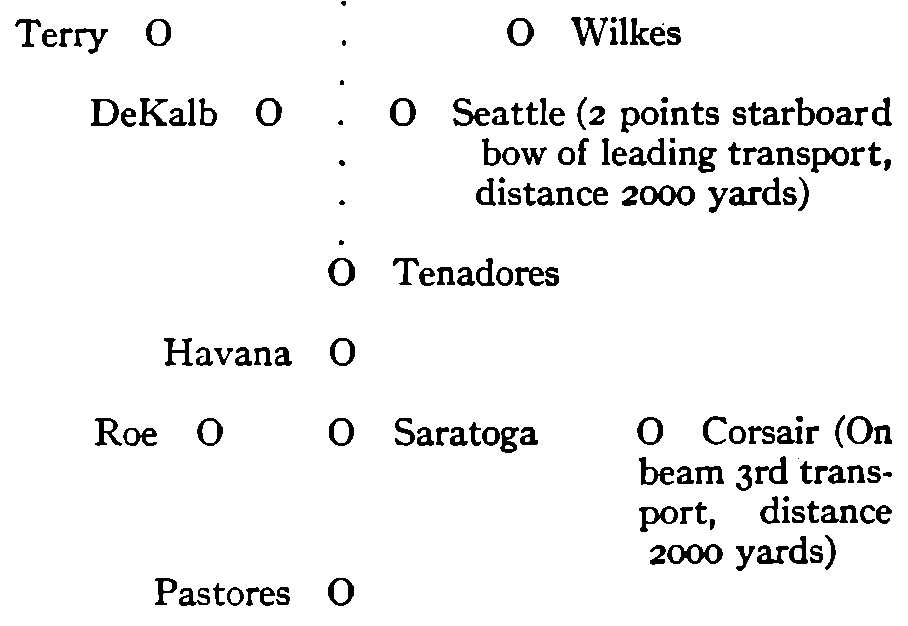
| Terry O | . | O Wilkes | ||||
| . | ||||||
| DeKalb O | . | O Seattle (2 points starboard bow of leading transport, distance 2000 yards) | ||||
| . | ||||||
| . | ||||||
| . | ||||||
| O Tenadores | ||||||
| Havana | O | |||||
| Roe O | O Saratoga | O Corsair (On beam 3rd transport, distance 2000 yards) | ||||
| Pastores | O | |||||
Distance between transports 600 yards.
(Signed) Albert Gleaves

FITTING THE CORSAIR FOR THE WAR ZONE
[Pg 23]
The instructions for warding off submarine attack have more than a passing interest. They signified a new chapter in the work of the American Navy, with no doctrine as precedent—the task of transporting an army across three thousand miles of ocean and protecting it against an enemy which was supremely confident that its undersea warfare could not be thwarted, which had boasted that it could prevent the landing of an American army in France. In a way, this was a momentous experiment. How thoroughly and intelligently the Navy had studied the problem may be discerned in these extracts from its confidential orders to the Corsair and the other ships of the escort:
Reports of enemy submarine activity indicate that the area of greatest activity is east of Longitude Twenty West, and within a circle radius five hundred miles from Fayal, Azores. Submarines may be operating on the Atlantic coast of the United States and Canada. Every effort has been made to hold secret the sailing of the convoy but it may be assumed that the departure of convoy from the United States and the hour of departure will be communicated to the enemy. It is possible that particular effort will be made by the enemy to accomplish the destruction of the convoy, and no part of the water traversed may be assumed to be free from submarines.
Ships will make every effort to maintain distance accurately and will be careful not to drop astern, particularly at night or in thick weather. Speed will be assigned by signal. During daylight every effort will be made to determine the revolutions necessary to[Pg 24] make the speed of the convoy in order that each ship may maintain a more nearly constant speed during the darkness.
Convoy will be manœuvred as necessary by the Battle Signal Book. Ships will manœuvre independently in accordance with the Rules of the Road in all cases when necessary to avoid collision. When convoy alters course each ship of the convoy will turn in the wake of the next ahead except in zigzagging when all turn together.
There will be two well-protected and arranged lookout stations aloft; one on each side of the mast as high as possible, capable of holding four lookouts each. There will be four well-protected and arranged lookout stations on each side of the ship, capable of holding two lookouts each. During daylight there will be an officer in each top, in addition to lookouts. At all times there will be an officer in charge of lookouts on deck who will make periodic inspections. The communication system from lookout stations to bridge will be tested frequently.
Lookouts will be carefully selected for their fitness for lookout duty—keen eyesight, intelligence, and freedom from seasickness are essential qualities. A school for lookouts will be held daily. They will be instructed to report everything they see. In so far as practicable they will be furnished with binoculars and each lookout will always use the same glass. Each lookout will be assigned a definite sector and will be required to maintain the closest possible watch within that sector, no matter what may be happening in other sectors.
Gun crews will be at all times in the immediate vicinity of their guns. One man of each crew will be at all times on watch. Daily pointing, loading, and fire[Pg 25] control drills will be held. When conditions permit and upon orders from the Group Convoy Commander, target practice will be held in accordance with the General Signal Book.
No radio message will be sent except in great emergency involving the safety of the ship. A continuous radio watch will be maintained. If it becomes necessary to communicate by radio, the cipher contained in the operation order will be used.
All vessels will be darkened so that no ray of light shall show outboard between sunset and sunrise. A single gleam of light may cause the loss of the ship. Sentries will make constant rounds to insure the strict enforcement of this order throughout the ship. Navigational lights will not be shown except when specifically ordered by the convoy commander or when immediately necessary to avoid collision and then only long enough to meet the emergency. Range lights will not be shown and all lights will be dimmed to two miles visibility.
Smoke from the funnels must be reduced to a minimum both by day and night. All vessels will keep fuel so trimmed that maximum speed can be maintained toward end of voyage. Neither the whistle or the siren shall be used in submarine waters except in case of emergency. Care will be exercised that the leads of the siren and whistle cords are such that these cannot be accidentally pulled or become jammed.
A station bill will be prepared showing the stations at fire quarters and abandon ship. Daily drills at fire stations and abandon ship will be held until all persons on board become familiar with their duties.
Necessary instructions in regard to rendezvous and courses will be found in the sealed instructions. These will be opened only as directed on the outside of the[Pg 26] envelope. Before dark a rendezvous for 4 P.M. of the day following will be signalled by the Escort Commander.
Nothing that floats will be thrown overboard. All waste material that can be burned will be burned. Tin cans must be well punctured before being thrown overboard. Garbage that cannot be burned shall be accumulated in suitable receptacles and thrown overboard from all ships simultaneously one hour after sunset each night.
Submarine Attack
The following is generally accepted:
Submarines on surface are visible on the horizon. Submarine awash is visible about five miles. Submarine submerged, periscope showing, is not visible more than two miles unless periscope appears against skyline. Porpoising of submarine as it comes to the surface to obtain sight through periscope creates a distinct wake which is more clearly visible than the wake of periscope when submarine is steadied.
Under poor conditions of atmosphere and sea the probability of detecting a submarine decreases. It follows that constant vigilance alone will insure the early detection of a submarine. The wake of a torpedo is distinctive and can easily be picked up in smooth water at a distance of two thousand yards. In rough water it is difficult to observe the wake.
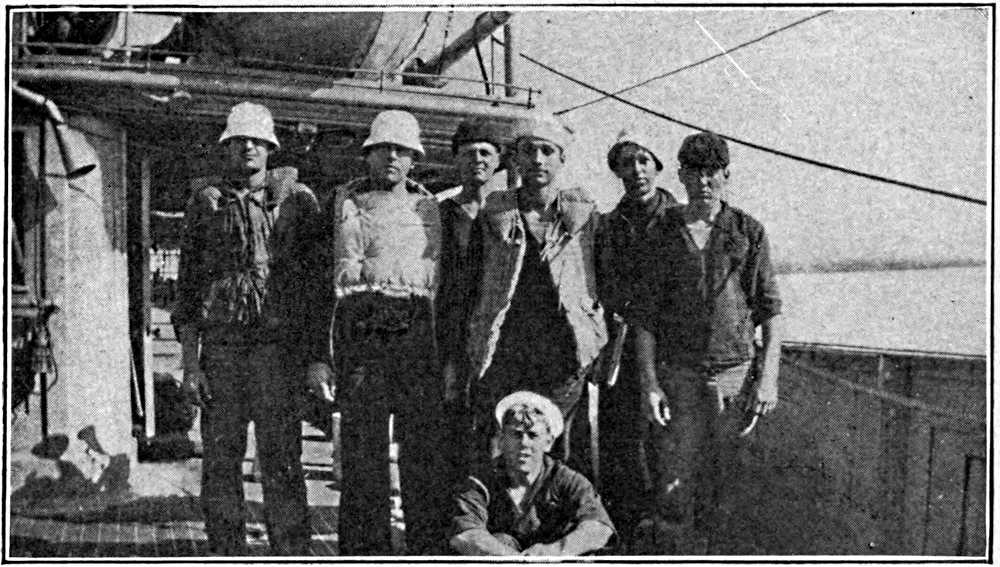
NUMBER TWO GUN CREW ON WATCH
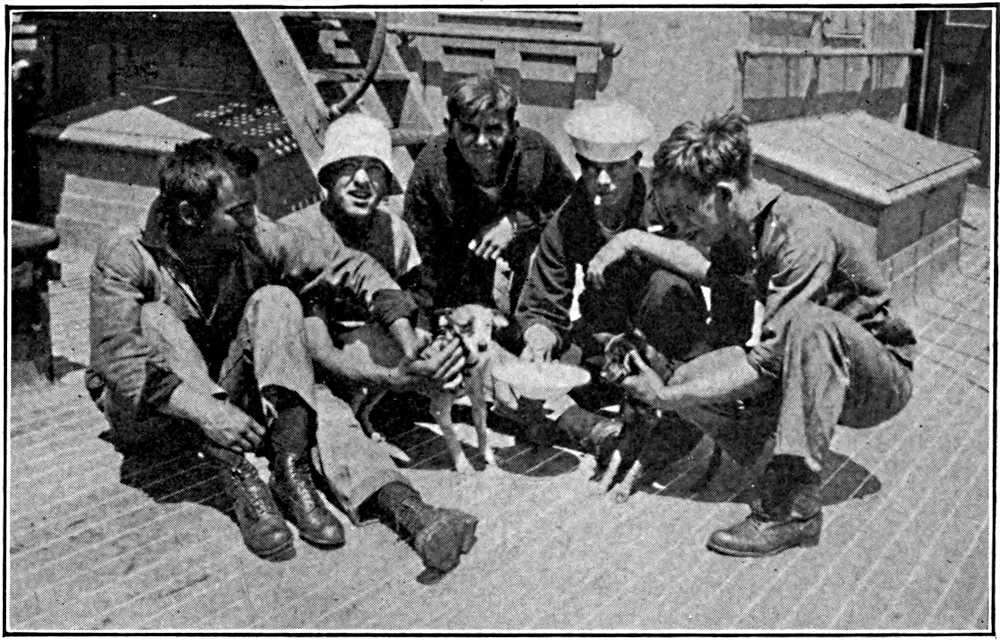
THEY ARE ALL SEA DOGS TOGETHER
Daylight attack by surface craft (enemy raider), will be handled by signal from the Convoy Commander. Daylight attack by submarines shall be handled as follows by each vessel:
(a) Open fire instantly on any submarine sighted. Don’t delay the first shot even if it is apt to go wild,—it will show the direction of the submarine and will have a pronounced moral effect.
[Pg 27]
(b) Continue to fire as rapidly as possible. Short shots interfere with the ability of the submarine to see and aim.
(c) If submarine appears less than six points on bow and not more than 2000 yards away, head for submarine at best speed.
(d) If submarine appears more than six points on bow, abeam, or on the quarter, head directly away from submarine at best speed.
(e) If torpedo wake only is seen, fire gun immediately and indicate direction to other ships and manœuvre to avoid torpedo as in case of submarine, i.e.—turning towards torpedo if less than six points.
(f) Other ships of convoy turn from direction of submarine and scatter at best speed, maintaining keenest lookout for torpedo wake and for a possible mate of the attacking submarine.
(g) Resume course when it is deemed that your vessel is outside the danger zone of attacking submarine.
Night Attack:—All vessels instantly change course ninety degrees either to port or starboard. Course will be resumed before any vessel has proceeded ten miles after ninety degrees change. If any vessel is damaged by torpedo, that vessel will act independently and all other vessels of convoy escape at best speed. The damaged vessel may send out radio distress signals provided for merchant vessels.
Owing to the presence of escorting ships it is not probable that submarines will be caught on the surface and therefore will not attempt to use her guns. It is very probable that the first indication of the presence of a submarine will be the wake of her torpedo.
Mines, floating or submerged, may be encountered. All floating objects, the character of which is uncertain,[Pg 28] must be carefully avoided. Floating mines have recently been encountered under the following conditions:
(a) Two mines connected by lines.
(b) Secured to bottom of dummy periscopes which were mounted in a box or other object.
(c) In waterlogged boats, used as decoys.
(d) Attached to wreckage of various kinds.
If submarine is sighted or if gunfire from any ship indicates attack, destroyers and fast yachts of escort will head at best speed in direction of submarine, force it to submerge, and attack as conditions permit. They will rejoin convoy at earliest possible moment. If any ship is damaged by torpedo, two destroyers will stand by ship, those nearest of escort, affecting such rescue as may be necessary and possible.
[Pg 29]
The Corsair stood out to sea with the transports and the escort in the morning of June 14th after a thick fog had delayed the departure for several hours. As finally selected, the ship’s company consisted of 130 officers and enlisted men. The shifting fortunes of war were to scatter most of them to other ships and stations during the long exile overseas, and when the battered yacht came home, only Commander Porter and Lieutenant McGuire and eighteen of the crew of this first muster roll were left on board.
Changes were so frequent that from first to last almost three hundred men served in the Corsair.[1] The ship proved to be a training school for officers, and made an exceptional record in that thirteen of her enlisted force and one warrant officer won commissions during the war, some taking the examinations while on foreign service and others being sent to Annapolis for the intensive course of three months and receiving the rank of temporary ensigns in the regular naval organization. On deck and below, men were rated as petty officers as rapidly as they displayed aptitude, and few of the crew failed to advance themselves. The spirit of the ship[Pg 30] was eager and ambitious from the start and drudgery could not dull it.
As a proper man-of-war the Corsair lived a complex and disciplined programme of duty through the twenty-four hours of the day. When she steamed past Sandy Hook, outward bound, the complement included a chief boatswain’s mate, one boatswain’s mate, six coxswains, seven gunner’s mates, four quartermasters, nineteen seamen, nineteen ordinary seamen, three electricians, four radio operators, a carpenter’s mate, two ship-fitters, a boiler maker, a blacksmith, a chief machinist’s mate, one machinist’s mate, a chief water tender, two water tenders, four oilers, twenty-one firemen and coal passers, a chief yeoman, three yeomen, a hospital apprentice, a bugler, a cabin steward, four ship’s cooks, and eight mess attendants.
The complete roster of the ship on this famous day of June 14, 1917, was as follows:
Lieutenant Commander T. A. Kittinger, U.S.N. (Commanding)
Lieutenant Commander W. B. Porter, N.R.F. (Executive)
Lieutenant Robert E. Tod, N.R.F. (Navigator)
Lieutenant R. J. McGuire, (JG) N.R.F. (First Lieutenant)
Lieutenant J. K. Hutchison, (JG) N.R.F. (Engineer Officer)
Ensign A. K. Schanze, N.R.F. (Gunnery Officer)
Ensign J. F. W. Gray, N.R.F. (Communications Officer)
Assistant Surgeon E. V. Laub, N.R.F.
Assistant Paymaster J. J. Cunningham, N.R.F.
Machinist W. F. Hawthorn, N.R.F.
Machinist A. V. Mason, N.R.F.
Boatswain R. Budani, N.R.F.
Aguas, I C. F1c.
Ashby, C. N. Sea. 2c.
Balano, F. Sea.
Barko, A. W. G.M. 3c.
Barry, H. A. Sea.
Bayne, C. S. Sea.[Pg 31]
Bedford, H. H. F1c.
[2]Benton, E. M. Sea.
Bischoff, H. J. F2c.
Bonsall, T. C. Cox.
Breckel, H. F. Elec. 1cR.
[2]Brillowski, A. J. F2c.
Byram, C. S. F2c.
Carey, N. J. Bugler
[2]Carroll, O. W.T.
Clinch, T., Jr. Elec. 2cG.
Coffey, A. H. Sea.
Connolly, C. Yeo. 3c.
Copeland, A. T. Sea.
Cure, H. S.C. 2c.
Curtin, J. J. F1c.
Davis, I. S. Elec. 2cR.
De Armosolo, V. M. Att. 3c.
Donaldson, S. J. Sea. 2c.
Duke, W. M., Jr. Sea.
Egan, L. C. G. M. 3c.
Emmons, L. C. Sea. 2c.
Evans, W. F. Sea.
Farr, F. S. Q.M. 2c.
Feeley, N. M.Att. 1c.
[2]Flynn, J. S. M.Att. 1c.
[2]French, L. A. Sea.
Fusco, N. S.C. 3c.
Ganz, C. A. M.M. 2c.
Gilhooley, J. P. G.M. 3c.
[2]Gillette, H. E. F2c.
Goring, H. D. H.A. 1c.
Graul, R. W. F1c.
Gray, A. O. Sea. 2c.
Griffin, L. H. F3c.
Haase, H. E. G.M.3c.
Haling, C. W.T.
Hamilton, C. Blacksmith
[2]Hanley, J. M.Att. 1c.
[2]Heise, W. F. F1c.
Herrman, H. Oiler
Hill, F. C. C.M. 3c.
Hiss, S. W. F1c.
Hollis, L. R. Sea. 2c.
Houtz, E. L. Sea.
Jetter, R. T. Sea.
Jones, R. D. Oiler
[2]Jones, T. W. F1c.
Kaetzel, H. D. Sea. 2c.
Keenan, A. E. B.M’ker.
Kerr, G. M. Sea.
[2]Kleine, J. F. Oiler
Leal, R. M.Att. 3C.
Lewis, F. W. Cox.
Lindeburg, F. R. Sea.
Loescher, H. A. Elec. 2cG.
Loftus, J. P. C.B.M.
Luke, E. E. C.M.M.
Marsden, C. Cox.
Marsh, A. J. Sea.
Martin, O. F. F1c.
Martinez, M. M.Att. 3c.
McClellan, R. B. B.M. 1c.
Miller, A. E. Yeo. 2c.
Montaux, R. C. Cox.
[2]Moore, J. E. Sea. 2c.
Moore, W. C. G.M. 2c.
Mulcahy, W. W. Cox.
Mullins, T. Q.M. 1c.
Murphy, W. F. Sea.
[2]Nardo, S. M.Att. 1c.
Nolan, F. M.Att. 2c.
Outwater, H. Sea.
Paulson, G. C. Yeoman
Pease, A. E. F1c.
Phillips, E. S.C. 2c.
[2]Plummer, J. A. Elec. 2cR.
Prindle, E. B. Q.M. 2c.
Rachor, J. Cox.
Rahill, W. J. Sea.
Regent, A. A. Sea. 2c.
Reynolds, F. J. Sea. 2c.
Robertson, C. Oiler
Rubein, S. F1c.
[2]Schlotfeldt, H. B. F2c.
Schmidt, H. L. S.F. 2c.
Seger, R. G. Sea.
Sellers, E. H. Sea. 2c.
[2]Sholander, E. Sea. 2c.
Simpson, J. F. G.M. 3c.
Skolmowski, S. J. Sea. 2c.[Pg 32]
Smith, A. C., Jr. Q.M. 2c.
Smith, J. F1c.
Smock, T. F. Sea. 2c.
Stephenson, H. F1c.
Sullivan, V. J. F.2c.
Swan, M. H. Elec. 3cR.
Tepelman, L. W. F1c.
[2]Teuten, W. W. F1c.
Thysenius, E. Cabin St’rd
Tibbott, D. W. Sea.
Tucker, R. S.C. 3c.
Underbill, P. W. Sea. 2c.
Valyon, L. J. Sea. 2c.
[2]Van Camp, L. R. Sea.
Wallace, E. C.W.T.
Walters, F. Sea. 2c.
Washburn, C. F. Sea. 2c.
Waters, C. W. Yeo. 2c.
Walters, F. Sea 2c.
[2]Wheatcroft, W. A. S.F. 2c.
Wyllie, A. A. G.M. 1c.
Wysocki, P. P. Elec. 3c.
Many of these patriotic pilgrims were about to undertake their first voyage on blue water, nor could they foresee how much piteous woe can be caused by the uneasy motion of a ship. The Corsair was a lively boat, as the saying is, for her hull was not moulded like a fat-bellied merchantman, and she lifted to the seas with the graceful stride of a Yankee clipper. And so when the transports plodded out into the wide, wet Atlantic, not a few of the bold mariners of the Corsair devoutly wished they had enlisted in the Army. They were not disgraced, however, for many a hard-shell of the regular Navy has confessed to the pangs of seasickness. The nervous thoughts of submarines were forgotten in wrestling with the immediate tribulation. The great adventure was not what it had been cracked up to be.
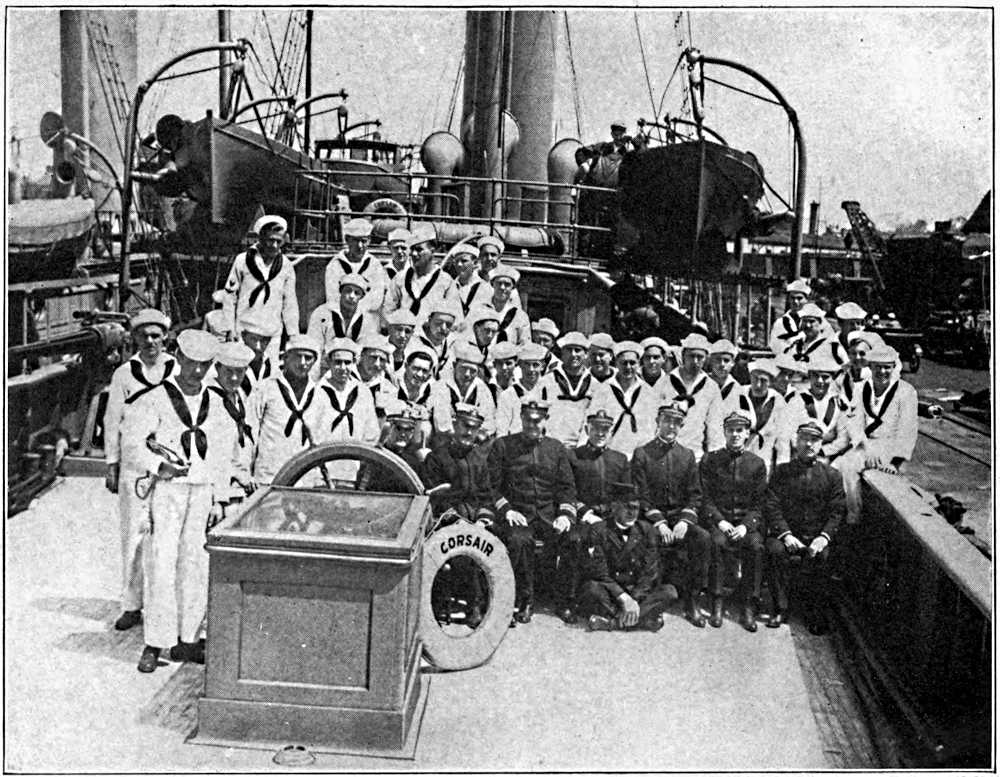
Copyright by Kadel and Herbert, N.Y.
SOME OF THE OFFICERS AND CREW, BEFORE LEAVING NEW YORK
Among the bluejackets was a Princeton undergraduate, Arthur Herbert Coffey, rating as a seaman, whose misfortune it was to suffer serious trouble with his eyes, so that he was sent home shortly after the Corsair reached France. Later he [Pg 33]entered the aviation service and died of influenza on December 31, 1918, greatly mourned by his former shipmates. He wrote, at some length, his impressions of the voyage and so entertainingly caught the spirit of it that he must be permitted to tell you how they went rolling out to find the “Bay of Biscay, O”:
I shall never forget the morning of June 14th as long as I live. It was three A.M. and very foggy when our bos’n’s mate roused us from our hammocks and told us to “rise and shine” as we were going to shove off. I’ll admit that I had many fears and misgivings at these harsh words, “shove off.” I had never been out of sight of land before in my life, and to cross the ocean on your first trip in a yacht three hundred feet long seemed to me to be some adventure, just then. Up to that time I hadn’t given it much thought. In fact, I had been impatient for the event, like the rest of the men, but as I was pulling on my socks that morning (and three A.M. is a rotten time of day anyhow), I began to reflect that perhaps I had been just a little bit hasty in rushing into the war. And I couldn’t help thinking how pleasant it would be to be snoring in a good, soft bed at Princeton with nothing between me and complete enjoyment of the day excepting a ten-thirty recitation hour.
Well, I got dressed anyway and turned to. We dropped down the river slowly and anchored off the Battery, for the fog was so thick that you could hardly see your hand before your face. All about us there was the moaning of fog-horns and I felt forlorn inside. But soon the fog lifted a bit and that, together with Bill Rahill’s grin, made things feel a little bit better. “Well,[Pg 34] we are off for the big stunt,” I said to myself. “I wonder when we’ll see this old town again.”
I had the watch in the crow’s nest that afternoon, from two to four, and enjoyed myself very much. It had turned out to be a fine day, the sun was bright, and we had lots of company, seven ships in all, four transports, a cruiser, and two destroyers. After an hour in the crow’s nest I happened to glance down at the deck and noticed some very odd actions among the crew. Several of them were leaning over the rail and appeared to be staring very intently at something in the water. I watched them for a while and then suddenly it occurred to me that they were seasick.
I felt like a hardened old sailor, for here I was high up in the crow’s nest, swaying from side to side, right over the water, and in tip-top form with a husky appetite for the next meal. I still felt fine when I climbed down to the deck, but was too wise to kid anybody. And it was a good thing I kept quiet, for an hour later I was as miserable as the rest of them. We certainly had a seasick crew for a couple of days. The green firemen were so sick that they were unable to stoke properly and we failed to keep up with the rest of our convoy.
We kept dropping farther and farther behind, the firemen still shy their sea-legs and also some of the crew. Nobody saw the doctor and the paymaster for four days.... Then the doctor made a brief appearance in the sick-bay. He looked at a cut in a man’s hand, clapped his own hand over his mouth, and we didn’t see him again for two days more. But he came around in fine shape after that, on the job every minute, although he was not needed often, I am glad to say.
To make a long story short, we abandoned all hope[Pg 35] of staying with the first division and ploughed along by ourselves for a few days, then picking up the second group consisting of four transports and the same type of escort. Everything went along smoothly for four days and then our destroyers came out to meet us from Queenstown. There were five of them and a bully good sight they were to us who were getting pretty close to the danger zone with our precious transports. The destroyers came zipping up like gray streaks and were on us almost before we knew it. We stood on deck and cheered ourselves hoarse. They were the boys who had gone over early, the first of the Navy to see active service. They were glad to see us, too, it appeared, and many messages were wig-wagged back and forth. They fell into position and all hands felt as safe as a church.
About two o’clock in the afternoon of the next day, I was below getting a drink of water when suddenly there was a loud explosion. I remember that at the time I thought somebody had dropped a hatch cover directly over my head. I realized in a moment that it was something else, for I heard loud shouts and the tramp of feet on deck. I was topside in no time and rushed for my gun as I was the loader of Number Three gun.
The transports had all stopped. One of them, nearest to us, was giving the submarine warning, a number of blasts on her whistle which sounded uncanny to us because it was the first time we had heard anything from the transports since leaving New York. They had moved across the ocean like so many ghosts. It was a beautiful, clear day and the sea was as smooth as a carpet.
I took my position at the gun, broke open a box of ammunition, and laid hands on a shell. The doctor[Pg 36] came rushing aft with a handful of cotton which he told us to stuff in our ears. Then we were all set to be torpedoed. I wasn’t scared—I was too busy, I guess—but I was a little bit jumpy. I looked at my watch and it was just five minutes of two. I wondered how long it would take our yacht to sink after the torpedo hit us.
The transports, as I have said, were making no headway and were all grouped together like a flock of frightened sheep, while the destroyers were just getting into motion. This was one of the prettiest sights I ever saw. No sooner had the transports halted than the destroyers, six in all, darted out in a fan-shaped formation and then worked back and forth, looking for all the world like greyhounds on a scent. And maybe they didn’t make knots! We were moving at top speed ourselves, but those destroyers gave us the impression that we were standing still. Zoom, one would cut across our bow at about thirty knots, then another would flash astern at the same rate.
For a time we could discover nothing else out of the ordinary. Then suddenly the captain of Number Four gun gave a yell and pointed astern. “There she goes!” he shouted. “It’s a torpedo as sure as you live, or I never saw one.” We all rubbered astern with our eyes sticking out like onions, and there, sure enough, was a wake foaming along at tremendous speed about fifty yards away, but it was not heading in our direction, thank goodness. I don’t know whether it was a torpedo or not. I have never seen one, but our regular Navy men swore it was.
The paymaster was sure it was, although he had never seen one either, and he dashed up and down the deck, clapping his hands and loudly exclaiming, “Oh, it is a torpedo! It is a torpedo!” This relieved the[Pg 37] strain considerably. We all laughed until we almost cried. The officer upon the after deck-house suddenly cried out, “Stand steady, boys. Don’t get excited. A school of porpoises is coming toward us.” We saw them, and I imagine there would have been a heavy mortality in that bunch of porpoises if the keen-eyed officer had not warned us in time.
That was about all I saw of the submarine attack, but I heard other stories from the deck and bridge. The explosion at the outset had been caused by the dropping of a depth charge from a destroyer, quite close aboard the Corsair. No wonder I thought somebody had banged a hatch cover over my head! The firemen below thought we had been torpedoed and were all for erupting on deck for a breath of fresh air. That depth charge was powerful. Our men said they saw the destroyer’s stern lift high in air while a great spout of water leaped just astern. We saw oil smeared over the water and I hope the destroyer was given official credit for sinking a submarine.
One of our officers told me that more than one submarine must have been in the attack, and that the activity of the destroyer escort drove them off. There was one incident which some of the men thought rather a joke, but I felt sorry. In the morning an old British tramp picked us up, and seeing all the destroyers, etc., concluded that we were good company to travel in, so she stuck with us all the forenoon, keeping a mile off to port. No sooner did she hear the submarine warning than she lit out at full speed, about ten knots, for safer waters. Two hours after that, our radio men got an S.O.S. from her, that she had been torpedoed and was sinking. It seemed too bad that we couldn’t go and help her.
[Pg 38]
This submarine alarm was the famous episode which thrilled the American public as elaborated by George Creel for the newspapers of July 4, 1917. The Corsair witnessed only what occurred among the second group of transports, and although some of her men declared they saw the wake of a torpedo, Commander Kittinger failed to confirm it in his official report of this busy afternoon. Rear Admiral Gleaves carefully considered the statements of the officers of ships in Group Two and drew the following conclusions, omitting the names of the vessels engaged because of the naval censorship in force at that time:
The H, leading the second group, encountered two submarines, the first about 11.50 A.M., June 26th, about a hundred miles off the coast of France, and the second submarine two hours later. The I investigated the wake of the first without further discovery. The J[3] sighted the bow wave of the second at a distance of 1500 yards and headed for it at a speed of twenty-five knots. The gun pointers at the forward gun saw the periscope several times for several seconds but it disappeared each time before they could get on, due to the zigzagging of the ship.
The J[3] passed about twenty-five yards ahead of a mass of bubbles which were coming up from the wake and let go a depth charge just ahead. Several pieces of timber, quantities of oil, bubbles, and débris came to the surface. Nothing more was seen of the submarine. The attacks on the second group occurred about eight hundred miles to the eastward of where the attacks [Pg 39]had been made on the first group.... It appears from reports of the French Ministry of Marine and from the location of the attack that enemy submarines had been notified of our approach and were probably scouting across our route.
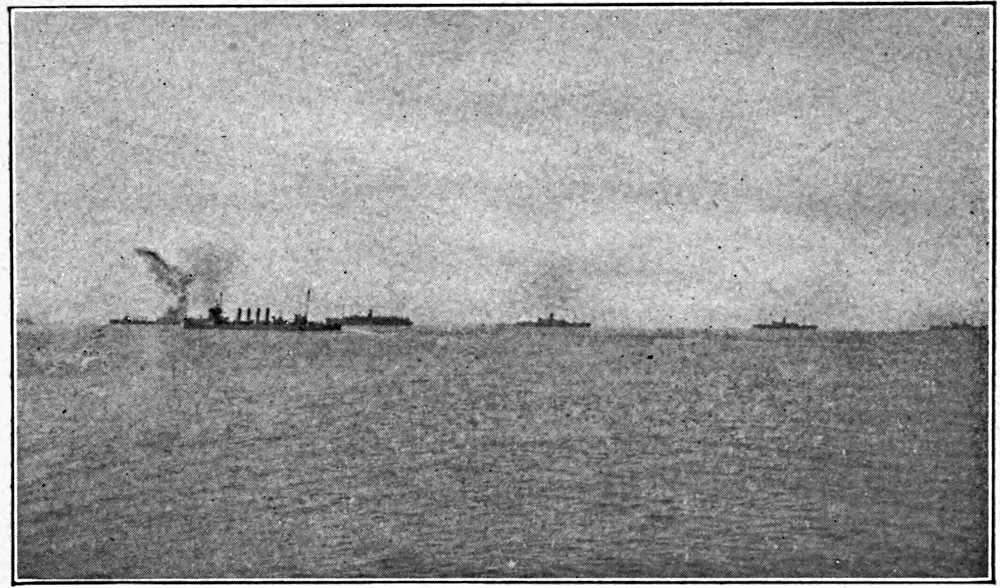
WITH AMERICA’S FIRST CONVOY. THE TROOP-SHIPS ARE THE HENDERSON, ANTILLES, MOMUS, AND LENAPE

THE MINE FUNCTIONS AND A LURKING U-BOAT WOULD FIND IT EXCESSIVELY UNHEALTHY
The story of Seaman Arthur Coffey is less exaggerated than might have been expected in these wholly novel circumstances. It may have been a torpedo or, perchance, it was a porpoise that was seen from the Corsair. If it was the latter, no blame is to be laid to the young sailors who were so tremendously excited. To their unaccustomed eyes the ocean swarmed with periscopes and U-boats. Many a seasoned skipper had blazed away at blackfish or shivered in his shoes at a bit of floating spar. The destroyer Cummings, at any rate, blew up something from the vasty deep with the “ash can” that plopped from her fan-tail. As for the soldiers packed in the transports, all girdled with life-belts and eyeing the ocean with morbid suspicion, they would have told you that the submarines were coming at them in droves. It was one of the dauntless doughboys of this First Expeditionary Force who wrote home to his trustful kindred:
Dear Mother and the Folks:
We hadn’t more than got out of New York than you could see submarines bobbing up all around us. The periscopes were as thick as cat-tails in a swamp. I counted seventy-five and then the ships began to fire. The gunner near me fainted. Shell shock, I guess. I sprang to the gun and began shooting. The first shot[Pg 40] I fired hit a submarine square on top of the back and tore out its whole back-bone, just like tearing out a whale’s back-bone. There was blood all over the water, and some oil.
I kept on shooting. I sank twelve of the submarines myself. The battle lasted a good while and I heard that fifty of the submarines had been destroyed. None of us was killed. The submarines, what was left, finally quit us. We haven’t seen any more of them. Give this to the newspapers.
Love to all the folks, from your soldier boy
Bill
At this early period of the naval war, the employment of the depth charge as the most efficient weapon against the submarine had not been fully developed. The traditions of accurate gunfire as the best offensive were not easily set aside. It was true of the destroyers at Queenstown, as of these yachts bound to France, that their crews felt sublimely certain of smashing Fritz with the batteries at which they drilled like so many skilled football teams. Soon they came to realize, however, that the chance of catching the enemy napping on the surface was extremely remote and that shooting at periscopes, even when they were not imaginary, was futile business.
The Corsair was armed with four three-inch rifles, and their crews were very capably trained under the direction of Ensign Schanze. This armament was not heavy enough to match the guns of a U-boat if the latter had been plucky enough to[Pg 41] stand up to a duel, but it served to drive him under and to inspire a wholesome respect. The superior speed of the yacht made her particularly well fitted for using depth charges, but at the outset she was equipped with no more than ten of the small and rather crude “Sperry mine” loaded with from thirty to fifty pounds of TNT. This device was exploded by means of a buoy and wire cable which unwound as the steel canister plunged through the water, releasing the detonator at the proper depth. These mines frequently failed to function and the destructive effect was feeble.
The Navy Department later perfected a terrific “ash can” packed with three hundred pounds of high explosive which was set off by means of a hydrostatic valve and could be relied upon to devastate a submarine a hundred feet below the surface of the sea. These great bombs were dropped, not one or two in an attack, but fairly dumped overboard by the dozen or the score in a cataclysmic barrage, after listening devices had located and “fixed” the enemy. The “Y gun,” or twin mortar, was also invented to hurl these metal kegs a considerable distance from the ship. Such were the perfected tactics learned from experience, which would surely have doomed the U-boat to extinction if the armistice had not intervened. The Corsair was fitted out in this manner later in her service, but she blithely sailed for the war zone with her four small guns and a few “Sperry pills” and could[Pg 42] have felt no more pride in her task if she had been a first-class battleship.
Concerning the voyage, Commander Kittinger reported as follows, in the War Diary of the yacht:
Got under way at 4 A.M., June 14th, and stood down the river, anchoring at 6 A.M. off Governor’s Island on account of fog. Got under way again at 9.40 A.M. Laid to off Ambrose Light Vessel at 1.20 P.M. Joined Group No. 1 at 1.50 P.M. and took departure from Ambrose Light Vessel at 2.09 P.M., standard speed 12 knots. At 2.30 P.M. weather became misty again which necessitated closing in to keep the convoy in sight. The 4 to 8 P.M. watch had difficulty in keeping steam for 12 knots. Blowers were used to assist. Ship lost distance which was recovered in the next watch and position maintained.
At 11.40 P.M. the fog set in thick and lasted until about 1.25 A.M., June 15th. At 3.20 A.M. the convoy was sighted on the port bow, distance four miles. During the watch the ship logged over 12 knots by revolutions of main engines, but due to deep draft was unable to keep up. The blowers were run continually to assist. The forward boiler could not be lighted off as it was banked in with reserve coal supply. Between 4 and 5 A.M. while cleaning fires the speed by revolutions dropped to 11 knots. A moderate sea was running which caused seasickness among the firemen. The firemen were drafted from the U.S.S. Delaware through the receiving ship at New York and were unfamiliar with firing Scotch boilers and not accustomed to the quick and deep roll of small ships. Most of them became useless during the cleaning fire period and their places were taken by petty officers of the engine and fire-room watch. The ship continued to lose distance[Pg 43] astern of convoy, a logged speed of 10½ knots being maintained. I gave this matter my personal attention and every effort was made to rejoin the convoy. From noon to midnight an average speed of 11¾ knots was logged. At 4.45 P.M. the Wilkes came within hail and made inquiries as to the cause of the Corsair’s inability to keep in position.
June 16th. An average speed of 10½ knots was logged for the day. I found that the seasoned men, most of them petty officers, were showing fatigue due to the hard steaming qualities of the ship. A number of volunteers from the deck force went below and passed coal and handled ashes to assist. The reserve coal from the dead fire-room was removed to allow the forward boiler to be lighted off. Group No. 1 was not seen this day. Group No. 2 was sighted astern at 3.40 A.M. Lighted fires in boiler No. 1 at 6 P.M.
June 17th. Maintained about 11 knots (by revolutions). Some of the firemen who had suffered from seasickness were back at useful work and the ship had become considerably lighter. At 5 P.M. cut in boiler No. 1 and increased speed to 13 knots. Between 1 and 2 P.M. two U.S. destroyers passed six miles to the southward, one heading east and one west.
June 18th. Averaged 13½ knots until 10.40 A.M. when speed was reduced to 10 knots to lose distance and join Group No. 2.
June 19th. Proceeding at reduced speed to allow Group No. 2 to overhaul.
June 20th. Proceeding at reduced speed, about 9 knots, to allow Group No. 2 to overhaul. It was desirable to keep a speed that was low but economical to get the mileage for the fuel.
June 21st. Proceeding at reduced speed, about 7 knots. At 3.45 A.M. sighted Group No. 2 on port[Pg 44] quarter,—distance four miles. Changed course to intercept. At 5.15 A.M. took position on starboard beam of Henderson, distance 2000 yards. At 6 P.M. sighted U.S.S. Maumee and U.S.S. Henley on starboard bow. The Burrows joined the Maumee and refueled. At 8.22 A.M. stopped and lowered a boat and boarded the Birmingham for orders. At 9.35 A.M. proceeded in formation at 12 knots. Had no trouble in keeping position from this time on with natural draft. Zigzagged during the afternoon.
June 22nd and 23rd. Proceeding with Group No. 2. Zigzagged during daylight.
June 24th. Momus broke out break-down flag and dropped astern of formation. At 8.17 A.M. sighted three destroyers one point on port bow. Five destroyers joined escort during the morning.
June 25th. Proceeding as before. At 5.30 A.M. steamed at 14 knots. At noon steamed at 13 knots. Zigzagged during daylight.
June 26th. Proceeding with Group No. 2, steaming at 13 knots. The U.S.S. Cummings let go a depth charge at 2.00 P.M. about 600 yards ahead. Manœuvred for attack. Nothing sighted. Returned to formation. Two French torpedo craft joined escort about 4 P.M.
June 27th. Entered port during mid-watch. Anchored during morning watch with 32 tons of coal remaining. Arrived at Saint-Nazaire, France, with Group No. 2 of Expeditionary Force.
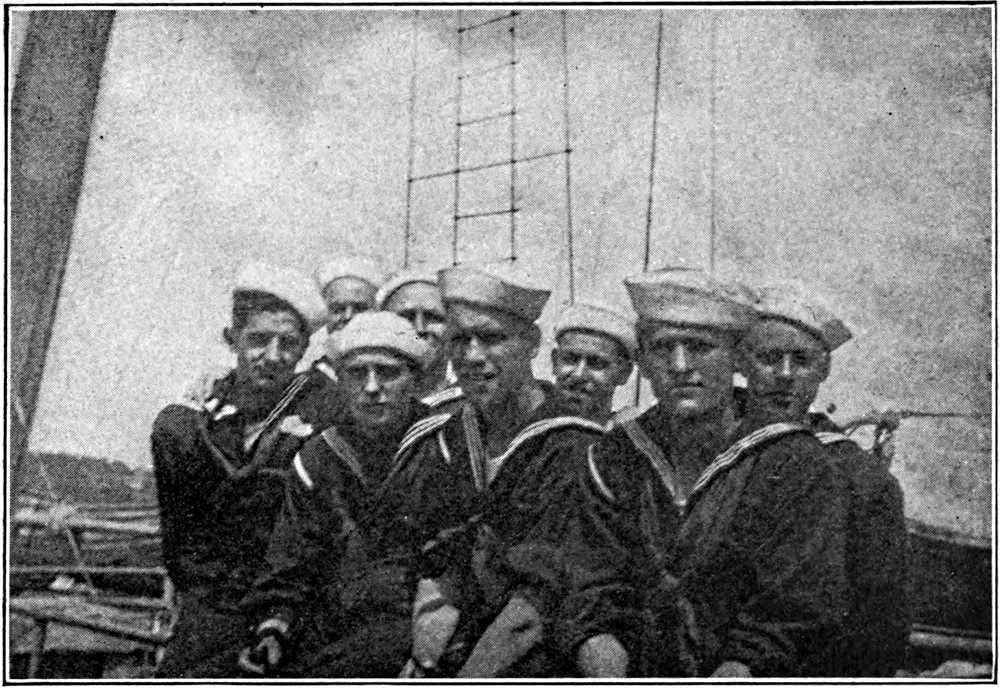
THE KIND OF “GOBS” THE COUNTRY WAS PROUD OF MOST OF THIS GROUP WON COMMISSIONS

Photograph by Underwood and Underwood, N.Y.
THE GERMAN SUBMARINE WAS A TINY TARGET EVEN WHEN ON THE SURFACE
These were tired and grateful sailors aboard the Corsair, for the slow-gaited transports, thirteen days on the voyage, had caused continual anxiety among the war vessels of the escort. The first group had been attacked by submarines, as reported by [Pg 45]Rear Admiral Gleaves, and it was an auspicious omen that every ship and every soldier had been carried across unharmed. The Corsair had been compelled to drop back and join the second group, but it was not her fault. As her skipper in former days, Lieutenant Commander Porter was unhappy, as you may imagine, although he knew that the yacht would vindicate herself when in proper trim and with a “black gang” that could make steam and hold it.
Extra coal and stores had made the draft two feet deeper than normal. One boiler-room was used for coal stowage, but a speed of fourteen knots was to be expected under these conditions. The firemen, trained in a battleship, were green to their task and were bowled off their pins by seasickness. It indicated the spirit of the ship when the petty officers, deck force and all, and as many other volunteers as could find space to swing slice-bar and shovel, toiled in the sultry heat of the furnaces to shove the ship along. Never again was the Corsair a laggard. Month after month on the Breton Patrol or with the offshore convoys, the destroyers were the only ships that could show their heels to her.
The process of “shaking down,” of welding a hundred and thirty men into a crew, and teaching them what the Navy was like, had begun with the hard routine at the docks in Hoboken and Brooklyn. The voyage was the second lesson and it wonderfully[Pg 46] helped to hammer home the doctrines of team-work and morale, of cheerful sacrifice and ready obedience. Those who grumbled repented of it later and held it as a privilege that they were permitted to play the great game. It was while they sweltered to make more steam and urge the ship to greater speed that an Irish stoker expressed himself as follows:
“I have heard tell of the meltin’-pot, but ’tis me first experience with it. Hotter than hell wid the lid off, and ye can see thim all meltin’, and will ye listen to the names of the brave American lads, Brillowski, Schlotfeldt, Aguas, and Teuten that signed on to juggle the coal. An’ will ye pipe off the true-blue Yankee sailors, Haase, and Skolmowski, Fusco, Kaetzel, and Balano, not to mintion such good old Anglo-Saxon guys as De Armosolo, Thysenius, and Wysocki. I will make no invidjous distinctions, but what kind of a fightin’ ship would this be if ye hadn’t Gilhooley, Mullins, Murphy, Mulcahy, Egan, Sullivan, and Flynn? The meltin’-pot! ’Tis a true word. An’ may the domned old Kaiser sizzle in a hotter place, if there is wan.”
One of the boyish bluejackets noted his own change of heart in a diary which contained such entries as these:
June 19th. At 6 A.M. we sighted an empty lifeboat. Don’t know where it came from, as there was no name. We also saw two objects floating quite far off and thought they were corpses, but were not sure....[Pg 47] Stood two watches and had an abandon ship drill and gun practice. Wrote some letters, but don’t know when we can mail them. Sighted a big whale not fifty yards from the ship. It scared me. I was at the wheel and thought it was a submarine. Sleeping in my bunk for the first time since leaving New York.
21st. We are having a typical northeaster and the ship is burying her rails in the sea now and then. We have joined the second group of the fleet. It consists of the Birmingham, four transports, a destroyer, ourselves, and the Aphrodite.... 22nd. The northeaster is still on in full blast and the sea is running high. We hope to reach France Tuesday. The food and the life on this ship are pretty bad, and when this war is over and I sign off I shall devoutly thank God.
23rd. A pretty bad day all round. High sea, rain, and fog. We are now in the war zone and zigzagging back and forth across the ocean. The Birmingham has kept us busy all day with signals. The ship has been very hard to steer and I am tired out. Broke a filling out of my tooth and it hurts. Hope I will get a chance to have it fixed in France. A toothache out here would certainly be bad. Have been unable to take a bath for a week. Am washing in a bucket of water.
24th. Another day of nasty weather. The mid-watch was the worst I ever stood. The fog was awful and when I was at the wheel we almost rammed the Antilles. We also dodged two suspicious-looking steel drums that looked very much like mines.... 25th. Our coal is getting low and we will surely land some time to-morrow morning. I wish I could talk French. Everybody is writing letters home to-day. Stood a terrible watch with Mr. Tod on the bridge. He and Captain Kittinger took turns bawling me out. I almost rammed a destroyer twice by obeying orders to the letter, but[Pg 48] the officers were in a bad temper and blamed me. Gad, but I’ll be glad to set foot on dry land.
Somewhat later this same young man was jotting down:
Whoever reads this diary will probably notice my changed attitude toward what we have to put up with. What seemed unbearable a few months ago amounts to nothing, now that we have become hardened to all things. I have read the whole diary through and laughed at my early grouches.
And so the Corsair came to France and rested in the quaint old port of Saint-Nazaire while her men beheld the troops of Pershing’s First Division stream down the gangways and receive a welcome thrilling beyond words, the cheers and outstretched hands, the laughter and the tears of a people who hailed these tall, careless fighting men as crusaders come to succor them. This was a sight worth seeing and remembering. And when the American sailors went ashore there was an ovation for them, flowers and kisses and smiles, and if such courtesies were bestowed upon the bluejackets of the Corsair, they gallantly returned them, it is quite needless to say.
Seven of the crew were granted liberty for a hasty trip to Paris. Seaman Arthur Coffey was in the party and his written impressions convey a glimpse of what it meant to these young Americans to come into contact with the sombre realities of the struggle which France was enduring with her[Pg 49] back to the wall. It surprised and amused them to find the American infantrymen already so much at home in Saint-Nazaire that their liveliest interest was in shooting craps at the street corners:
Here were soldiers and sailors who had just crossed an ocean full of hidden terrors [observed Arthur Coffey], and most of them were to face worse terrors later on, but did they consider these things? Not for a minute! They had money in their pockets and beer under their belts and this “spiggoty” currency, as they called the wads of paper notes, made them feel like millionaires. The marines had not arrived to police the streets, so they rattled the dice in crowds. For all they saw or cared, they might have been in their own home towns, perfectly indifferent to their surroundings. The French onlookers were different. They were appraising these new comrades-in-arms, whispering among themselves, admiring the equipment and the rugged stature of these soldiers from beyond the seas. We watched the fun until it was time to find the train for Paris and moved away with cries of, “Shoot the cinq-froncs,” “Fade him for a cart-wheel, Bill,” “Come on, you baby,” ringing in our ears.
We got aboard the right train with the kind assistance of a French lady who interpreted for us. It was great luck to get the seventy-two-hour leave, and the crowd was congenial, five men from Princeton, one from Yale, and one from Cornell. The trip to Paris was lengthy because we had to travel second class and sit up all night, being Navy gobs and not officers. The French took us for plain, ordinary bluejackets and fraternized at once. Their style of opening a conversation was to sit and look at you for a time, smile, and then having attracted your attention, with a terrifying[Pg 50] grimace ejaculate: “Le boche, ah-h-h-k!” drawing a hand across the throat. This done they would beam expectantly and, needless to say, we responded with grimaces even more terrifying and repeated the formula. Having mutually slit the gullet of the hated foe, I would add, to show off my French, “Je n’aime pas le boche!” Then the way was opened for a conversation.
“Parlez-vous français, monsieur?” “Mais un peu, monsieur,” I would say, and then bang away with the stereotyped sentence, “I have studied French two years at school and I can understand the language pretty well, but I cannot speak it.” As soon as my friend, the French soldier, heard me rip off this sentence he would open his eyes and say, “Parlez bien français, monsieur” and then start talking so fast that I could not understand a word, and this would be the end of the conversation, on my part, at least.
Some of my companions, however, were even worse performers than I. Poor old Bill Rahill, who was in my class in college, had taken economic courses and so knew no modern languages. All he could say was “Oui” and “Non comprenny, monsieur,” at which I would nudge him and ask if it were not better, perhaps, to have a little culture and know something about a foreign language than to be cluttered up with the Malthusian theory or some other rot like that.
We had a great time on that train to Paris. At the first long stop almost everybody got out and went into the waiting-room, or saloon, and bought various refreshments. We had seen no grass or green trees for two weeks, so we piled out and made for the beautiful lawn near the station. We rolled on the grass and sniffed the pine trees. We were like cats that had been shy of catnip for a long time. I suppose the French people thought we were crazy, but we didn’t care, and [Pg 51]it certainly did feel good to have the green earth under our feet again.
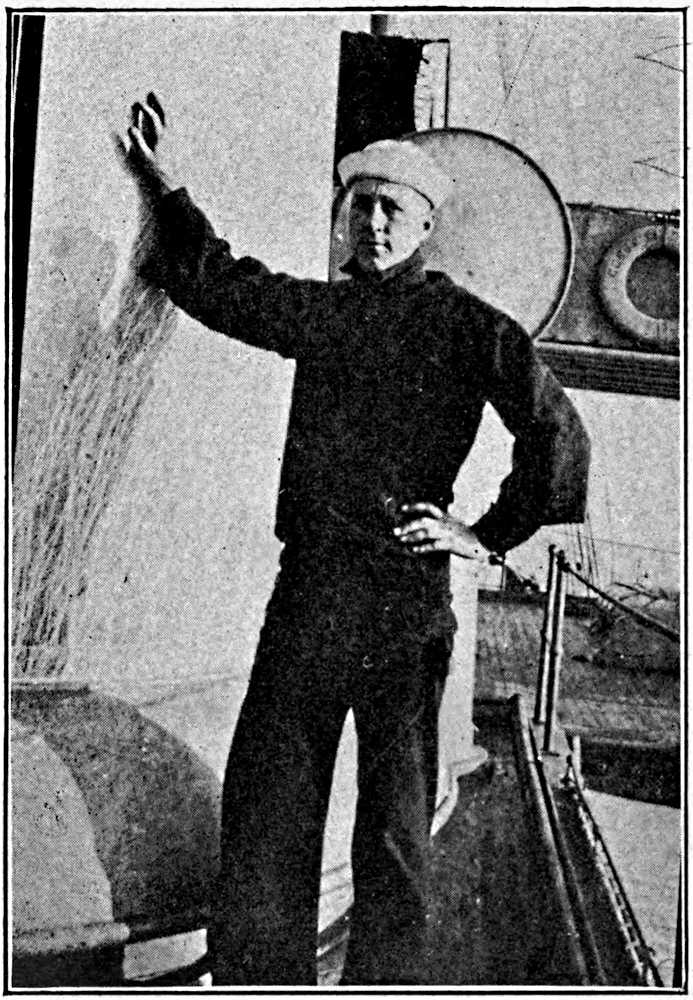
BOATSWAIN’S MATE SEGER, FROM PASSAIC
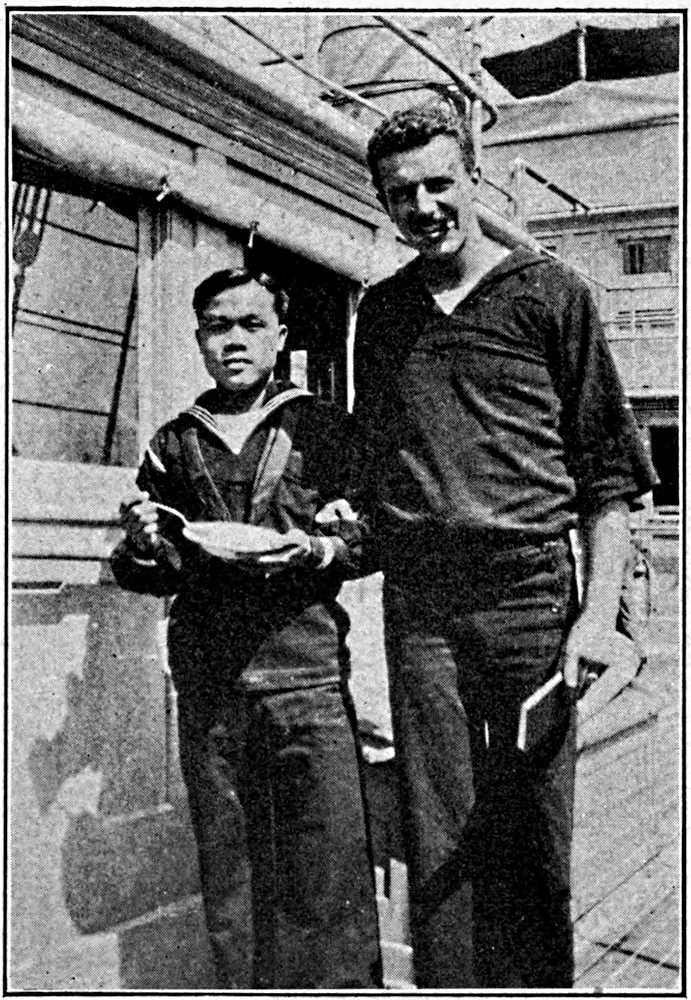
THE TALL ONE IS PHARMACIST’S MATE FEELEY HIS FRIEND IS MESS ATTENDANT MARTINEZ
Then we wandered into the restaurant and loaded up with cheese and a couple of yards of war bread, and one of the fellows bought several bottles of champagne at a ridiculously low price. Thus armed, we climbed into the train where we met two French soldiers who were returning to the trenches. They let us try on their helmets and gas-masks and they spoke a little English, so with plenty of gestures we got on very well. They said they knew we were Americans because we talked through our noses. We took that good-naturedly, but I noticed that my brother gobs began to speak way down in their throats right after that. We chewed on the war bread and washed it down with champagne. That is a great breakfast combination, you can take my word for it. And then some one piped up a song. “Buck” Bayne, Yale 1914, was handy at fitting words to college airs and we soon had a fine concert going. One of the ditties, I remember, went like this, to the tune of “Cheer for Old Amherst”:
Before long we had a crowd around that train compartment that you couldn’t get through to save your neck. The Frenchmen all applauded the Corsair glee club and yelled for more, but we felt too conspicuous and so we persuaded the poilus to sing some funny trench songs, which we couldn’t understand, but we[Pg 52] laughed and slapped them on the back as though we knew every word.
Next morning we arrived in Paris, and, with a few other men from our ship, were the first American sailors in that city since our country had declared war. You can imagine what that meant to us, how the people greeted us with cordial affection and kindness. Thank God, the Frenchmen did not try to kiss us! If the Paris girls had insisted, we should have submitted like gentlemen. We put up at the Hotel Continental, and were more than amused at the expressions on the faces of several dignified English officers when they saw seven common bluejackets of the American Navy blow in and eat breakfast next to them.
That day we ran into lots of friends who were in the American Field Ambulance Service, attached to the French Army, and they told us gloomy tales about the war outlook. They said the Russians were through, that the French were literally shot to pieces, and that the job of finishing the war was up to us. Imagine it—I, who had hoped in May that the Russians would keep on retreating so that I could get a chance to see the show before it was over, was now wishing that the war would end. I have seen the light since that day. We fellows were really feeling the war for the first time when we noticed that the streets of Paris were filled with crippled men and with women in mourning.
We spent two busy days in mixing with soldiers of all nations and doing Paris. The troops who impressed us most, even more than the French, and that is going some, were the Canadians. They gave us such a rousing welcome that it was like being home again. They were so glad to see us that they almost wrapped themselves around our necks. “Hello, Jack,” was their invariable greeting. “How are things over in the States?” “It’s[Pg 53] sure good to see you.” “When are your troops coming over?” “What, you came across with some of them?” “The devil you say!” “Well, all I hope is that they give us a chance to fight alongside the Yanks. We’ll go through Fritz so fast that he won’t know what hit him.”
While we were knocking about Paris with the Canadians, our money was no good. They insisted on buying us drinks, cigarettes, and acted as interpreters. There was nothing they wouldn’t do for us. Our spirits began to rise at once. We asked them about all the pessimistic rumors. Were they true? “Hell, no,” said they. “Why, there’s nothing to it. Shell ’em a bit, then shell ’em some more, and when you go over the top, Fritz just sticks up his hands and yells that he’s your kamerad.” “As soon as he sees the cold steel, up goes his bloody hands,” one little chap confided to me. And he had such a look in his eye when he said it that I think my blooming hands would have been up if he had said the word.
They were the most confident lot of men I ever saw. This was the first visit to Paris for most of them. They had been out there for two years, getting leave only among the little villages back of the line, but they didn’t seem to mind going back to the trenches. And they were always talking about the war and their campaigns. The soldiers of other nations seemed fed up with it, but not so with the Canadians. Why, I heard two of them, a private and a captain, in a heated argument across a table as to how they could capture Lens without letting the Germans destroy the coal mines. The private leaned over and poked the captain in the stomach to emphasize a point, and the captain tried to out-shout his companion. One would have thought them to be a couple of privates.
[Pg 54]
On the morning of the third day we left Paris for our port. Dave Tibbott, a classmate of mine, practiced talking French to a lad in the train, and Bill Rahill said “Oui” and “Voilà” to a pretty girl who shared the compartment. She seemed to be partial to Bill’s smile, for we all had him beaten on slinging the French. When she left the train, Bill helped her out and kissed her hand by way of farewell. When we kidded him about it, he defended himself on the ground that they did such things in France and one must follow the customs of the country.
We had many yarns to spin when we boarded our ship and we were careful to tell the boys about the fine baths in the hotel, although we omitted the fact that there was no hot water. When we described the wonderful soft beds, it looked as though there might be a lot of desertions from the Corsair.
I saw many interesting sights during my stay in French waters, but my eyes went bad and they put me ashore where I stayed a month and a half waiting for a ship to take me home. I was finally sent back to the United States in August and, to my great sorrow, received a medical discharge. The life is hard in the Navy in the war zone, harder than anything I had ever done before, but I would give ten years of my life to have been able to stick it out with the boys on the old Corsair and do my share.
[Pg 55]
When the Corsair arrived on the French coast there was nothing to indicate the vast American organization, military and naval, which was soon to be created with a speed and efficiency almost magical. Supply bases, docks, fuel stations, railroads were, at the outset, such as France could provide from her own grave necessities. Marshal Joffre and Lord Balfour had convinced the Government at Washington that if the United States delayed to prepare, it might be too late. Troops were demanded, above all else. Man power was the vital thing. And so these early divisions were hurried overseas to Pershing with little more than the equipment on their backs.
The Navy was aware of its own share of the problem which was to extend its fighting front to the shores of France as well as to the Irish Sea. To protect the ocean traffic to and from the United States, small, swift ships were required by the dozens and scores, but they could not be built in a day, and, as a British admiral expressed it, “This rotten U-boat warfare had caught all the Allies with their socks down.” Of the naval escort with the First Expeditionary Force, the cruisers returned to the United States for further convoy duty and[Pg 56] the destroyers went either with them or were ordered to join the flotilla at Queenstown. For a short time the Corsair and another large yacht, the Aphrodite, were left to comprise the American naval strength on the French coast. On June 30th, Commander Kittinger received the following instructions from Rear Admiral Gleaves:
When in all respects ready for sea, proceed with the vessel under your command to Brest, France, and report to the Senior French Naval Officer for duty. Exhibit these orders to the Senior United States Naval Officer in Brest. Upon the arrival of Captain W. B. Fletcher, U.S. Navy, report to him for duty.
The tenor of these orders indicated the wise and courteous policy which Vice-Admiral Henry B. Wilson was later to develop with brilliant success—that of coöperation with and deference to the French naval authorities instead of asserting the independence of command which, in fact, he exercised. At this time Captain Fletcher had been appointed to organize the American “Special Patrol Force,” and he was daily expected to arrive in the yacht Noma. The ancient port of Brest was selected as the chief naval base because the French had long used it for this purpose, maintaining dockyards, repair shops, and arsenals, and also because the largest transports afloat could be moored in its deep and spacious harbor. Saint-Nazaire and Bordeaux became the great entry ports for cargo steamers during the war, while into Brest the huge [Pg 57]liners carried twenty thousand or forty thousand troops in a single convoy.
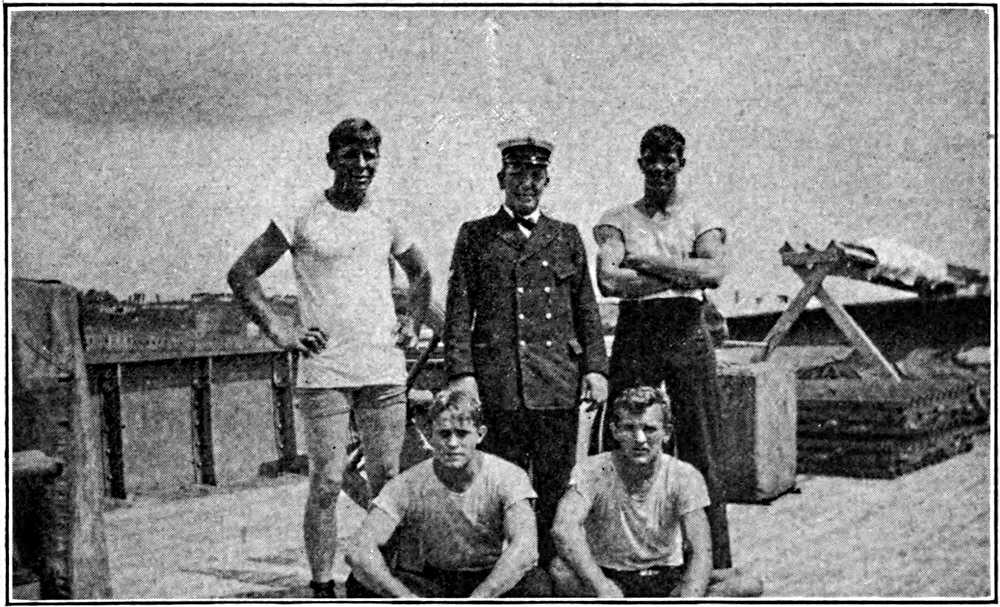
WINNING BOAT CREW IN FOURTH OF JULY RACE WITH APHRODITE
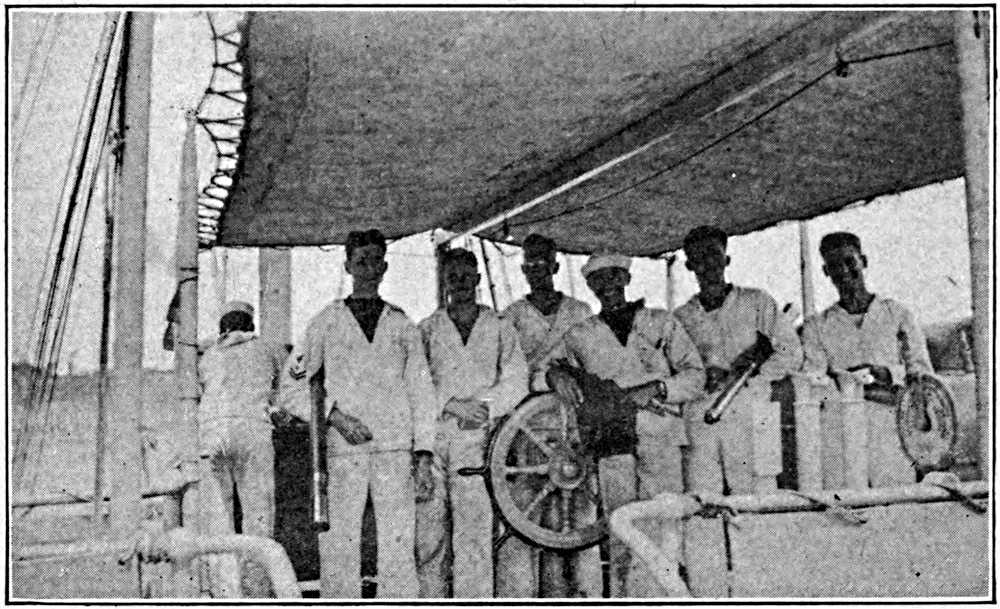
“THE BRIDGE GANG”
The Corsair steamed into Brest on July 2d in company with the Aphrodite and duly reported to Vice-Admiral Le Brise, of the French Navy. Two days later a fleet of other yachts arrived from home and were warmly welcomed, the Noma, Kanawha, Harvard, Christabel, Vidette, and Sultana. With this ambitious little navy it was possible to operate a patrol force which Captain Fletcher promptly proceeded to do, acting in concert with the French torpedo boats, armed trawlers, submarines, and aircraft.
The Corsair lay in port ten days to coal, paint ship, and otherwise prepare for the job of cruising in the Bay of Biscay. An unofficial log, as kept by one of the seamen, briefly notes:
July 2nd. Sailed for Brest from Saint-Nazaire at 4 A.M. Arrived at 3 P.M. and received four submarine warnings on the way. We thought we saw two periscopes, but they may have been buoys. We have added a French pilot to our crew. No shore liberty, as we are too tired. We hear we are to be over here a long time, with Brest as our base.
July 3rd. I spent the day painting the bridge. The ship looks fine. I am also standing a twelve-hour watch in order to give the other signal-men shore liberty. We caught a bunch of mackerel over the side to-day and will fry them. The Aphrodite has challenged us to row them a race to-morrow. A big French dirigible went out to sea to look for submarines.
[Pg 58]
July 4th. A national holiday, but not for us. We won the race from the Aphrodite. The Noma and the Kanawha arrived this morning. They fought a submarine, but no damage was done on either side. We expect to get under way any minute and will look for the U-boat that shot at the Noma. We had water sports in the afternoon and they were good fun.
July 5th. The Sultana arrived to-day. She picked up all the survivors of the S.S. Orleans which was torpedoed on the 3rd. Five of them were put aboard this ship and their description of the sinking was harrowing. Only two lifeboats got away. Four men were killed. The ship sank in ten minutes. According to the dope, the Corsair will sink in three minutes, if struck. Cheerful, what?
July 6th. This was my first liberty in Brest. It is a very old town high on the cliffs. We went through the Duke of Brittany’s old castle which dates back some fifteen hundred years and was once the homestead of Anne of Brittany. The dungeons were mighty interesting. They surely did treat ’em rough in those days. These rooms are more than two hundred feet down in the solid rock and have been dark for ages. I should call them unhealthy. The tortures they used to inflict on the prisoners were diabolical. And yet you’ll hear gobs growling about the Navy. All of which reminds me that life on shipboard has been running along without much change. Several Russian destroyers came into the harbor this afternoon.
July 7th. A lot more of the men got Paris liberty to-day. We had a bad little accident on board. The hook at the bow of the small motor sailer pulled out when the boat was suspended about forty feet above the water. It fell and three men working in it were spilled into the drink. Mr. Mason, assistant engineer, struck[Pg 59] his back and head and was badly bruised.... 9th. I certainly will be glad when the other signal-men get back from Paris. These twelve-hour watches are wearing me out. There are two rumors—one that we are to go to sea again for three days, put in at Saint-Nazaire, out again three days, and then back. The other rumor is that we are going to England. I hope this is correct. This is the first time I have felt homesick, and for some reason to-night I do. I guess it is because poor old Art Coffey is to be shipped back to the States. His eye trouble can’t be treated over here. Nothing has happened aboard ship excepting that the commander told Art that the Corsair would not go back home for a long, long time, if he could help it. Golly, but I would like to go; not to stay, but just to get a glimpse of home and the folks.
July 13th. Spent the morning washing my white clothes. A new rumor! We are to leave here Saturday for five days, put into Queenstown for coal and then back to the States, spend a couple of weeks there and then convoy the National Guardsmen or more of the Regular Army back. I hope this is true. How I would like to see a real country again. France is beautiful, but dead. Brest is no livelier than Edgartown and there is only one Paris. Its name is New York. This was Friday, the 13th, so I was mighty careful to watch my step. To-morrow is the French Fourth of July and it is a big fête day. Wish I were going ashore to see the celebration. Met some Yale men off the Harvard and they are very nice chaps. I am improving on the blinker signals and feel encouraged. No more dope!
The Corsair sailed next day on her first patrol cruise, and the author of the foregoing observations affords us a glimpse of what the job seemed like[Pg 60] while they were becoming hardened to it. He goes on to say:
July 15th. At sea. A cold, rough day. I feel a bit shaky and have a sore throat. Our work out here is answering S.O.S. calls, looking for submarines, and convoying merchant ships. We convoyed one Dane and two Britishers most of the day. One of the Limies had swapped shots with a sub.... No chance to take off my clothes or wash. Took a practice shot at a barrel and hit it at half a mile.... 17th. Ran over a submarine at 2.15 A.M. but could not get a shot at it. This trip has been awful weather most of the time, rain, mist, wind, and fog. Nothing is dry on the whole ship. Anybody that says life in the Navy is a cinch has never been in it. If this war lasts a year we shall all be changed men.
July 20th. Back at Brest. The Harvard came in with survivors of two torpedoed ships. One crew had been blown up twice within twenty-four hours. They had been picked up and then the rescuing ship was sunk. The submarine took the captain and the gunner along as prisoners.... 21st. At sea. This has been a very exciting day. We have seen three submarines. We fired at one periscope and either hit it or near it. When the splash cleared away the submarine had disappeared. We were at our battle stations almost all day. We passed a great deal of wreckage, some of it barrels of oil and gasoline. Also passed an upset lifeboat with two masts and a beautiful big life-raft. We always cruise around such objects before approaching them, as they may be submarine bait. I stood the midnight watch and sighted a light which we headed towards. It turned out to be a large American schooner, deserted and on fire. The masts were gone and it was a complete[Pg 61] wreck. We met a British Naval Reserve ship bound to Africa, a funny-looking craft for ocean work, flat-bottomed with side wheels.
July 23rd. To-day we had lots of excitement. In my watch I discovered an object five miles off which looked exactly like a periscope. I sounded the alarm and we approached it very carefully. It turned out to be a large piece of wreckage with a ventilator on top. More empty lifeboats to-day, and no clew to tell where they came from. At night Captain Kittinger sighted a strange ship which he swore was a submarine. It proved to be a British destroyer and the joke was on the skipper.
July 26th. In port. To-day as per our weekly schedule we coaled ship with the usual results. Filth and coal dust everywhere. Instead of coaling I had to stand a twelve-hour signal watch. In sending a semaphore message to the Vidette I was nearly killed. A Spanish freighter was between the two ships and I had to climb into the rigging about fifty feet above the deck. As I could not hold on with either hand, only with my feet, it was ticklish work. I slipped and started to fall, but luckily caught hold of the rigging in time and saved myself. It was too close for comfort. A torpedo missed the Noma by ten feet. Wow!
July 27th. Sailed this morning to meet and escort U.S. troop-ships. The Aphrodite is supposed to be with us, but she blew a boiler tube and has gone back. We had a pretty close shave this afternoon. Ran into a mine field, but zigzagged through it and, thank God, dodged them all. A mine would blow every one of us to kingdom come without a chance to get a boat over.... 29th. Left the transports we were convoying at Saint-Nazaire and then put out to patrol our regular area. Escorted several ships to-day, most of them[Pg 62] British. One of the Limies was an awful bonehead and when we demanded to know his nationality he showed no colors. We hoisted our battle flag at the fore, but he came to and ran up his ensign just as we were about to throw a shot across his bow. We convoyed a big Cunarder, the Tuscania, carrying mail and supplies from America to Falmouth and dropped her at the end of our patrol area. Our Queenstown destroyers probably picked her up after we left her.... 31st. Early this morning a Greek steamer got mixed in her bearings and nearly ran into us. We had to stop and back at full speed. This is the roughest day I have ever seen on the ocean. The waves are half as high as the mast. We are shipping water almost constantly and it is dangerous to walk on deck.
August 2nd. Left Saint-Nazaire convoying the Bohemian. This is the largest cargo ship afloat, and it is quite a feather in our cap to be given the escort duty. The roughest sea yet and it is impossible to enter our compartment below. Almost everybody seasick. A big wave carried away our hatch ventilator and mess gear last night with a terrible crash. I was asleep, and when the noise came and the water poured down on us I thought we were sinking. I grabbed my life-preserver and started for my station, but got word that all was well, so went back to my bunk. It was soaked, with six inches of water on the deck under me, but I slept anyhow.
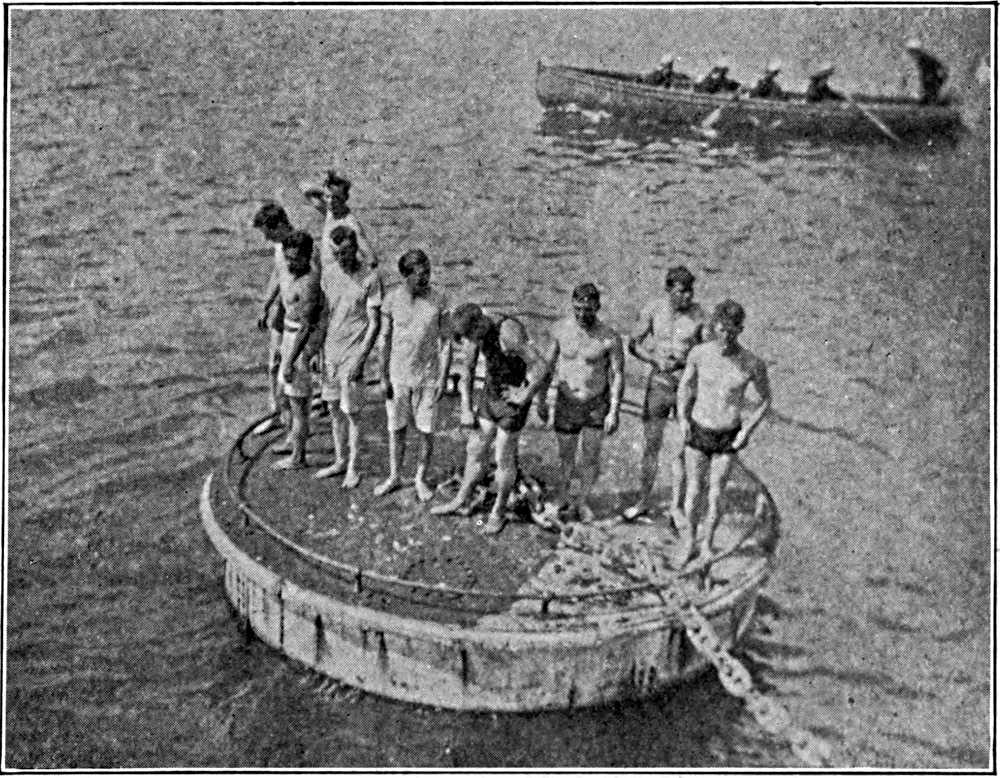
STARTING THE SWIMMING RACE FROM A MOORING BUOY
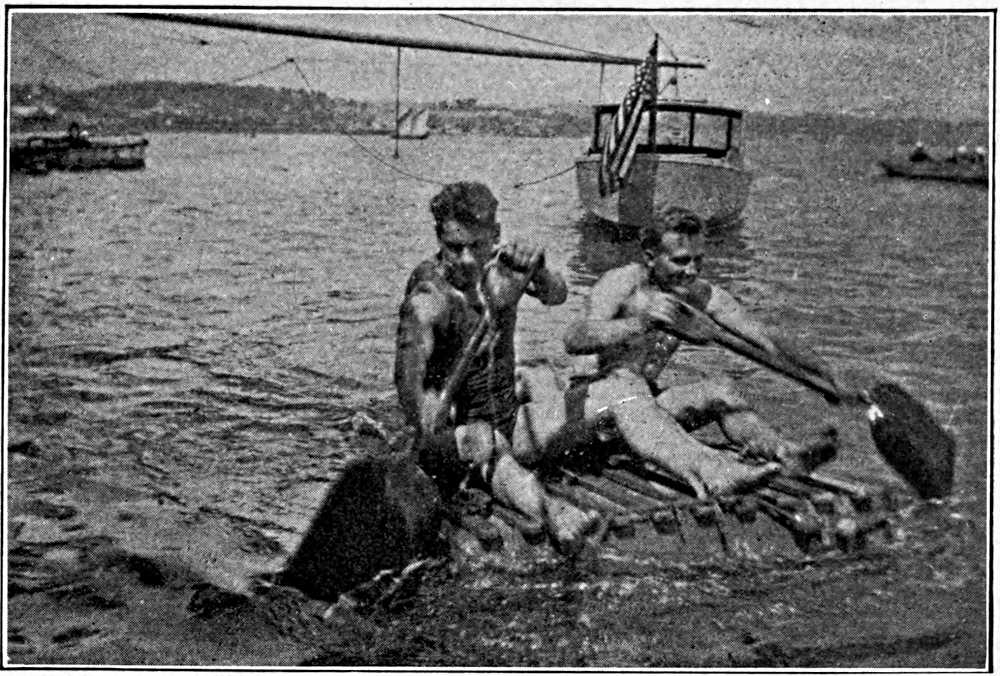
WATER SPORTS ON THE FOURTH OF JULY. THE RACE BETWEEN LIFE-RAFTS WITH COAL SHOVELS FOR PADDLES
August 15th. Convoying the Celtic. We had been at sea only two hours when the fo’castle began shipping water which lavishly deluged the “hell-hole” below, as usual. I slept in the motor sailer and got wet, as usual. It rained on me all night and all I had was one blanket. My clothes dried out in the wind.... Left the Celtic and started for Brest. Got an S.O.S. call and [Pg 63]headed for it. Found three ships there, but no sign of a torpedoed vessel. I understand that she was not sunk, but got away under her own steam. I slept in a boat again. Couldn’t stand it below decks. Hear we coal to-morrow and put to sea again at night. Hope it’s a lie.
August 19th. Got liberty after coaling ship and went ashore. Was hungry, so bought quite a dinner—one omelette, two steaks, two orders of peas and potatoes, tomato salad, three plates of ice-cream, five small cakes, two peaches, coffee, and some champagne. Wasn’t at all hungry when I got through. The life begins to agree with me.
It may be noted that in these extracts from the day’s routine of several weeks of active duty, the Corsair was engaged in patrolling a certain definite area of ocean and in escorting single ships through her block, like a policeman on a beat, or in saving mariners and vessels in distress. Incidentally she endeavored to lift the scalp of Fritz whenever opportunity offered. These areas, as laid off on the chart in degrees of latitude and longitude, would measure perhaps sixty by one hundred miles. The same system was employed by the Queenstown destroyer flotilla during the early months of its service. Some protection was given shipping and the submarines were driven farther offshore, but as an offensive campaign the patrol system was a little better than nothing. Of the destroyer patrol, Admiral Sims had this to say:
The idea is sound enough if you can have destroyers enough. We figured that to make the patrol system[Pg 64] work with complete success, we should have to have one destroyer for every square mile. The area of the destroyer patrol off Queenstown comprised about 25,000 square miles. In other words, the complete protection of the trans-Atlantic trade would have required about 25,000 destroyers.
The alternative and by far the more effective scheme was to group a number of merchant vessels or transports and send them out from port or take them in with a sufficient force of destroyers and yachts to screen the convoy from submarine attack. Valuable ships could not be allowed to run by themselves. This was the procedure worked out and generally adopted after the United States had come into the war, and it made possible the enormous task of placing two million men in France and feeding a large part of Europe besides.
When the Corsair was on the Breton patrol, in company with other American yachts, it was difficult to realize how few U-boats were actually cruising at one time and how great were the odds against finding one in a designated patrol area.
Now in this densely packed shipping area [declared Admiral Sims], extending, say, from the north of Ireland to Brest, there were seldom more than eight or ten submarines operating at any one time. The largest number I had record of was fifteen, but this was exceptional. The usual number was four, six, eight, or perhaps ten. We estimated that the convoys and troop-ships brought in reports of sighting about three hundred submarines for every submarine actually in the[Pg 65] field. We also estimated that for every hundred submarines the Germans possessed, they could keep only ten or a dozen at work in the open sea. Could Germany have kept, let us say, fifty submarines constantly at work on the great shipping routes in the winter and spring of 1917, before we had learned how to handle the situation, nothing could have prevented her from winning the war. Instead of sinking 850,000 tons in a single month, she would have sunk 2,000,000 or 3,000,000 tons.
With such handicaps it was all the more creditable to the Corsair and her sister yachts that they were able to accomplish so much in the summer of 1917, before they were shifted to the troop and supply convoys. It was knight-errantry, in a way, this work of the Breton Patrol—rough-riders of the sea whose spirit was akin to that of the impetuous regiment which Theodore Roosevelt led at Santiago. The Breton pilots were eloquent in admiration, but shrugged their shoulders at the notion of weathering a Bay of Biscay winter in these yachts, so slender, so elegant, of such light construction, of a certainty built for pleasure and le sport!
The programme of patrol duty sent the larger yachts out two and two, each pair to be relieved after four days at sea. The Corsair and Aphrodite were coupled as cruising in adjoining areas, and when they returned to port the Noma and Kanawha went out to take the same stations. The smaller yachts of the “Suicide Fleet” were assigned areas nearer the Breton coast, where they guarded the[Pg 66] shipping that flowed alongshore between the Channel and the ports of France and Spain. The Patrol Instructions included the following plan of operation:
When on an area patrol, vessels shall steer courses to cover the area but the method adopted must be irregular. Do not proceed with such regularity that the vessel’s position may be plotted.
When on a line patrol, vessels shall proceed along the line of patrol until reaching its extremity when a return over the same line will be made. The courses steered must be such that the advance of the vessel will be along the base course.
When on patrol, vessels shall speak all ships sighted. Obtain the following information:
If the vessel spoken is a valuable vessel, and is bound to a port on the west coast of France, below Latitude 48° 30′ North, she may be escorted. The fact that you have taken her under escort is to be sent to the Base by radio, in code, in following manner:
Example: “Baltic under escort, bound to——”
When acting as escorting vessel, keep on exposed bow of convoy and about 1200 yards ahead of her. Insist that all vessels zigzag day and night. Escorting vessels to break joints when courses are changed. Leave patrol and return to Base in time to arrive at or about scheduled time.
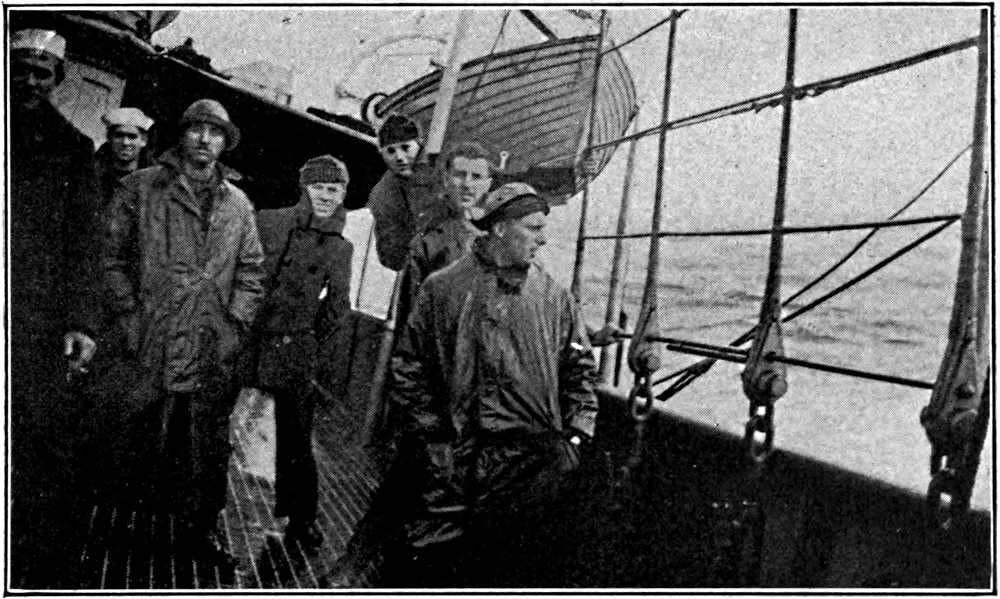
A WET DAY FOR THE DECK WATCH
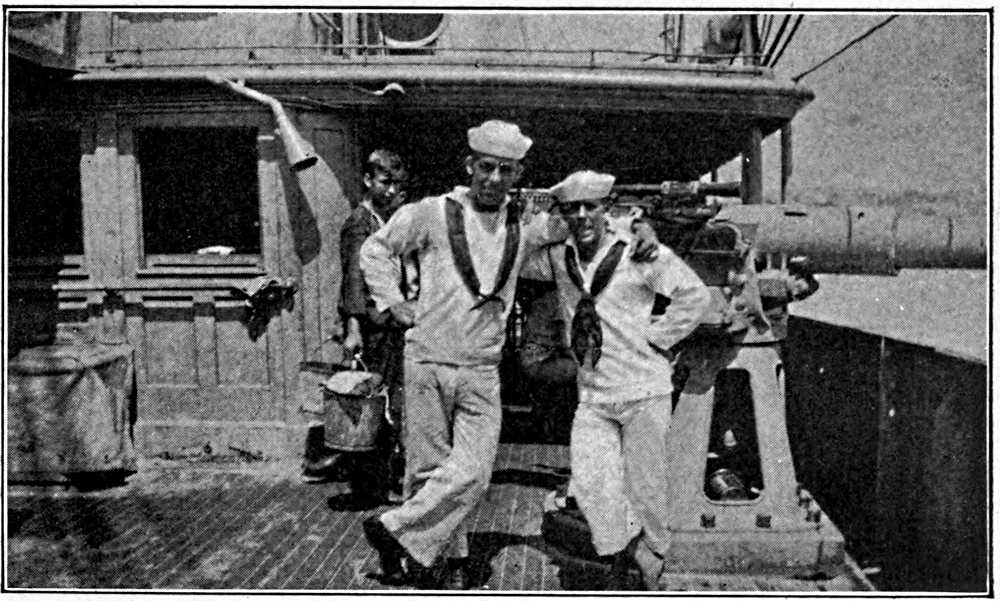
FRENCH AND UNDERHILL ARE DOLLED UP FOR THE CAMERA
[Pg 67]
Calls for assistance from vessels will be answered and in case of disaster crews are to be rescued if possible. Report rescue of survivors by radio in order to receive instructions.
Ordinary cruising speed of the faster vessels should be at least twelve knots. Fires should be kept under all boilers. The slower vessels should maintain a speed of nine knots or over.
Ships returning from patrol will signal, using numerals, the amount of coal and water needed. Coaling may commence upon arrival in port or be done the day after arrival.
When it was desired to have the Corsair find and escort some particular ship or assemblage of them through part of the danger zone, such instructions as the following were sent to her commander:
United States Patrol Squadron, Flag Office
Brest, France, 27 July, 1917
Group Operation Order No. 2.
Force:—Group D.—Corsair, Aphrodite.
American convoy, speed 12 knots, escorted, should arrive Saint-Nazaire 27 July. Make preparations so that it can be piloted to destination without anchoring and without stopping at sea. Saint-Nazaire has been informed. Proceed in company as far as practicable, 28 July, to a position about 50 miles west of Belle Isle, relieving Kanawha and Noma.
Communicate with and join convoy. Radio FFK and FFL for IL (use AFR) the probable hour of the entrance into the Loire. Pilot the convoy as far as G’d Charpentier where river pilots will be ready. Unless otherwise ordered, steer to pass south of Belle Isle. The convoy must not stop at sea or anchor.
[Pg 68]
The Corsair’s log-book and the official War Diary, which was sent as a record to the Navy Department, are so laconic and technical that one might conclude the Breton Patrol to be lacking in all adventure. They serve to check up the yarns spun by the crew, however, and have the merit of accuracy. Omitting the daily entries of courses, position, and speed which could interest nobody, the commander’s record of the first cruise out of Brest reads like this:
July 14, 1917. Under way from Brest for patrol area. Spoke to British steamer Ardandeary bound for Falmouth with general cargo.
15th. Speed 14 knots to investigate intercepted S.O.S. Spoke to British steamer Itola for Falmouth with general cargo. Spoke to Danish steamer Alf from Montreal for Havre, course east, speed 9 knots, with general cargo. She was not zigzagging and was making a great deal of smoke.
16th. Exchanged recognition signals with three French destroyers, escorting cargo ships. Intercepted S.O.S. from British steamer Devon City, light, for Newport News. She had sighted a periscope and fired five rounds at same and it disappeared. Fired one shot from No. 2 gun at a floating barrel, making a hit, distance about 400 yards. Arrived south limit of patrol area. Changed course to west, parting company with steamer Devon City.
17th. Headed for steamer on horizon. Spoke to British steamer Medford for Plymouth with cargo of mineral phosphate. Changed course to escort Medford. Held target practice on floating wreckage. Changed course to east, speed 12 knots, making best of way to Brest.
[Pg 69]
18th. Moored at Base.
19th. Coaling ship.
20th. Cleaning ship and preparing for cruise.
Two more cruises were made in the month of July, but they furnished no thrilling episodes beyond the discovery of the burning American schooner Augustus Weld which, no doubt, had been shelled by a U-boat. What had become of her crew was left to conjecture. This noble four-master was one of many Yankee sailing vessels which dared the war zone, tempted by the chance of fabulous profits, until the War Risk Board refused to grant them insurance. The easiest marks in the world for submarines, they loafed along in infested waters, at the whim of the fickle winds, or drifted becalmed with towering canvas that was visible for many miles. Some of them were sailed by sun-dried skippers from Maine and Cape Cod who vowed they “would take her to hell and repeat if the bonus was big enough.” The episode of the blazing, derelict schooner profoundly impressed the crew of the Corsair. It was their first glimpse of the heartless havoc of the U-boat.
They were learning that the service in the war zone was not all adventure and exhilaration, but, for the most part, monotonous toil and discomfort, just as the soldier in the trenches had found it out for himself. To be wet and cold and slung about in a rolling ship, to return to port and shovel coal until almost ready to go to sea again—this was[Pg 70] to be their lot month after month. The danger of it was always present, but they soon became cheerfully indifferent. It went without saying that at the explosion of a torpedo the yacht would fly apart like a box of matches, but these young men snored soundly in their uneasy bunks until the cruel boatswain’s mate bade them “show a leg” or “rise and shine.”
With the elasticity of the American spirit they adjusted themselves to this new manner of life and to the ways of the Navy. Their language suffered an extraordinary sea change. They talked the lingo of the bluejacket, which is not so much slang as a strong and racy sort of expression. The officers were called “bolo-men” because they adorned themselves with swords on official occasions. One spoke of the ship’s cooks as “food destroyers,” or “belly robbers,” which was sometimes unjust. To pipe down for mess, or the call to meals, was shortened to “chow down,” and the meal pennant was the “bean rag.” “A hash mark” had nothing to do with food, but was the service stripe on a sailor’s sleeve.
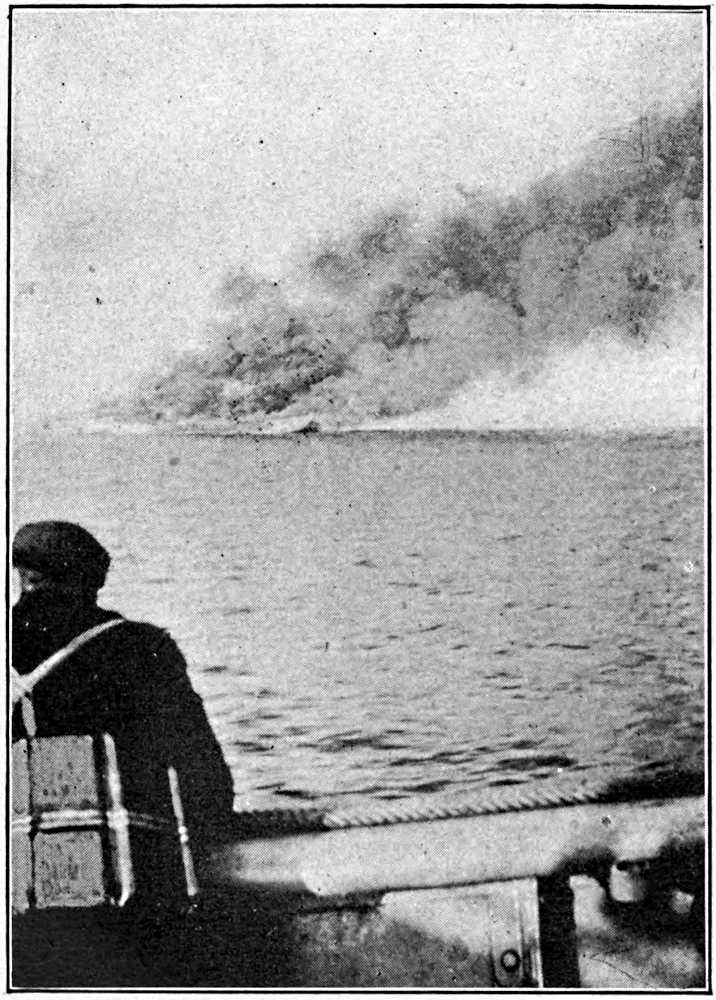
THE BURNING AMERICAN SCHOONER AUGUSTUS WELD
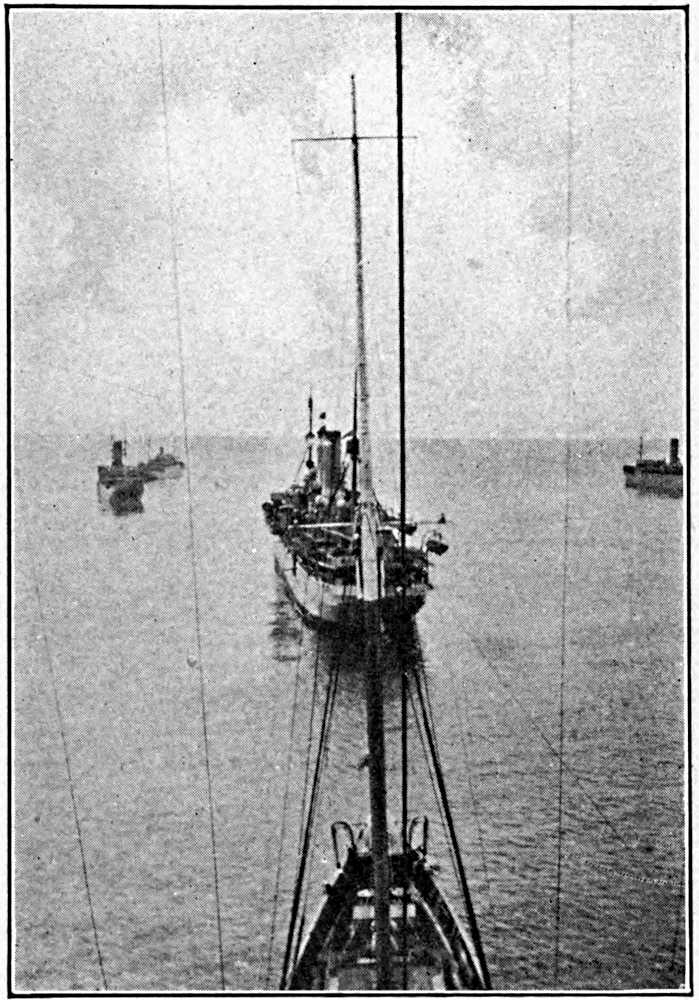
FROM THE CORSAIR’S MAIN-TOP THE CONVOY STEAMS OUT
A “canary” was a man who slept in a hammock instead of a bunk, and when he got up in the morning he “hit the deck.” The Corsair never departed from port, but always “shoved off,” and when her crew was granted liberty they “hit the beach.” Instead of putting on clean clothes they “broke them out.” This phrase was used in so many ways that [Pg 71]a boyish seaman whose best girl had discarded him for a doughboy was heard to confide that he “had broke out a pippin of a new one.”
The period of enlistment was a “hitch” or a “cruise.” The depth charges were seldom called such, but figured as “mines,” “ash cans,” or “battle-bricks,” and the deck upon which they were carried was always “topside.” Almost any foreigner was a “Spic,” barring the Briton who was always a “Limey.” The yeomen, gunner’s mates, and quartermasters of the Corsair were “politicians,” which slurred their habits of industry. “Four bells” meant to move rapidly, and the weary sailor did not fall asleep, but “calked off.” At the mess table it might divert a landsman to see the catsup bottle pass in reply to a request for the “red lead,” or to hear, “Put a fair wind behind the lighthouse” when the salt cellar was desired.
During these early months of foreign service, both the morals and the morale of a ship’s company were bound to be tested. Jack ashore was traditionally presumed to take the town apart to see what made it tick. But this was a different navy, just as the American Army was to set new standards of behavior and self-respect. Among the crew of the Corsair were all sorts and conditions of youth released from the restraints of home ties and subjected to all the demoralizing influences which must ever go hand-in-hand with war. It was a saying among troops freshly landed, when they were[Pg 72] inclined to run riot, that France had gone to their heads, and there was something in the excuse.
It was most noteworthy that the conduct of the sailors of the American naval forces was everywhere commendable, whether ashore in Brittany, or at Queenstown, or with the Grand Fleet at Edinburgh. They were, in a sense, on honor to acquit themselves as became the flag and the uniform, and in character, intelligence, and upbringing a large percentage of them represented the best blood of the United States. This was true of the Corsair and also typical of the other ships manned by the Naval Reserve Force on the coast of France.
Shore liberty at Brest was diverting as a respite from the crowded ship and its routine, but the novelty was soon dispelled. It was picturesque and colorful to ramble in the Rue de Siam where the soldiers and sailors of many races jostled each other, but until the Y.M.C.A. established its social centre in the port there was not much else to do than eat and loaf and drink white wine and red. Of the three days in port, coaling ship consumed so much time and energy that leisure hours ashore were brief. There was no coaling machinery at this important French naval base, and the American yachts had the back-breaking job of filling baskets from barges alongside and heaving the fuel aboard to be stowed in the bunkers. The grimy slaves of the shovel envied the Queenstown destroyers when these smart, immaculate craft tarried to fill their fuel[Pg 73] tanks with oil by inserting a hose in the deck and then fled back to their own base.
Among the songs inspired by the day’s work it is no wonder that the fo’castle or the “black gang” quartets should have led the close harmony in such stentorian plaints as the following:
COAL ON THE CORSAIR
(Tune of “Cheer for Old Amherst”)
There were temptations enough, Heaven knows, to live recklessly when the liberty boats hit the beach, but the Corsair’s record was excellent and her officers were proud of it. During July and August of 1917, when the crew was new to the game and the tendency to run wild was perhaps strongest, almost[Pg 74] all the offenses for which the commander held mast and which were passed upon by deck court-martials comprised overstaying liberty by a narrow margin of minutes and other small infractions of the strict disciplinary code of the Navy. And it should be mentioned that the enlisted force was permitted to be ashore no later than nine-thirty o’clock in the evening. During the whole sojourn of the Corsair in foreign waters, not a member of her company was punished by a general court-martial. By way of indicating how naval justice was dispensed, the entries in the log will be found to read like this:
| 20 minutes overtime from liberty. | Lose pay amounting to $5.00 |
| 35 ” ” ” ” | ” ” ” ” ” |
| 47 ” ” ” ” | ” ” ” ” ” |
| Smoking below decks. | ” ” ” ” ” |
| Disorderly and creating a disturbance after pipe down. | ” ” ” ” ” |
| Insubordination and insolence to a warrant officer. | Warned. |
| Not keeping an efficient lookout. | ” |
| Not making up bunk. | ” |
| Not relieving watch on time. | Excused. |
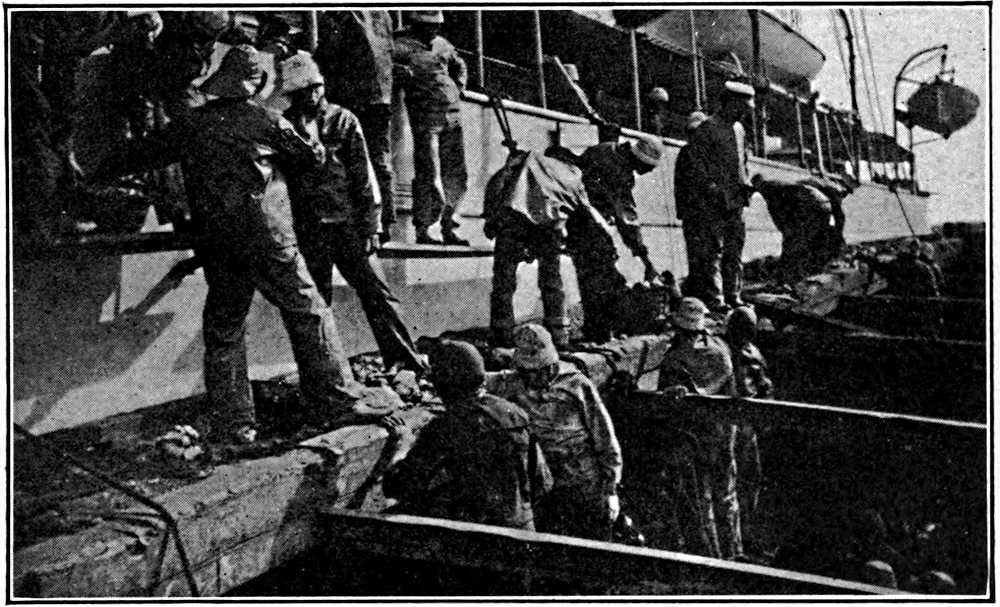
“COAL ON THE CORSAIR, FILL EVERY BIN.”
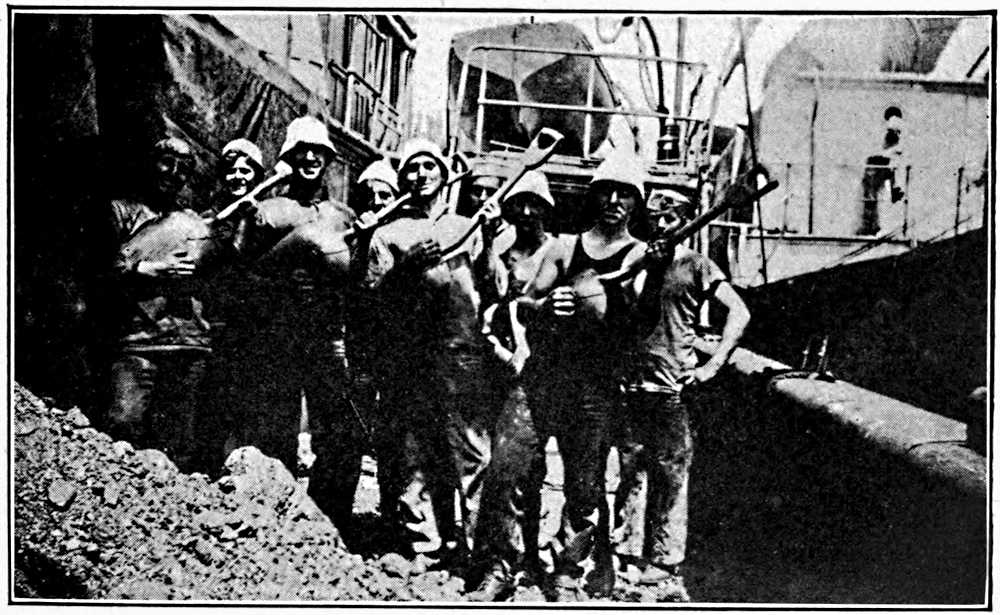
“WE WORK LIKE HELL, BOYS, TILL IT’S ALL IN.”
As was bound to happen, an occasional “drunk and disorderly” was included in these lists, but there were many kinds of men aboard and such entries were amazingly infrequent when one considers the circumstances. And the exiles of the Corsair learned that there was possibly as much truth as poetry in the jingle which ran through the ships of the Breton Patrol: “The Guy that Rates the Croix de Guerre”:
[Pg 75]
[Pg 76]
During the first three months of war duty, June, July, and August, the Corsair steamed 11,738 miles, which was the greatest distance logged by any of the yachts during the same period. There was little time or opportunity for the grooming and tinkering which a pleasure craft is presumed to receive. Blow high, blow low, she went to sea at the appointed hour and the fires were never dead under the boilers. In her forward deck-house was a couplet, carved on a panel of wood, which she was living up to in full measure:
The first cruise of August took the yacht to Saint-Nazaire, on the 4th, in company with the Aphrodite, Kanawha, and Noma, to escort a group of empty transports to sea. This was safely accomplished, and the Corsair returned to Brest where the Celtic was waiting to be guarded through the danger zone. For lack of destroyers it was the business of the yachts to take the big ships out after they had discharged their troops or supplies. Having parted company with the Celtic at Fourteen West and wished her good luck, the Corsair hastened back for coal and further orders, which were to cruise[Pg 77] in the regular patrol area. The American steamer Carolyn was expected, inbound and running alone, and the Corsair searched a waste of waters until the magic of the radio found the unseen ship and whispered to her this comforting message:
I am thirty miles west of you. Pass north of Belle Isle and I will intercept you at daylight, in time to escort you into Quiberon Bay.
The skipper of the Carolyn had become a trifle confused in his bearings and was glad to be led to a safe anchorage where he could join a coastwise convoy for Bordeaux and so reach his destination.
To the Corsair then fell the experience of protecting a cargo steamer whose speed was so slow that she crept through the dangerous stretch of sea like a rheumatic snail and was a tempting target for any prowling submarine. It was all in the day’s work, although a bit trying to the nerves, and Commander Kittinger’s report indicates the nature of the task:
The Corsair was assigned to escort duty with the American steamer Manto bound from Saint-Nazaire, France, to America. A conference was held with the captain of the Manto at Saint-Nazaire on the evening of August 22nd, the day before sailing. The Manto is a small, low-powered steamer under charter by the Navy Department. The captain stated that he could make between eight and nine knots in favorable weather, but with a head sea and a stiff breeze he could not make more than six knots.
At 10.12 A.M., August 22nd, the Manto was ready and got under way with Corsair escorting. The route[Pg 78] was laid through Chenal du Nord and into Quiberon Bay at Croisic. During this time the Manto was able to make about six knots on the course, not zigzagging in these waters. After entering Quiberon Bay she was able to make eight knots. The wind continued in force from the west and at 3.55 P.M. the convoy and escort anchored at Quiberon Peninsula to await more favorable weather.
The wind continued in force and direction during the night, but to avoid further delay a start was made at 5.23 A.M., August 24th. After clearing Teignouse Passage, took up Base Course 275°. Convoy was unable to make more than five knots good into the rough head sea and strong breeze from west. Escort steamed at ten knots and zigzagged at 45° and 60° on each side of Base Course in order to keep position. This continued throughout the morning and at noon Penmarch Point was still in sight.
During the afternoon the force of the wind diminished and the convoy made better headway. By noon, August 24th, the wind became a light breeze and the convoy was making about eight knots good on the Base Course. After noon the barometer fell decidedly, decreasing a half inch in eight hours, and with it the wind increased to a strong breeze with an overcast sky and driving rain squalls which reduced the visibility to practically nil. The convoy dropped back to about five knots.
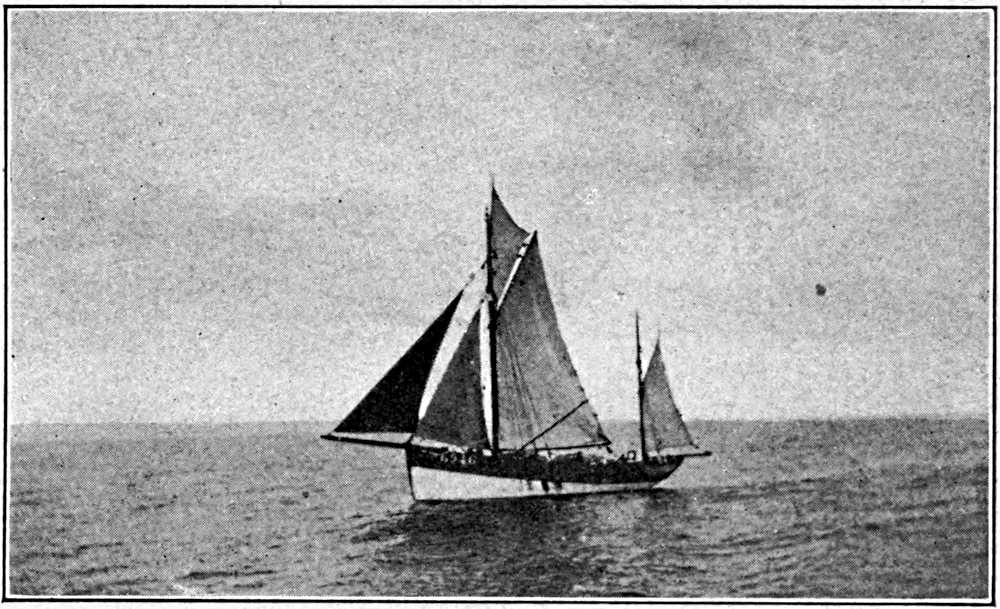
A FRENCH FISHING SMACK WHICH DARED THE RUTHLESS WARFARE
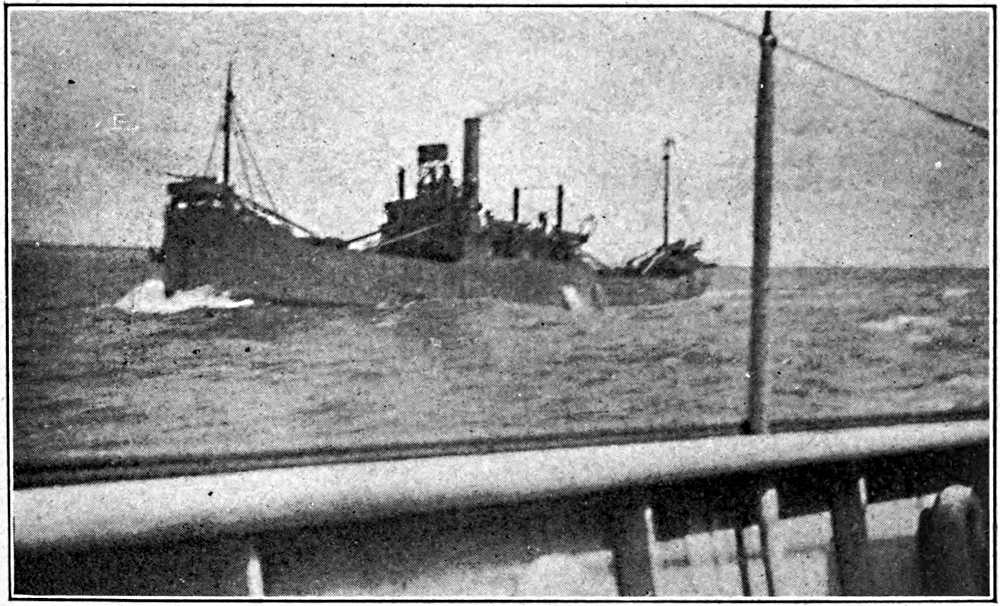
THE S.S. MANTO, WHICH SPED THROUGH THE WAR ZONE AT FIVE KNOTS
Up to the time of darkness the convoy and escort were making so little progress that a hostile submarine would have been able to manœuvre and attain any position desired for attack. After darkness the lack of visibility was the best protection that could be had. I believe that the best scheme for getting a low speed vessel of the Manto type through the danger zone from [Pg 79]Saint-Nazaire would be to have her proceed from thence to the Brest rendezvous with the convoy using the protected inshore waters. After arrival at Brest she should await favorable weather so that she could be escorted through the danger zone at her best speed.
By way of variety, the Corsair was next ordered to the English Channel to pick out the American supply ship Erny from a convoy escorted by H.M.S. Devonshire and carry her into Saint-Nazaire. This was the first taste of the Channel Patrol, of cruising in those black and crowded waters where the numerous routes of traffic crossed and converged, and ships ran blind with no lights showing, and the risk of collision was much greater than the chance of submarine attack. The yachts regularly assigned to this coastwise escort duty saw more of it than the Corsair, but she learned to know the meaning of that lusty chantey of the war zone, “On the Channel Run”:
The Corsair laid a course for the secret meeting-place where she hoped to make contact with the convoy and picked up the Lizard Light, cruising in rough water for a day and a night until the flotilla of merchant ships was sighted, when she signalled the Erny to follow and so returned to France. This errand brought the month of August to a close. It would have seemed incredible to the crew, before they sailed from home, that they could spend a summer in the war zone and steam more than eleven thousand miles without seeing a submarine or enjoying the excitement of a torpedo attack. They had passed large quantities of floating wreckage, tragic evidence that the enemy was active, and the S.O.S. calls of frightened ships had often come to the radio-room, but this was all. One inference was that the yachts had been of real service and that the U-boats were learning to be wary of them and their rapid-fire batteries.
[Pg 81]
The autumn was to be much more eventful. On September 5th the Corsair stood out from Brest to look for an American supply convoy which included the valuable steamers Edward Luckenbach, Dakotan, Montanan, and El Occidente. While steering for the latitude and longitude named in the confidential orders, a small boat under oars and sail was descried from the bridge. A few minutes later a second boat was sighted, and the Corsair bore down to save the castaways who were frantically appealing for help. They were in two dories, eleven men in all, who were hauled aboard and made comfortable by the crew of the yacht. They were from the French fishing vessel Sadi Carnot which had been shelled by a submarine while homeward bound from the Grand Banks to Saint-Malo with a cargo of salted cod.
Impassioned, with many gestures, these weather-beaten Breton sailors cursed the Germans who had placed bombs under the hatches of their beloved bark. The Corsair’s men listened eagerly while they cheered their weary guests with sandwiches and coffee. Presently a hail from the bridge announced that another boat was adrift to the westward, and the mariners of the Sadi Carnot yelled vociferous joy. Five more comrades of theirs were deftly picked up, leaving three boats still unaccounted for, and the Corsair searched for them in vain.
Another boat was discovered a little later, it is true, but the men in it made no sign—four of[Pg 82] them, all corpses which washed about in the water under the thwarts or were grotesquely doubled up like bundles of old clothes. They were English seamen and the boat bore the name of the British steamer Malda. As one of the Corsair’s signal-men wrote in his diary; “It was a ghastly sight. The French fishermen we have on board were almost starved and frozen. They could not have lived more than another day or so. Imagine their feelings when they saw the Malda’s boat with the dead men and knew that this would soon have been their own fate.”
It was later reported in Brest that another ship had picked up the Malda’s boat in passing and had discovered that the bodies of the English sailors were riddled with bullets from a machine gun, presumably after they had abandoned their steamer.
The Corsair kept on her way and had no trouble in finding her convoy of four vessels with which she started for Saint-Nazaire at thirteen knots. Off Belle Isle, the Montanan developed a fit of hysterics and opened fire on an imaginary flock of submarines which turned out to be blackfish in a sportive mood. The other merchant steamers promptly joined in the bombardment and banged away for all they were worth, at the same time stampeding most zealously. They scattered over the sea like hunted ducks and the indignant Corsair endeavored to recall and soothe them.
“We could see what they were shooting at,”[Pg 83] noted a quartermaster on the yacht, “but believed it to be the splash of a big fish. However, they were thoroughly convinced that Fritz was out to pull some of his morning hate stuff. The ships of the convoy were so excited that they shot all over the ocean. One of their shells missed us by a hundred yards or so and we got sore. I sent them a signal, ‘Cease firing at once and come within hail.’ They paid no attention, but we rounded up the bunch and escorted them safely into port and then beat it out to sea again.... We passed close to a submarine last night, but could not find him. We got the smell of his Diesel engines and I guess he was charging his batteries and ducked under when he heard us.”
The emotions of this startled convoy were not easily calmed, for the commander of the Corsair records, an hour after the alarm, “Proceeding again in close formation. The Edward Luckenbach fired one shot at a flock of gulls on the water.” Concerning the general bombardment he officially observes:
The Montanan opened fire at a disturbance made by a large fish, abeam and to port, distance about one mile. The fish was clearly seen and observed from this ship when it jumped from the water twice and then swam away near the surface. A few minutes later a school of porpoises appeared and all the transports opened fire. The firing was widely dispersed and apparently not aimed at any visible object. The shells from the Montanan landed abreast of the Corsair. None of them burst. The Oise, a French vessel of the escort, attempted to investigate the splash made by the fish[Pg 84] but had to draw away when fire was opened at the porpoises.
These false alarms happened often, and during her next tour at sea the Corsair sounded the call to battle stations on two different occasions, reported as follows:
(1) Sighted an object which was believed to be a submarine about four miles ahead. Two submarine warnings were received, one before and one after sighting object. Upon arriving at point where object had been sighted, no evidence could be detected of the presence of a submarine.
(2) Sighted object on starboard beam, distance 3000 yards, which appeared to be a periscope. Informed convoy and headed for object. No. 1 gun crew opened fire when object became visible in gun-sight telescopes, followed by fire from convoy. When we approached close to object it proved to be a black spar, riding about vertical, six feet out of water. The heavy swell running caused the spar to disappear at intervals, which gave it the semblance of a submarine operating.
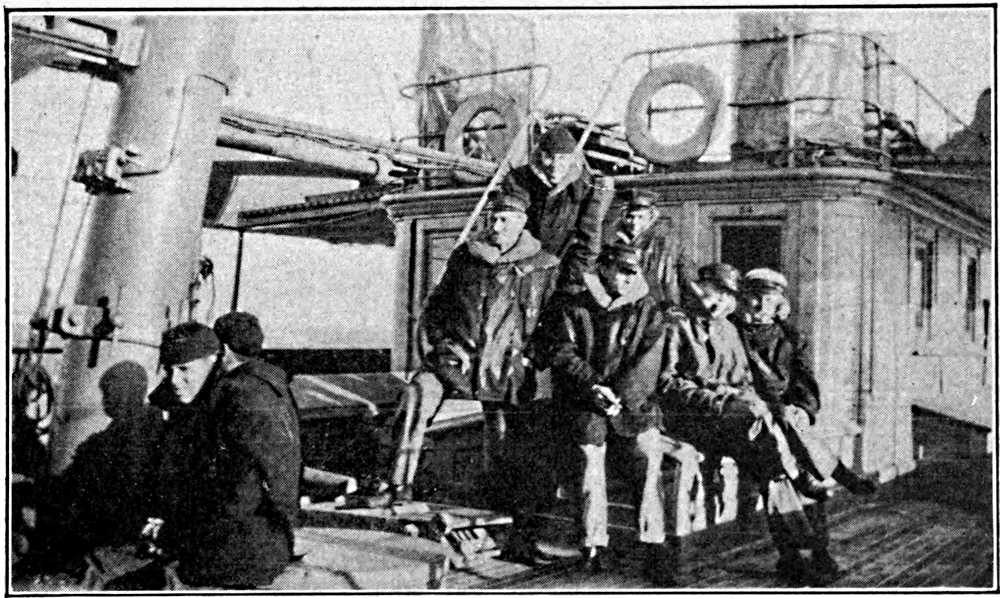
A GROUP OF CHIEF PETTY OFFICERS
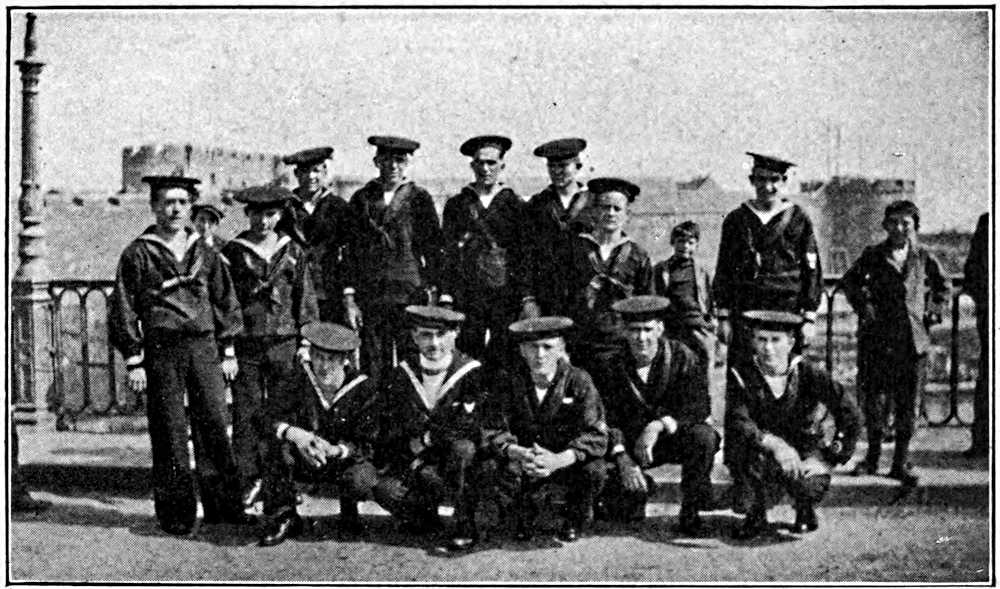
A LIBERTY PARTY AT BREST
Until the merchant convoys became more accustomed to the routine of their hazardous employment, they were a source of almost continual anxiety to the yachts and other naval craft escorting them, and the work was more harassing than may appear on the surface. As a sample one may select from the Corsair’s daily experiences such an incident as the following, under date of September 5th:
Signalled French gunboat Oise to take position on port bow of leading transport. Corsair took position on [Pg 85]starboard bow. The El Occidente was rapidly gaining position. Proceeded about five miles and El Occidente turned out of formation and slowed down. I then ordered Montanan to reduce speed until convoy had caught up and then proceeded with the Corsair to El Occidente. Found out that this steamer had sighted the ship’s boat of the S.S. Malda with four dead men in it and had stopped to investigate. I ordered her to rejoin immediately and cause no further delay, and also to stop using her signal searchlight as evening twilight had come on. On rejoining, found that the transports had gotten in line abreast and were all communicating with each other by signal searchlights. By this time it was growing dark and it became necessary to order them by radio to cease signalling with lights. They paid no attention to signals to form column and continued the formation of line abreast covering about four miles front. About 9 P.M. the moon rose so that all ships were visible. Went close to each and ordered them to form column. By 10 P.M. succeeded in getting them in column formation.
The Corsair’s crew had been hoping to visit England and the opportunity came, but not precisely as they might have wished it. The yacht was ordered to proceed to Devonport on September 13th to load a cargo of depth charges for the other naval vessels on the French coast. It was something like asking a man to make a railway journey from New York to Boston with a stick of dynamite in every pocket of his clothes. With luck it might be done, but he would feel painfully eager to avoid any more bumping or jostling than could be helped. And as has[Pg 86] been said, the Channel was an extraordinarily crowded and darkened thoroughfare. This was getting on with the war, however, and the unterrified Corsair duly anchored in Plymouth Harbor. Instructed by Admiralty officers, she shifted to moorings at a jetty of the British naval docks where a lighter came alongside, and the Corsair bluejackets, with gingerly care, hoisted in almost a hundred “ash cans.” This quick-tempered merchandise included such items as these:
Of this trip to England, one of the petty officers wrote in his little notebook:
Caught my first glimpse of John Bull’s country early this morning when we arrived at Plymouth, a very beautiful spot. A British army camp is on the hill and we are soon to have a base here. It sounds good to hear the English language again. Rated liberty and had a splendid time. I guess we will make some knots on our way back to Brest, as we have enough TNT on board to blow up the whole fleet. If a submarine hits us this time—good-night! I hope the luck of the Navy will take care of the old ship this cruise.
September 15th. Got back to Brest at 11 A.M. Our radio picked up two German submarines near us which were talking with Zeebrugge. They were probably looking for us and our cargo of mines, but we gave them the slip. When we hauled out of Plymouth the[Pg 87] British jackies on their warships gave us cheer after cheer—yells of “Hello, Hello, Yanks,” “Hurrah for the Corsair,” and “Three cheers for Uncle Sam.” They handed us more cheers when we sailed and we gave them as good as they sent. Plenty of excitement last night. I noticed a rowboat with two men in it hovering around the ship. I hailed them, but got no answer. They left, but the same boat approached the gangway an hour later. I threatened to shoot them and they turned around and vamoosed. I can’t imagine who or what they were, but it was peculiar that they should pick this night to hang about, when we had all those mines aboard.
September 16th. I had a long talk with a couple of British sailors off the Goshawk. One of them had been in the Jutland battle. He tells me the Germans have invented an artificial fog to hide behind, something like our smoke screen, but better. The English are experimenting with it. They got the fog all right, but it nearly asphyxiated every man in the ship.... I don’t know what has happened to all our officers. They are so blamed disagreeable that there is no pleasing them. They canned Copeland off the bridge and put me back on signal watches. I wanted to know why I had been rated a quartermaster. They said it was so I could draw the extra pay. I darn near threw it in their faces. If I can’t hold the job I don’t want the rate.
The Corsair was again assigned to the convoys and the same chronicler has this to say of the remaining days of September:
21st. Saw a very wonderful sight. Two submarines were reported off Belle Isle, so we had an extra escort of four seaplanes, four little fighting aeroplanes, one[Pg 88] seventy-five-foot chaser, and a big French dirigible. They went out to help us carry some empties beyond the war zone, the same ships we had taken in, Montanan, Dakotan, Luckenbach, and El Occidente. The air craft flew over us fifty miles offshore. The dirigible made the signal, “Submarine below” but he was so far off that he had submerged when we got there. Another dirigible came out from Brest and looked us over, but soon went back. This evening we passed the body of a dead sailor, but did not pick it up; also an empty dory. Aphrodite and Alcedo are with us.
The American Army had begun to move overseas in a swelling tide of khaki and the transports came faster and faster. No sooner had the Corsair seen the last of one group than another was waiting. On September 28th she left port to seek contact with the store-ships City of Atlanta, Willehad, Artemus, and Florence Luckenbach, and a British destroyer which was the senior vessel of the escort. Having found them, the subsequent proceedings were such as sprinkled gray hairs on the heads of the commander and the officers of the Corsair. The War Diary records it in this summary fashion:
September 29th. Noma signalled by blinker tube that City of Atlanta, the last ship of the convoy, was having engine trouble and could not keep position. Signalled to Noma to stand by her. Noma and City of Atlanta dropped astern and disappeared in the darkness.
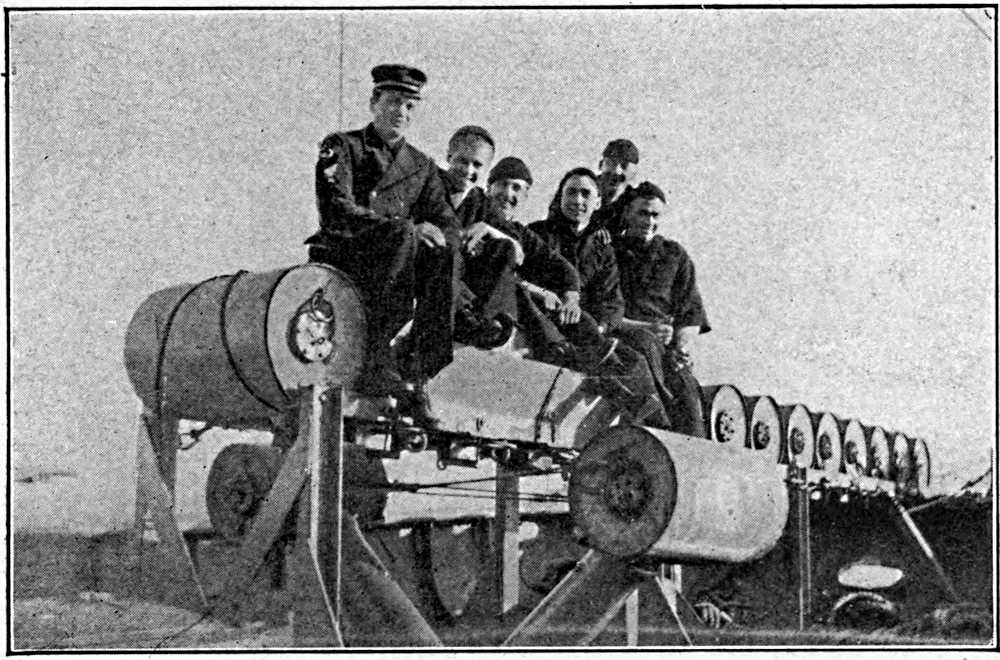
THE GUNNER’S MATES AND THE LONG ROW OF DEPTH CHARGES READY TO PLOP OVER THE STERN
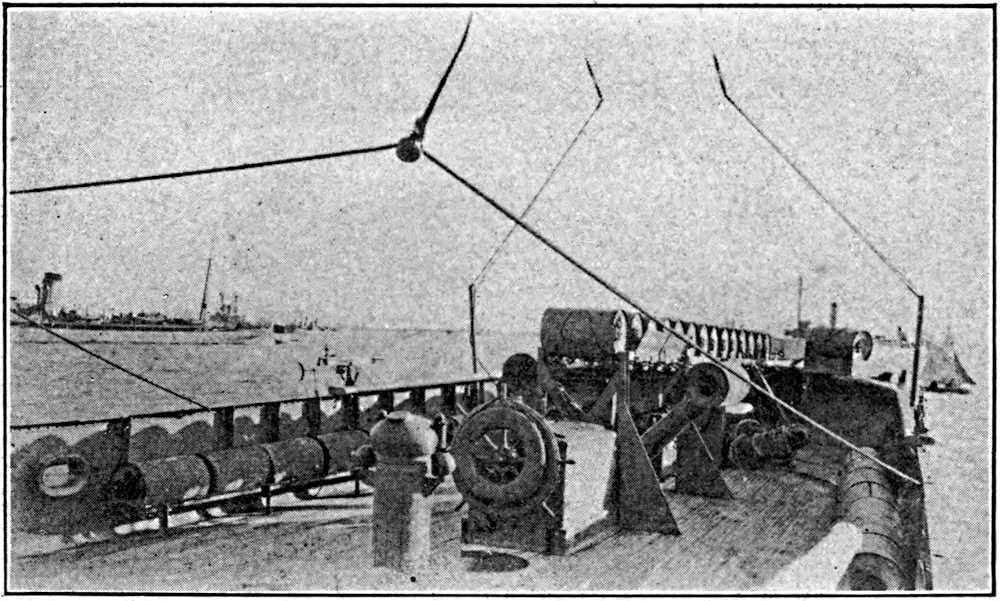
ANOTHER VIEW OF THE MINE TRACK, SHOWING THE Y GUN OR DOUBLE MORTAR
3.32 A.M. Received radio from Alcedo, “I have been rammed by convoy. Stand by.” Headed back to look for Alcedo and found the Willehad out of position and making the best of her way to rejoin. Communicated with [Pg 89]the Willehad by megaphone and was informed that she had fouled the Alcedo but that the yacht had rejoined and was in position with the escort. During this détour, received from the Noma, “I am proceeding with the City of Atlanta.” At this time a large convoy was observed standing to the northward and cutting off the Noma and City of Atlanta from our convoy.
6.15 A.M. Received from Noma, “Lost City of Atlanta about 4.30 A.M. in passing through large convoy. Is she with you?” The Noma was instructed to search for the missing ship and escort her in.
8.44 A.M. Noma reported that she had found the City of Atlanta and was proceeding to Teignouse Channel.
So much for the routine of faithful endeavor, continual danger, and incessant vigilance! The month of October was very different. It was memorable in the Corsair’s calendar because she fought a submarine, rescued many survivors of abandoned ships, and saw two fine transports torpedoed, the Antilles and the Finland, with heavy loss of life. There was no more grumbling at the uneventful drudgery of war. The crowded activity began on the second day of October when this radio message was caught and decoded:
To all Allied men-of-war,—from Land’s End:
Picked up five men of French fishing vessel sunk by submarine.
Five boats still adrift—twenty-one men. Position 39-JSD.
The Corsair was in company with the yachts Wakiva and Alcedo, and promptly signalled them to[Pg 90] disregard her movements as she was going in search of survivors. Shortly after noon, the wreck of a schooner was sighted, the hull awash, and many barrels of oil floating near it. The Corsair’s gunners fired seven shots into the derelict, but were unable to sink it and the yacht hastened on her errand of mercy, guided by the squared areas of the secret chart to which the radio message had referred. Three hours later the first boat was found, a dory four men from the French fishing bark, Saint Pierre, which had been set on fire by a boarding party from a U-boat one hundred and eighty miles off Ushant.
The mate, who was one of those rescued, swore that after the crew of the Saint Pierre had scrambled into the boats two more large submarines appeared, and that all three of these infernal sea monsters had made a circuit of the hapless bark before destroying her. It was also his belief that each submarine was very formidable, at least a hundred metres in length and mounting two large cannon.
The crew of the Corsair cheered at the tidings while they sympathized with the forlorn fishermen. “The U-boats were coming in bunches,” joyously reflected the deck force, and the “black gang” slung the coal with an earnest determination to give her twenty knots or blow the boilers out of her. The ship raced to scan the sea for the other boats of the Saint Pierre and at 4.35 P.M. heard firing in the direction of a tall barkentine whose sails gleamed[Pg 91] seven miles to the northward. Here was a second fisherman in trouble and a U-boat actually shelling her within sight of the U.S.S. Corsair! Ten minutes more, with speed worked up to eighteen knots, and the submarine could be clearly recognized through the binoculars aimed from bridge and crow’s-nest.
Etched very small against the horizon was the deck, like a fine, black line, and the conning tower as a tiny hump in the middle, while a gun winked as a red spark, and the water splashed high near the target of a sailing vessel and was visible as so many white specks resembling dabs of cotton. The Corsair was then four miles distant, too far to use her own guns effectively. The submarine delayed five minutes longer, rolling on the surface and using her battery in order to sink the fisherman without wasting a precious torpedo on a victim so unimportant. Then the cruel U-boat filled her ballast tanks and submerged as a whale sounds when alarmed. Sighs from the Corsair’s decks were mingled with the deep and hearty curses of the saltwater vocabulary. The commander expurgated his report when it came to writing it, and this was his unadorned narrative:
Shortly after this, six dories were observed pulling away from the vessel. At 5.08 we came up and found her to be the French barkentine, Eugene Louise, from the Grand Banks to Saint-Malo. Searched for whereabouts of the enemy. A long wake was observed. Ran the ship into this wake and at 5.16, at the place where[Pg 92] it disappeared, let go an English depth charge, 120 pounds TNT. Circled around and passed close to survivors’ boats and asked them the location of the enemy. They were so badly demoralized that they could give no intelligible replies and pointed generally to the westward. Search was continued and at 5.34 returned and picked up the survivors, the entire crew of the Eugene Louise.
At 5.45 we started ahead at eighteen knots. The first estimate made of the damage to the Eugene Louise was that her bob-stays had been carried away and that her topmasts and topgallant-masts would probably come down. At this time she was hove to with all square sails aback. The fore-staysails and jib halliards having been let go, the sails were halfway down the stays. Approaching closer to make a careful inspection, we found that what appeared to be the bob-stays were a couple of rope-ends hanging from the dolphin striker to the water.
Attempts were made to persuade the crew to return to the Eugene Louise and bring her in. The captain consented on condition that the Corsair should escort him. He was assured that the Corsair would stand by. After conferring with his crew he asked that one of the ship’s officers would confirm this assurance in person. The Gunnery Officer, Ensign Schanze, gave this assurance to the crew in their own language. A long talk ensued among the Frenchmen of the Eugene Louise. The indications were that they had no intention of boarding their ship again.
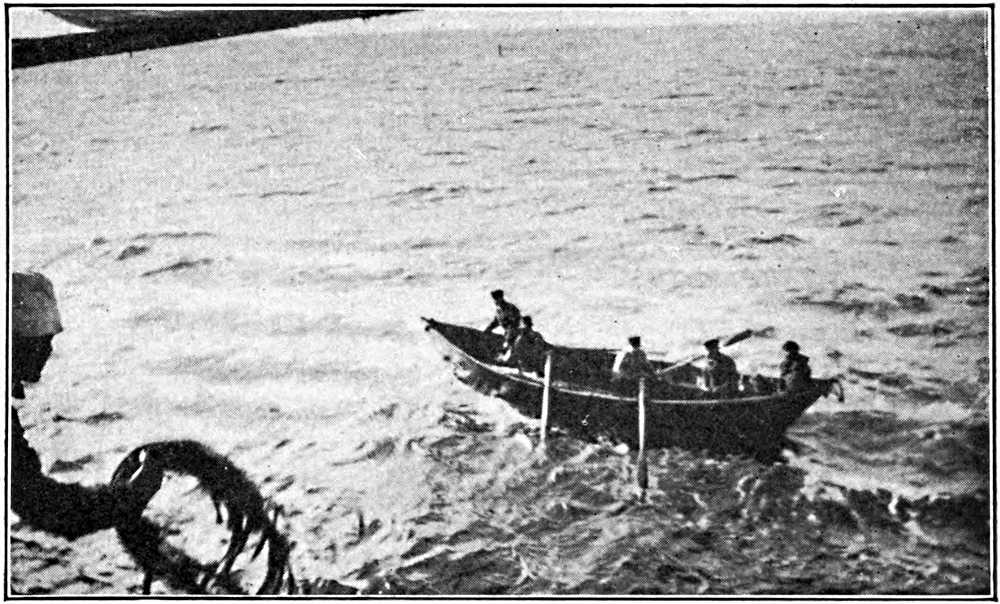
FRENCH FISHERMEN WHO WERE SET ADRIFT
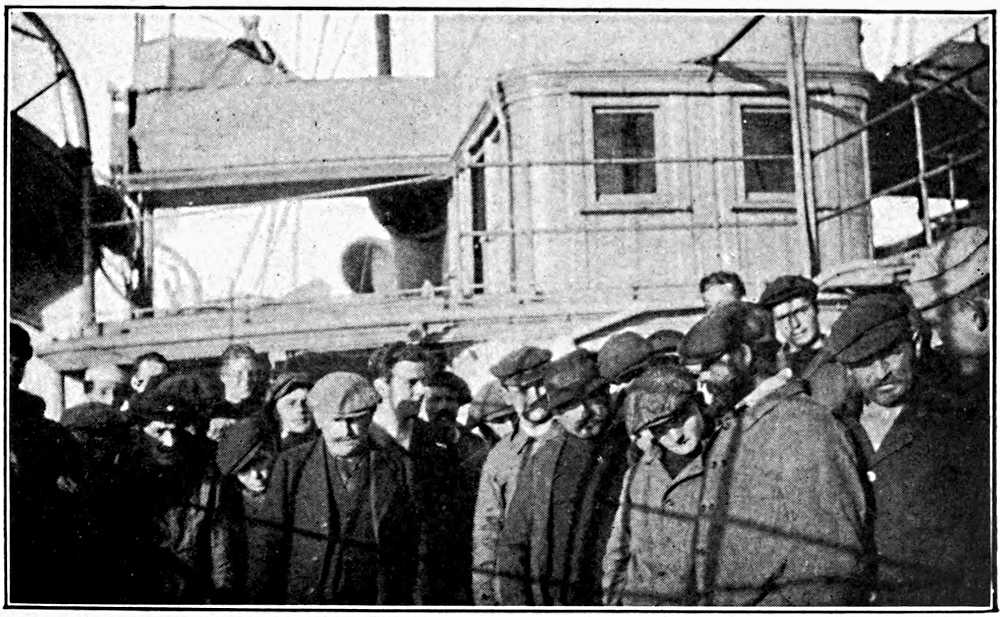
THE CASTAWAYS FIND A HEARTY WELCOME ON THE CORSAIR
At 6.19 P.M. proceeded S. 17° East, speed fourteen knots, and continued search for survivors of the Saint Pierre. Opened communication with some British destroyers and informed them of the condition and position of the Eugene Louise. At 9.08 P.M. the destroyers [Pg 93]radioed that they had the Eugene Louise in tow and were proceeding to the Scillys. Heard two German submarines communicating with each other by radio. Five minutes later heard two more enemy submarines in radio communication. The signals were coming in very strongly which indicated their close proximity. Under these circumstances it was considered unwise to take the Eugene Louise in tow without the presence of escorting vessels.
It was an animated scene aboard the Corsair when the thirty-one men and officers of the Eugene Louise were disputing whether or not they should go back to their ship and sail her into port. There were also two dogs, one of them shaggy and black, who barked in energetic approval of remaining on the Corsair. Their Breton shipmates appeared to share this opinion. Panic had gripped most of them. They were literally frightened out of their wits. Red kerchiefs knotted about their heads, gold rings twinkling in their ears, they looked like shipwrecked buccaneers, but their spirit was quite otherwise.
The captain of the Eugene Louise was a man of stout heart and, besides, he owned a share of the barkentine. He raced between bridge and deck, conferring, imploring, expostulating, but his fishermen refused to follow him. They were fed up with submarine warfare and, in their opinion, once was enough. The next U-boat would undoubtedly cut their throats and it was a long road to Saint-Malo. Their refusal brought genuine grief to the navigating officer of the Corsair. Nothing would have[Pg 94] pleased Lieutenant Robert E. Tod more than to sail the barkentine Eugene Louise into the nearest French port, and he had already volunteered for the job.
He was a faithful and zealous officer of the Corsair, but, after all, she was a steam kettle and his heart went out to the spars and stays and canvas of a sailing vessel and the winds that served to steer her by. Such had been his own training as a yachtsman, and he knew he could shove this French square-rigger along for all she was worth, with thirty nimble Breton sailors to swarm aloft. Alas, Captain Pierre Catharine, of the Eugene Louise, could not argue his frightened crew into accepting this sporting proposition. It was left for the industrious British destroyers to take her to safety at the end of a tow-line. The news was gratifying, when received later, that the barkentine with her cargo of fish, so welcome to the Breton villages, had been rescued from the brutal destruction of the enemy. One of the Corsair’s deck force sadly noted in his journal:
I also volunteered to go with Commodore Tod as quartermaster for signals, but our skipper decided to leave her derelict. It was a great disappointment. Mr. Tod thanked me for offering to take a chance on the barkentine, which I appreciated.
During the night of this same day the Corsair was zigzagging toward Brest at twelve knots when she encountered one of the submarines which had[Pg 95] been running amuck among the fishing vessels. The weather was hazy and obscured and an occasional rain squall drove across the ship. The bridge and deck watches were peering into the gloom which lifted between the squalls to let a watery moon gleam through. Lieutenant Tod was officer of the watch and Quartermaster Augustus C. Smith, Jr., stood at the wheel. At 11.25 P.M. one of the whistling flurries of rain and wind had passed and the sea was visible in the illumination of the misty moonlight.
No more than five hundred yards away the outline of a large submarine was clearly discernible as it rested at leisure upon the surface of the water, having emerged, no doubt, to open hatches and give the crew a breathing spell. This was a sight which the crew of the Corsair had dreamed of. It was too good to be true. Quartermaster Augustus Smith, a bland, unruffled young man in all circumstances, had an uncommonly keen pair of eyes and he did not have to be informed that yonder was the enemy. He spun the wheel at the order. Lieutenant Tod threw the handle of the engine-room indicator to emergency speed, and the Corsair swung to rush straight at the U-boat, hoping to ram.
Commander Kittinger and his executive, Lieutenant Commander Porter, instantaneously appeared upon the bridge, while Ensign Gray dashed for the chart-house deck to make certain that the forward gun crew had sighted the submarine for[Pg 96] themselves. There was excitement, but no confusion. Long training and disciplined habit had prepared them all for such an episode as this, like sprinters set and ready on the mark. No time was lost in wondering what ought to be done. Those who hunted Fritz had to be quickwitted or else he would scupper them.
The submarine, caught napping, went ahead on its oil engines, moving slowly on the surface and almost in the same direction as the plunging Corsair whose forward battery endeavored to bear on the mark, which was difficult for lack of a bow-chaser. Number Two gun barked once and the shell kicked up foam astern of the U-boat which was submerging in the very devil of a hurry, as one may imagine. Before the Corsair could fire again, the conning tower had vanished and the gray shape of the slinking submarine was slanting downward in a “crash dive.”
The yacht had three hundred yards to go before she passed over the spot. Her keel failed to strike and rip through the thin plates of the German craft which was, perhaps, thirty feet beneath the sea, but a bubbling wake was visible and into it the depth charges began to drop from the stern of the Corsair. The gunner’s mates played no favorites, but let go an English “ash can” with 120 pounds of TNT, then two French “Grenades Giraud,” and finally an American Sperry bomb.
All four of the Allied gifts for Fritz functioned[Pg 97] with terrific effect. The Corsair, charging ahead at full speed to avoid being hoisted herself, was shaken as though she had hit a reef. The sea was violently agitated in a foaming upheaval. The men asleep below decks came spilling up through the hatches, convinced that the ship had been blown up. One of the French fishermen vowed that he had a glimpse of the shadowy shape of the submarine as it passed directly under the Corsair. It seemed reasonable to assume that the four depth charges had been placed where they would do the most good. Nothing could survive the destructive effect of the solid wall of water impelled by these explosions. And the submarine had been near enough, in all probability, to receive the force of these rending shocks.
The Corsair moved ahead for five minutes, along the track which the U-boat had taken when it submerged. There was the hope that it might rise to the surface disabled, but the moonlit surface of the sea was unbroken. The mist had cleared and the sky was bright. Swinging about, the Corsair retraced her path on the chance of finding some sign or token of a shattered U-boat. Soon she ran through a spreading oil slick, a patch of greasy calm amid the glinting waves, and the smell of mineral oil was strong. They sniffed it greedily aboard the Corsair and the French fishermen forgot to mourn the Eugene Louise. It was their belief that the glorious American Navy had evened the score with the Boche. The bluejackets were of the same opinion[Pg 98] and felt confident that the Corsair would be awarded a star to display on her funnel, the Croix de Guerre of the sea, to show that she had bagged her submarine.
The officers were not quite so cock-sure. Daylight might have disclosed some bits of débris, enough wreckage to substantiate the claim beyond a shadow of doubt, but the mere presence of floating oil was no longer admitted as final proof either by the American Navy Department or the British Admiralty. Submarines were apt to leak a certain amount of fuel oil, or to blow it through the exhaust when running on the surface, and it was suspected that Fritz had learned the trick of opening a valve in order to delude the pursuers into the belief that they had crippled or smashed him.
In this instance, however, the circumstantial evidence was very strongly in favor of the Corsair, even though officials ashore might decline to give her documentary credit. The submarine had been unusually close aboard, almost under the ship, when four depth charges were let go and all exploded perfectly. Commander Kittinger was so reluctant to claim too much that he presented no more than the terse facts and let the matter rest with that. Earlier in the war, destroyers had been granted the star on a funnel for evidence no more conclusive than this—depth charges dropped within a fatal radius and the presence of abundant fuel oil as the aftermath.
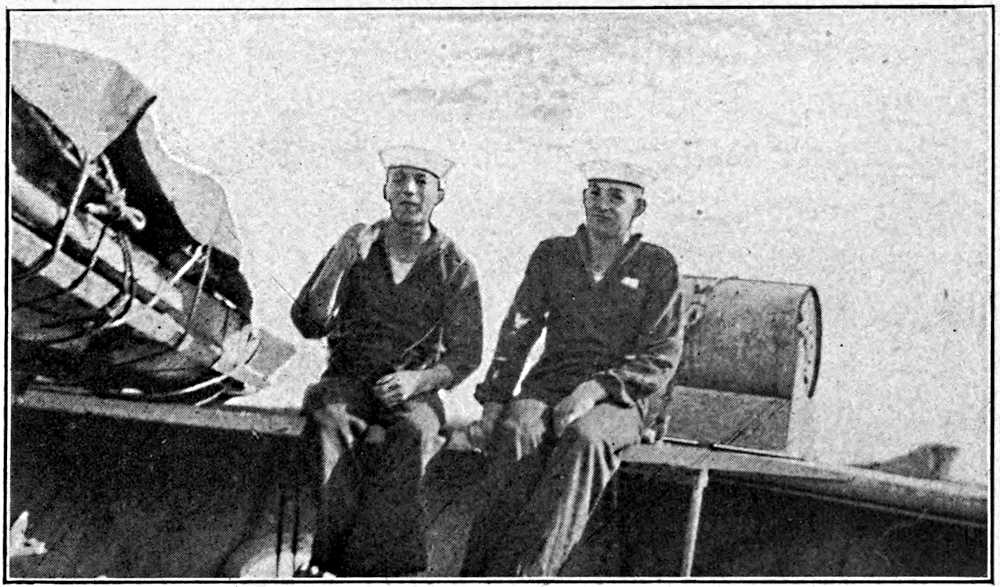
GUNNER’S MATES BARKO AND MOORE, AND A DEPTH CHARGE
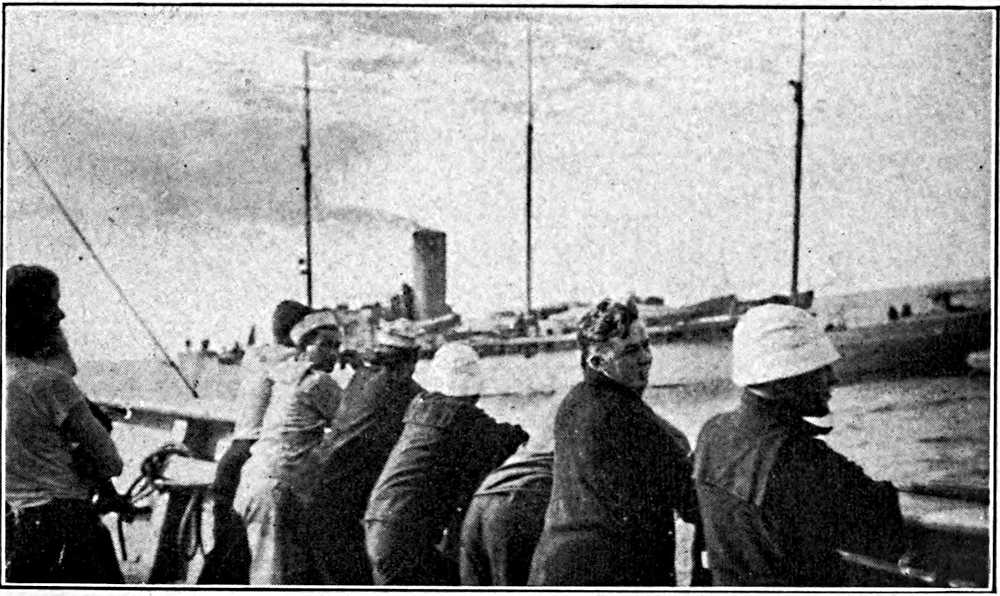
WATCHING THE APHRODITE GO OUT ON PATROL “HOPE SHE GETS A SUB”
It is highly probable that the Corsair wiped one U-boat from the active list on this moonlit night in the Bay of Biscay and her crew had the right to feel pride in the exploit. That careful, well-poised petty officer, Quartermaster Augustus Smith, who saw the whole show from his station at the wheel, took pains to write down his own observations which confirmed, in every respect, the conclusions of Commander Kittinger and his officers:
On the night of October 2, 1917, at 11.25 P.M., a dark object was sighted by the officer of the deck, bearing about three points on the port bow. The officer of the deck, after looking at the object with the night glasses, called out that it was a submarine. The order was given for full left rudder and to steady on the submarine which was then plainly visible in the moonlight. At the same time emergency speed was rung up and before we had swung to the new course we were fast gaining speed. The captain almost immediately came on the bridge and ordered that a shot be taken at the submarine which was about three hundred yards away and moving slowly on the surface in the general direction we were steering. We swung a little to starboard and one shot was fired which cleared the periscope and showed the submarine distinctly for a second.
From the way the Corsair answered the rudder we were making fine speed. The submarine completely disappeared when we were just a little way off. As we crossed her apparent course we began dropping depth charges, four in all. As we passed over her position we went full right rudder, dropping two of the cans as we swung. We then steadied on North 74° East, the original course, and ran it about five minutes. We then[Pg 100] slowed to thirteen knots and went full right rudder, and steadied on South 80° West. Returning over the spot where the charges had exploded, we ran into a great slick of oil that seemed to spread out for several hundred yards. A strong odor of oil could be smelled, even on the bridge.
[Pg 101]
For more than three months the Corsair had been escorting transports and supply steamers to and fro, in an area of ocean where the hostile submarines cruised incessantly. Not a ship in all these unwieldy convoys had been torpedoed, and the few hard-driven yachts could feel, without boasting, that they were doing their bit to keep the road open to France. It was unreasonable to expect, however, that the record could be kept wholly clear of disaster. The fortune of war was not as kind as this.
The unhappy event occurred without warning on October 17th when the transport Antilles, a fine, seven-thousand-ton steamer of the Southern Pacific Company, was sent to the bottom with many of her people. It was no fault of the escort, for there was never a sight of a periscope nor any other indication that a submarine was near. The Corsair did what she could and did it well, saving survivors from the sea with the readiness and courage that might have been expected.
The convoy had sailed from Saint-Nazaire two days earlier, waiting at Quiberon for one of the ships to join. With the Antilles were the Henderson and the Willehad. The escort comprised the Corsair,[Pg 102] phrodite, and the Kanawha, which replaced the Wakiva after this smaller yacht had returned to port because of leaky rivets in the main boiler. With the circumstances as they were, no better protection could have been given this small convoy of three transports. The Queenstown destroyers were employed in guarding the laden ships inward bound, meeting them far offshore, but the American Patrol Force in France had to take them to sea again as best it could, with the yachts and whatever aid the French Navy was able to offer.
The small flotilla of coal-burning destroyers which was sent to base on Brest had not yet arrived and was en route from the Azores. Captain W. B. Fletcher, who commanded the Patrol Force at this time, and who was superseded by Admiral Wilson a little later, received a certain amount of adverse criticism because of the loss of the Antilles, but the fact is evident that he had taken all the precautions within his power to send this convoy safely through the danger zone.
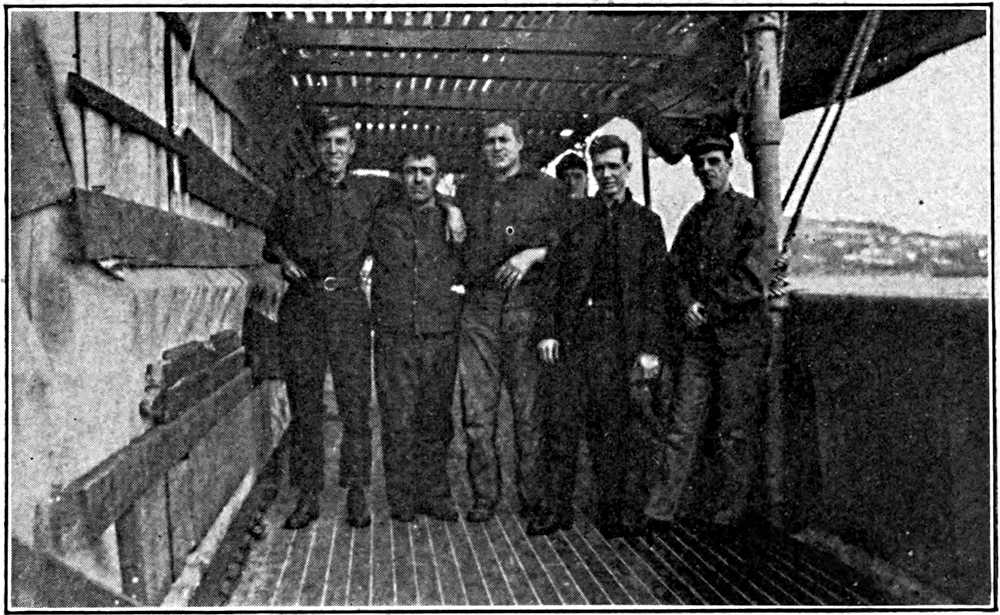
ENGINEERING FORCE OF THE CORSAIR
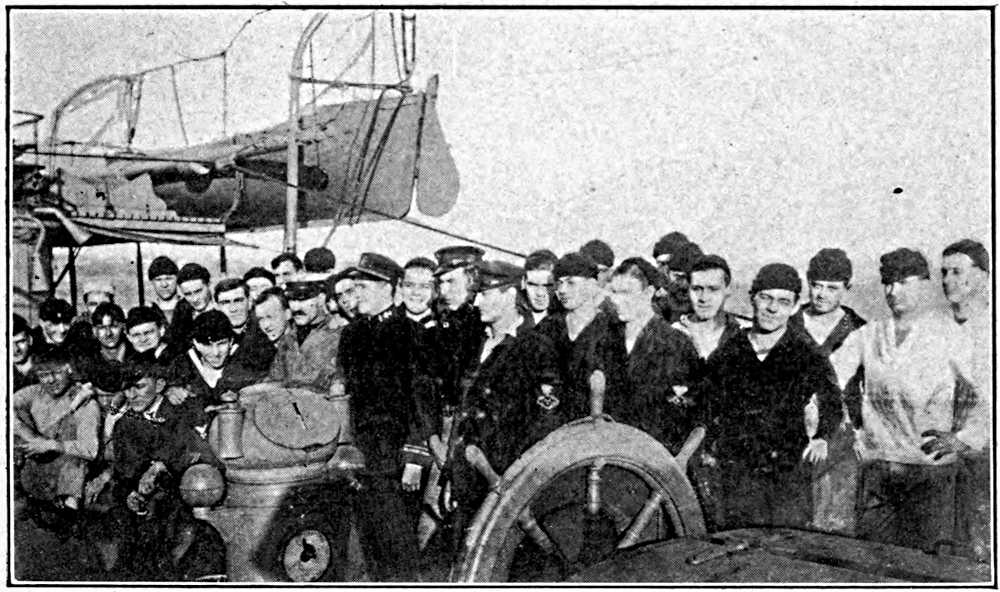
LIEUTENANT J. J. PATTERSON, ENGINEER OFFICER, AND HIS HUSKY “BLACK GANG”
The three transports and the three large yachts proceeded without incident until the morning of the second day at sea, when a freshening wind kicked up a boisterous sea and the Kanawha found herself in trouble. She was taking the water green over her bows and the decks were flooded. To avoid being seriously battered, she was compelled to reduce speed, and, to make matters worse, the weather was growing rougher and a gale threatened. [Pg 103]Unable to maintain the standard speed of the convoy, which slowed down, for a little while, to nine knots in order to let the Kanawha attempt to regain position, her captain signalled for permission to part company and return to port. This was granted, as the heavy weather had made her of no service to the convoy. Thereafter the formation was maintained in this wise:
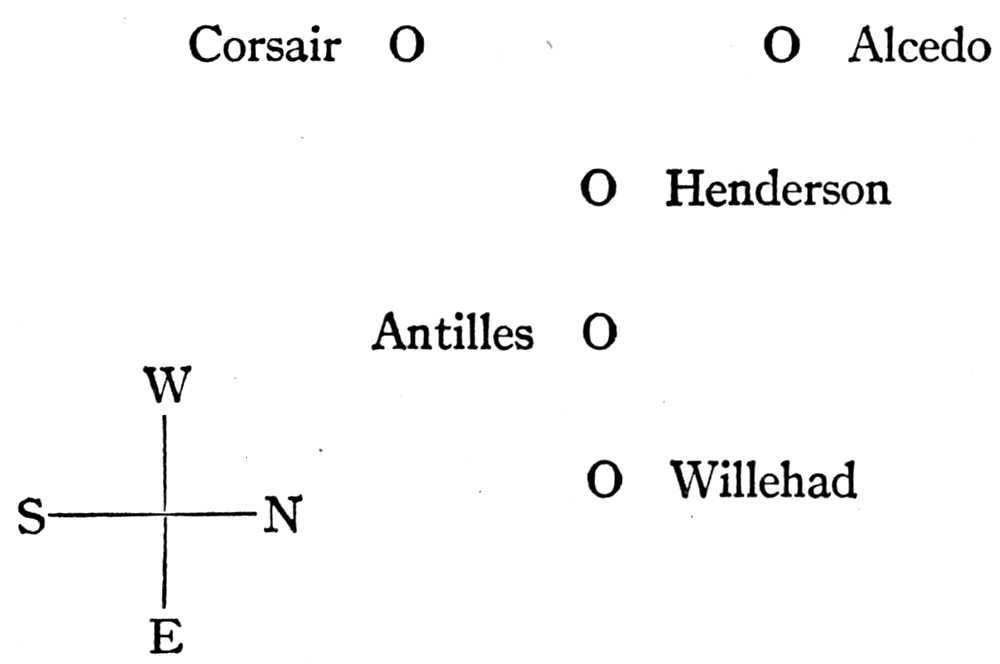
| Corsair O | O Alcedo | ||
| O Henderson | |||
| Antilles | O | ||
| O Willehad |
| W | ||
| | | ||
| S | —— | N |
| | | ||
| E |
The third day out, October 17th, dawned clear with a moderate wind from the southwest and a disturbed sea covered with whitecaps. The ships were zigzagging, with all lookouts properly kept and gunners at their stations. The Antilles had her own battery which was manned by a detachment of the Naval Armed Guard. Early in the morning, at 6.45, she was steaming directly astern of the Corsair during one of the frequent changes of course. The light was still poor, and it was this hour, before the sunrise[Pg 104] had brightened the sea, which the submarines had found most favorable for attack.
The Antilles was seen to sheer out to starboard and the Henderson hoisted a signal which could not be read from the bridge of the Corsair, but the yacht swung about on the instant and sounded the call to general quarters. There was no other indication that the Antilles had been hit and mortally wounded. Presently she was settling by the stern. Then the bow rose in air, towered there, and the ship plunged to the bottom five minutes after a torpedo had ripped open her engine-room. Smoke and dust and dirty whirlpools marked the spot where she had been, and the sea was littered with boats and bits of wreckage and struggling men. On board the Corsair was Commander F. N. Freeman, as commander of the patrol division to which the Corsair and Alcedo were attached, and his report contained the following description of the disaster:
No explosion was heard on the Corsair, nothing was seen of it, nor was a submarine sighted. The Henderson immediately turned to starboard and made a smoke screen, the Willehad turned to port and from knowledge now at hand apparently passed very nearly over the submarine that fired the torpedo. The Alcedo turned back to the spot where the Antilles sank. The Corsair steamed at nineteen knots directly astern of the Henderson and to the northeast, followed by the Alcedo. These two escorting vessels continued in the vicinity of the wreckage until 8.30 A.M. No sign of the submarine was seen.
[Pg 105]
During all this time the Alcedo was picking up survivors while the Corsair continued circling around the boats and wreckage. The Corsair assisted in picking up the survivors in outlying boats and patrolling the vicinity until 10.30 A.M. All survivors having been rescued, and it being impossible to overhaul either the Henderson or the Willehad before nightfall, we set course for Brest.
The total number of persons on board the Antilles was 237. The number rescued by the Corsair was 50, by the Alcedo 117—total rescued, 167.
It is believed that every man on the Antilles who got into the water alive with life-belt on was rescued. Attention is invited to the excellent work of the Alcedo and Corsair in picking up survivors who were in the boats, on wreckage and life-rafts, floating over an area of several square miles. The Corsair picked up fifty persons from outlying wreckage and lifeboats without lowering a boat. The sea at this time was getting rough.
Officers from the Antilles have informed me that there was a fire on board the ship during the early morning, just before dawn, and that nearly all hands had turned out. This may account for the comparatively small loss of life, as the Antilles sank in seven minutes or less. It is not known whether the lights which had been turned on at the time of the fire were visible from outboard, and whether this has anything to do with the submarine attack. The Corsair reported no lights on the Antilles. The statements of the survivors are that several of them had seen the torpedo just before it struck the ship. It is worthy of mention that the conduct and bearing of the Armed Guard were a credit to the service.
No visual signals of any kind were made by the Corsair or Alcedo after nightfall at any time, and only[Pg 106] one PDL flash-light signal was noted in the convoy. Only one radio signal was made and that at low power to the Henderson in thick weather, at night. Commanding officers were all thoroughly indoctrinated before getting under way in regard to the course, zigzagging, etc., and the escort vessels were unusually alert and attentive.
The senior naval officer on board the Antilles was Commander Daniel T. Ghent whose report to the Navy Department contained many incidents of interest in the story of the Corsair. Of the sixty-seven men who perished with the ship, he stated that forty-five of them belonged to the merchant crew, four were members of the armed guard, sixteen were soldiers who had been sent home, one was an ambulance driver, and one a colored stevedore. It was strange that the detonation of the torpedo was unheard by the escort vessels and that there was no visible disturbance, for on board the Antilles, according to Commander Ghent, the explosion was terrific. The ship shivered from stern to stem, listing immediately to port. One of the lookouts in the maintop, although protected by a canvas screen about five feet high, was hurled clear of this screen and killed when he struck the hatch below.
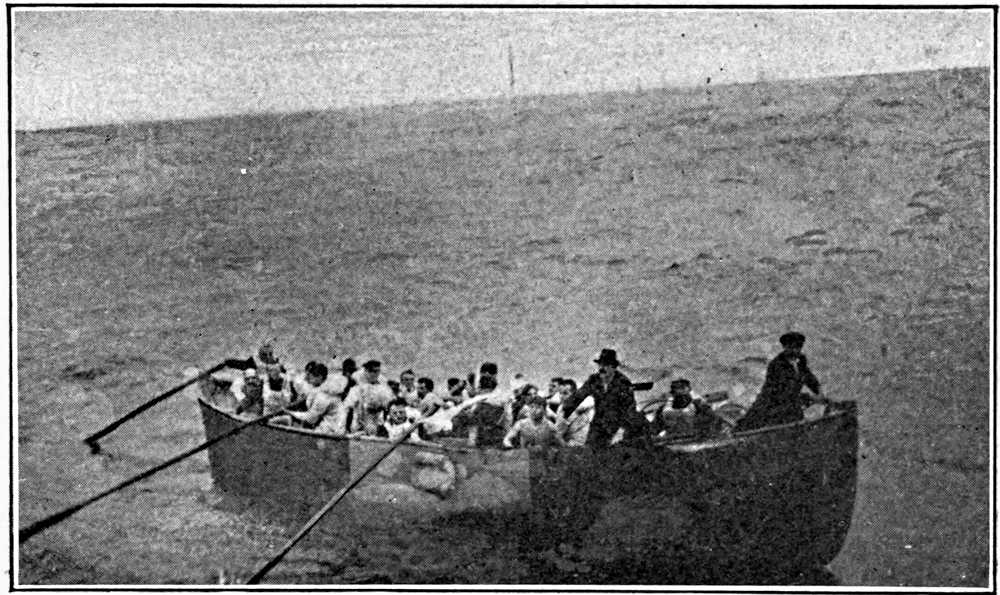
A BOAT-LOAD OF SURVIVORS FROM THE ANTILLES COMING ALONGSIDE
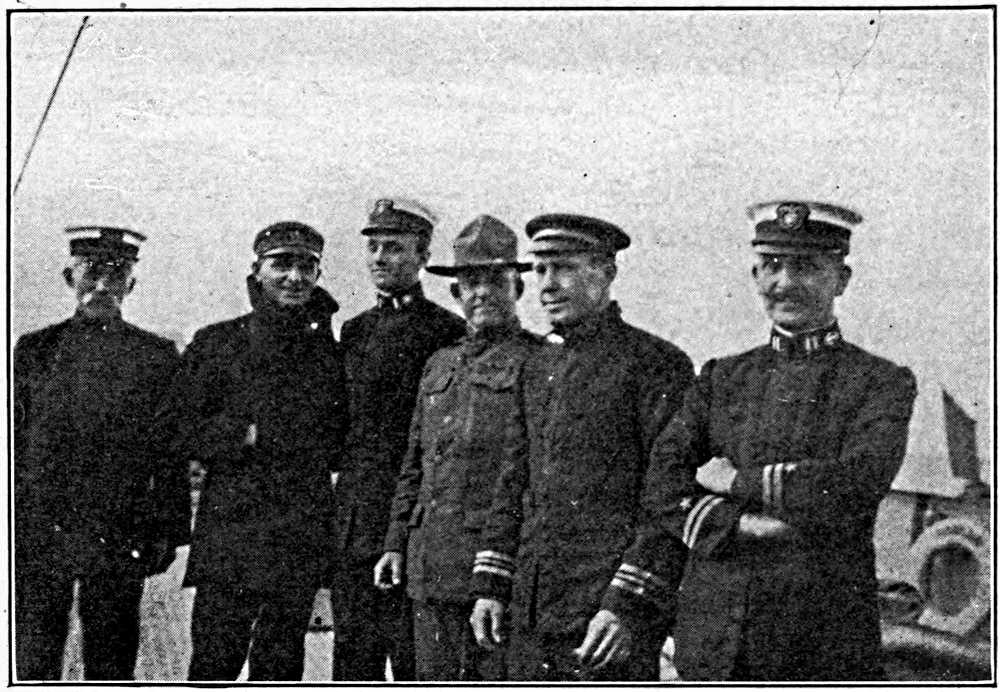
NAVAL OFFICERS RESCUED FROM THE ANTILLES, WITH GENERAL McNAIR, U.S.A., IN THE CENTRE
The explosion wrecked everything in the engine-room, including the ice machine and dynamo, and almost instantly flooded the compartment. The engine-room was filled with ammonia fumes and with the high-pressure gasses from the torpedo, and it is believed that every one on duty there was either instantly killed [Pg 107]or disabled, excepting one oiler. This man happened to be on the upper gratings at the time. He tried to escape through the engine-room door but found it jammed and the knob blown off. Unable to force the door and finding that he was being overcome by the gases and ammonia fumes, he managed to escape through the engine-room skylight just as the ship was going under. Within a few seconds after the explosion, the water was over the crossheads of the main engines which were still turning over slowly. Of the twenty-one men on duty in the engine and fire rooms, only three escaped. Besides the oiler, two firemen crawled up through a ventilator. The fact that the engines could not be stopped and the headway checked, added to the difficulty of abandoning ship.
That only four boats out of ten succeeded in getting clear was due to this and several other causes,—the short time the ship stayed afloat, which was four and a half minutes by my watch, the rough sea, the heavy list, and the destruction of boats by the explosion. When there was no one left in sight on the decks, I went aft on the saloon deck where several men were struggling in the water near No. 5 boat and making no attempt to swim away from the side of the ship. I thought that they might be induced to get clear before the suction carried them down. By this time, however, the ship which was listed over at an angle of forty-five degrees, started to upend and go down. This motion threw me across the deck where I was washed overboard.
The behavior of the naval personnel was equal to the best traditions of the service. The two forward gun’s crews, in command of Lieutenant Tisdale, remained at their gun stations while the ship went down and made no effort to leave their stations until ordered[Pg 108] to save themselves. Radio Electrician Ausburne went down with the ship while at his station in the radio-room. When the ship was struck, Ausburne and McMahon were asleep in adjacent bunks opposite the radio-room. Ausburne, realizing the seriousness of the situation, told McMahon to get his life-preserver on, saying, as he left to take his station at the radio key, “Good-bye, Mac.” McMahon, later finding the radio-room locked and seeing the ship was sinking, tried to get Ausburne out, but failed.
The Corsair and Alcedo returned to the scene of the accident and circled about for two hours when the Alcedo began the rescue of the survivors, the Corsair continuing to look for the submarine. Too much credit cannot be given to the officers and men of the Corsair and Alcedo for their rescue work and for their whole-heartedness and generosity in succoring the needs of the survivors. The work of the medical officers attached to these yachts was worthy of highest praise.
It is one of the many black marks against the sinister record of the German submarine campaign that the naval vessels with a convoy in such a catastrophe as this were compelled to delay the rescue of the survivors—dazed, wounded, helpless men in the last struggle for life.
It was possible that the submarine might come up to gloat over the murder it had wrought, or attempt to take prisoners, or even to ram the lifeboats or turn a machine gun on the struggling wretches, as had happened more than once. Therefore, in this instance the Corsair and Alcedo steamed at full speed, dropping depth charges and manœuvring[Pg 109] to avoid torpedo attack while they scouted to drive away or destroy the ambushed U-boat.
As soon as it seemed advisable, they closed in and undertook the work of saving life, the Corsair still circling the outer edge of the area because of her superior speed. One of her crew described the scene in this manner:
It should be noted that although the Corsair spent most of her time looking for the submarine, she picked up a large number of survivors and without putting over a boat. One of these rescues was that of a lad who was riding upon an ammunition box. When the Corsair was brought alongside him, he began to semaphore us to keep off, and then he shouted to steer clear and go easy because he had a cargo of shells and didn’t want to blow up our ship. When we hoisted him aboard, he begged us to fetch his salvaged ammunition along, as he didn’t think it ought to be wasted. I doubt if he had many shells in the box, but he surely did show the right spirit, and the men agreed that he was “one game little guy.”
Shortly before we picked up this fine young bantam, we took aboard a loaded life-raft, under our starboard side. It was a delicate piece of seamanship, with a troublesome sea running, and the commander let our executive, Captain Porter, show what he could do with the yacht. The men of the Antilles owed a lot to the skill with which the Corsair was handled that morning.
One of the merchant crew of the Antilles had climbed upon the upturned bow of a broken boat and was seated astride the stern. Every wave was breaking over his head and he clung to his precarious perch with his[Pg 110] arms and legs, like a jockey wrapped around the neck of a runaway horse. How he managed to stick there was a puzzle. He had drifted several hundred yards clear of the rest of the wreckage but our executive had an eye on him. “Skipper, I think we had better circle around again,” said Captain Kittinger. The “skipper” (Porter) replied that he would like to “go get that fellow first,” pointing to the man on the piece of boat. “Go ahead, skipper,” was the answer, and before the yacht swung off to fetch another circle we steered close to this lonely castaway and tossed him the bight of a heaving-line. He grabbed it with a death grip and we hauled him over the rail, but he was almost unconscious from cold and exhaustion and we had to pry his fingers open to make him let go the line. The doctor scored an “assist” on this rescue.
These unfortunates had been flung into the sea in a moment, some of them scrambling half-dressed from their bunks. They became chilled to the bone, half-strangled in the breaking waves, worn out with trying to cling to overturned boats, submerged live-rafts, doors and hatches and benches, the flotsam spewed up by the stricken ship as she dived under. Some of them swam from overloaded rafts to find help elsewhere, or floundered without life-belts until gallant comrades lent them a hand. It was a dreadful business, new to the Corsair and Alcedo; but all too familiar to the maritime annals of the war.
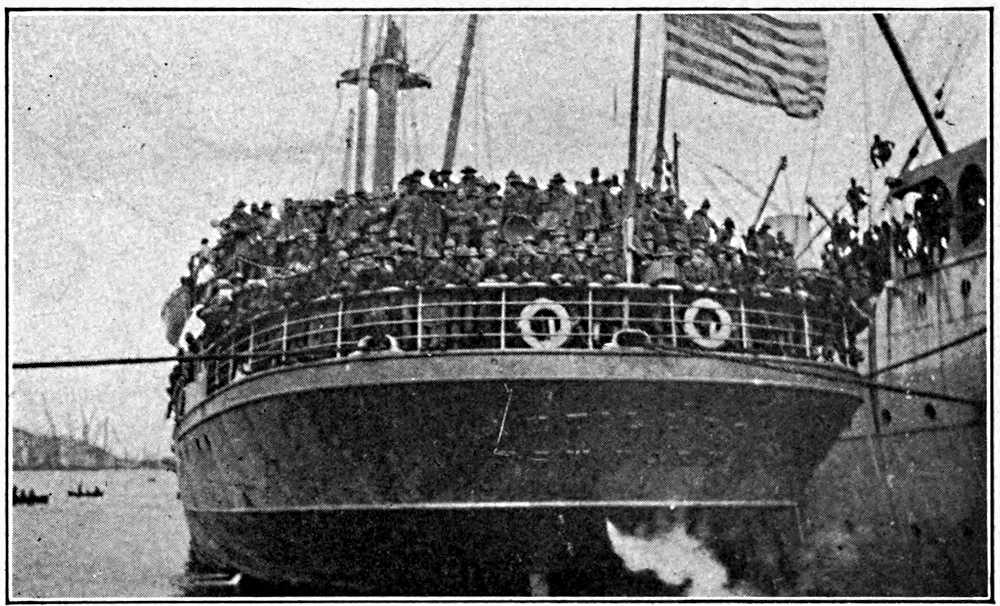
THE ANTILLES CROWDED WITH TROOPS ON HER LAST VOYAGE TO FRANCE
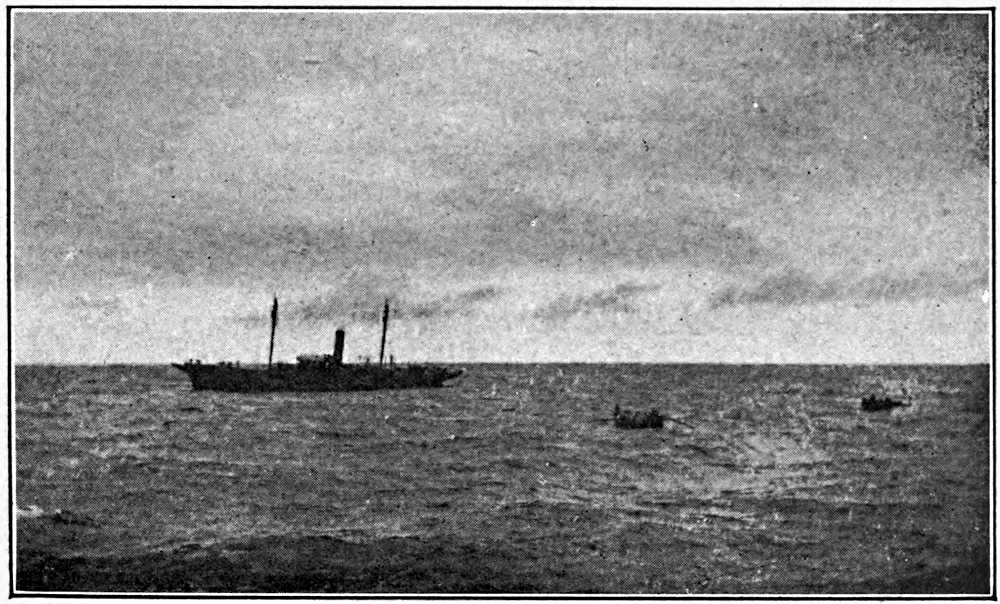
THE ALCEDO PICKS UP THE ANTILLES SURVIVORS
It is not easy to quench a sailor’s sense of humor even in the presence of death and disaster, and Ensign Schanze wrote, in a letter to his mother:
[Pg 111]
The commander of a supply ship bound to New York promised me that he would look Dad up if he could possibly do so, and tell you how I was getting on. His ship was in our party on the morning the Antilles was torpedoed, and maybe he got sore at us for letting a submarine scare the wits out of him. Our yacht had to stop and fish a lot of very wet citizens out of the ocean, and the last view I had of his ship was in a great cloud of smoke, and he was crowding on full speed to make his get-away. He was going like a scared rabbit. He never even waved good-bye.
Another gentleman who promised to call on Dad was a naval officer in charge of the gun crew of the Antilles. I yanked him out of the ocean and helped make him at home on the Corsair during the time between the sinking of the ship and the return to our base.
The fifty survivors saved by the Corsair found a warm-hearted welcome. Nothing was too good for them. They were promptly thawed out in the cabins and engine-room and tucked into bunks, while the crew, as a committee of the whole, ransacked their bags and boxes for spare clothing. They were ready and eager to give the shirts off their backs, and some of them actually did so. Every man who needed it was comfortably rigged in the togs of Uncle Sam’s Navy and told to go ashore with the clothes. You may be sure that such treatment warmed the cockles of the hearts of these forlorn derelicts from the Antilles and that they cheered the Corsair before they left her.
The yacht’s officers made room in their own[Pg 112] quarters for the officers picked up from the Antilles. These included Brigadier-General W. S. McNair, of the United States Army; Lieutenant Commander Ghent, Lieutenant J. D. Smith, and Lieutenant R. D. Tisdale, of the Navy; Chief Officer A. G. Clancy, Third Officer R. M. Christensen, Assistant Engineer L. L. Rue, and Purser W. C. Gilbert. They were most cordial in their expressions of appreciation of the kindness and good-fellowship which they had found in the yacht during the voyage back to Brest.
A dramatic bit of gossip went the rounds of the Corsair after she reached port. A steward of the Antilles had been among those rescued and he was heartily disliked aboard the yacht, the one exception in the shipwrecked company. He was a Spaniard, by name and complexion, and he displayed a curiosity which the Corsair’s crew called “nosey.” He was discovered poking about in all sorts of places. Attempting to take a look at the radio-room, he was tersely told to beat it or have his block knocked off. The Executive Officer chased him away from the after quarters, where he appeared to be interested in the stateroom occupied by General McNair. Thereafter the movements of this gimlet-eyed passenger were vigilantly restricted.
The word came later from Saint-Nazaire that he had been arrested by the French authorities and shot as a notorious spy. The inference was that he had been endeavoring to slip away to the United[Pg 113] States in the Antilles when fate returned him to the secret intelligence service which had information against him, and he was trapped by the heels. His last words as he faced the firing squad, so the Corsair story ran, were that the German submarines would get the Finland on her next trip home, just as they had intercepted and sunk the Antilles. This was peculiarly interesting, because after coaling ship and taking on stores, the Corsair was ordered to escort a convoy which was expected to sail from Saint-Nazaire on October 24th. The transports were the Buford, City of Savannah, and the Finland.
The flotilla of coal-burning destroyers had arrived from the Azores to reinforce the yachts of the Breton Patrol, and four of them were assigned to this escort, the Lamson, Flusser, Preston, and Smith. The yachts Alcedo and Wakiva were also detailed to join the group, and no previous convoy outward bound had been so heavily protected as this. The loss of the Antilles had aroused excitement in the United States because of the false report that the attack had been made by a whole flock of submarines. This was one of those hair-raising newspaper yarns of war-time which would have been important if true.
Steaming out to sea, the Corsair led the imposing column, with a destroyer on each bow of the Finland, the Alcedo to starboard of the Buford, the Wakiva to port, and a destroyer hovering on each[Pg 114] quarter of the City of Savannah. There had been no intimation of danger other than the fanciful rumor of the prediction made by the suddenly deceased steward of the Antilles and the routine warning included in the Force orders, “Enemy submarines operating in war zone as usual.”
At 9.25 A.M., one day out from port, the Finland was struck by a torpedo on the starboard side. Again there was no sign of a submarine. This time, however, the Corsair heard the explosion and saw a huge column of water spout up against the ship. But the Finland had no intention of sinking and merely slowed down, then halted, blowing off steam as though waiting for the other transports to catch up with her. As seen from the Corsair, she rode on an even keel and it was impossible to realize that a torpedo had torn a hole thirty-five feet wide in her side, into which the sea was gushing like a cataract.
On board the Finland were many of the survivors of the Antilles and they were in no mood for an encore. They set the pace for the crew of the Finland in the race to abandon ship and the big transport seemed fairly to spill boats and men from every deck. They were dropping overboard before she had wholly slackened way. It was an amazing spectacle. At a distance the Finland made one think of shaking apples from a tree.
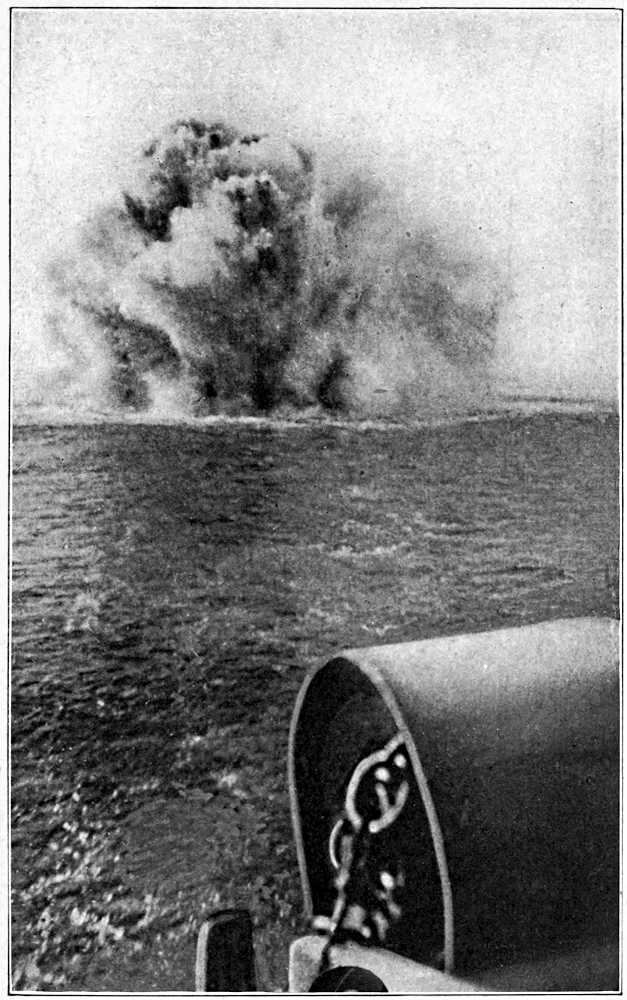
THE CORSAIR DROPS A MINE AND SHAKES UP FRITZ
Several of us were standing by the engine-room hatch [wrote Quartermaster Augustus Smith of the Corsair], watching the Finland as she steamed along [Pg 115]in that very slow convoy. We were discussing her chances of getting through, and the story that the U-boats were laying for her, when suddenly a white burst of water rose under her bridge and climbed to the top of the foremast. It seemed to be followed by a pillar of dark smoke. At the same time the Corsair was fairly lifted out of the sea by the force of the explosion. All hands made a run for battle stations without waiting for the call.
The first boat from the Finland was dangling from the davits, half-filled with men, when somebody either cut or let go the forward falls. The bow of this big whaleboat crashed down to the water, dumping most of them out. A few managed to hang on and were struggling desperately when the after falls carried away and the boat dropped upon the heads of the men already in the sea. The next boat reached the water only to be up-ended by the headway of the ship. Other boats then waited for the ship to lose way and these got clear all right, but we saw one or two more upset and smashed.
When Commander Freeman, then on the Corsair as division commander, realized that the Finland was not sinking, he semaphored the message:
“Do you think you can make Saint-Nazaire?”
The answer came right back from the Finland’s skipper:
“Why not New York?”
The Corsair cracked on speed to search for the submarine, instructing the Wakiva and Alcedo to aid the Finland’s people who were adrift in boats or upon rafts. Three destroyers proceeded on the voyage with the two other transports while the fourth[Pg 116] destroyer remained to operate with the Corsair. Investigation had disclosed the fact that the Finland was able to move under her own steam and the task in hand was to put the crew back on board and escort her into Brest for repairs. Meanwhile the Corsair, in quest of the enemy, was letting a real barrage of depth charges slide over her stern, and her wake was one thundering geyser after another. Eleven of these bombs jarred her rivets when they went off, and if a man had any loose teeth in his head he was liable to lose them entirely. Alas, no débris, such as dead German sailors, rose to the surface.
The report of the senior naval officer of the Finland, Captain Stephen V. Graham, is a lucid narrative and it is worth while to let him tell the tale:
Due to the congested condition at the port of debarkation, which was often serious in the early days of our transport service, the Finland had been unable to accompany the group of fast troop transports to which she belonged and which had proceeded on the return voyage about two weeks earlier. On this occasion she was in company with two freight transports of the armed-guard category which were not able to make more than eleven knots, but the three vessels had an escort of four destroyers and three converted yachts, which was uncommonly large at that time when the demand exceeded the supply. It was frequently necessary for the Finland to slow down to such a speed as would enable an enemy submarine to take a favorable position for attack.
[Pg 117]
By daylight of October 28th the convoy had reached a position near the line extending from the island of Ushant to Cape Finisterre, which experience had shown to be a particularly dangerous area. From that time on, the senior naval officer of the Finland remained on the bridge constantly and all the lookouts were exercising the utmost vigilance.
The weather was cloudy and a moderate sea running, and I was engaged in searching the water on both sides with powerful binoculars. I had just finished gazing at the starboard side when the naval signal quartermaster on watch called out, “Commander! Torpedo!” I turned and saw a torpedo about fifty or a hundred yards distant making a surface run directly toward the ship. The whirring of the torpedo’s propellers could be heard when they broke the surface of the water. To avoid it was impossible. The effect of the explosion was considerable but not as great as had been anticipated. No one on the bridge was injured.
I directed a radio operator to send out an S.O.S. call but it was found that the aerial had been carried away by the force of the explosion. The first report that reached the bridge was that the forward fire-room was flooded. At this time it did not appear probable that the ship would sink but in a short time she began to list to starboard and seemed to be settling. I ordered the lowering of the remaining boats which were hanging on their falls at the level of the promenade deck. These boats were scarcely in the water when the ship began to right herself, and the acting master, Chief Officer John Jensen, who had gone below to investigate the extent of the damage, returned to the bridge and reported to me that the destruction was confined to No. 4 hold, the bulkheads of which were intact.
[Pg 118]
In the meantime I observed Third Assistant Engineer George Mikkelson who had been on watch in the engine-room when the torpedo struck the ship, moving about the main deck with a wooden mallet in his hand and endeavoring to drive the frightened firemen back to their stations. He came to the bridge and reported to me that the boilers and engines were not damaged and that the ship could be got under way again in a short time if the men could be induced to go to work.
The damaged compartment, just forward of the fire-rooms, was used as a reserve coal bunker. At that time it contained about six hundred tons of coal. After the ship had been placed in dry-dock, upon her return to France, it was found that most of this coal had run out through the immense hole made in the side by the explosion of the torpedo.
When I received the master’s report that the damage was confined to this one compartment, I hailed the boats which were close to the ship and directed them to come alongside and also sent a signal to the escorting yachts to turn back the Finland’s boats which were approaching them and tell them to return to the ship. These yachts, the Alcedo and Wakiva, had come close to the Finland and lowered boats to rescue people who had been cast into the water by the dropping of two of the Finland’s boats.
The converted yacht Corsair and one of the destroyers were circling at high speed around the Finland and dropping depth charges in order to prevent the enemy submarine from delivering a second attack on the crippled Finland.
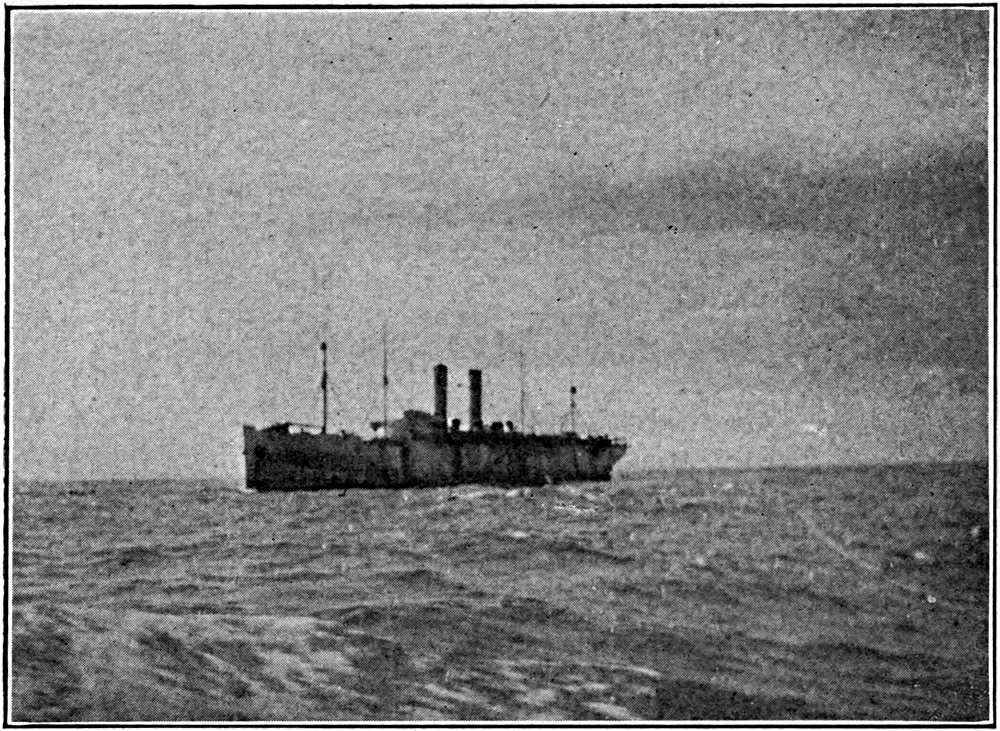
THE FINLAND, JUST AFTER SHE WAS TORPEDOED
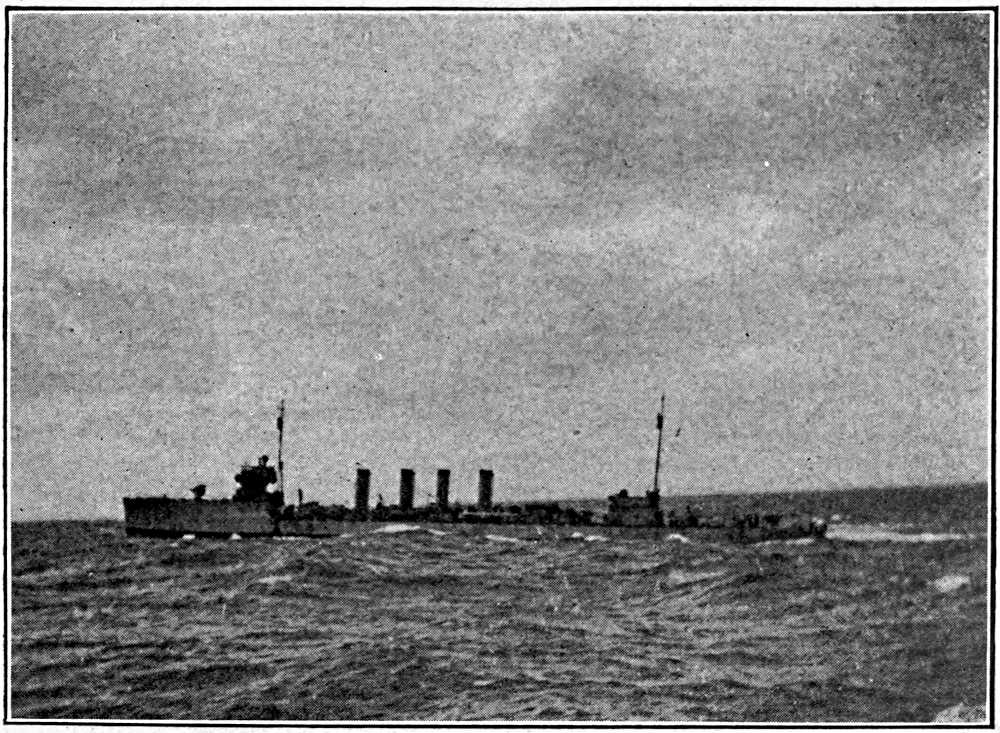
DESTROYER PRESTON, WHICH WAS CAUGHT IN THE HURRICANE AND ALSO FOUND REFUGE AT LISBON
While the Finland’s boats were in the water, a heavy squall came up and rendered the return of the heavily laden boats very difficult. They could come close only on the starboard side and getting the people back on [Pg 119]board was very slow work. Hoisting the boats was not to be thought of, for every moment that this large ship remained stopped was to risk grave danger of receiving a second torpedo. As soon as the passengers were aboard, the boats were cast adrift.
The ship got under way to return to the port of Brest, 150 miles distant. She was escorted by the Corsair and one of the destroyers, while another destroyer remained with the Alcedo and Wakiva to afford them protection until they had picked up the rest of the Finland’s crew. During the return to port it became necessary to send every one to the fire-room who could shovel coal. Deck-hands, stewards, and even passengers, including some of the discharged American ambulance drivers, responded with alacrity to this call and within a short time after starting ahead the ship was making nearly fifteen knots, which was about as good speed as she had made at any time during her employment in the transport service. The bulkheads of the damaged compartment held and there was no leakage through the water-tight doors.
It is regrettable that eight men lost their lives. The coolness and resourcefulness of the acting master and the engineer of the watch deserve commendation. Cadet Officer David MacLaren was the youngest officer on board—just eighteen years old. After I had ordered the boats lowered, this lad, who was in charge of one of them, would have been justified in leaving the ship which he believed to be sinking, but he returned to the bridge and reported to me that his boat was lowered and clear of the ship and asked if he could be of any service. He stayed on the bridge, giving valuable assistance, and displaying courage and readiness worthy of the best traditions of the sea.
One of the Navy youngsters was down in the living[Pg 120] compartment cleaning up when the ship was struck. Some one in a boat hanging at the davits, seeing him hurry along the promenade deck, asked which boat he belonged in.
“Number Four boat,” he replied.
“This is Number Four. Jump in,” urged the other, and the boy answered:
“Not on your life! I’ve got to go to my gun.”
Unfaltering, the stricken Finland ploughed along at fifteen knots with a great chasm in her side, while the anxious Corsair and the destroyer Smith hovered close and felt unspeakable relief when the Ushant Light was seen on the port bow in the early evening. Before midnight the Finland had passed through the Raz de Sein and was safely anchored in Morgat Bay, beyond reach of submarines. Next morning her escort led her into Brest Harbor and the Finland, Smith, and Corsair, three weary ships, rested at the mooring buoys. The Corsair courteously signalled the Finland:
The officers and men of the Corsair express their admiration of the spirit shown by your officers and men in sticking by their ship and bringing her safely into port.
The Finland gratefully signalled back to the Corsair:
Thank you. I congratulate the spirit and efficiency of your command and thank you for the personal assistance in a trying time.
Ships and men are much alike. Some are tenacious, hard to knock out, standing punishment,[Pg 121] and gallant in adversity. Others crumple under defeat and surrender at one blow. The Finland had a long record of faithful and successful service as one of the favorite passenger steamers of the Red Star Line between New York and Antwerp. She had the reputation of having lived up to the expectations of her builders. They had tried to make her a staunch ship that would hang together. When the cruel test came, the bulkheads stood fast, the water-tight doors did their duty, and the concussion failed to start the engines from the bed-plates.
The Finland was placed in dry-dock in France, but mechanics were scarce and the work dragged. Thereupon the American Army was called upon, and from the ranks came riveters, structural workers, machinists, who turned to and repaired the ship in record time. The Corsair had been spared the unhappiness of seeing this fine ship lost while under her protection. And of all the ships which went in and out while the Corsair was engaged in convoy duty, it was her good fortune to behold only the Antilles sunk by torpedo attack.
[Pg 122]
During all this time the fleet of yachts had gone clear of misfortune. In fog and mist and blackness they were banging up and down the rock-bound Breton coast amid ragged reefs and pinnacles, through crooked passages, and over German mine-fields. Offshore they dodged collisions by a hair or steered where the “Allo, Allo,” of the wireless submarine warnings indicated that the enemy was active. Good luck and good seamanship had saved them from disaster. It seemed as though these yachts bore charmed lives, but the pitcher can go too often to the well and the Alcedo was fated to be the victim. She had often cruised with the Corsair on escort duty, and between them there was bound to be a feeling of companionship. In port the officers and men had become acquainted, either visiting aboard or meeting ashore. And together they had stood by to aid the people of the Antilles and the Finland at the risk of destruction by torpedo attack.
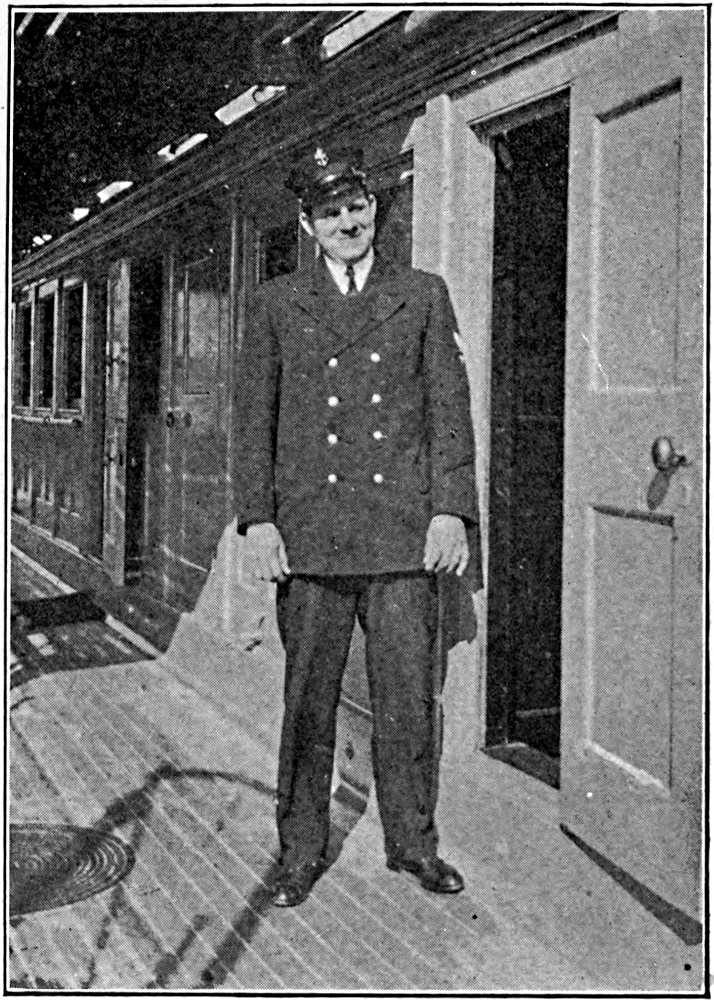
CHIEF YEOMAN PAULSON
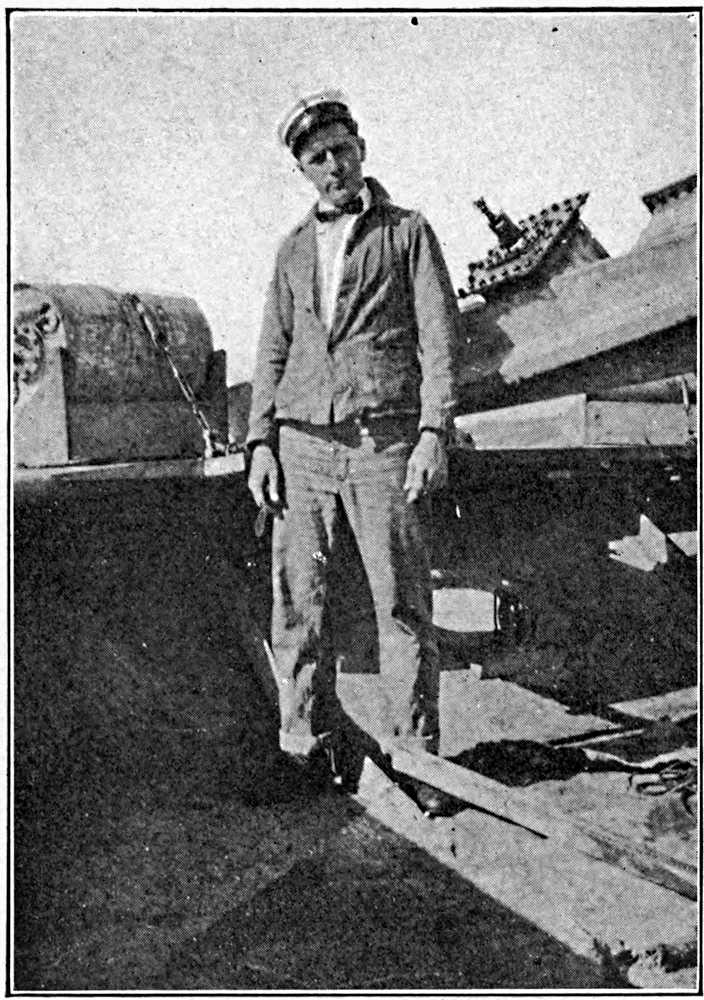
GUNNER’S MATE WILEY
The Alcedo left Quiberon Bay in the afternoon of November 4th with a convoy bound to the United States. In the middle of that same night, with murky weather, the yacht was fairly blown to pieces and twenty men were killed or drowned with [Pg 123]no chance to try to save themselves. It was assumed by the survivors, and quite plausibly, that in the darkness the yacht might have been mistaken for one of the transports by the commander of the U-boat, who, if he knew his business, would have preferred to pot one of the big troop-ships rather than a small escort vessel.
Commander W. T. Conn, Jr., of the Alcedo, was carried down with his ship, but somehow came to the surface and fought his way clear of the suction and the fearful confusion of débris and agitated water. He described the disaster as almost instantaneous, a disintegration of the yacht whose frames, bulkheads, and plates must have been ripped apart from end to end as though they were so much cardboard.
While asleep in the emergency cabin immediately under the upper bridge [said he], I was awakened by a commotion and received a report from some man unknown, “A submarine, sir.” I jumped out of the bunk and went to the upper bridge where the officer of the deck, Lieutenant Drexel Paul, informed me that he had sounded general quarters at sighting a submarine on the surface about three hundred yards on the port bow, and that a torpedo had been fired. From the port wing of the bridge I was in time to see the white wake of the torpedo as it drove straight for the ship. Lieutenant Paul had put the rudder full right before I arrived, hoping to avoid the blow. The ship answered slowly to her helm, however, and before any other action could be taken I saw the torpedo strike the ship’s side just under the forward port chain plates.
[Pg 124]
I was thrown down and dazed, for a few seconds, by falling wreckage and torrents of water. On regaining my feet, I sounded the submarine alarm on the siren to call all hands if they had not heard the general alarm gong, and to direct the attention of the convoy and the other escorting vessels. I shouted to the forward gun crews to see if they were at their stations, but by this time the forecastle was awash. The foremast had fallen, carrying away the radio aerial. I passed the word to abandon ship.
I then left the bridge and went into the chart-house to obtain the ship’s position from the chart, but the lights had gone out and I was unable to see. Stepping out of the chart-house, I met the Navigator, Lieutenant Leonard, and asked him if he had been able to send a radio and he said, “No.” I then went with him to the main deck and told him to take charge of cutting away the forward dories and life-rafts.
At the starboard gangway I stumbled over a man lying face down. I rolled him over and spoke to him, but received no reply and was unable to make out who he was, as we were all in darkness. It is my opinion that he was already dead. Moving to the after end of the ship, I took station on a gun platform. The ship was filling rapidly and her bulwarks amidships were level with the water. I sung out to cut away the after dories and life-rafts and throw them in the water, and told the men near me to jump over the side.
Before I could follow them, however, the ship listed heavily to port, plunging down by the head and sinking. I was dragged down with her, but came up again and swam to a life-raft to which three men were clinging. We managed to lift ourselves upon it, and then, looking around, I observed Doyle, chief boatswain’s mate, and one other man in the whaleboat. We paddled[Pg 125] over to them and crawled into the boat. It was half-filled with water and we started to bale and to rescue survivors from the wreckage. The whaleboat was quickly crowded to capacity and no more could be taken aboard. We then picked up two overturned dories which were nested together, separated and righted them only to find that their sterns had been smashed. Presently we discovered another nest of dories which were found to be seaworthy. We shifted some of the men into them from the whaleboat and proceeded to pick more men from the wreckage. During this time, cries of distress were heard from others adrift who had floated some distance away. Two of them were believed to be Ernest M. Harrison, mess attendant, and John Winne, seaman. We proceeded to where they were last seen, but could find no trace of them.
About this time, which was probably an hour after the ship sank, a German submarine approached the scene of the torpedoing and lay to near some of the dories and life-rafts. No effort was made to assist the men freezing in the water. Three Germans, presumably the officers, were visible upon the top of the conning tower as they stood and watched us. The U-boat remained on the surface about half an hour and then steered off and submerged. I then made a further search through the wreckage to be sure that none of my men were left in the water. At 4.30 in the morning we started away from the scene to attempt to make the nearest land.
The flare of Penmarch Light was visible and I headed for it, observing the star Polaris and reckoning the light to be about northeast. We rowed the boats all through the forenoon and sighted the Penmarch Lighthouse at 1.15 P.M. Keeping steadily at the oars,[Pg 126] turn and turn about, we moved toward the coast until 5.15 in the afternoon when a French torpedo boat took us aboard. There were three officers and forty men of us, who were promptly carried into Brest, where I was informed that two other dories, containing three officers and twenty-five men, had landed at Penmarch Point. This was the first news that these had been saved, for they had not been seen by any of my party near the place of the disaster.
It was true of the Alcedo that in the moment of gravest crisis the cohesion and discipline of the Navy manifested itself. Orders were given and obeyed while the shattered yacht was dropping from under the feet of the young men and boys who had worn the uniform only a few months. It was a nightmare of an experience in which panic might have been expected, but officers and bluejackets were groping to find their stations or endeavoring to cut away boats so that others might be saved. Such behavior was fairly typical of the patrol fleet, although no other yacht was doomed to such a fate as this, but there was the stuff in the personnel to stand the test and the spirit of fidelity burned like a flame.
The yachts had been playing the game lone-handed, hoping to be reinforced by enough destroyers to move the American convoys which were subjected to long and costly delays in the French ports for lack of escort vessels to carry them out through the danger zone. The news that the United States proposed to build two hundred destroyers sounded[Pg 127] prodigious, but it failed to fit the immediate occasion. To the Queenstown base were assigned the up-to-date oil-burning destroyers as fast as more of them could be diverted from home, and they were doing superb and indispensable service in cruising a thousand miles offshore to meet and escort the troop convoys in to France, but they could not tarry to take the ships out again nor to protect the slower supply convoys and undertake the other work of the Breton Patrol.
The French coast was compelled to do the best it could with the cards that were dealt. There was no such thing as discouragement in the Corsair or her sister ships, but the feeling grew that the job was vastly bigger than the resources. It was singularly cheering, therefore, when the flotilla of veteran coal-burning destroyers came storming in from the Azores, all stripped and taut and ready for business, looking for trouble and unhappy until they could find it. They became close kindred of the yachts, sharing the rough weather cruises with the convoys and, when in port, taking their doses of the dirty, back-breaking work of eternally shovelling coal in little baskets. And by the same token, their men wore the common mark of the trade, the shadows of grime beneath the eyes which soap and water could never entirely remove. Yachts and destroyers took orders from each other at sea and seldom disagreed. The authority depended upon which commander held the senior naval rank to qualify[Pg 128] him to direct the movements of the patrol division.
Reid, Smith, Flusser, Lamson, and Preston, they were rated as no longer young and in size were lightly referred to as the “flivver” class when compared with the thousand-ton destroyers operating out of Queenstown, while bets were made that a winter in the Bay of Biscay would be too much for them. But they stood the gaff and sailed home again after the war, while the unterrified crews bragged of the merits of their sturdy boats and forgot all the hardships. Like the yachts they had a sprinkling of college rookies among the bluejackets, and of Reserve officers on the bridge, while the Regular Navy leavened the lump.
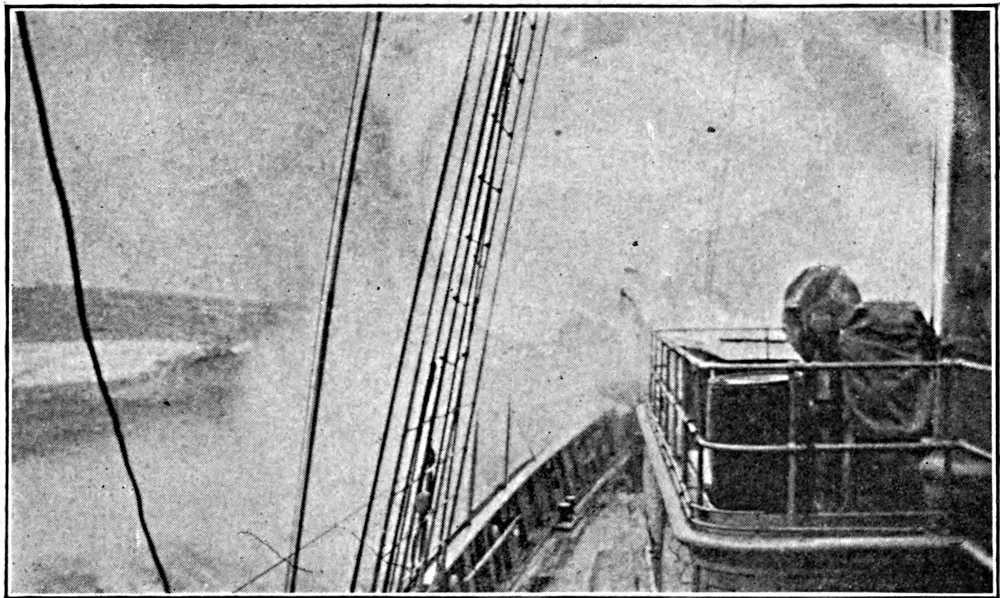
BUCKING INTO THE WINTER SEAS
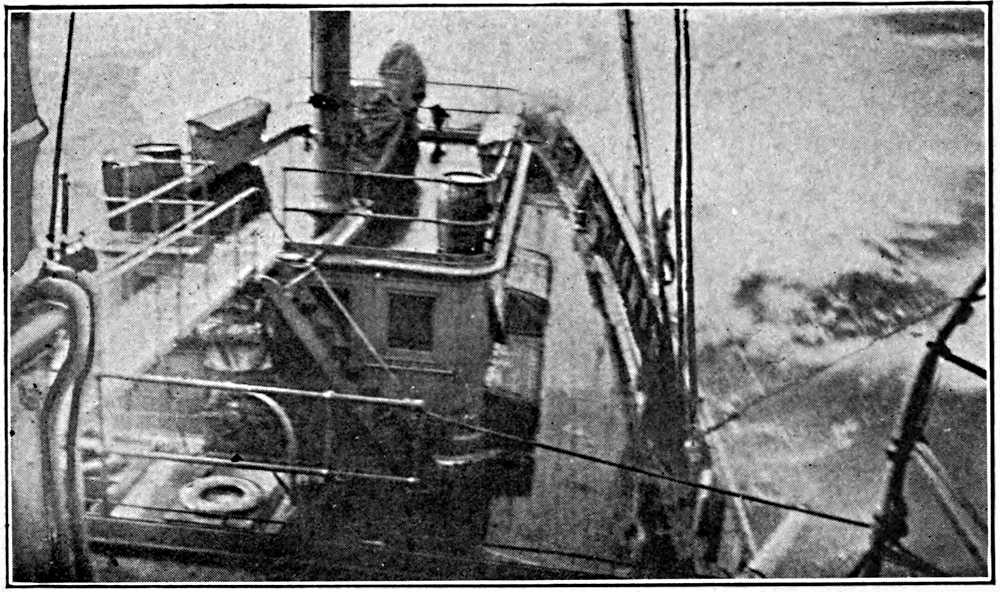
SHE TAKES ’EM ABOARD GREEN
When the November winds began to show their temper, blowing strong from the west and north, the Corsair had a foretaste of what the winter service would be like. There happened to be no one aboard who took the trouble to set down on paper, in diaries or letters home, just what the life was in the crowded compartments below decks when the ship was bucking and rolling five hundred miles offshore and the combers toppled green over the bows. In the Reid destroyer, however, was a young lawyer from Wisconsin, Timothy Brown, who was not only a very able seaman, but also something of an artist with a pen, and he managed to convey very adequately what all these young mariners put up with in order to make the seas safe [Pg 129]for democracy. Almost word for word, he might have been writing of the Corsair:
A wave suddenly lifted us and I went down on my right hip, sustaining severe contusions and abrasions, not to mention a general shaking up. Our chief pharmacist’s mate rushed up with a tourniquet, iodiform gauze, and sticking plaster and asked me what I needed worst. Thanking him, I made my way below and moored to a stanchion for chow. I call attention to the stanchions because our tureens, containing food and silverware, were hitched to them while the rest of the food was in aluminum platters which the mess cooks surrounded as best they could with their feet and knees. Occasionally a platter would get away from our inexperienced mess cook of the Reserve Force and he would dive across the compartment to nab it, only to lose other dishes which he was safeguarding. The hungry sailors would assemble the chow again, whereupon each man would help himself and eat under whatever endurable circumstances he could find.
Gentle reader, imagine yourself perched upon a camp-stool with your face to port and your back to starboard, at the seamen’s dining-table, trying to steer a bowl of soup safely into your face. The ship rolls forty-five degrees and your stool and soup bowl begin to slide at the same time. You hold the edge of the table with your left hand, clamp your spoon down hard into the bottom of the bowl to secure it, then cautiously push yourself to your feet, for the stool threatens to carry you across the compartment in a jiffy. The angle of the bowl now being constant with the relation it bears to the table, the angle described by the ship’s lurch spills half your soup. You quickly release your grip on the table edge and take the soup[Pg 130] in both hands to steady it. This leaves the soup suspended perfectly between zenith and nadir, fixed in its relation to the bowl, if you don’t weaken. Your spoon and slice of bread have been sliding all over the table, kept from hitting the wet deck only by a wooden flange. Before you can plan a campaign to absorb the soup, your feet begin to slip and ere you can blink an eye you have slid four yards across to the starboard mess table, your feet tangled with a stool, and you bump into a shipmate who turns loose his own soup so that it fits perfectly down the back of your neck.
The other day a tureen of canned salmon skidded off a near-by locker and landed under the starboard table. The mess cook plunged after it, but missed it by a hair. The tureen bounded into the lap of our Irish oiler, who shouted gleefully, as he clutched it with both hands, “I’ve got the bloody thing.” I was reminded of a fat football player receiving the ball on the kick-off in his centre of gravity and not knowing what to do with it. The ship’s swing back upset our hero and the salmon slipped away from him, landing on the locker of a gunner’s mate and spoiling a brand-new suit of liberty blues.
I had the misfortune, at this sad moment, to let a ration of stew get away from me to the deck. There was no use in staying below to hear the mess cook rave, so I seized a cold potato between my teeth and followed it madly all the way to the chart-house where I feasted in peace. I was thankful to be alive, thankful that I had a slippery deck to skate on, a speaking-tube to cling to, and an oilskin coat which fitted so snugly about my neck that not more than a quart of briny water seeped into it every time our good ship did a courtesy to the waves. Only a third arm could have made me happier. Every sailor needs one in his business.
[Pg 131]
The deck continued to be a sort of good-natured joggling board which playfully teased you, smashed you, and tried to exterminate you. In another hour I had contracted decorations on my knees that stuck out like hens’ eggs, slivers of skin had been peeled off my shins, and pains of various kinds convinced me that, although my heart, lungs, and diaphragm were still working, they had shifted from their accustomed places. I had grown so feeble from underfeeding and excitement that you could have knocked me flat with a dried herring. It would have been an advantage to go below and try to sleep, but the ship was as unsteady down there and the stifling air was not tempting.
When it was time to go below, a sudden encounter with a wave sent me to my hands and knees. Bethlehem steel is hard, so I crawled the distance to the ladder and fell to the quarter-deck, then fell down the other ladder to the head of my bunk. Only one light was burning and it was all wrapped up in black cotton socks so the submarines couldn’t see us. I groped my way into the bunk and removed my shoes, this being an old custom with sailors, to rest the feet. Then I stretched out and was ready for a few hours of slumber. However, the waves continued to pound us and made the night hideous. The machinery creaked and groaned and a leaky steam-pipe kept whistling like a peanut roaster. To stay in my bunk it was necessary to run my arms beneath an elastic strap that goes over the middle of the mattress and under the metal frame.
In this position I remained doggedly silent until midnight when our watch was called again. I was so sleepy that I remembered little of what happened during the next four hours, except that at the end of it I noticed a radio man swinging around a smokestack in an effort to snag our flying wireless apparatus and put[Pg 132] it to rights again. After two or three hours more of misery in the bunk, breakfast time came, with beans and loaf bread on the menu, and I felt sure that I would be lucky if I could stomach a single bean. Beans didn’t look a bit good to me, yet I was forced to eat something or I couldn’t stand another watch.
At the table we did not waste much time on etiquette. To wash your face for breakfast during a gale was considered a decided economic disutility, and we didn’t care what place we occupied just so we got a mouthful of grub. But one thing was always insisted on, and that was for a man to remove his headgear at meals. It didn’t make any difference whether a fellow had any pants on or not, but he must not presume to wear a white hat or a watch-cap. All hands would howl him out of the compartment.
The foregoing fragment of a deep-sea idyll is included in a war story of the Reid destroyer as deftly compiled by George M. Beatty, Jr., one of that dashing crew, and published with the title, “Seventy Thousand Miles on a Submarine Destroyer.” This young man was heartless enough to print in the volume a ballad of his own devising which had such things as these to say of the author of this chronicle of the Corsair:
[Pg 133]
Soon after the flotilla of coal-burners came to Brest, the whole scheme of American naval operations in France took on a new aspect with the arrival of Rear-Admiral Henry B. Wilson. He was the man to perceive the vital need of expansion and to create the organization so urgently required. Outspoken yet tactful, with the hearty affability of a sailor and the energy of a captain of industry, Admiral Wilson proceeded to build upon the surmise that the war might last three years and demand an American army of four million men. The pulse of the service quickened and the response was loyal and instant.
It was not long before the executive offices of the Admiral and his staff, in a tall building of Brest, resembled the headquarters of a busy firm in Wall Street. It was the centre of a network of communication by wire and radio with the entire shore-line of France, from Dunkirk to the edge of Spain, and with the Allied naval chiefs of Paris, London, and Washington.
The Corsair received her orders and did as she was told, but guiding her movements was the complex and far-flung activity of the secret intelligences which revealed only the deductions and the results. The Admiral’s changing charts were dotted with tiny flags and lines of red ink which recorded, hour by hour, the track of every German submarine that stole seaward from Zeebrugge, and the plodding courses of every Allied convoy that steered in hopes[Pg 134] of a safe haven. The decoding room unravelled the messages that whispered by day and night from a hundred sources, or caught and read the German ciphers that were sent to the U-boat skippers far out at sea.
Bit by bit was put together an organization of equipment and personnel which extended from Brest to a dozen other bases and separate patrol divisions, each with its own subordinate commander. Gradually it came to embrace such a list of departments and responsibilities as these:
| Coastal convoy escorts | Yard Boatswain’s Office |
| Harbor tug fleet | Radio repair shop |
| Naval Port Officer | Naval magazine |
| Marine Superintendent | Naval hospitals |
| Supply office | Shore patrol |
| Repair shops | Docks |
| Repair ship | Canteens |
| Barracks | Oiling stations |
| Personnel | Coastal stations |
| Pay Office | Coaling stations |
| Public Works. | |
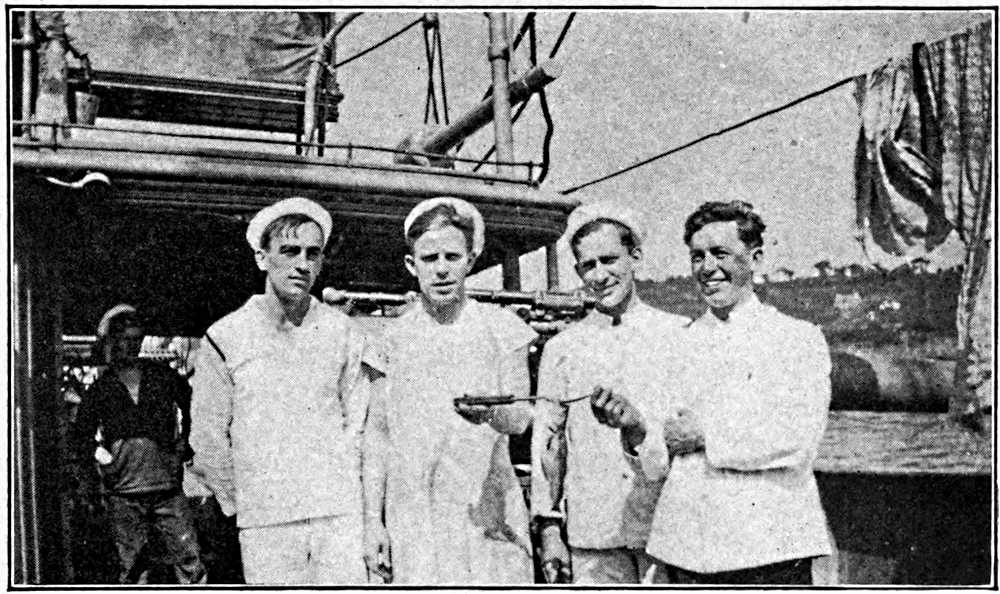
THE SHIP’S COOKS AND THE WARDROOM STEWARD
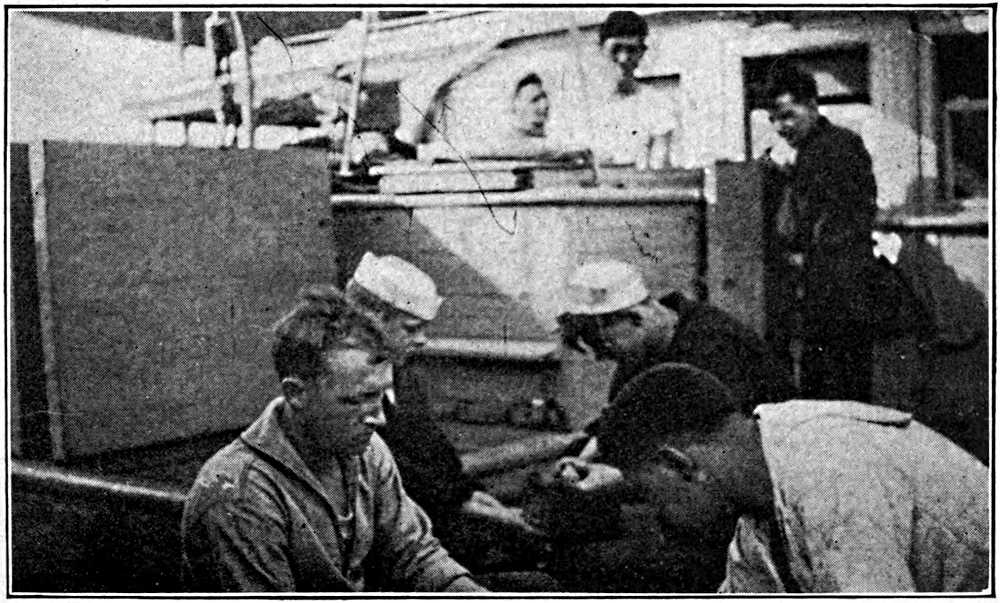
THE NOBLE JOB OF PEELING “SPUDS”
All this was not set in motion in a week or a month. Admiral Wilson had to build almost from the foundation. The French organization was depleted and worn. Vice-Admiral Moreau and Rear-Admiral Grout achieved everything in their power to assist the American undertaking, with men, ships, and material, but it was unfair to expect too much of them. When the Queenstown destroyers came into Brest and the officers found time to go [Pg 135]ashore, you might have heard them boast, in the most gentlemanly terms, of the splendid efficiency of their own base and the extraordinary ability of Admiral Sir Lewis Bayly, who directed their operations. At this, an officer from the Corsair was likely to fling back that the Queenstown outfit ought to get on, with the vast resources of the British Admiralty at its disposal and a base that had nothing much more than a fleet of destroyers on its mind. The whole French coast was cluttered up with transports and cargo boats, from Brest to Bordeaux, and it was some job to keep them moving, not to mention chasing Fritz. And as for Admiral Sir Lewis Bayly, K.C.B., he was said to be a fine old bird, but he wasn’t the only two-fisted, “iron-bellied” admiral in the war zone, and the doctrine of the Breton Patrol was “Wilson, that’s all.” In such manner was voiced the spirit of friendly rivalry between the Navy men of Brest and Queenstown and it was the kind of loyalty which you might expect.
French opinion of the work of the American naval forces found expression in the newspapers. Admiral Wilson was held in the highest regard, personally and officially, and L’Illustration said of him:
The indomitable will of our Allies is represented by Admiral Wilson. He has a physiognomy which you never forget. His quick manner of shaking your hand while looking you squarely in the face, the smile which, I dare say, follows up the orders he gives, his brief[Pg 136] and concise speech, denote a great firmness of character. He knows what he is here for and what to do, and as he wishes to carry on a big task properly he frees himself completely of details,—on his desk are no papers, no books, no litter of documents. He is precisely aware of what he wishes to be done, and when he has spoken his serenity shows that not for a second does he doubt that he will be obeyed.
La Dépêche, one of the journals of Brest, manifested the cordial feeling of the city in stating:
Admiral Wilson is now a well-known figure among us. He takes part in our daily life, shares in all our sorrows as well as in our hopes. Later, without doubt, the title of “Citizen of Brest” will be conferred upon him. It is a pleasure to converse, if only by means of an interpreter, with this fine mind which has a natural tendency to action. He makes his resolutions without embarrassing himself with paper work or useless formalities.
In the first week of November, the Corsair was sent to England with a group of American ships which were to join an outward-bound convoy assembling at Mount’s Bay, Penzance. Quartermaster Carroll Bayne mentioned this trip in his diary, as follows:
November 5th. Penzance is very interesting. All sorts of seaplanes, etc., flying about. I did not rate liberty, but most of the men did and went ashore for a few hours. I amused myself by holding a long conversation with a naval quartermaster on a British yacht, the Venetia, anchored near us. He was a good chap and a typical “Limey,” with his “carry on” and “awfully.”[Pg 137] ... 6th. Left Penzance. Night very dark. We have in the convoy, besides the four destroyers, the steamers Houston, Evangeline, Montanan, and two others. The Clan Cummings was to have come with us, but joined the British convoy which left half an hour ahead of us. She was torpedoed at 8 P.M. She was the biggest ship in the whole flock and was right in the middle of sixty-five other vessels. How the Germans do it, I can’t see. We had a scare this morning when the Evangeline hit something, either a mine or a wreck, or a submarine, or a torpedo. We dashed around and stirred things up, but there was no explosion or disturbance in the water. We proceeded to Saint-Nazaire and anchored safely.... Had a great fight on board. The “Spic” cook got into an argument with one of the firemen and it was some set to. The cook drew a knife which Dave Tibbott snatched away from him. The skipper took a hand and he surely had a full head of steam.
Another trip out with empty transports and then the Corsair was assigned to the escort of two of the huge ships which were unlucky enough to be torpedoed several months later, the President Lincoln and the Covington. This time they passed safely through hostile waters, and with them were the Pennsylvania, Nansemonde, and Neches. When these towering troop-ships began crowding into Brest, including those which had been German liners, it was significant of the fact that the American Army was really moving into France. Instead of battalions or regiments, the convoys were thenceforth to disembark whole divisions, and Brest was to see from fifteen thousand to forty thousand stalwart American[Pg 138] soldiers pour out of one group of ships after another. The responsibility of the escort vessels was heavily increased, and officers and men thanked God when one of these tremendous argosies had been moored outside the breakwater without hindrance or mishap.
It was while waiting for this convoy, just mentioned, to be ready for sea, on November 16th, that the Corsair became considerably agitated for fear that Commander Kittinger had been lost or mislaid. Quartermaster Bayne reflected the general state of mind when he noted:
Still in Quiberon Bay, waiting for the captain. Everybody is getting worried as to what has happened to him and the Smith. The scuttle-butt is full of rumors.... Tibbott, Houtz, Evans, Barry, and others are to be sent home to get commissions, but not a chance for me. The only thing, I guess, that our captain would recommend me for is a firing squad.
Commander Kittinger was having troubles of his own which may serve to convey an idea of the little trials and tribulations which were apt to beset the course of events in French seaports. In language admirably restrained, considering the provocation, he reported to Admiral Wilson:
The escort commander left the Corsair and embarked in U.S.S. Smith to make passage to Saint-Nazaire for conference with the Naval Port Officer. Shortly after passing du Four Light, the Smith was lost in the fog and anchored about 9.30 A.M. A boat was lowered and[Pg 139] by noon the ship was located as between Grand Charpentier and Le Pierre Perce. At this time a strong ebb tide was running which made navigation by dead reckoning doubtful. The Smith also had on board the French military pilot. Another attempt was made to reach the mouth of the Loire, but the soundings indicated shoal water and the ship was again anchored. Finally, at 10.30 P.M., the fog lightened sufficiently so that the principal navigation lights were visible and the ship got under way and anchored at Saint-Nazaire at 11.30 P.M. The fog again set in and continued through the night.
At 6 A.M., November 17th, I left the Smith to go ashore to confer with the Naval Port Officer. At this time the tide was running about five knots ebb and the fog was so thick that objects could not be distinguished for more than a hundred yards distant. The boat missed the landing and fetched up on the beach at Le Petit Taraict. I walked ashore and reported to the Naval Port Officer about 9.30 A.M. He informed me that he had no news, and calls were made at the Army Base and upon the Commandant Marine. No information of importance was obtained at the latter place. Afterwards a call was made at the Bureau de Renseignements which was found closed. An appointment was made for me to get the latest news at this office at 1.00 P.M.
Upon my return at that time the office was still closed. About 2 P.M. the fog lifted and I returned to the Smith in the captain of the port’s launch. On going aboard I found that urgent engine repairs were being made which would delay the ship for two hours or more. As it was impossible to get to Quiberon and hold conference in time to move the convoy that night, I decided to delay sailing until the following morning.[Pg 140] An appointment was made for a visit at the Bureau de Renseignements at 7 A.M. on the 18th, by the Naval Port Officer. I reported at that time and found the office was closed. I communicated by telephone with the office of the Commandant Marine and received no further news. Returned to Smith and got under way for Quiberon.
Six months of service in the Corsair had hammered most of the greenhorns into rough-and-ready sailor-men who had come to know the ways of a ship and the feel of the sea. A few still suffered and were pallid about the gills when the waves rolled high, but it was everlastingly to the credit of these unfortunates that they made no effort to be shifted to shore duty and were resolved to stick it out to the bitter end. The war bred many kinds of heroes and among them is to be rated the sailor who continued to be seasick. One youth in the Corsair confessed that he could never sleep below, but in all weather, month after month, he curled up on deck, in a boat, or wedged himself in odd corners, wet or shivering, nor had he any other intention than to stay with the ship until she flew her homeward-bound pennant.
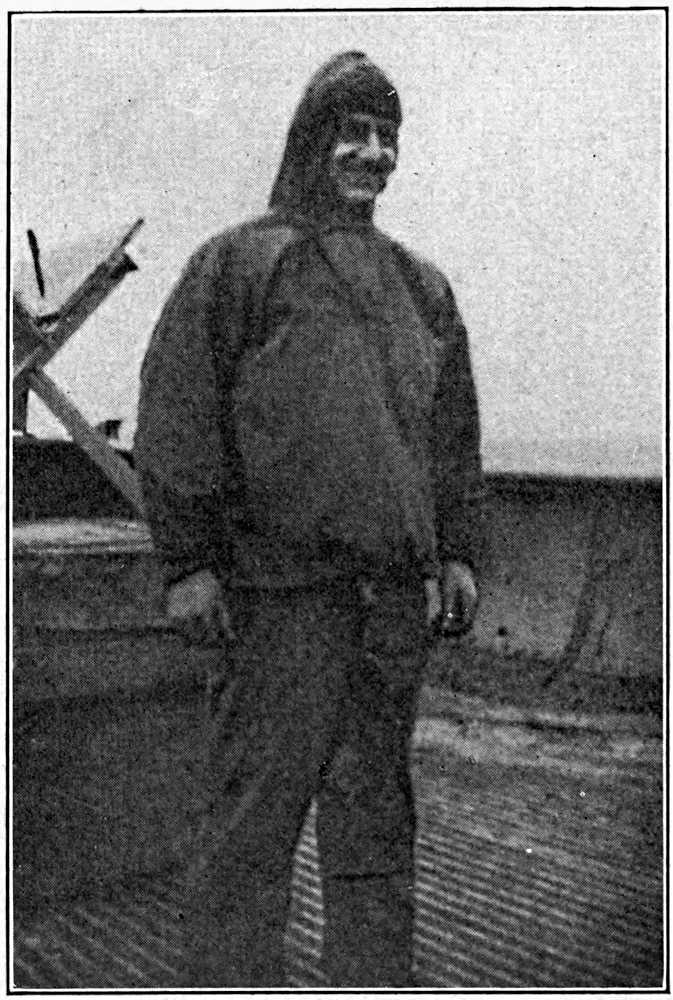
BOATSWAIN’S MATE HOUTZ IN THE NAVY’S STORM CLOTHES
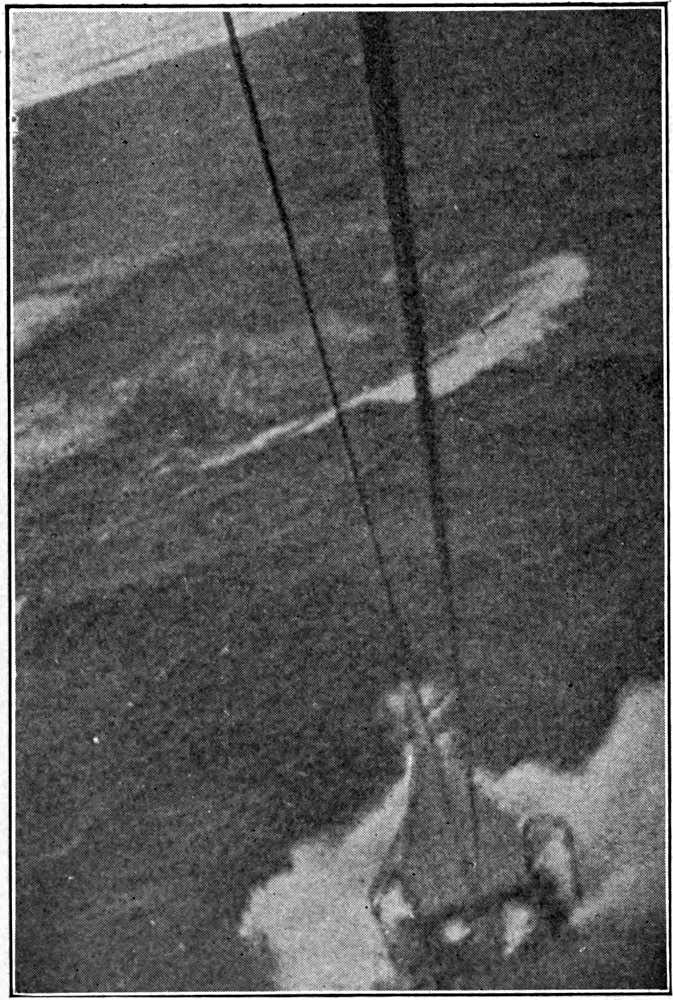
SWOLLEN SEA, FROM THE FORWARD CROW’S-NEST
The enlisted personnel, in respect of intelligence, ambition, and education, excelled the average of the Regular Navy. This was bound to be true of a Reserve Force recruited as this was. Many of them were anxious to win promotion and to attain commissioned rank. It was realized that the swift expansion [Pg 141]of the Navy, with a strength of fifteen hundred ships and four hundred thousand men already in sight, had made the shortage of officers acute. There was no prejudice against the Naval Reserve, and from its ranks were chosen most of the ensigns and lieutenants for the new fleets of destroyers and submarine chasers, for the transports and the armed guard of the merchant marine.
The word had passed through the Corsair that examinations could be held and commissions granted on board ship or at the base, and also that applicants whose records merited it might be chosen by the commander to go to Annapolis for the three months’ intensive course which would turn them out as temporary ensigns in the Regular Navy. Some of the aspirants preferred to study while in the ship and try to pass the tests, a little afraid that if detached for Annapolis they might not be sent back to the war zone.
It was inspiring to find the ship’s officers anxious to assist these ambitions. The Corsair became more or less of a nautical school. Earnest young men were to be found frowning over problems and text-books instead of playing cards at the mess tables or reading old magazines. Those who had been in college had a certain advantage in that they had been compelled to make some sort of an acquaintance with mathematics and were presumed to have acquired the habit of study. It was the popular thing to be a grind. Lieutenant McGuire and Chief Quartermaster[Pg 142] Shelton Fair showed keen interest in teaching navigation and were very helpful to the pupils who wrestled with the knotty points of the subject.
The novelty wore off, of course, and the laggards fell by the wayside, for the requirements were stiff, and dogged persistence and many a headache were required to master the technique of the naval ensign’s job. The reward was waiting, however, for those who deserved it, and there was no taint of caste or favoritism. The service was essentially democratic, barring only the differences in station which discipline demanded. Through the autumn and winter, the Corsair was schooling a fine group of ensigns for duty in other ships.
It may be of interest to explain what this course included, as defined by the Bureau of Navigation in a formidable document “Relative to Examinations of Enlisted Men of Regular Navy for Appointment as Ensigns for Temporary Service, also of Certain Reservists and National Naval Volunteers to Ensigns, Naval Reserve Force.”
In a general way the would-be ensign of the line was expected to pass examinations, written and oral, in such departments of knowledge as these:
General Instructions
Acquaintance with Navy Regulations and Naval Instructions and General Orders of the Navy Department.
Care of enlisted men’s clothing, bedding, and equipment and marking same.
[Pg 143]
Emergency drills,—such as fire, collision, abandon ship, etc.
Navigation (except Nautical Astronomy)
Rules for preventing collisions, international and inland.
System of buoyage in the United States.
Use of charts.
Describe a magnetic compass.
Describe how to lay a course.
What is variation and deviation?
Use of a pelorus.
Ability to take bearings and determine position by same.
Use of hand lead and precautions to be taken in obtaining soundings with hand lead.
Use of soundings in fixing positions.
Ability to read mercurial barometer.
Ability to navigate by dead reckoning.
Use of Chip log.
Use of patent log.
Adjustments of a sextant.
Use of an azimuth circle.
Use of Sir William Thompson’s sounding machine.
How to obtain chronometer rate by tick at noon.
Navigation (Nautical Astronomy, Sights, etc.)
Ability to take and work out the following sights of the sun:
Meridian altitude, time sight for longitude, obtain error of compass.
Seamanship
Types of boats used in the Navy and their equipment.
Handling of boats under oars and sail.
[Pg 144]
Boat salutes.
Hoisting boats.
Man overboard—lowering and handling of lifeboats.
Ground tackle and how to care for. Marking chain.
Duties of officer of the deck.
Ship’s log, what is put in, etc.
Etiquette of the side.
Routine ceremonies, such as colors, etc.
Orders to steersman, right rudder, etc.
Ordnance and Gunnery
School of the squad and company in infantry.
School of the section and battery in artillery.
Precautions to be taken in handling small arms and their ammunition.
Describe any Navy gun with which you are familiar.
Describe the projectile, fuses, and primers for any Navy gun with which you are familiar.
Brief description of the care and preservation of the battery.
While this mental fodder was in process of digestion, you might, perhaps, have overheard such abstruse and breezy dialogue as this, aboard the Corsair:
“Good-morning, old top. When may the officer of the deck decline to relieve the deck?”
“I pass. When shall the sides be piped, and what are the limitations placed on sending official signals?”
“You can search me. But I’ll bet you don’t know how to swing ship for reciprocal bearings.”
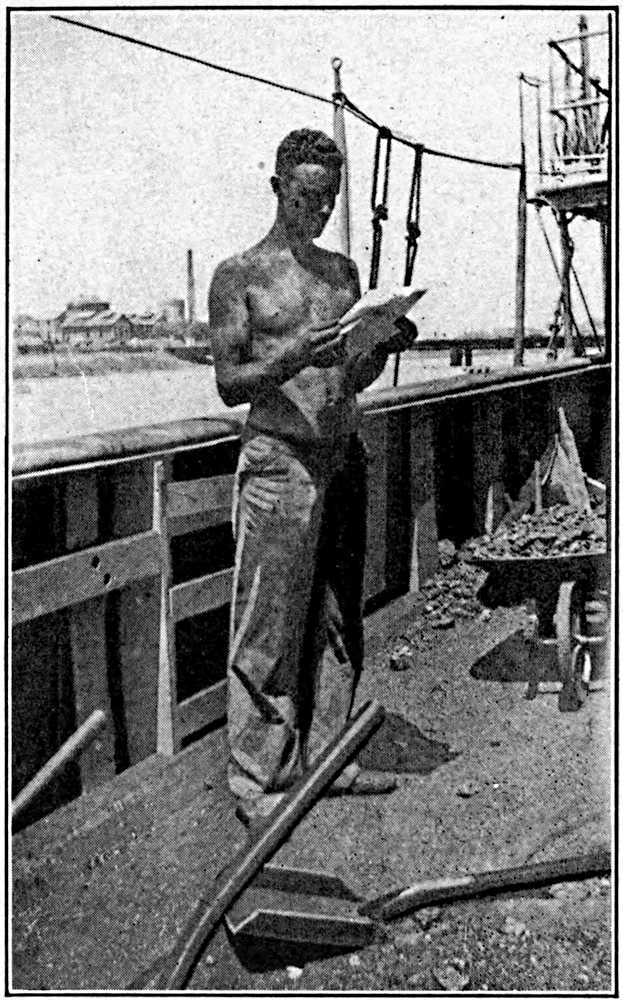
A LETTER FROM HOME. COALING SHIP MUST WAIT
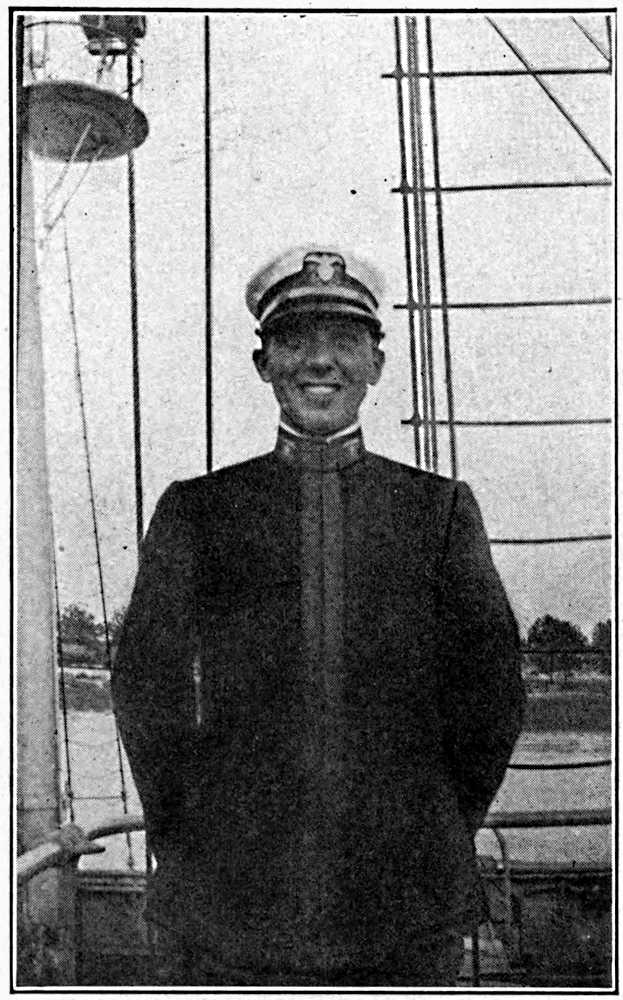
CARROLL BAYNE GETS HIS ENSIGN’S COMMISSION
[Pg 145]
“A cinch, my boy. Right off the bat, now, what is the correct dope on a Traverse Table and how do you use it?”
“You make me smile. Upon getting under way what special entry must be made in the ship’s log? Likewise and also, what is a Polyconic Projection? Snap it out, now!”
“You poor simp! I’m the man that invented that gadget. On the level, there’s only one question on the whole list that you are sure of.”
“What is it? I’ll bite.”
“When and where is the meal pennant flown?”
[Pg 146]
On the last day of November the Corsair got under way from Brest to find and escort seven American store-ships which were bringing cargoes to France. A division of Queenstown destroyers had picked them up at fifteen degrees West and was guiding them to the rendezvous. With the Corsair went the Reid and Preston, also three French patrol craft, the Glaive, Claymore, and Marne. As the senior officer, Commander Seiss, in the Glaive, was in charge of the Allied escort group. The voyage was without notable incident, but the difficulty of working together in different languages and with a mixed British and American convoy was indicated by Commander Kittinger in his official comment:
The senior officer of our escort was in a ship lacking efficient radio communication. As it is not to be expected that an eight knot convoy from New York will ever arrive at a rendezvous on a predetermined course at a predetermined time, the Chief of Escort should be in the vessel having the best communication. This is especially necessary during the winter when the daylight periods are short. I do not believe that the ships of our convoy knew their destination. With ships on their first trip, as most of these ships were, the masters of the vessels are not prepared to have another escorting[Pg 147] force join them and proceed to give them orders. This is especially true in the case of the British ship Anglo-Saxon, the master of which could not understand why an American patrol vessel should tell him to quit a British convoy. It would facilitate matters if the masters of all vessels, were informed of their destination and the probable time and place of their detachment from the New York convoy.
The Chief of Escort did not require the ships to zigzag nor to assemble in line formation as per doctrine. I do not believe it is advisable for the Chief of Escort to be a French officer acting with large convoys of American and English ships.
After this cruise the Corsair was placed in dry-dock at Brest, where a week was occupied in scraping, painting, and such overhauling as was necessary. The ship was in surprisingly good condition after six months of far more severe and punishing activity than she could have been reasonably expected to perform. Chief Engineer Hutchison and Assistant Engineers Mason and Hawthorn had kept things running down below without a serious mishap or delay, although the yacht’s engines had shoved her through 19,427 miles of sea during this half-year period. The fires had not died under the boilers for a stretch of five months. It seemed no longer quite fair to the Corsair to think of her as a pleasure craft. The words were incongruous. She had proved herself to be a brawny toiler of the sea.
An examination in dry-dock showed that the hull was almost as undamaged as when the yacht[Pg 148] had sailed overseas. A few butts of the plates needed calking. A small dent in the keel required new rivets and two blades of the port propeller had been bent by hitting something submerged. The crew very much hoped that the obstruction might have been the submarine which the ship attempted to ram on that moonlit night of October.
On December 13th the Corsair returned to her mooring buoy after this little respite in dry-dock and undertook the sooty job of filling the bunkers. Next day she stood to the southward and found a convoy waiting in Quiberon Bay. There the transports and supply-ships were split into two groups. The escort of the fast convoy, fourteen knots, was in charge of Commander Kittinger and comprised the Corsair with the three destroyers, Warrington, Roe, and Monaghan, which had been added to the flotilla. The slow convoy escort, twelve knots, was under the orders of Lieutenant Commander Slayton in the Reid, who had with him the Flusser, Lamson, Smith, and Preston. The whole destroyer force then available was therefore employed on this cruise, with the Corsair as the only yacht.
The German submarines had been creeping in to lay mines in the channels outside of Quiberon, and the yacht Guinivere and four American mine-sweeping vessels were busy clearing the fairways for the outward-bound convoys. In clear, pleasant weather the two groups of transports gained the open sea without running afoul of any mines and[Pg 149] were well on their way by nightfall of December 15th. The sea was smooth, unseasonably so for the time of year. The air had a nipping edge, but the temperature was well above freezing and the deck watches kept warm and dry in the wind-proof clothing which the Navy supplied for this service. The Corsair and Monaghan held positions on the right flank of the transports Madawaska, Occidente, and Lenape, while the two other destroyers trailed or scouted off to the left.
There was no premonition of terrific weather. For several days the barometer had been almost steady, at 30.50 inches or thereabouts. During the watch from eight o’clock to midnight of this first day, the sky clouded and the breeze blew stronger, hauling from northeast to north with steadily increasing force. The barometer began to drop and was at 30.00 when the watches were changed. There came a lull in the early morning, the 16th, when the rain squalls passed over, and with calm water the convoy steamed at fourteen knots. The Corsair was somewhat short-handed for this trip. Lieutenant Tod, the navigator, had been granted leave of absence to go to the United States and Lieutenant McGuire was acting in his stead. Boatswain Rocco Budani was also absent on leave.
By noon of this second day the wind had risen again, and this time it was boisterously in earnest, with a weight that swiftly tore the sea into foam and tumbled it in confusion. The barometer was[Pg 150] still “falling gently,” as noted in the ship’s diary, and hung at 29.30 until the weather was at its worst. The Corsair pluckily clung to her station with the tall transports until 2.30 in the afternoon, although the seas had begun to pile on board of her. The destroyers of this escort group concluded to turn tail to it and run for shelter before the storm increased to hurricane violence, but the five other destroyers with the twelve-knot convoy, the Smith, Reid, Lamson, Flusser, and Preston, stubbornly held on and so were fairly caught in it along with the Corsair.
When it became impossible to smash ahead any longer without suffering serious damage, every effort was made to signal the senior naval officer of the transports, by semaphore and flag hoists, but no response could be made out. The big ships, riding high, were able to snore through the wicked seas at ten or twelve knots, but the yacht and the wallowing destroyers had to slow down and ease up or be swept clean.
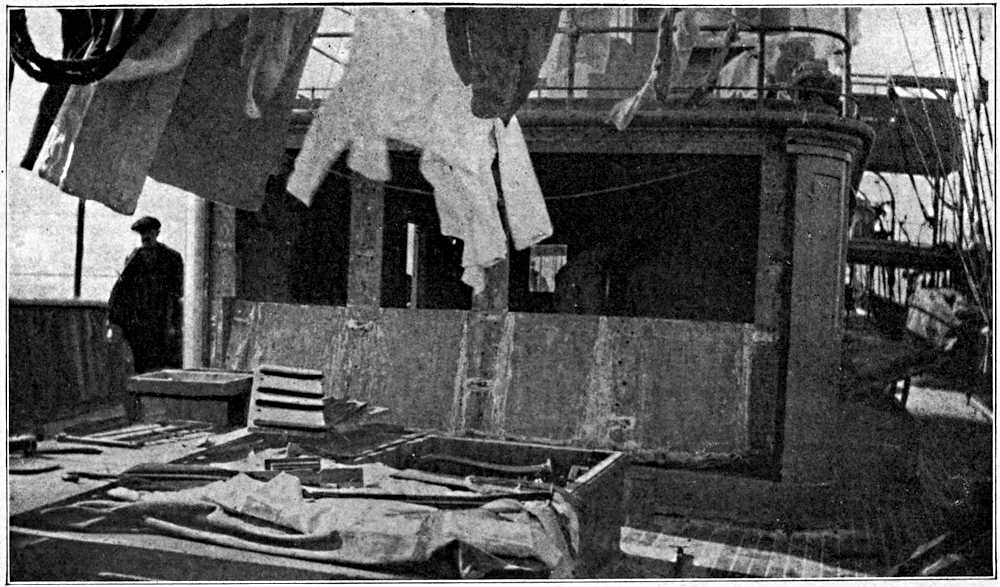
HOW THE HURRICANE SEAS POUNDED THE YACHT. “THE POOR OLD SHIP WAS A MESS”
Aboard the Corsair it was decided to make for Brest as a refuge, but this course brought the sea too much abeam, as was discovered after three hours of reeling progress which slowed to ten knots. When the afternoon darkened into dusk, the shouting gale had so greatly risen in fury that it menaced destruction. The destroyers had vanished in the mist and murk, endeavoring to save themselves and fairly rolling their funnels under. The Bay of [Pg 151]Biscay earned an evil reputation long, long ago, but very seldom does it brew such wild weather as this great blow of December, 1917. French pilots and fishermen could recall no storm to match it in twenty years.
It was the supreme test for the Corsair, a yacht which was, after all, handicapped for such a struggle. Officers and men prepared her to face it as best they could, but she could not be “battened down” like the rugged ship that is built to tramp the world. The deck-houses, contrived for comfort and convenience, presented an expanse of large windows and mahogany walls and were exposed to the battering of the seas. There was no passageway below to connect the fore and after parts of the yacht. As a war-vessel, she was already stripped of all extra fittings, and all that could be done was to make everything secure and meet it in the spirit of that famous old chantey of the Western Ocean:
The medium-sized destroyers, like the Reid and Preston, which also weathered this hurricane, had a narrow beam and a shallow draft that made them roll terrifically, but, on the other hand, they could be sealed up like bottles, and they dived through it with no great risk of foundering even when swept from end to end. With less than half[Pg 152] the tonnage of the Corsair they had ten thousand horse-power to whirl their triple screws. The decks might be washed clean of gear, but there were no houses to be knocked to pieces. The popular fancy that the destroyer is a fragile craft was disproved in the war zone. There were no more seaworthy, tenacious ships afloat.
Concerning what happened during this black night when the Corsair seemed to be washing to pieces and her holds were flooding, there were various versions and opinions. Most of the youthful landsmen, convinced that the yacht was going to the bottom, were frightened out of a year’s growth and not in the least ashamed to admit it. If they said their prayers, it was to be counted in their favor. The professional seafarers had their own misgivings, but with the stubborn, unreasonable confidence of their kind, they somehow expected to pull her through, believing in the ship as long as she was able to float. This was particularly true of Lieutenant Commander Porter, who had lived with the Corsair for so many years that she was almost a part of himself. He knew her moods, her strength and her weakness, and because she had never failed him he could not have been persuaded that she was unable to survive.
Man has contrived many cunningly ingenious structures, but none of them nobler than a staunch and well-found ship. The Corsair was a shell of thin steel plates, but every line and curve and hollow[Pg 153] of them had been influenced by the experiences of centuries of warfare with the sea. A good ship is, in a way, the heritage from unnumbered builders who, patiently, intelligently, wrought in wood by rule of thumb to fashion the frames and timbers and planking of frigates and barks and stately clippers long since vanished. The Corsair was given beauty, to a sailor’s eye, but there was more than this—the indomitable quality of resistance which is like the will to endure.
What may be called the professional language of mariners is curiously restrained and matter-of-fact. It is to be found in the pages of ship’s log-books, which are, as a rule, the dryest possible reading. This hurricane, for instance, in which so many amazing and heart-quaking things happened, in which the Corsair all but foundered, is dismissed in such entries as these, so far as the ship’s record is concerned:
8 P.M. to Midnight:
8.25 changed course N.N.E., speed 7 knots. 8.45 changed course N. Hurricane blowing from North. Sea very rough. Ship making no headway and shipping a great deal of water forward and over stern. 11.00 reduced speed to 5 knots. Possible to steer ship only by using propellers as well as rudder.
R. J. McGuire
Lieutenant (J.G.), U.S.N.R.F.
Commences and until 4 A.M.:
Hove to with head to wind, speed about 2 knots, whole gale with frequent hurricane squalls from N.[Pg 154] At 3.00 a heavy sea came on board and stove the forward deck-house. Seas also carried two French mines overboard and both mines exploded astern. Changed course to South and ran before gale at 5 knots. Manhole plate to lazarette washed off and large quantity of water entered, flooding engine-room. Water waist-deep in crew quarters and six feet deep in No. 1 hold.
W. B. Porter
Lieutenant Commander, U.S.N.R.F.
4 to 8 A.M.:
Running before heavy Northerly gale on South course, speed 6 knots. Very heavy following seas which broke on board very frequently. At 7.30 motor sailer broke loose but was secured with some injuries. Very heavy rain and hail squalls. Ship’s decks continually flooded.
R. J. McGuire
Lieutenant (J.G.), U.S.N.R.F.
8 A.M. to Meridian:
Steaming on course S. by W.—112 W. Speed 7 knots. Sea very rough. Hurricane blowing from North. Frequent heavy rain and hail squalls. Ship taking considerable water over the stern. Continued running before storm.
A. K. Schanze
Ensign, U.S.N.R.F.
Meridian to 4 P.M.:
Steaming on course S. by W.—112 W. Speed 7 knots. At 12.42 changed course S. 31 W. Hurricane blowing from North. Seas very large and coming over quarter-deck and both sides.
J. F. W. Gray
Ensign, U.S.N.R.F.
[Pg 155]
The war diary compiled by Commander Kittinger for the Navy Department is somewhat more explicit, but displays no signs of emotion. One begins to catch glimpses of the situation, however, and even to conclude that this intrepid naval officer would have felt much safer ashore. He also commits himself to the statement that the wind blew with hurricane force. A sailor will seldom go as far as this. When he does, you may be sure that old Boreas is giving the ship about everything he has in stock. What the agitated land-lubber calls a storm, and refers to it as a narrow escape, the skipper jots down as “a strong breeze”; or if it blows hard enough to snatch the hair from a cat’s back he may stretch a point and log it as a “moderate gale.” There seems to have been no disagreement among the experts that the Corsair poked her nose into a bona-fide hurricane, to be certified as such.
It was believed at this time, 8.25 A.M. [states the commander’s report], that the storm had reached the maximum and in a few hours it would moderate and permit shaping the course and returning to the base. The sea kept getting higher and higher and speed was reduced to six and then to five knots. The ship steered poorly and it was necessary to use the engines to keep her headed to the sea. At 9.20 P.M. took a heavy sea over port side which stove in the deck-house abreast the engine-room hatch. The sea was kept about one point on the starboard bow to prevent taking water in large quantities down the engine-room hatch. The[Pg 156] gangways were awash and it was impossible to keep water from going down the breach.
The condition of the wind and sea did not improve and at 2.55 A.M., December 17th, a heavy sea broke forward and completely carried away the hatch covering of No. 2 hatch and demolished the forward bulkhead of the forward deck-house and stove in the roof forward to about half way aft. This admitted great quantities of water below and conditions became dangerous.
Two French mines were washed overboard which exploded about two minutes apart. These mines had been set in a safe position and were inspected before dark. Apparently the safety pins had worked out of position during the buffeting of the heavy seas. The others stowed on deck were inspected and it was found that some of the safety pins had worked out of position.
At 3 A.M. the ship turned and ran before wind and sea. The water below had gotten about one foot over the engine-room floor plates but was soon under control. The ship made better weather but was by no means out of danger. Fortunately no seas broke over the stern although quantities of water were taken over which came through the after skylights which had been damaged earlier. At daylight the next morning it was found that a great deal of damage had been done to all skylights, deck-houses, boats, and deck fittings, and that both the after deck-houses had been started on the port side.
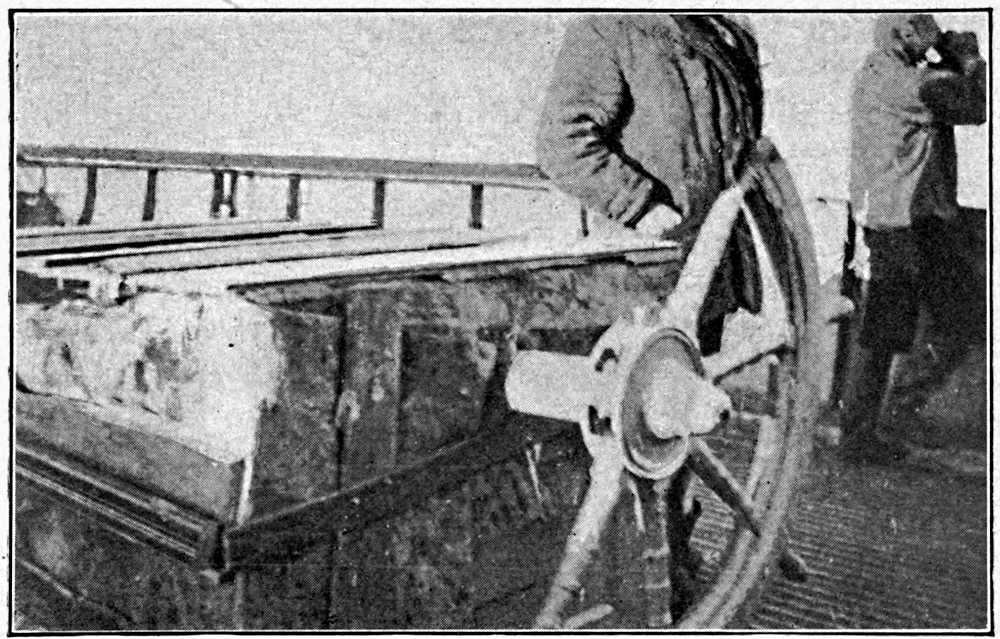
WHAT WAS LEFT OF THE EMERGENCY WHEEL
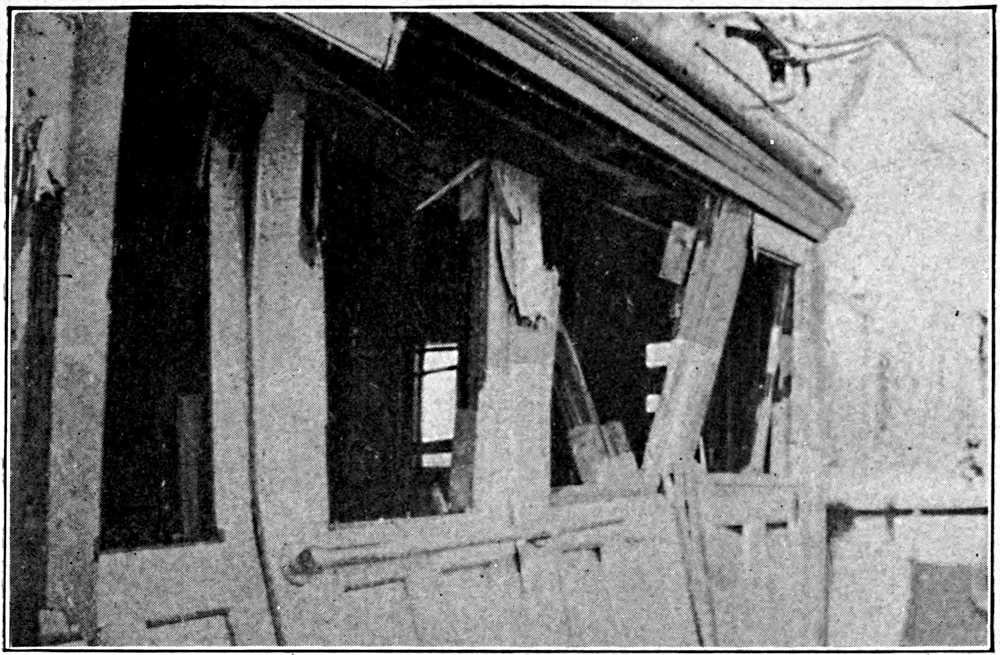
WHEN THE HURRICANE SLAPPED THE WINDOWS
At 10.00 A.M. took a heavy sea over starboard quarter which stove in the starboard side of the engine-room deck-house. The wind and sea continued. It was evident that the ship would not reach a French port as her safety lay in running before the sea. At noon [Pg 157]got a doubtful fix by observation and shaped course to pass west of Finisterre. At 3.00 P.M. got a good fix by observation which verified the course. At 12.50 A.M., December 18th, passed Cape Villano abeam, distance eight miles.
Consideration was given to a port of refuge. The nearest available Allied port was Lisbon which could not be reached until nightfall. As there was no information concerning entrance to this port, nor a code for radio communication, I decided to make Vigo, Spain, and rest there until Lisbon could be made by daylight. Anchored the ship at Vigo at 8 A.M. and communicated with the American Consul and with the Spanish Military, Naval, and Health authorities. Received weather reports and other information.
At 5 P.M. got under way and arrived off Lisbon about 8.30 A.M., December 19th. Took a pilot on board and obtained permission to enter port at Cascaes Bay. Moored to buoy off Lisbon at 10.30 A.M. Got into communication with the Portuguese Naval authorities who viewed the damage and said that repairs could be effected without difficulty. At 3 P.M., December 20th, took berth alongside of dock at Naval Arsenal and started repairs.
In their own diaries and letters home, the men of the Corsair managed to get more excitement out of the hurricane than one might infer from the tabloid narrative of the skipper. There were unusual features, such as the explosion of the depth charges which washed overboard and “functioned perfectly,” blowing up so close astern that many of the crew supposed the yacht had hit a German mine or the boilers had gone up. Other “ash cans”[Pg 158] were adrift on deck, thumping about with the drunken motion of the ship or unreeling the cable which detonated them. In the tumult and commotion of wind and sea, petty officers and seamen groped to find these perilous metal kegs, diving after them as though they were so many footballs and trying to hold them fast.
Dave Tibbott, for example, was discovered with a depth charge jammed against his stomach while he clung to it and the rail. E. L. Houtz won a letter of commendation from the Secretary of the Navy for clambering down into the blackness of the lazarette and hoisting out a depth charge which had plunged into this compartment when the hatch cover was washed off. The cable had unwound and he followed it down, hand over hand, so locating the infernal machine. He floundered about with it, managing to get a footing upon some boxes, and so hung on by the eyelids until comrades could help him and his burden up the ladder. One of the quartermasters wrote his own impressions, somehow finding a dry spot in which to use a pencil:
December 16th. Pretty heavy sea, and gale blowing and hitting us hard. At 2 P.M. asked permission of the convoy to leave for Brest before the big storm breaks. Later. This may be the last entry I’ll ever make. We are in a hurricane and a mountainous sea. Unable to proceed without swamping and are now hove to in the teeth of the gale, barely making headway. The water is about four feet deep on the decks.... 17th. A terrible day and none of us expected to live through it.[Pg 159] At 2.45 A.M. there was an awful crash and then a flood of water poured below. We all thought she had foundered and fought our way to the topside through water and wreckage.
I had just reached the deck when there was a tremendous explosion and the ship took a bad list. Water poured in everywhere. I heard some one yell, “My God, we’re torpedoed,” but I thought it was one of the boilers. Some of the men were manning the boats, and I had some battle to get to my station on the bridge without being washed off like a chip. I had just climbed to the bridge when there was another explosion, and a flash. My first thought was that we had struck a mine-field and then I heard one of the officers say that our own mines were going off.
Ensign Schanze ran aft to see if our stern was gone and found the watch chasing loose mines all over the deck. As fast as they were caught, the detonators were removed and they were pitched overboard to get rid of them. I stood at my post on the bridge expecting the ship to sink under my feet at any minute. I had made up my mind not to try to go in a lifeboat on account of the size of the sea, but to grab something wooden if I could. At this time a heavy rain squall swept over us. When I saw that the ship was not sinking, I went below to the engine-room to get warm.
I found conditions pretty serious there, with two feet of water around the engines and the engineers and firemen working in water up to their knees. The word was passed that we had turned and were running before the sea, and as long as the waves did not start breaking over the stern we could stay afloat. At 7 A.M. the seas got worse and began coming over. First to go was the engine-room bulkhead. It caved in with a frightful crash. Our radio also went down. Things[Pg 160] looked mighty unpleasant, believe me, and after a conference with the executive officer, our commander decided to run straight ahead and try to fetch the coast of Spain. It was our only chance to save our skins, so we plugged ahead at a few knots.
Early in the afternoon the seas rose sixty feet high, at a safe guess, and began combing over our stern again. The after bulkheads were now giving way and it looked like our finish. The skipper had passed the word for all hands to turn to and save ship. We tore down doors, lockers, anything for lumber, and set to work reinforcing bulkheads. As soon as one carried away, we built another. The deck had tons of water on it and was leaking badly. Also the fire-room was filling up. The pumps were set going and we kept about even with the water. It was a flip of a coin whether we would win through and every man was fighting for his life.
At 6 P.M. the wind and sea decreased a little and the water stopped coming over. At 10 o’clock we sighted the lighthouses on the Spanish coast and felt that we had better than an even break of getting into port. It was a tough experience, one that we don’t care to repeat, and the poor old Corsair is all in, pretty much of a wreck barring her hull and engines. The ship’s company are a smashed-up, tired-out lot. There is hardly a man aboard without an assortment of bruises. My back is almost broken.
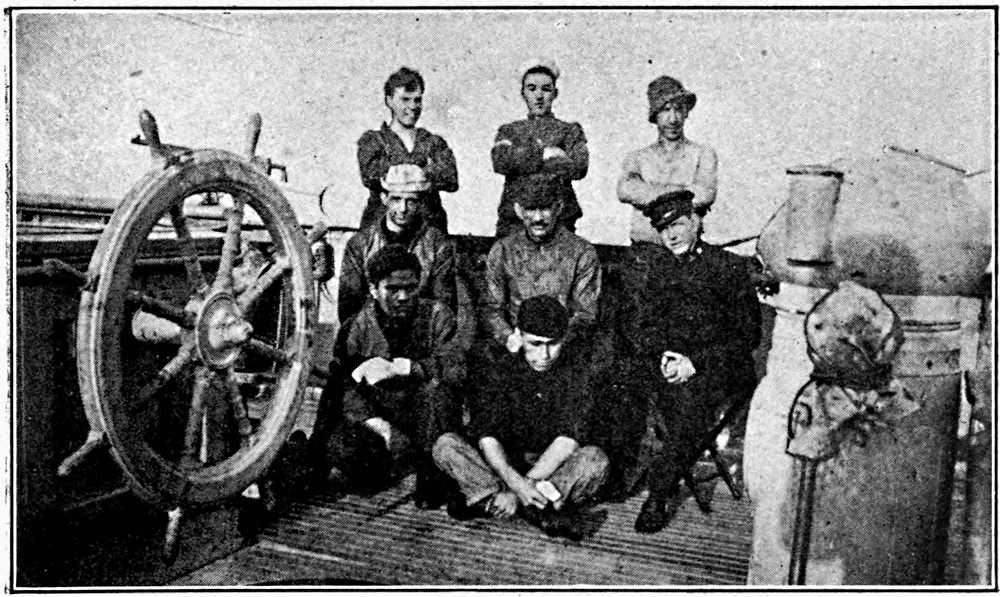
ASSISTANT ENGINEER HAWTHORN AND HIS WATCH
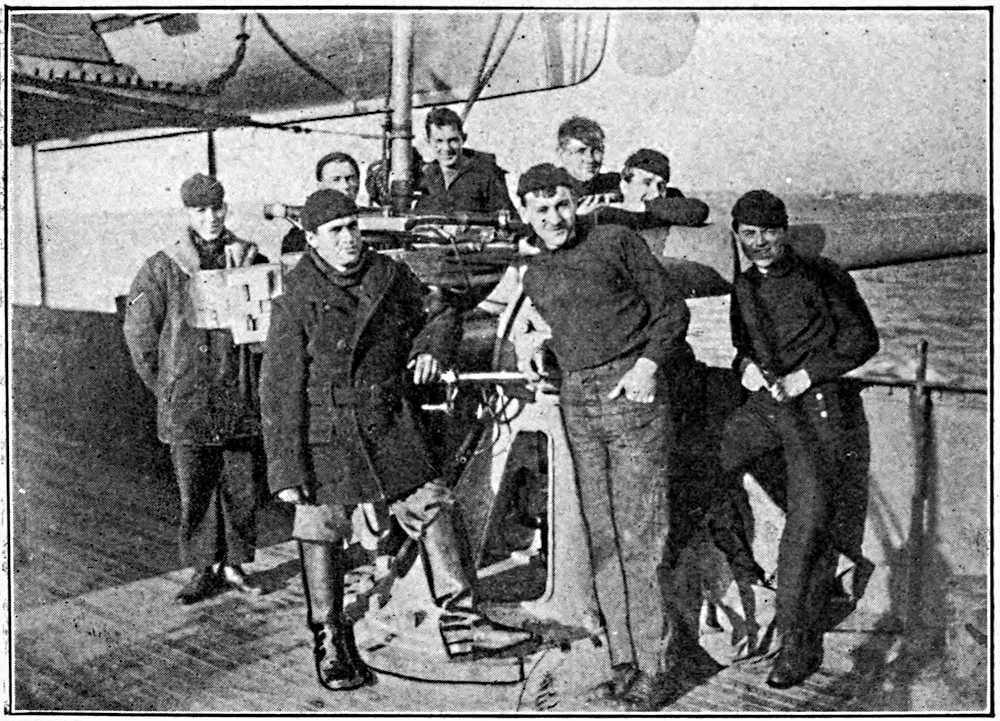
THE CREW OF NUMBER THREE GUN
Throughout the ship men were endeavoring to do their duty and to perform the allotted tasks, just as this quartermaster had struggled to his station on the bridge when he thought that the Corsair had been blown up. When one of the boats [Pg 161]was in danger of being whisked away by a breaking sea, young Henry Outwater climbed into it and rove new falls, sticking to it until he had finished the job of working the stiff rope through the blocks. He was under water part of the time, and the fury of the wind was such that “he whipped straight out like a pennant,” as he afterwards told his mates. At any moment he and the boat were likely to go careering off together on the back of a thundering sea. No officer of the Corsair would have ordered him to risk his life in this fashion. He did it because he thought it ought to be done, a detail in the line of duty. The same spirit was shown by Boatswain’s Mate Mulcahy, who noticed that the port anchor needed to be secured. The ship was plunging her bows clean under as he crawled forward and fought the smothering seas while he wrestled with the lashings.
It was bad enough on deck, but worse to be far down below in the engine- and fire-rooms where the black water swashed to and fro and rose higher and higher. The pumps had choked with coal and ashes and it was touch and go before they were finally cleared. In this immensely difficult task, working mostly under water, Carpenter’s Mate Evans bravely helped to free the bilge suctions. Engineers, oilers, water-tenders, and the grimy watches of the furnace gang had dumbly, courageously run the chance of death by a torpedo through voyage after voyage. Now the sea had become an enemy even[Pg 162] more ferocious than the U-boat, showing every intention of drowning them where they stood; but these were no quitters and the ship had steam enough to hold her hove to or to send her surging off before it. They were alert and steady for the signals from the bridge and they kept the heart of the ship beating strong and responsive to the need.
The twin screws helped to steer her, now with a thrust to starboard, again with a kick to port, whenever the hurricane would have rolled her helpless. One of the bridge watch, yarning about it in Lisbon, recalled this incident:
“I went below to roost on the steam pipes and thaw out, and you couldn’t call that outfit excited at all. What made a hit with me was a kid of an oiler who stood in the water between the two throttles, with a grip on each of ’em while he nursed the engines along. He had to help steer the ship as he got the word, opening up a little on one, shutting off on the other. Getting drowned was the least of his worries. All he had on his mind was coaxing the ship as she needed it, and the water was splashing around his legs, at that.”
“It reminds me,” chipped in another of this reminiscent group. “In the morning of the big blow, a guy of my division appeared on deck all dressed up in his liberty blues. The bo’s’n’s mate asked him what he meant by turning out all dolled up like that. ‘Why, Jack,’ answered this cheerful gob, ‘I have a date with a mermaid in Davy Jones’s locker.’”
[Pg 163]
“Like a couple of huskies of the black gang,” said some one else. “They were in their bunks snoring away like a pair of whistling buoys, dead to the world, although the fo’castle was flooded and the water was sloshing under ’em. The hurricane had worked itself up and was going strong, but they were off watch and the important business was to pound their ears. The first depth charge exploded and shook the ship up, and all hands were beating it for the deck, leaving their clothes behind. These two birds rolled over and sat up and yawned. ‘Say, bo, do you suppose we’re torpedoed?’ observes one, sort of casual-like. ‘It sounds and feels like that same little thing,’ replies the other. ‘I guess we might as well dress and see what it looks like.’ They were calm and deliberate, just like that, waiting to put on their shoes and pea-jackets and oilskins, and sort of strolling topside. My theory is that they had dreamed of being torpedoed and talked about it until the real alarm had no pep to it at all.”
“Do you fellows remember this? Somebody found ‘Tex’ on his knees, just after the whole wet ocean spilled into the after hatch. He was not a prayerful man, as a rule, so the spectator stood by to listen to ‘Tex’ at his supplications. He wasn’t praying for his own life, but for the safety of Shelton Farr who had tried hard to make ‘Tex’ follow the course of a virtuous sailor. ‘Oh, Lord, don’t bother about me, but save Fair,’ was the petition. ‘He is entirely too good to die.’”
[Pg 164]
“I said my prayers earnest and often,” confessed a stalwart gunner’s mate. “On the whole, the crowd behaved pretty darn well. I happened to see two or three boys sort of sticking to each other for comfort, and there were tears in their eyes and maybe one did blubber a little, but they were mere kindergarten infants, sixteen or seventeen years old, and it was a rough deal to hand ’em. A quartermaster came off watch from the bridge and one of these babies stopped him to ask what the skipper and Captain Porter thought about it. ‘They say the ship is going to pull through,’ the quartermaster tells these children. That was all they wanted to hear. They bucked right up and began to grin.”
To have the deck-houses smashing about their ears was enough to make the battered crew unhappy, but the most serious accident was the loss of the heavy round hatch plate which covered the entrance to the store-room or lazarette. Into this opening the sea poured in torrents as it broke and roared aboard, and it might have sunk the ship in a short time. You may be able to fancy how they labored to plug this hole with anything that came handy, while searching parties crawled and groped to find the missing hatch plate. Never was a game of hide-and-seek so desperately energetic. Luckily the metal cover had not gone overboard and before the holds filled with water it was found and screwed down to stay.
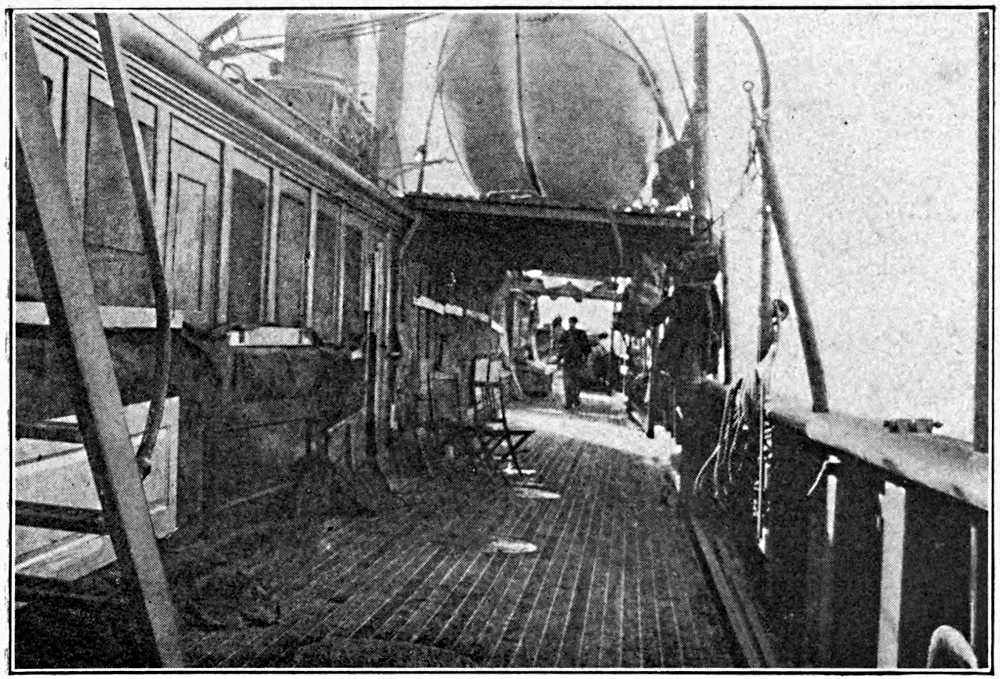
TEMPORARY REPAIRS, AFTER THE HURRICANE
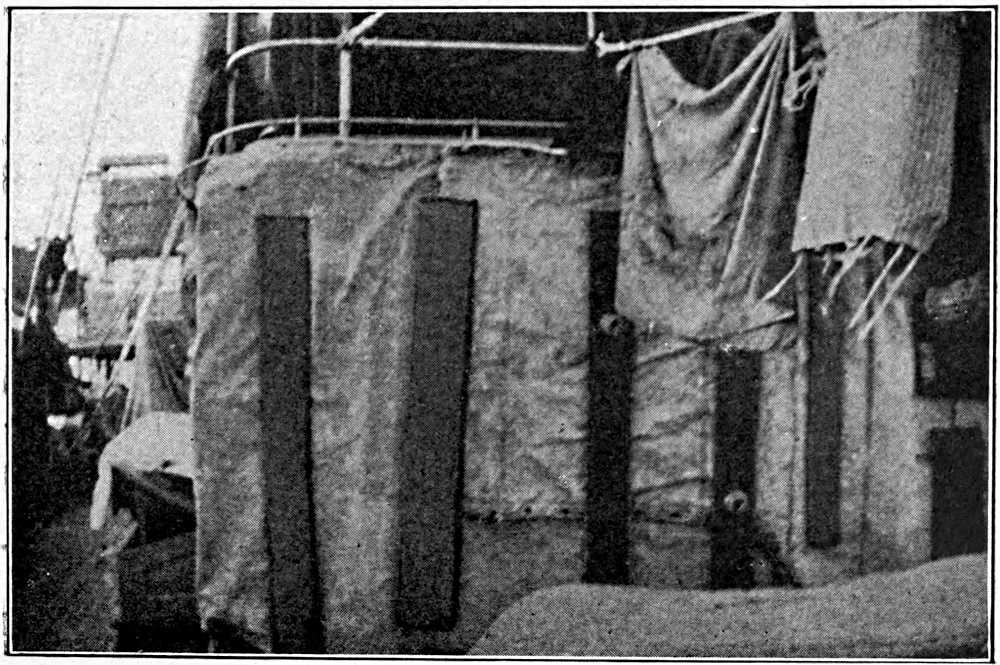
WHAT THE FORWARD DECK-HOUSE LOOKED LIKE WHILE RUNNING FOR LISBON
Much water flowed down the stairways and ladders [Pg 165]when deck-houses and bulkheads were rent and twisted, and the living quarters were as wet as a duck farm, but such damage was not vital. When the spacious forward house, used as the officers’ dining-room, was crushed for half its length, among the débris flung this way and that was the panel with the carved couplet:
It was fished out from under the deck planking which had been pried up by the sea, and the seaman who found it eyed the oaken board in a pensive manner as he said:
“Truer words were never spoken. The old boat has sailed every which way in the last two days, including upside down, and you can take it from me that there’s been nothing restful about her, nothing at all.”
Ensign Schanze tried to tell what happened when next he wrote to the folks at home and he succeeded very well, adding details and touches which might otherwise have been overlooked:
Picture to yourself the situation of a ship partly filling with water, at three o’clock in the morning, in a storm of ever-increasing violence, everybody on board wet and cold and exhausted, and then suddenly having a few beer-kegs loaded with dynamite going off just astern of her. It was a five-reel thriller and no mistake. We took the seaman’s forlorn hope of turning in that sea and trying to run before the storm, and we got[Pg 166] away with it. The danger in that point of sailing lies in the possibility of having a sea board you from astern, and when that happens the ship usually founders.
When I say that the Corsair was wet, I mean wet, not merely moist. There was not a deck or a room in her, excepting the chart-house, which had at any time less than six inches of water sloshing about in it. At the instant just preceding the big smash that made us turn tail, I had left the bridge to go aft and look the ruins over. The big sea that squashed us, after doing its dirty work, rushed aft just as the ship rose to climb the next oncoming wave. At that moment I had reached the foot of the ladder that leads from the lower bridge to the main deck. As she was rolling hard and had a foot of water all over that deck, I was hanging to the hand-rail that runs along the deck-house. I heard the crash and knew what was stepping in my direction, so I clawed onto the hand-rail with both hands. The water came racing aft and piled up against my back until I was in a depth of at least six feet. My hold on the rail was useless and I was carried down the deck about a hundred feet in a most undignified attitude, to wit—in a posture halfway between sitting and lying on my back. Just as I regained my feet, the first mine went off. You can imagine my thoughts on the subject.
As it was out of the question to sleep in any of the regular living quarters, our men clustered around the engine-room hatch and in the blower-rooms and got what sleep they could in that manner. None of the officers got any sleep for thirty-six hours. At one time, when we were running before the storm, I looked into one of the blower-rooms and saw a man seated in about six inches of water, fast asleep. Tommy, the ship’s cat, was asleep in his lap. A comber boarded us over the[Pg 167] side and increased the depth of water so that the next roll of the ship got Tommy very wet. He jumped from a sound slumber in the man’s lap to a wide-awake and frightened posture upon the man’s shoulder. Another sea climbed aboard to disturb poor Tommy again, so he perched himself upon the man’s head and there he stayed for two hours.
I saw Commander Porter get into an argument with a big boarding sea and my next view showed him lying alongside the outer rail in water two feet deep. There is no sense in arguing with a sea like that. One must go where it takes him and be glad when he is jammed into a secure corner.
Several boxes and packages came aboard for me just before this trip, each marked “To be Opened on Christmas,” so I carefully stowed them away. The hurricane flooded my room, of course, and drenched all my precious holiday packages. Despite the big flood, everything came through in fairly good order, barring the Christmas cakes, which turned into a beautiful clinker after they had been dried out on a steam radiator. Now we have to dig them apart with an ice-pick.
The walnuts and Brazil nuts sent by my loving friends did very well in the storm. They went adrift early in the excitement and got caught in the bilge strainer during the time we were pumping the water out of the ship. The chief engineer found them all when he put on his diving suit to see what kept the pumps from working, and I claimed the whole bunch, knowing full well they were mine. Several odd socks also mingled with the bilge strainer, but they were not mine. The captain, Gray, and I had a nut party in my room on Christmas night and very much enjoyed the bilged nuts.
[Pg 168]
Yeoman Connolly was not likely to forget the night of the storm which caused him to say of his own emotions:
All went well, except for a few seas we took over the side, until three o’clock Monday morning. I was in my bunk below decks at the time and, by the way, all I had on in the line of clothing was my underwear and the heavy sweater sent me from home. It was the first time since the day I watched the Antilles go down that I had turned in without all my clothes on. We figured that we were free from the danger of submarine attack in such a rough sea, hence our “nighties.” I fell asleep about midnight and was slumbering peacefully when I heard and felt an explosion and woke to find everybody making for the hatches. Dazed, I ploughed through about four feet of water, almost naked, and popped on deck. There it looked to me as though the old ship had been almost blown in two. Deck-houses and hatches were all messed up and the yacht seemed to be slowly settling. We made for the boats only to find them smashed, and then waited for orders.
The cry went round, “All hands save ship,” and if you hear that once you’ll never forget it. By this time I had scooted through the yeoman’s office and grabbed enough clothing together so I could lend a hand on the topside. It was the coolness of the officers and men that saved us from watery graves. We tore apart every table and door below decks to mend things until we could make port. I don’t believe the ship will ever go to sea again, except that she may be put in good enough shape to take us back to France from Lisbon about the middle of February or thereabouts.
Of the destroyers which were caught offshore and[Pg 169] rode out the hurricane, the Reid was blown into Oporto, severely knocked about. Her log recorded:
December 17th. Torpedo truck carried away and washed overboard. Lost machine lathe and wherry. Whaleboat smashed and ice-box, life-preserver locker and vegetable locker broken loose by seas breaking aboard. Lost life-buoy light, compass binnacle light, guard to wheel chains, etc. 8 A.M. to noon, steaming as in previous watch. Having serious main engine bearing trouble, due to salt water in lubrication system. At 9 A.M. passed U.S.S. Corsair close aboard and asked her to stand by and assist us back to Brest. (Corsair had answered our S.O.S. from near by.) Lost sight of Corsair at 10.30 A.M., due to rain squalls and heavy weather. Foot of water in firemen’s compartment through hatch, and engine-room and all other compartments flooded.
The engine-room log of the Reid makes interesting reading, for the Corsair was in much the same plight:
Heavy sea swept over engine-room hatch at 4.30 A.M., carrying away ventilators and lathe and flooding engine-room. Glass covering to oil manifold carried away and settling tank flooded. Bearings running warm. Too much water running from sea.
The Smith destroyer lost both masts and a fireman overboard who was rescued after an hour when the cook swam to him with a line. The paint locker was stove in and the yeoman’s office washed out, which meant the loss of many painful hours of paper work. The vessel spent two weeks in dry-dock[Pg 170] in Brest. The Roe and the Monaghan were nearer the coast, and although each lost a mast they scudded for shelter in time to avoid the worst of the blow. The Flusser and the Warrington were badly battered and had to lay off for repairs. The Preston limped into Lisbon, sighting the Corsair just outside the port, and the two ships remained there together until they could be made fit for sea again.
That lively historian of the Reid, Seaman (later Lieutenant) Timothy Brown, added some bits of life in a storm which the crew of the Corsair considered appropriate to their own unhappy hours:
As the elements continued to harry us, I could notice a changing sentiment among certain members of the crew. Several expressed the opinion that she would soon break in two in the middle. It was only a question of time. Others were too far gone to have any opinion about anything, and these afflicted ones lay helpless, clutching at whatever they could gain a hold. They were attended by their close friends. Our lawyer clung to a table and scribbled on a pad. He was framing a poor devil’s will. A brave lad from the Middle West suggested that it might be well to throw out some ballast—too much water was flowing through the hatches to feel comfortable. He said we might spare a ton or two from the forward hold which was crammed with provisions. A deck-hand passed the buck to the engineering department, which he said was about to sink the ship with enough truck to outfit several auxiliary cruisers, including solder bars, sal ammoniac, bolts and nuts, brass unions, rat-tail files, tallow candles,[Pg 171] and flake graphite. None of the engineering department people would give up a pound. The only volunteer was a seaman who said, if necessary, he could spare a guitar.
... I reached the bridge deck unobserved and was drinking in the glorious sight. It felt fine to be so high that nothing could hit you but the spray. I hooked my elbow around a metal support of the searchlight platform. The officers had no good hand-holds and were slipping about like drunken men on roller skates. Our captain was almost unrecognizable in a saffron-colored slicker that hung down to his heels, and on his head was perched a sou’wester to match. He reminded me of the old salt who swings an enormous fish over his shoulder and advertises cod liver oil. Our junior lieutenant appeared to have unusually good sea legs, for he could stand with his arms folded, shifting from foot to foot, stolid and Napoleon-like. Our ensign was staggering under the weight of a life-preserver and a number of coals, all bundled up like an Eskimo, nothing showing but his eyes. Our chief petty officers, hanging under the wings of the chart-house, had not shaved for days and looked as if they might have made good if given a try-out as modern Captain Kidds. Grotesque figures draped in horse-cloth outer clothing, topped with hoods, aviator style, hovered wherever they could find a corner.
Blown far away from her base port in France, the Corsair was thankful to find shelter in the Spanish harbor of Vigo as a brief respite. She could not be called crippled, as a matter of fact, for in a rough sea she picked up speed to twelve knots and so made a landfall. Her condition was that of a pugilist with[Pg 172] a broken nose, blackened eyes, and a few teeth missing, who still “packs a punch” and has no idea of taking the count. The Corsair no longer resembled a trim, taut, and orderly ship of the American Navy, nor would her weary crew have cared to line up for an admiral’s inspection. They wore whatever clothes they could lay hands on, and might have spilled out of the fo’castle of a Cardiff collier. All that really concerned them was the hope of getting dry and eating a few regular meals.
There were obvious reasons why Commander Kittinger preferred to seek some other port than Vigo in which to repair and refit for several weeks. The American Consul warned him that the Spanish authorities were bound by the laws of neutrality to intern the ship until the end of the war, a fact of which he was well aware. On the other hand, the senior Spanish naval officer of the port waived such formalities aside and most courteously assured the Corsair that she would not be meddled with and was at liberty to remain for necessary repairs and to depart when they were completed.
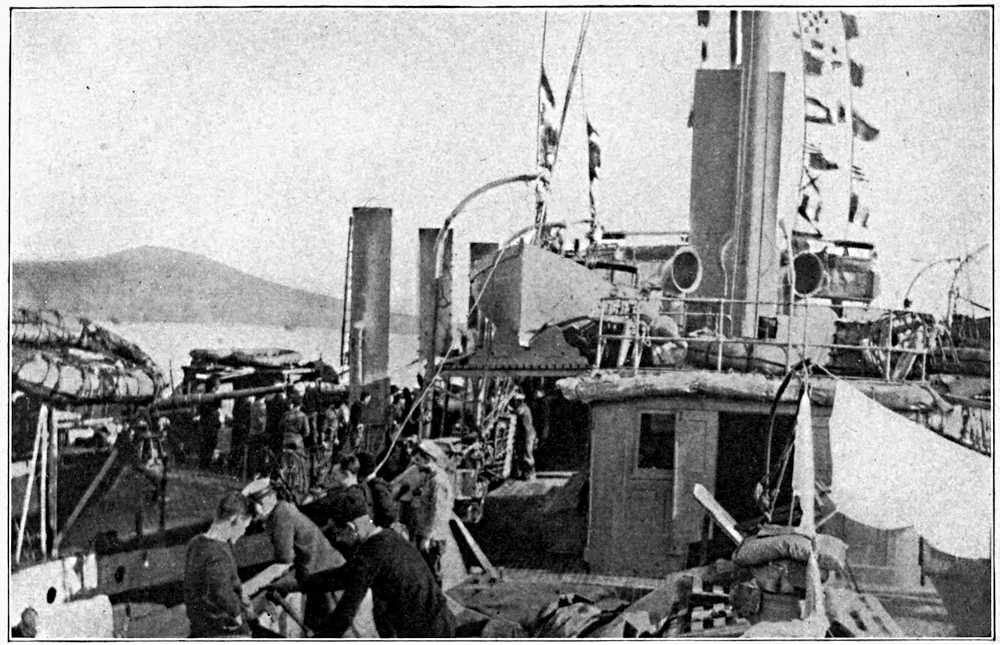
CLEANING UP AT LISBON, AFTER THE HURRICANE
Without doubting his word in the least, it was common knowledge that pro-German sentiment was strong in the Spanish ports and the enemy’s espionage system extremely well organized. Lisbon was near at hand and Portugal was an active ally of the United States. The Corsair, therefore, went to sea, after a few hours at Vigo, and steamed into [Pg 173]the wide bay of the Tagus next morning and so found a friendly destination and a people who welcomed her with warmest hospitality to one of the most beautiful cities of the world.
The war had touched it lightly. The contrast with France, so tragic and worn and imperilled, was singularly impressive. Brilliant with sunshine, Lisbon smiled from her seven hills and her tropical gardens, and the seafarers of the Corsair thought of Brest, gloomy and rain-swept, given over to the business of war, the gateway of the thronging transports which were hurrying the manhood of America by the million, to the blood and misery of the trenches.
[Pg 174]
M. A. DeWolfe Howe
Portuguese troops were fighting in France and the sentiment of the people was very strongly with the Allied cause. They realized that the hope of ultimate victory lay in the tremendous energy with which the United States had finally hurled itself into the war, but there had been no opportunity to behold and applaud the valiant soldiers from across the seas. Now, at length, there came into the harbor of Lisbon two war vessels of the powerful Uncle Sam, a large and graceful yacht and a bulldog of a destroyer, and the blue-clad sailors who flocked ashore were the first to set foot[Pg 175] there since Portugal had entered the war. The Corsair and the Preston were something more than storm-tossed ships in quest of a haven. To Lisbon they were a memorable event and one worthy of a celebration.
The colony of foreign diplomats and military officers, British, French, American, Spanish, and all the rest, accepted the entertainment of the American officers and sailors as a social responsibility. And they were quick to recognize the fact that in the war-time American Navy the “gob” was as likely to be a young gentleman of manners and education as the ensign or the lieutenant. Tactfully and easily the barriers of shipboard discipline and ceremony were ignored for the time, and the invitations to teas, garden parties, receptions, and theatres seldom raised lines of distinction between the youthful seaman with the flat cap and the rolling collar, and the gold-striper severely buttoned to the neck in his service blouse. This might have been awkward in some circumstances, but the crew of the Corsair knew how to carry it off. They met the loveliest girls of Lisbon and were gallantly attentive, as was quite proper.
The American Minister to Portugal, Colonel Thomas Birch, fairly adopted the whole ship’s company. They might have been so many long-lost sons and nephews. The Legation belonged to them as long as they stayed in port, and he appeared to enjoy it all as much as they did. Captain Ross, who[Pg 176] was representing Gaston, Williams, and Wigmore of New York, was ready with help, advice, and hospitality, and as a host and friend the Corsair found him true blue. The American Consul-General, Mr. W. L. Lowrie, was also most courteous and friendly and took particular pains to make these American exiles feel at home.
In letters written home by one of the petty officers, you may read between the lines and conclude that there might have been worse fates than to be marooned in Lisbon for seven weeks:
December 24th. You cannot imagine what a sensation it is to find yourself all of a sudden walking down fine, broad streets with rows of palm trees, and geraniums and other flowers in bloom. The leaves are falling now and the rainy season is beginning, but as they have had no rain in five months we ought not to complain. There are many picturesque street scenes, flocks of turkeys driven by small boys with long sticks, and if you want a turkey you halt the procession and pick out your bird and carry it home under your arm; little donkeys almost smothered in vegetables are led gingerly along;—everywhere women are selling fish which are carried in baskets upon their heads. Lottery tickets are shoved at you from every corner. A crowd gathers wherever we American sailors stop or loiter, and we are great curiosities. At the best hotel, the Avenida Palace, several of us ran into a bazaar for the benefit of the French and Portuguese war widows and orphans. The American Minister, Colonel Birch, a fine old boy, introduced us to all the girls, English, French, and Portuguese. There were some beauties [Pg 177]among them, and although it is a long time since I talked to a girl I sailed right in and had no trouble.
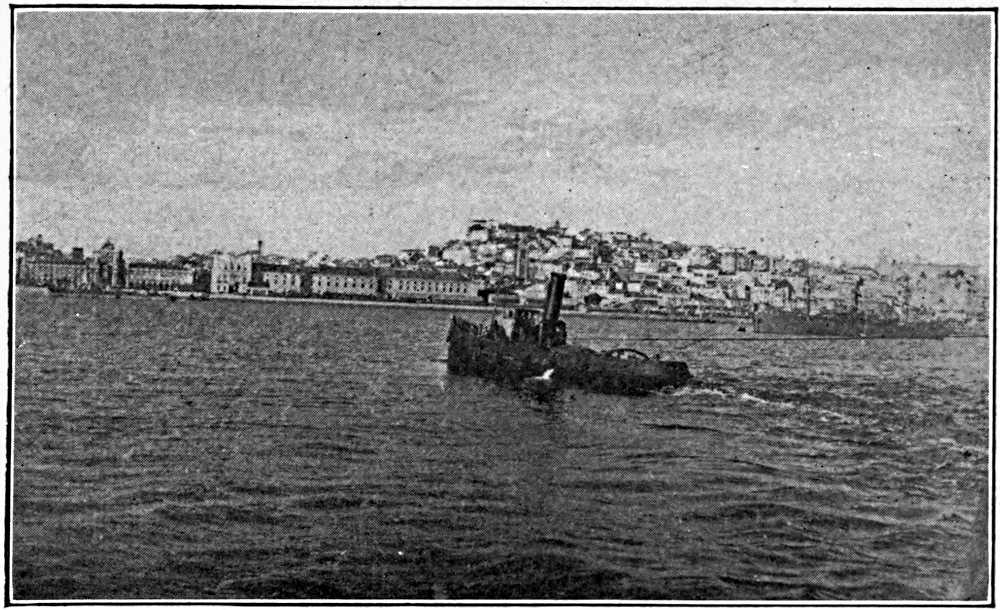
LISBON HARBOR AND THE TUG THAT TOWED THE CORSAIR TO THE DOCKYARD
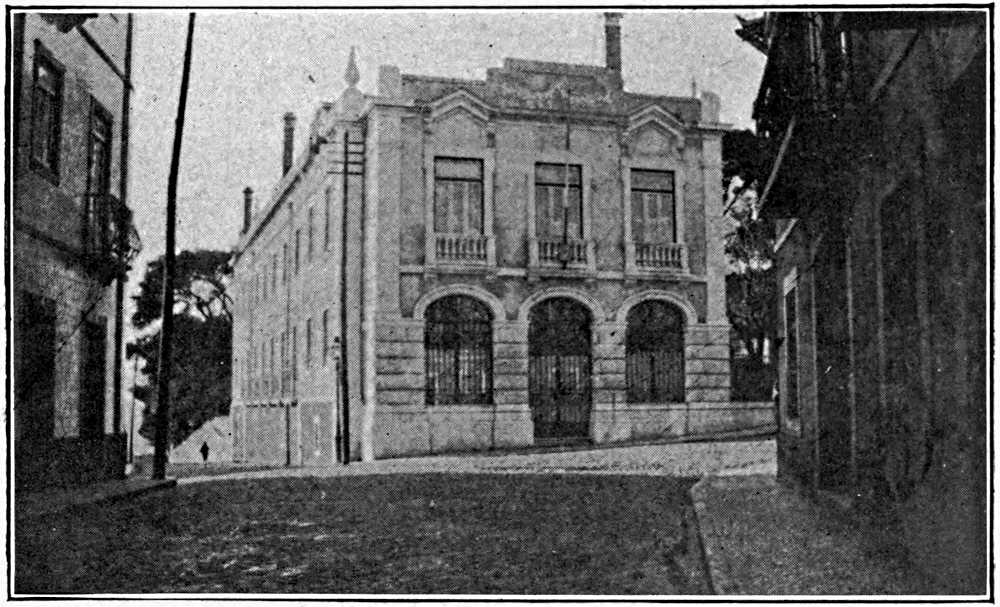
THE AMERICAN LEGATION AT LISBON, WHERE THE CORSAIR’S CREW FOUND A HOME
I also met the French and Chinese Ministers and talked to them. I get along in French now and carry a conversation with ease. One of the most attractive girls was the daughter of the chief of the British Military Mission, Lieutenant-General Barnardiston, a soldier and gentleman of the finest type. He commanded the British forces which operated with the Japanese at Kaio Chao. Yesterday I saw them after church and met the mother who is an American. She asked us to tea. Four of us went and stayed two hours. The General was tremendously interesting, of course, but he would have been more so if one of our men had not tried to talk him to death.
To-morrow being Christmas, we are trimming the ship with greens and flags and have hoisted a Christmas tree clear to the top of the foremast. Mr. J. P. Morgan, the owner, is very kindly blowing us off to a dinner by cable, and we are looking forward to the occasion. It is the first Christmas away from home and I know how you’ll miss us all, but it should be very joyous because we passed through that hurricane in safety. We have a fine large cat as a mascot and as one of the men said, “Tommy used up eight of his nine lives in the big blow.”
January 2nd. Our gaieties continue and we are having the best time since leaving New York. Colonel Birch gave us a reception at the Legation to meet the diplomatic corps. The officers and fifteen men went from this ship. All nationalities were there, from Brazil, Uruguay, Belgium, Spain, and of course Portuguese, French, and English. It was great fun to meet them, and most of the diplomatic people could talk to us in English. We had some dancing, the first I had done[Pg 178] since February, and everybody was in the finest possible spirits. The girls were stunning. The Spanish Minister is a delightful man and has spent a lot of time in Mexico and the United States. Our host, the genial American Minister, resembles former President Taft in size and quality and seemed to be having the time of his life.
New Year’s Eve we were all on board ship and celebrated it in combination with a French destroyer which lay alongside us. At the stroke of midnight we banged out eight bells for the old year and eight more for the new, and then both ships opened up their whistles and we startled the Portuguese with the pandemonium. The Frenchies had a terrific siren. After this outburst we sang the “Marseillaise” together and the effect was stirring. Then we sang the “Star-Spangled Banner,” and the Portuguese sailors who had come aboard from the Navy Yard sang their national anthem and everybody cheered everybody else, and it was a grand old time.
On New Year’s Day I went sight-seeing with a buddy from the ship and visited several cathedrals. In one of them all their dead kings are tucked away, and they lift the lid off so you can look right down at the relics of royalty. As they have been dead for hundreds of years they are none too attractive. We had a fine dinner on board ship in the middle of the day, turkey, mince pie, etc., and another in the evening at the hotel. It is mighty pleasant to have all these distinguished people so polite to us and we also appreciate the attitude and the courtesy of the officers of the Corsair.
January 9th. Last evening six of us called on those delightful English people, the Barnardistons. The Spanish Minister and his two daughters were there. The General played the piano for us and is very musical.[Pg 179] Miss Barnardiston played beautifully and the Spanish young ladies also performed. We were represented at the piano by Tibbott who upheld the honor of the Corsair. You ought to see the row of decorations on General Barnardiston’s coat—Victorian Order, Rising Sun of Japan, African Campaign, and so on. Yesterday afternoon we went to tea at the Girards, the French people. The night before we were invited to amateur theatricals at the British Club, given to entertain the Corsair and the Preston and the French destroyer. It was very cleverly done. The actors were Portuguese and the girls were very pretty. They sang, in English, lots of American songs. Between acts they served cake and tea and afterwards we sang the national airs. I was fussed to death to have to get up on the stage and lead the whole outfit in the “Star-Spangled Banner,” giving the key, etc., but our captain made me do it. Our jolly American Minister, Colonel Birch, gave me a wink which made me feel more comfortable.
I went to the English church last Sunday and they had a special service, appointed by the King, to pray for Allied victory, and it was fine. The English always pray for the sailors and soldiers—sailors first. They certainly are devoted to their Navy. After church another man and I went over to the Legation with Colonel Birch and sat around in his biggest armchairs for an hour. He treats us like princes and we can’t say too much in appreciation of all he is doing for us. He is to give us another party next Saturday and we are looking forward to it, for he has promised to have all the charming Portuguese girls there. We are lucky young sea-dogs to have tumbled into all this, and we are having the time of our lives. I was made quartermaster, first class, the other day, and am naturally[Pg 180] very much pleased. I shall be glad to get back and finish my examinations for a commission, but since the hurricane little things like that don’t bother me very much. We have not forgotten the storm and still talk about it—all the acts of courage and the many close shaves.
January 14th. Last night there was another dramatic performance by the Portuguese young people, so that the whole ship’s company could see the show. This time I sat with the pretty French girls and it seemed almost like New York. I dropped in to call in the afternoon. We sat in front of a log fire and it was cozy and homelike. Their father, M. Girard, was French Minister to Haiti for two years, during a revolution down there, and had some very unpleasant experiences. The Haitian President was dragged from the Legation and butchered before their eyes, and other acts of savagery committed, but our marines and bluejackets landed soon after and promptly had the situation well in hand.
Ensign Schanze enjoyed himself as much as the rest of them and described the hospitality of Lisbon as follows:
Here we are, still in Portugal, where we have been undergoing extensive repairs and entertainments. Never in all my experience away from home have I come across people who were as strenuously cordial as our hosts of the city of Lisbon. There are two leading social elements, the native Portuguese and the foreign colony. Both have gone the limit to make us welcome and the result has been that we have never had less than two engagements a day, most of the time three.
The usual routine runs about like this—in the forenoon some Portuguese, French, or British officer[Pg 181] blows on board to take us in charge to see the points of interest; in the afternoon there is a tea to attend at some one of the various homes or legations; and in the evening there is a dinner party followed by a theatre party or its equivalent. These things do not simply occur frequently. They are daily in their rotation.
We, on our behalf, make our best effort to counter with teas on board the ship; also lunch parties and dinners whenever we can wedge them in crosswise. Functions have become so numerous that the captain has found it necessary to detail certain officers to attend certain festivals daily. There have not been enough of us to go around, even at that. This is the first war that ever made me keep such late hours.
It should not be inferred that life was an incessant round of parties, teas, and receptions for all hands of the Corsair while at Lisbon. Many of the young men had other inclinations and fought shy of “the society stuff.” The city itself was fascinating to those who liked to wander and explore with their eyes open. In groups they loitered through the dark and narrow streets of the ancient quarter of the Alhama or enjoyed the noble prospect of fine buildings and open spaces along the Tagus, or strolled with the colorful crowds in the Praca do Commercio and investigated the luxurious shops and cafés of the Rua Augusta and the Rua da Prata. Automobiles could be hired, and parties of bluejackets might have been seen in the royal palaces, the storied old churches, and the monastery whose walls were built in 1499, on the spot where[Pg 182] another sailor, Vasco da Gama, had embarked on a famous voyage two years earlier.
The water-front of every large seaport is notorious for low-browed rascals who look at Jack ashore as easy prey, and it was not in the least to the discredit of the hospitality of Lisbon that a pair of Corsair men should have run afoul of one of these land-sharks when they first hit the beach. The business-like manner in which the youthful seafarers handled the matter discouraged further attempts to molest them. One of the pair mentioned it in his diary:
Got shore liberty and landed in jail one hour later. The way it happened was that the driver of the car we had chartered tried to rob us and we refused to stand for it, so he had us pinched. We explained the case in French to a generalissimo and he turned us loose at once and said we were dead right. He would see that it didn’t happen again. The tough driver was laying for us when we walked back to the ship and he tried to get me with a knife and a machinist’s hammer. Dave stopped him, and I got a big club and we organized to clean up, but a crowd gathered, so we decided to quit and go on our way as a bunch of sailors from the Corsair and Preston hove in sight and were all set to make a battle royal of it. I knew this would get us into serious trouble, although I did hate to let that auto bandit get away with it, so we withdrew in good order.
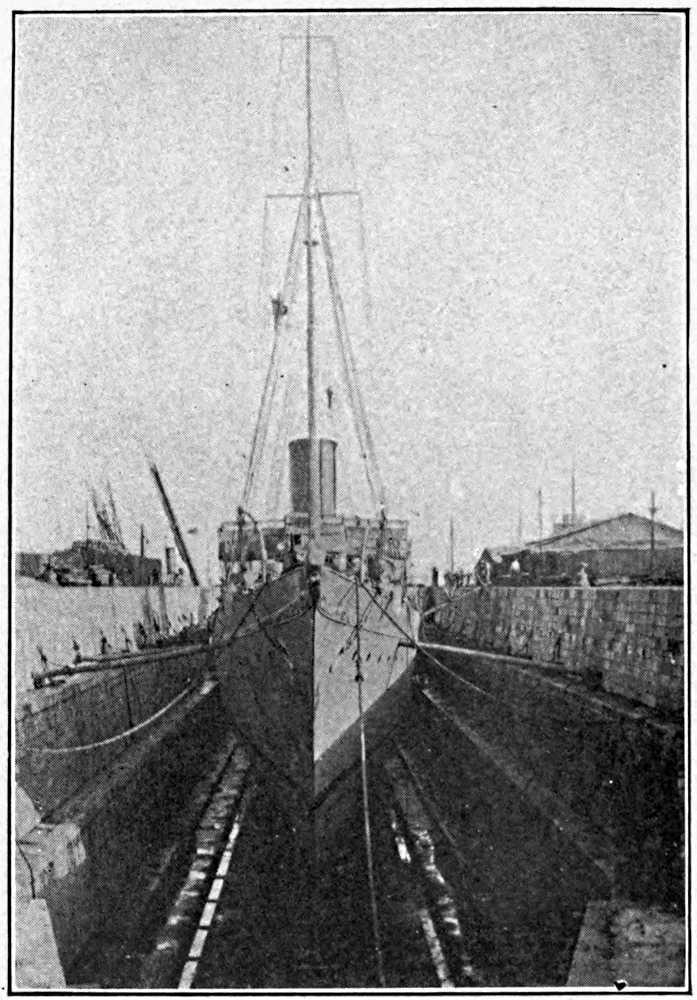
THE CORSAIR IN DRYDOCK AT LISBON
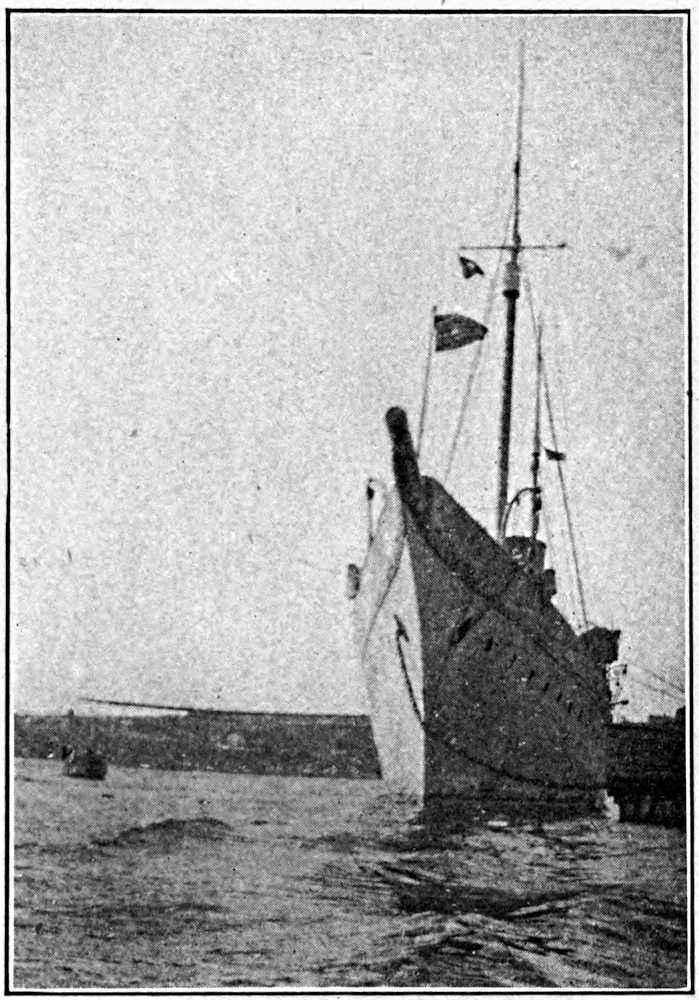
AT HER MOORING BUOY, BREST
Yeoman Connolly improved the opportunity to see the sights of Lisbon and some of his impressions ran like this:
[Pg 183]
The city is the finest I have seen in Europe, barring Paris only. The public buildings are works of art and you see splendid architecture everywhere. The street cars are the most modern I have seen since leaving home, but why shouldn’t they be? I was sitting in a car the other night and happened to look around at the advertisements when I alighted on the builder’s name, “John Stephenson, Elizabeth, N.J.” It made me homesick to see the familiar name. I didn’t hesitate to tell some of the Portuguese sitting alongside me that Elizabeth was my home town, and they seemed very much interested.
I was taken through one fine building yesterday by a very distinguished-looking gentleman, elderly and good-natured, who showed a lot of interest in me and who introduced me to the Lord Mayor of the place and to some of the Cabinet members. He himself is a member of the Cabinet and one of the best-known men in Portugal, I later learned. I walked through some of the streets with him and his gold-headed cane, and almost everybody bowed to him or looked at him with awe. He understood English very well and told me a whole lot of the history of the country. As a plain American gob I got all I deserved, and then some.
This is a great old town. I suppose you have heard of the revolution that is going on here. We came just in time to see the skirmishes that are featured daily. A funny thing occurred last night. We were loafing along one of the main avenues when we came to a big bulletin in front of a newspaper office. About a thousand people were gathered in front of it and reading a notice. To catch your eye there was printed a huge hand holding a dagger dripping with blood, and beneath it the announcement of another episode of the revolution which was scheduled to take place on the following[Pg 184] Saturday afternoon. Some class to this burg. They are not satisfied with trouble as it comes along, but even advertise it in advance.
We are all going uptown to see a bull-fight on Sunday. They have them two afternoons a week, but we have picked Sunday as we want to take in part two of the revolution as duly announced for to-morrow. In spite of the political rough-house the city is really wonderful and we are very lucky to be laid up here, even if we do miss out on a few weeks of the war. The only thing that gets me is how the deuce to talk this Portuguese lingo. We were all learning French very rapidly and can get along O.K. in that language, but the stuff these people patter is simply terrible to make out. Here we have to turn to and learn a third language, and by the time we return to God’s country we ought to be linguists of note.
The money here is very different from France. It is the reis, not the franc, that demands your careful attention. It takes sixteen hundred reis to make an American dollar, and when you get change for ten dollars or so, you get a basketful of junk that looks like so many United Cigar Store coupons. It costs about a million reis to buy a good meal, but the food is excellent and we get real honest-to-goodness hot rolls, just like back home, but about as big as a football. I brought a dozen back to the batteau last night and when I came to pay for them I handed the gink about seventeen hundred thousand reis, more or less. It makes you swell up and feel richer than Rockefeller to be handing out fortunes in this careless way, and it’s lucky for us, as the ship has not been paid off in the Lord knows when and most of us are flat broke. However, the moving-picture theatres are good and fairly cheap, and Charlie Chaplin is here, and we are allowed[Pg 185] to stay ashore until eleven-thirty at night, which is a long liberty for a foreign port.
It was difficult for the officers of the Corsair to maintain the customary round of duty and discipline while the ship was under repair, with a crowd of Portuguese artisans aboard, many distractions ashore, and things more or less upset, but they succeeded in enforcing the high standards of the United States Navy aboard. No more gratifying evidence of this could be desired than the following letter from the Secretary of the Navy:
March 11th, 1918
To Commanding Officer, U.S.S. Corsair.
” ” ” ” Preston.
Subject: Good Behavior of Men in Lisbon.
The Department is much gratified to receive through the State Department an excellent report of the behavior of the men of the Corsair and Preston during their stay in Lisbon. The following is an extract from the letter of the American Minister:
I am sure that the Department will be pleased to know, as well, that all the men behaved splendidly and made a very creditable impression in Lisbon. It is needless for me to say that I was very much gratified by it all and personally felt that our men were worthy of the cordial attention and generous hospitality bestowed upon them by the Portuguese people and others.
This evidence of good discipline reflects credit alike on the officers and men of the ships and on the Naval Service.
(Signed) Josephus Daniels
To be caught in the midst of a Portuguese revolution caused the crew of the Corsair more amusement[Pg 186] than alarm, and the only regret was that they could find no lawful excuse for taking a hand in the shindy. It was largely a local affair, between the military and naval forces of the Provisional Government, and Lisbon seemed less disturbed about it than if the street railways had gone on strike. The shooting and commotion were mostly confined to the water-front, and the experience of Quartermaster Bayne, for example, would indicate that the American sailors really enjoyed it:
January 1st. It was my day’s duty on board, so could not go to the party at the American Legation. Everybody said it was a bully good game. We created a large disturbance last night. When we blew our siren to welcome the New Year, it brought the entire town out all standing, as they thought it was the signal for another revolution. The Portuguese troops were ordered out and started to march at the double-quick to the Navy Yard, as they took it for granted that the Navy had touched off an uprising. The situation might have been serious, but some general or other found out that it was us and what we were doing, and the soldiers were ordered back to the barracks. The Lisbon newspapers gave us a write-up, and we ran true to form as the gallant but quite unexpected and unaccountable Americans.
January 4th. This has been an exciting day. I went ashore at two in the afternoon and was to meet the rest of the crowd for dinner at seven. They did not show up, and I learned later that the harbor was so rough that the ships had to shove off and anchor in mid-stream for a while, and no boats could come[Pg 187] ashore. I spent the evening at General Barnardiston’s and then started to foot it back to the ship. The gates of the Navy Yard were locked, but the Portuguese guard let me pass through. As I wandered along to the wharf, I noticed that all lights were out in the buildings, but I didn’t think much about it, although several squads of soldiers looked me over pretty carefully.
When I got back aboard the Corsair, I saw that our guns were manned, and I was greeted with, “Thank God, you got through. How did you do it?” I asked what was up, and got this story. The Army and Navy were pulling off another revolution. Fighting had been going on between the War Ministry and the Naval Ministry buildings. Our ship was close to both. One of our coxswains, Lindeburg, was in a motor-boat at the foot of the Army Building and as he left the boat and started to beat it for the ship, he was fired at while running along the wharf. He ducked back to his boat, and the Corsair, getting uneasy about him, ordered a rescue party away. They were shot at, too, and had to seek cover.
This was a bit too much, so the battery was loaded and trained on the buildings, while an armed guard, carrying the Stars and Stripes, marched to both buildings. Meanwhile the captain had sent a radio message to the authorities, demanding an instant explanation and apology for firing on our men. This second party of ours was not attacked and soon returned with the other men. Half an hour later we received an official apology. Knowing nothing about all this ruction, I had walked through the Navy Building, right between the lines, and aboard ship. Copeland and Ashby were with me and for some reason we were not shot at.
That about ended the trouble, as far as we were concerned,[Pg 188] but it looked like business for a little while, because if they had fired on our flag we should have knocked their buildings over for sure. I understood that our skipper sent them the message, “If you fire on our flag we shall attack at once.”... During the afternoon the wind and sea had been so high that most of the ships in the harbor dragged their anchors and the French destroyer next to us had to move out after knocking a hole in our side which probably means dry-dock again.
January 7th. The revolution is still on, and we are advised to keep off the streets, more or less, as there is plenty of rifle-firing, and when these Portuguese get excited they mistake our uniforms for their own Navy and so take pot shots at us.... January 8th. Big revolution to-day. The Army opened up with about a hundred shells on the flagship Vasco da Gama, and it was lots of fun. The shells passed almost over us and we watched the scrap. The Navy didn’t shoot back. The shrapnel was falling fast and the ships hauled down their colors. The whole Portuguese Navy tried to crowd aboard the Corsair for protection, but we wouldn’t stand for that. There was a good deal of machine-gun and rifle shooting uptown all day. There was no liberty, but the captain sent for me and five others and gave us special liberty to go to Mme. Girard’s for tea. Had a fine time. We were warned to be careful, as the soldiers fired at any naval uniform they happened to see. They did not bother us, although we passed a lot of infantry heavily armed.
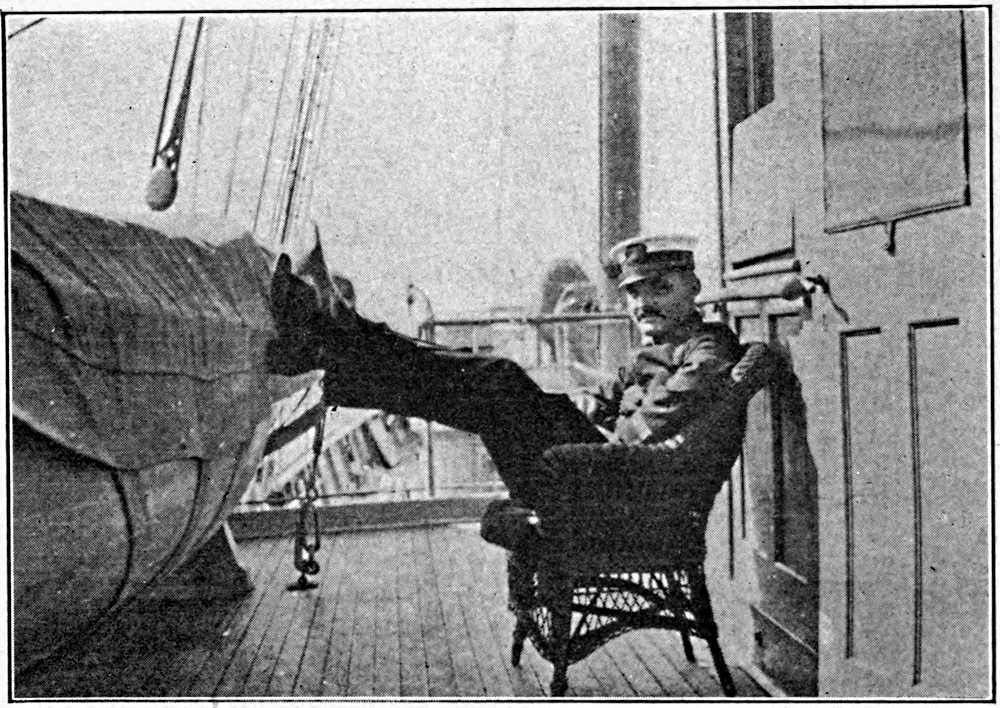
“DOC” LAUB AGREES THAT “THIS IS THE LIFE IF YOU DON’T WEAKEN”
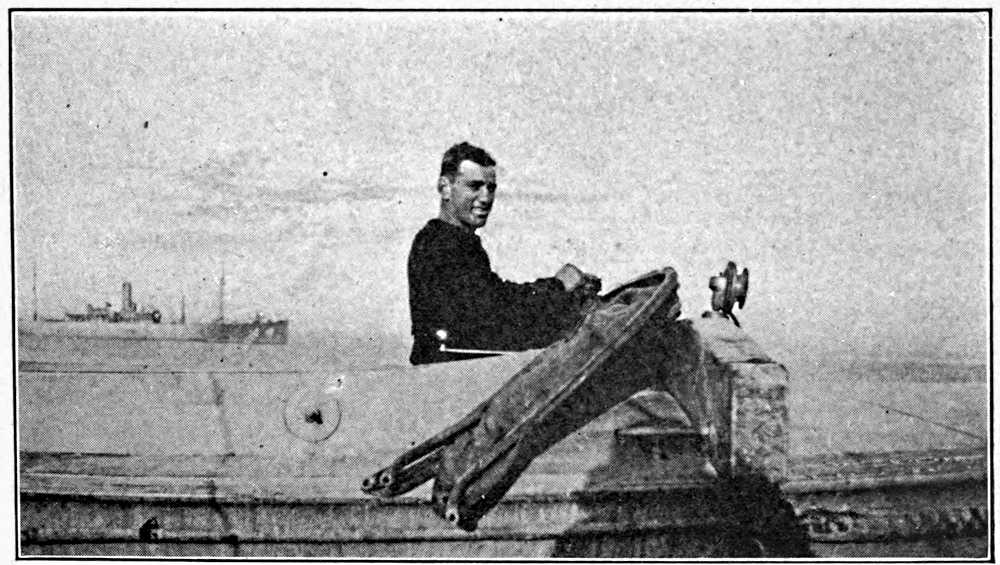
COXSWAIN DAVE TIBBOTT WAITS WITH THE LAUNCH
At dinner ashore, the programme was interrupted by a battle in front of the hotel, and almost everybody, excepting ourselves, left the dining-room because the bullets were popping about. We refused to budge, for there was a corking good dinner on the table and the [Pg 189]Portuguese soldiers are pretty rotten shots. They played a dirty German trick to-day. Some of their Navy men shoved off unarmed in small boats and tried to row ashore, but the troops opened fire on them, not far from our ship, and killed a couple of the poor Portuguese gobs. It made us so sore that we felt like cutting loose on them.
January 9th. No revolution to-day. The French officers on the destroyer Intrepide have behaved splendidly to us chaps. Of course, association with enlisted men is unknown in the French service, that is, in a social way. At first they couldn’t quite understand how we happened to meet them at these various teas and receptions, but after a time or two they grasped the situation and have since put themselves out to be agreeable to us.
The report of Commander Kittinger is an accurate and interesting summary of the episodes of this sputtering little revolutionary outbreak in which the Corsair played a part during her pleasant interlude at Lisbon. He wrote as follows:
About 9 P.M., January 4, 1918, the U.S.S. Corsair, being moored to the dock at the Naval Arsenal, desultory small-arms firing broke out in the Naval Compound. The firing was observed to come from the windows of the second floor of the east wing of the building forming the Arsenal Compound. It was reported that the coxswain of the motor dory was in the immediate vicinity, securing his boat for the night. At intervals the firing was resumed, but the object which drew the fire could not be made out from the ship. Lieutenant Commander Porter and Ensign Schanze, with four bluejackets, left the ship for the[Pg 190] Arsenal offices to arrange for the safety of the coxswain. On approaching within about fifteen feet of the door in the centre of the north wing, firing was opened, apparently at the Corsair party, from the same place, the bullets hitting the walls and pavement near them. The party entered the building without casualty.
Intermittent firing continued after this. After waiting a reasonable time for the return or for news of the first party, a second party led by Lieutenant McGuire left the ship, carrying a flag. The searchlight from the ship was used to illuminate the flag. This party was not molested and returned with the first party and the coxswain. It developed that the firing came from the windows of the Colonial Office and was directed at Portuguese bluejackets passing across the open space from the shore end of the wharf to the main entrance.
About 11 P.M. a military aide of the President called on board and presented the compliments of that official with the usual courtesies, and inquired as to casualties, if any, in our force. He was informed of what had taken place and that no damage was done. A report of the riot was made to the American Consul-General, Mr. W. L. Lowrie, whose reply is herewith attached:
From American Consul-General, Lisbon,
To Commanding Officer, U.S.S. Corsair.
I have to acknowledge the receipt of your memo. of January 5th concerning the firing in the Arsenal Compound during the evening of January 4th. Personal representations have been made and I trust there will be no recurrence of the rioting, although as you are fully aware conditions here just now are most unsettled. I am extremely thankful that no one was hurt during the rioting and that no damage was done.
Beginning January 3rd it was noticed that conditions in Lisbon were unsettled politically. On that night some rifle-firing took place in the streets between[Pg 191] Portuguese sailors and soldiers on patrol duty. Shots were exchanged nightly up to January 8th when the counter-revolution took place. The situation briefly is this:
The Portuguese Navy has been the controlling factor in the politics of the country. The Army has been the opponent, but has been negligible because of its ineffectiveness. The Navy deposed the King in 1910 and set up a Republic which has been perpetuated until the present time, the last incumbent being President Machado. When Portugal entered the war, the Army was largely increased and equipped, and forces were sent to the Western Front and to the Portuguese African colonies. Army preparations continued in Portugal and there is a large mobilization at present.
On December 5, 1917, the Army started a revolution and succeeded in overthrowing the Government two days later, the President being exiled on that date. As a precautionary measure, the naval forces present at Lisbon were disarmed. In spite of this, the Navy prepared plans for a counter-revolution. The present Provisional Government took steps to send the majority of the sailors to the Portuguese African colonies because of the serious reverses suffered by their troops in Africa while fighting the Germans.
The Navy took steps to defeat this manœuvre and on January 8, 1918, the Vasco da Gama (flagship) anchored off Lisbon. At 10.45 A.M. a battery of three field pieces at Saint George’s Castle in the middle of the city, opened fire on the Vasco da Gama. The flagship fired five shots in return and hoisted a red flag under the ensign. The shots of the shore battery were dispersed, but some seemed to strike the ship. Shrapnel and projectile were fired. At 11.10 A.M. the Vasco da Gama hauled down her flag and hoisted a white flag[Pg 192] at the foremast and abandoned ship. A number of shots were then fired at the destroyers Douro and Guardiana, which also struck their colors and hoisted white flags. The cruiser Almirante Reis, a transport, and several gunboats did likewise. At 11.20 A.M. firing ceased at the shore battery. Rifle fire continued in the city streets. The Arsenal plant closed down at the beginning of the firing and the workmen employed on board the Corsair stopped about 11 A.M. No further work was done by the Arsenal force that day.
On January 9th (the next day) the Arsenal resumed operations as usual, and I was informed that the trouble was over and work would continue as before. The Vasco da Gama, with the Guardiana and Douro, stood down the river on January 11th, apparently undamaged.
The crew of the Corsair felt a personal interest in the Provisional President, Sidonio Paes, as some of them had sat at the table next to him in the dining-room of the hotel and one or two of the officers had met him at the theatre. One of the street spectacles was a huge parade in honor of Sidonio Paes, and a bluejacket described it as “tremendous enthusiasm, everybody yelling to beat the band and waving their hats, and the Portuguese thought it was great, but it wasn’t as good a show as when the Seventy-First Regiment came back from the Mexican Border and marched up Fifth Avenue.”
What the Corsair considered the big moment of the long stay in Lisbon was when the landing party marched off the yacht to rescue the two officers and[Pg 193] the four men who had gone ashore to look for the coxswain and find out what the row was all about. The ship’s searchlight was turned and held to illuminate the bright folds of the Stars and Stripes while the gun crews stood ready for action, every sight-setter, plugman, and shell-handler taut upon his toes and blithely confident that the Corsair could knock the adjacent buildings into a cocked hat.
It was discovered that the first party had been mistaken for Portuguese sailors and fired at from a window only fifty feet distant. The bullets spattered the doorway into which they turned, and they proceeded upstairs to hold emphatic discourse with an excited Portuguese naval officer and the chief of the radio service who were earnestly telephoning to ascertain what the ruction was and who had started it. Coxswain Lindeburg had the largest grievance, however, for he had been almost potted while securing his motor-boat at the wharf, and it was solemnly affirmed that he was combing the bullets out of his hair after being escorted aboard by the comrades who had sallied forth to find him.
It seems extraordinary that in this affair at Lisbon the Corsair should have seen more actual fighting, with rifle and shell fire, than during her many months of active service with the American naval forces in the Great War. And even when the fleets in European waters, under the general direction of Admiral Sims, had increased to four hundred[Pg 194] ships and seventy thousand men, none of them saw as much action as this almost bloodless little outbreak in Portugal, as action had been regarded in the days before the German doctrines of submarine warfare. It goes to show how new and vastly different were the problems which had to be solved by the Allied navies.
This does not mean that American ships and sailors went clear of danger and disaster, but almost never was the chance offered to fight the hidden foe. The fine destroyer, Jacob Jones, of the Queenstown flotilla, was blown to pieces by a torpedo and sixty-four officers and men died with her. The Coast Guard vessel Tampa was blown up and vanished with all hands, a crew of more than a hundred. Many a time the naval guard of a merchant steamer stood by their guns and were drowned when the ship went down. These, and the yacht Alcedo, and all the other brave ships which are listed upon the American Navy’s roll of honor, were worthy of the spirit and the traditions of John Paul Jones, although to them was denied the privilege of signalling the enemy, “We have not begun to fight.”
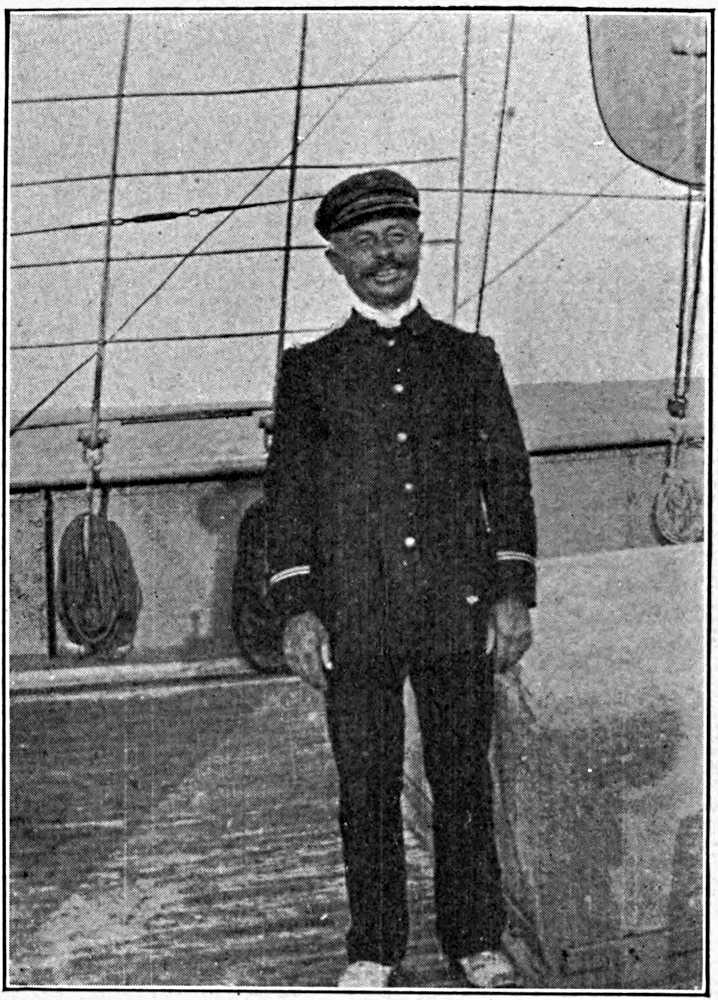
THE CHEERY FRENCH PILOT, LIEUT. MEJECK
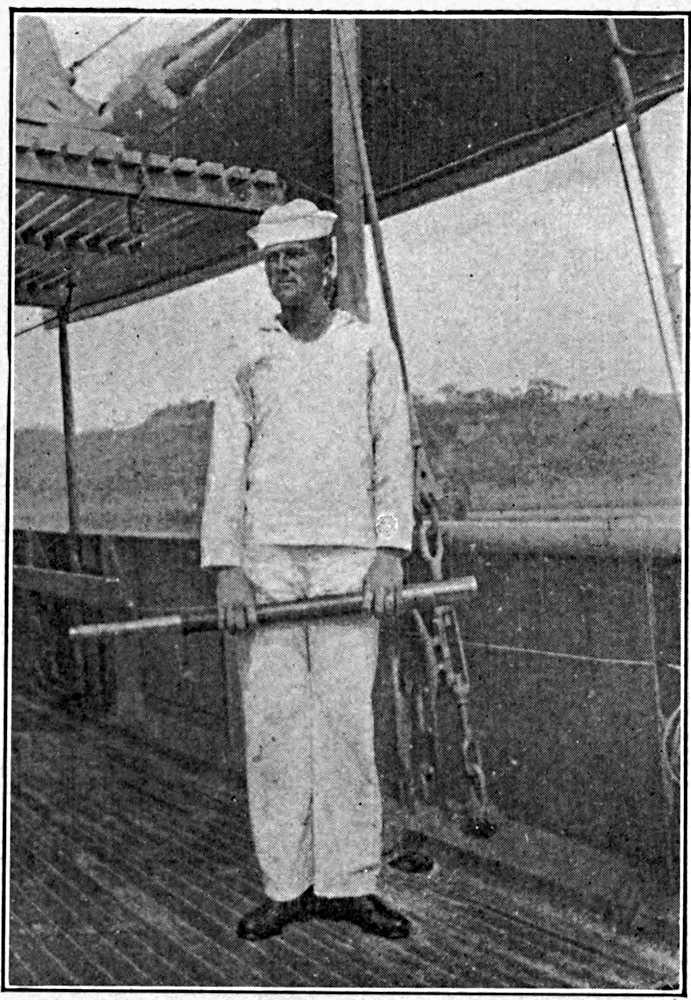
CHIEF QUARTERMASTER BENTON
The badly damaged Corsair required a long and costly overhauling to make her ready and fit for service, and this work was undertaken, and well done, by the organization of the Portuguese naval docks and arsenal. With a most admirable spirit of friendship and coöperation between two allies in [Pg 195]the struggle against a mutual enemy, the Government of Portugal refused to accept any payment whatever, although every effort was made to obtain a bill for services rendered. Commander Kittinger explains this handsome incident in the following report:
The U.S.S. Corsair arrived at Lisbon, Portugal, on December 19, 1917, in need of repairs to make her seaworthy. The matter was taken up with the Portuguese naval authorities by the American Consul-General and the Commanding Officer. An engineer and a naval constructor were immediately sent off to the ship from the Naval Arsenal to estimate and report. The same day the Director of the Arsenal stated that he could and would do the work, and that the ship would be berthed at the Arsenal on the following day.
As promised, the Arsenal workmen came on board and started the work, and in the afternoon the ship was moored to the Arsenal dock. An estimate of time and cost was requested. The time was estimated at from one month to six weeks, but the cost estimate could not be given. It was suggested that the cost be made actual for labor and material, plus a reasonable overhead. To this the Director replied that the Minister of Marine had ordered the work done free of charge to the U.S. Government, stating that repairs had been done to British and French Government vessels gratis.
The work proceeded rapidly and efficiently. I made periodical calls at the office of the Chief Engineer and Naval Constructor to obtain a cost estimate. This was promised for my information, but never received. Finally I was told that if the Consul-General would[Pg 196] write a letter on the subject to the Minister of Marine, the estimate would be given and a basis of payment arranged, but that the money would be turned over to the Red Cross.
The reply to the Consul-General’s letter is herewith attached, the substance of which is a refusal on the part of the Portuguese Government to accept payment.
I requested the Consul-General to keep at the business of trying to obtain a basis of settlement. Later on, I was informed through the Consulate that the Provisional President, to whom the Minister of Marine had referred the matter, had decided to accept payment. This was the status of the question until January 25th, the day before the Corsair’s departure, when the Commanding Officer, accompanied by the Consul-General, made leave-taking calls upon the Arsenal officials.
The Director of the Arsenal at this time stated that he had orders from the President to render no bill to the U.S. Government. As our Government had not recognized the officials in power in Portugal during this time, the American Minister could take no action.
The cost of repairs to the U.S.S. Corsair by the Portuguese Government during the period from December 20th to January 25th is a gift to the U.S. Government.
A translation of the letter in which the naval authorities of Lisbon, with the most courteous obstinacy, decline to permit the Corsair to pay for the valuable services received, reads as follows:
Office of the Minister of Marine
Administration of Repairs and
Equipment, Naval Arsenal
I have the honor to accept the receipt of your communication dated the second instant and to transcribe[Pg 197] the decree of the fourth instant by His Excellency, the Minister of Marine, concerning the matter, viz:
The Minister of Marine, appreciating the spirit of the note, No. 830, and taking into consideration the fact that the damages were suffered in the service of the Allied Cause which we jointly defend, and desiring to have the approval of His Excellency, the Consul-General, and therefore of the Government which he represents, has decided that payment cannot be accepted for the repairs made.
It is our pleasure and privilege to give all that is within our power, and we pledge our word to coöperate with our most earnest efforts for the cause of humanity and justice.
(Signed) Pelo, Director
To His Excellency “To our Welfare and Fraternity”
The Consul-General of the
United States of America
[Pg 198]
Ready again to tussle with the wintry seas offshore, the Corsair sailed from Lisbon on January 26, 1918, and returned to her base at Brest at the usual cruising speed of fourteen knots. There were many pleasant memories of the smiling, gracious city on the Tagus, and a few broken hearts which were soon mended among the Yankee mariners who had sterner business and were anxious to get on with the war. They found a greatly increased activity at Brest, where the largest transports were pouring the troops ashore in swelling volume and thousands of negro stevedores emptied the holds of supplies which overflowed the wharves and the warehouses. The bold prediction of an American bridge of ships across the Atlantic was rapidly becoming a reality and the German confidence[Pg 199] in ruthless submarine warfare was an empty boast, thanks to the skill and courage of the Allied naval forces.
In one of the American yachts, as a seaman, was Joseph Husband, a trained writer who portrayed the swift expansion of activity in such words as these:[4]
The flag has come into its own again. In the bright sunshine almost a hundred ships swing slowly at their anchor chains, a vast floating island of steel hulls, forested with slim, sparless masts and faintly smoking stacks. Our anchor is lifted and the chain rumbles up through the hawse-pipe. Slowly we steam past a wide mile of vessels to our position.
Here are the flags of the nations of the world, but by far the most numerous are the Stars and Stripes. The red flag of the English merchantman is much in evidence, and so are the crosses of Denmark, Sweden, and Norway, and the Tri-Color of France. From a big freighter flies the single star of Cuba. The red sun of Japan and the green and yellow ensign of Brazil snap smartly in the breeze. A few of the freighters are painted a leaden gray, but for the most part they are gay with camouflage. The spattered effects of the earlier days are now replaced by broad bands of flat colors. Black, white, blue, and gray are the favorites, slanting to the bow or stern and carried across life-rafts, boats, superstructures, and funnels. Some appear to be sinking by the head, others at a distance seem to be several vessels. It is a fancy dress carnival, a kaleidoscope of color. One and all they are of heavy and ugly lines. On forward and after decks the masts seem designed[Pg 200] only to lift the cargo booms and spread the wireless. The oil-burners are even more unshiplike, for a single small funnel is substituted for the balanced stacks of coal-burning steamers.
Fore and aft on the gun-decks the long tubes of the guns point out over bow and stern. Yankee gun crews, baggy blue trousers slapping in the breeze, stand beside them and watch us pass. Blue-clad officers peer down at us from the bridges. Aloft, hoists of gay signal flags, red, yellow, white, and blue, flutter like confetti in the air. From signal bridges bluejackets are sending semaphore signals with red and yellow flags. A big American ocean-going tug churns through the fleet. On our right is a French mine-layer, long rows of mines along her deck. Fast motor-boats slide in and out among the vessels. Above, like dragonflies, three seaplanes soar.
The outward-bound convoy of empty freighters is ready. Bursts of steam from bows indicate that anchor engines are lifting the big mud-hooks from the harbor’s floor. One by one the ships steam slowly out of port; converted yachts and small French destroyers on either side. Out where the entrance broadens to the open sea, a big kite balloon tugs at the small steamer far beneath it and seems to drag it by a slender cord of steel.
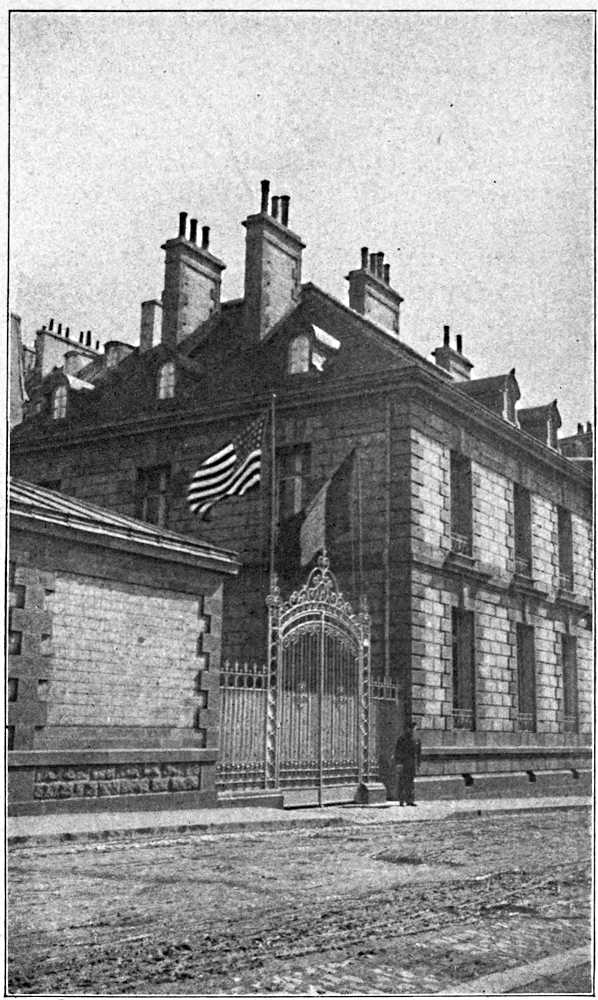
THE HOME OF THE AMERICAN NAVAL OFFICERS’ CLUB IN BREST
Instead of a few American naval officers ashore in Brest, there were scores of them from transports, supply ships, and the escort divisions. Their social headquarters, which had become almost indispensable, was the spacious building of the American Naval Officers’ Club on the Place du Château, conveniently near the water-front. The club had been organized in September, 1917, by a group of naval [Pg 201]officers among whom Lieutenant Robert E. Tod, of the Corsair, was the most active in promoting its interests and making it successful. Captain Fletcher, later a rear admiral, was the first president and was succeeded by Admiral Wilson when he arrived in November. Lieutenant Milton Andrews served as secretary, and a board of directors administered the affairs of the club whose membership was strictly naval.
The comfortable French mansion was well furnished and equipped, with a restaurant, reading-room, billiard-room, and bedrooms, and during 1918 there were more than six hundred members who enjoyed this haven when they came in weary of the sea. The name was changed to the Naval Officers’ Mess, as more appropriate. The club-house had been purchased by Lieutenant Tod personally, in order to facilitate matters, and when the war was over and the naval fleet was homeward bound, he presented the building to the French Government as a permanent club for the officers of the Allied naval services. All members of the Naval Officers’ Mess were to retain their connection in this new organization which is called “The Cercle Naval.”
Here the officers of the Corsair foregathered when they returned from Lisbon, to catch up with the gossip of their trade. They found the club filled with new members and visitors, the Regular Navy enjoying reunions and swapping yarns of bygone cruises on the China station or in the Mediterranean,[Pg 202] or of service in the Spanish War when these sedate captains and rear admirals had been flighty youngsters or consequential two-stripers. The captain of a huge transport fetching in ten thousand doughboys sat in a corner with the skipper of a little “fish boat” from Gloucester which was trawling for German mines in the channels of the Gironde or the Loire. The officers of the Reserve Force met college chums or formed new friendships and compared notes on the ways and means of scuppering Fritz.
Admiral Wilson had perceived that with more escort vessels at his command and an increasing force promised, he could gain efficiency by distributing his ships at several bases along the French coast, from Brest to Bordeaux, under district commanders. This would enable him to give better protection and to move the convoys more rapidly as they went in and out of the other ports of American entry. In accordance with this plan, the Corsair was detached from the Brest force and ordered to make her headquarters on the river Gironde below Bordeaux. The area was in the patrol district of Rochefort which was in charge of Captain Newton A. McCully, U.S.N., who was later made a rear admiral. The Corsair found it highly satisfactory to operate under this capable and energetic officer who made two cruises in the yacht, in March, when she went out to meet laden troop convoys and escorted them in to France. The coöperating[Pg 203] French naval force was directed from the station ship Marthe Solange which was anchored at Verdon on the Gironde.
After coaling ship at Brest, the Corsair started for her new base on January 31st, escorting several supply ships which were bound for Bordeaux and loaded with aeroplane equipment and munitions. How rumor flew about and was eagerly, solemnly discussed is indicated in these bits from a sailor’s diary:
January 31st. Hauled out of Brest with our convoy at three in the morning, proceeding at nine knots. At Quiberon we picked up the rest of them and headed for Bordeaux, the destroyers Warrington and Monaghan with us. I understand that we are not to go all the way up to Bordeaux, but will base at our own Navy aviation camp some thirty miles down the river. Hear they will work us to death. Hope we will have a chance to run up and see the city.
February 1st. Steamed up the river and stopped at aviation camp at Pauillac. Incidentally there are a thousand sailors here and not one flying machine. About five hundred Austrian prisoners and six hundred Germans are helping build the camp. Got Bordeaux liberty and arrived there after dark. The city is under military law and there are all sorts of fussy Army rules and regulations. We went to fourteen hotels before we found a place to sleep. We couldn’t see the town, as it was in darkness. Everybody has to be off the streets at 10.30 P.M. The only criticism I have to make of the town is that there are altogether too many soldiers in it.
February 4th. Got another liberty to-day. Heard[Pg 204] some big news. The America, on her way over here and loaded with troops, was torpedoed. She was not seriously damaged and by dropping depth mines brought the German submarine to the surface. The officers and crew were captured alive and have been carried into Brest, along with the submarine. Also, a few days ago a U-boat came up and surrendered to the Dixie, the crew having killed the captain. The submarine was absolutely out of provisions and supplies and the men were in bad shape. This is a fine omen. (Note:—I later discovered that these stories are untrue.)
February 6th. More big news. A German submarine came into Brest harbor flying a white flag, and surrendered. We have her at a mooring buoy all intact and fit for sea. They had run out of fuel oil and grub and were fed up with the service. There wasn’t a chance of getting back to Germany with the boat, so she sensibly gave herself up. I hope they are all in the same rotten bad shape. (Note:—This story of the submarine surrendering at Brest is found to be all bunk.)
The yachts Wakiva and May now joined the Corsair for escort duty and the Aphrodite and Nokomis were added to the division force a little later. In addition to the orders received from the American commander of the naval district, the most explicit instructions came from the French senior officer of the “Division des Patrouille de Gascogne.” With the courtesy to be expected of him, he sent also a translation in order to save trouble for his comrades of the American Navy. At times the English phrasing had a Gallic twist, not enough to perplex the Corsair whose officers had become adepts at[Pg 205] the French nautical lingo, but the effect was a trifle confusing to the eye of a layman, as for instance:
Signals between convoy and escort are to be done by the besides code. Do signals only if necessary. The last ship in each line don’t show any stern lights be ready to show navigation lights if necessary.
Zigzags are to be done according to the orders of the escort’s do (see diagramms besides). All the ships show the flag K. Manœuvring is to be executed only when the K is getting down all the ships do K, is to be taken like the origin of the diagramm, which is to be sailed by the beginning. Manœuvre when the signal gets down or when the least stations according to the regular numerotage.
By fog, and on order of the escort if necessary by WT, each column will steer like a special line each behind the escort ships on the same side. The right line will then steer ten degrees right hand and the left line five degrees left hand from the primitive curse of the convoy.
Escort and convoy ships are ordered not to bring anything overboard. Burn all you can and if impossible to burn, bring overboard rubbish altogether at once in the beginning of night. All the rubbish spread over the sea are precious indice for the submarine to know the curse of the convoy.
During the rest of the winter and through the spring of 1918, the Corsair was with the convoys and continued to base in the Gironde. The work seemed humdrum and monotonous to the crews, who pined for excitement and encounters, but this very fact was proof that the Navy was achieving[Pg 206] the result expected of it, which was to keep the road open to France. Submarines ran amuck now and then and strafed a coastwise convoy of slow ships or sank an empty transport homeward bound, but never for a moment was the prodigious movement of troops and material interfered with or delayed. Grouping the steamers together and screening them with escort vessels, as far as possible, had baffled the high hopes of Von Tirpitz and his murderous gang.
The captains of these ships which moved deep-laden through the war zone were learning the tricks of the trade and intelligently adapting themselves to the exactions of the convoy system. Admiral Sims said of them:
The advantages of the convoy were so apparent to me that, despite the pessimistic attitude of the merchant captains, there were a number of officers in the British navy who kept insisting that it should be tried. In the discussion I took my stand emphatically on the side of this school. From the beginning I had believed in this method for combating the U-boat warfare. Certain early experiences had led me to believe that the merchant captains were wrong in underestimating the quality of their own seamanship. These intelligent and hardy men did not know what splendid ship handlers they were. In my discussions with them they had disclosed an exaggerated idea of the seamanly ability of naval officers in manœuvring their large fleets. They attributed this to the superior training of the men and the special qualities of the ships. “Naval vessels are built so they can keep station and turn at any angle at a moment’s notice,” they would say, “but [Pg 207]we have no men in our ships who can do such things.” They particularly rejected the idea that when in formation they could manœuvre their ships in fog or at night without lights. They believed they would lose more ships through collision than the submarines could sink.
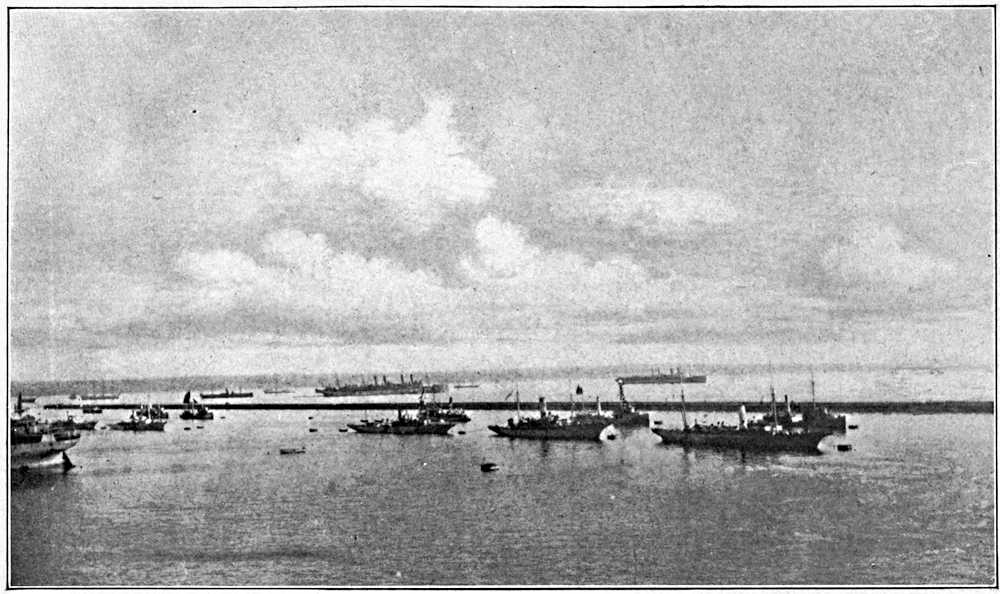
AMERICAN YACHTS CLUSTERED INSIDE THE BREAKWATER, BREST
As a matter of fact, these men were entirely wrong and I knew it. Their practical experience in handling ships of all sizes, shapes, and speeds under a great variety of conditions is in reality much more extensive than naval officers could possibly enjoy. I was sure that they could quickly pick up steaming and turning in formation under the direction of naval officers, the convoy commander being always a naval officer. Indeed, one of my experienced destroyer commanders reported afterwards that while he was escorting a convoy of twenty-eight ships of different sizes, shapes, speeds, nationalities, and manœuvring qualities, they kept their stations quite as well as battleships. This ability was displayed when the convoy executed two fleet evolutions in order to avoid a submarine.
This well-earned tribute to the master mariners who risked their lives and their ships, voyage after voyage, finds confirmation in the records of the Corsair. During the first cruise of February one finds such entries as these:
At 11.45 P.M. ran into a thick fog. During the mid watch (February 11th) the Munindies increased speed and came up close under the stern of the Corsair. Later on she passed and at 6 A.M. was about 700 yards on port bow of Corsair. At daylight the fog lifted and all ships were in sight but somewhat scattered. Convoy reformed in good order and began to zigzag.
[Pg 208]
On the night of February 12th, about 1.50 A.M., sighted two boats on the port quarter, distance 1000 yards. Boats made signals with rockets and flash lamps. About this time the escort vessel Wakiva opened fire, the shells falling about 600 yards astern of the Corsair. Signalled to Wakiva that she was firing at survivors and ordered her to pick them up. The convoy stampeded, assuming a submarine attack, and was reformed in good order about 3 A.M.
Running through fog and darkness, again startled by the sound of guns, the steamers of this convoy “reformed in good order” and steadily, pluckily held on their blindfolded course. Only a sailor could realize the immense difficulties of the job and how well it was carried on by the plodding merchantmen who won no glory. The convoys were growing larger and more complex to handle as the success of the system was demonstrated. Where the Corsair had escorted two or three steamers in a group, fifteen or twenty were now sent out together. Her next tour of sea duty in February was a fair sample of the work which was to continue through many wearisome weeks, with little more diversion than a variety of uncomfortable weather.
In obedience to radio orders [runs the report] the U.S.S. Corsair anchored at Verdon 11.45 P.M., February 16th. Upon arrival found the U.S.S. Aphrodite, U.S.S. May, and French sloop Regulus for the same duty. On the morning of February 17th was informed that the convoy would be delayed one day on account of the non-arrival of some of the ships. At 3 P.M. commanding[Pg 209] officers of convoy and escort present reported aboard the French station ship Marthe Solange for orders and conference with the commanding officer of the Sixth Patrol Squadron of the French Navy. The additional escort, the French destroyer Aventurier, arrived during the conference. Orders and information sheets were given to all concerned and explained or discussed with the convoy captains. It was decided to show no stern lights.
On February 18th the Aphrodite got under way, followed by convoy vessels Numbers 1 to 6 inclusive, in column. The Regulus preceded the Aphrodite as pilot vessel. At 7.30 A.M. the Corsair got under way, followed by convoy vessels Numbers 9-10-11-12 in column, and when clear the May followed with convoy vessels Numbers 13-14-15. Number 16, the American steamer Camaguey, did not arrive to join the convoy. When the Aphrodite cleared the net she proceeded at six knots and convoy formed in double columns—ships 1-2-3-4—May—13-14-15 in left column, and ships 5-6-7-8—Corsair—9-10-11-12 in right column. After passing the last buoy of Matelier Channel, convoy formed in four columns and took up speed eight knots. Aphrodite (chief of escort) patrolled ahead; Corsair and Aventurier on starboard flank; May and Regulus on port flank. A motor patrol boat escorted until about 3 P.M. and then turned back. The sortie was preceded by French aeroplanes.
Zigzagged until dark, then convoy steered base course. Fine weather, heavy swell running from NW which did not retard the eight knot ships.
February 19th, convoy zigzagged during daylight. Good weather for convoy operations.
February 20th, steamed with convoy until 10 A.M., then dispersed as per orders. The Aphrodite, Corsair,[Pg 210] and May returned to Pauillac for coal and the French escort shaped course for Brest.
In the search for incident during this long period of hard work and few thrills, one must have recourse to the letters and diaries of the Corsair’s crew and pick out bits here and there. These hardy young salts were playing the game in a fashion something like this:
On a run one night in March (to La Pallice) after leaving a Verdon convoy, the Corsair and Aphrodite ran into a pretty stiff blow. We were doing about fourteen knots or better with the wind and sea a little on the port bow. A good-sized sea slapped into the port side forward, by the petty officers’ quarters, smashing in one of the deadlights of that compartment. The crash was tremendous. Everybody asleep down there woke up with visions of the ship torpedoed, and out of the hatch they boiled on the jump, mostly arrayed in the costume which Nature provides for sailors. All were dazed and excited. One of them no sooner hit the deck than a wave lifted our bow and he skidded aft, nearly half the length of the ship, on the seat of his trousers or where his trousers should have been. It was fortunate for that sailor that our executive officer kept the decks smooth and well-cared-for. The outfit couldn’t see the humor of the situation, being soaking wet and unable to dope out what had happened.
March 4th. The ship was a mad-house to-day. They told us there would be admiral’s inspection and we had to turn to on everything from the bilges to the crow’s-nest. Every stitch of clothing in our boxes had to be stowed somewhere. I was never so bored in my life. We sat around from noon to four o’clock waiting[Pg 211] for the blinkin’ admiral, but, of course, he never showed up. These admiral’s inspections always give me a pain in the eye. We have made ready several times and it’s always a false alarm.
March 10th. The Aphrodite spotted a floating German mine and opened fire on it. She fired thirty-five shots and never hit it. We turned around and sunk it on the third shot. It did not explode, but filled with water and went down after a hole was put through it.
April 4th. Picked up our convoy consisting of the troop-ships Powhatan, Martha Washington, and El Occidente, all packed with Yankee soldiers. There are six destroyers with the escort, including the Caldwell, one of the new flush-deckers. At 1 P.M. the Occidente sighted a periscope. We at once started submarine tactics, screening the convoy while the Winslow and Sampson went back to look for the sub. They dropped eighteen depth charges. Fritz must have been shaken up some. He did not get a chance to shoot a torpedo, for the destroyers were too alert.
April 5th. Captain Porter left the ship, going back to America on leave. The rumor is that he will not return to this ship. It would certainly be a big loss to us, as he is one fine seaman and navigator as well as a splendid character of a man. We gave him three cheers when he shoved off, and it seemed to touch him considerably. He stood at salute in the boat until out of sight.
April 6th. This is the first anniversary of our entry into the war. In consequence, all the American vessels had to dress ship. We coaled all day and will finish to-morrow. In again, out again, coal again, Finnegan! The Martha Washington discharged her troops. They were cavalry and nigger infantry. They were held up for several hours and the darkies had us rocking all[Pg 212] the time. They claimed they saw four submarines sunk the other day after being attacked by eleven or nine.
April 9th. I got in trouble to-day. In the storm last night an American ship came in and anchored four miles off. I was on signal watch and read her flag hoist as LDBC, the Rangely, and reported her as such. Discovered to-day that she was the LDQC or Graster Hall. I caught all the blame. The Q they had up was so terribly dirty that in the distance and bad light it could not be taken for anything else than a B. There was no alibi for me, however, and I don’t know whether the bawling out I got will be all of it or not. It was my mistake, an unavoidable one, but in war-time that makes no difference in this man’s navy.
May 10th. Captain Kittinger is to be transferred to command a big transport and Commander Porter is coming back to take this ship. I shall be glad to see Captain Porter, but we are mighty sorry to see Skipper “Bill” Kittinger go. The Wakiva dropped over one of the new 300-pound depth bombs and pretty near blew herself up. She busted several things in her engine-room.
May 22nd. Just as we came off watch at 4 A.M. in a dense fog we got an S.O.S. from our old friend, the Wakiva. She was rammed and sunk by the Wabash of her convoy. She went down rather deliberately and only two men were lost. We are sorry to cross her off the list, as she was a willing worker, although slow. At 8 P.M. we met the largest convoy of troop-ships that has come overseas. The first group of fourteen ships carried forty-five thousand soldiers, to say nothing of the naval crews aboard, and there were twelve destroyers in the escort. The second group of nine ships had twenty-five thousand troops. It was a great sight. They will be landed at Brest.
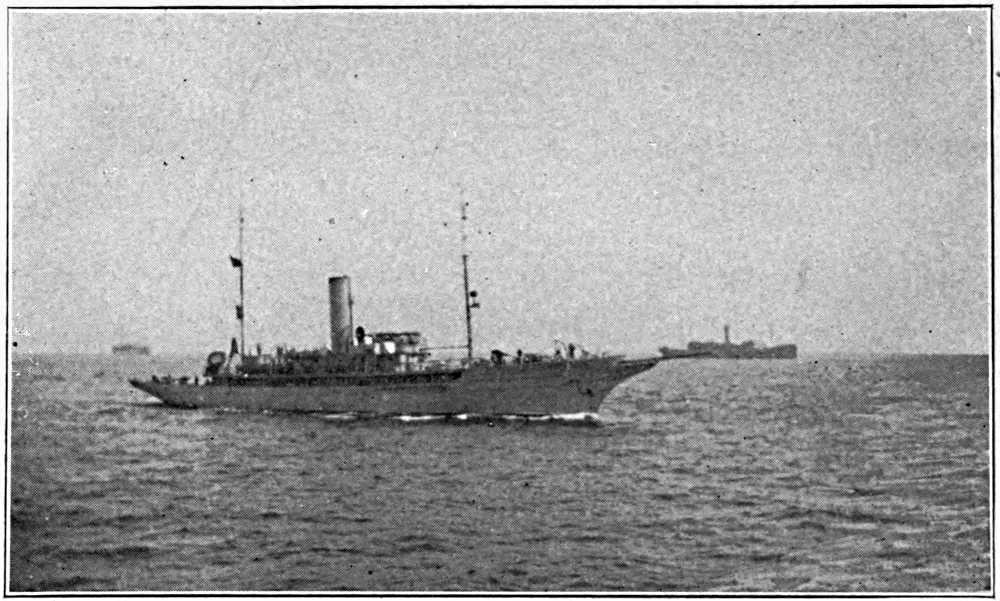
THE FAITHFUL WAKIVA, WHICH WAS SUNK IN COLLISION
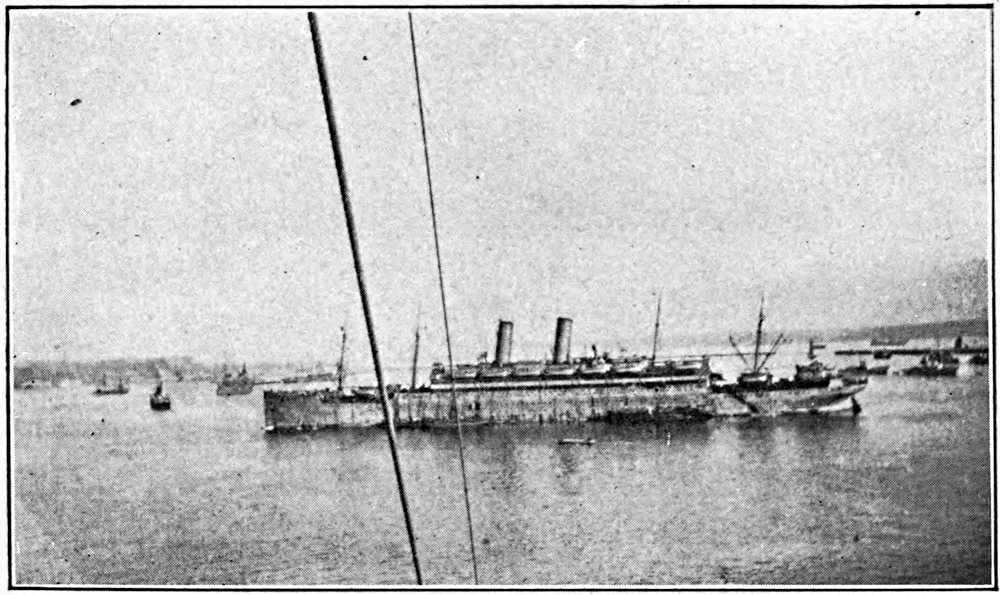
BIG TRANSPORTS IN BREST HARBOR
[Pg 213]
May 24th. Hooray! We have thirty-five German prisoners to shovel the coal from the lighters into the buckets. And, by gosh, these square-heads went on strike and the kindly French let ’em get away with it. If any prisoners went on strike in Germany it’s a cinch they’d be shot full of holes. They don’t treat ’em rough enough in France.
After looking over several of these Corsair diaries, Commander Kittinger had this shrewd and good-humored comment to offer:
The impressions which these youngsters jotted down were amusing and often inaccurate, but they caught the spirit of the service and the day’s work. When one of them felt aggrieved because he was “bawled out,” he never stopped to take an inventory of his professional qualifications and the duties thrust upon him as well as upon other untrained and unseasoned lads. Nor did he always realize that he was allowed to perform functions whereby he had the safety of a hundred and twenty-five lives and a million dollars worth of irreplaceable property between his two hands. There was no time to learn by experience and every “bawling out” was, I hope, driving an important fact home. Where else could one of these boys have learned such valuable lessons and be on a pay-roll at the same time? Of course they could not understand such methods, but the system soon separated the sheep from the goats—the latter remaining at the business end of a deck swab. Many times the skipper was not as angry as he appeared. The first lesson was to say “Aye, Aye, Sir,” when told something important instead of trying to explain. When a young man explains, he is not listening to the order, but thinking up a reply.
[Pg 214]
To the Corsair’s company the most interesting happenings during the long period of convoy duty were the changes and promotions which shifted many of the family to other ships and stations and brought new faces aboard. Commander Kittinger had been advanced a grade on the Regular Navy list since joining the Corsair and was in line for transfer to a larger ship. He was given the stately armed transport Princess Matoika, formerly the Princess Alice of the North German Lloyd, and thereafter carried many thousand American troops in safety to France. In this ship the roster of officers was more imposing than in the yacht which served so faithfully, for Commander Kittinger now gave orders to two lieutenant commanders, eleven lieutenants, and twenty ensigns. Toward the Corsair he felt affection and loyalty and was glad that his war record had included a year with her, crossing with the first American troops and battering about in the Bay of Biscay. Drilled in the exacting school of the regular service, he had only praise for the spirit, intelligence, and devotion of the Reserves, officers and men, who had fitted themselves to circumstances and played the game to the hilt.
After the war Commander Kittinger was sent to the Fore River Ship Building Company as Naval Inspector of Ordnance. While there he received the following letter:
[Pg 215]
July 23, 1919
From: Director of Naval Intelligence,
To: Chief of the Bureau of Navigation:
Subject: Award of the Legion of Honor.
The Bureau is informed that by a decree of the President of the French Republic the award of Member of the Legion of Honor with the rank of Chevalier has been made to Commander Theodore A. Kittinger, U.S.N., with the following citation:
Commander Kittinger, in command of the yacht Corsair, escorted the O.V.H.N. convoys, etc.
It is requested that a copy of this letter be filed with this officer’s record.
Lieutenant Commander Porter became the commander of the Corsair on May 31st, and held the position until the yacht returned home one year later. It gratified him, of course, to have his own ship, and in the opinion of his officers and crew the honor was well deserved. It was a distinction also, and without precedent in a combatant ship, for a Reserve officer to be given a vessel of the size and class of the Corsair. He was later advanced to the naval rank of commander and finished his service as a three-striper.
Lieutenant Commander Tod was detached to join the organization of Admiral Wilson at Brest as Port Officer and was afterwards appointed Director of Public Works. Both positions were important and involved varied and arduous responsibilities. He was later promoted to the rank[Pg 216] of Commander. At a dinner given by the American naval officers of the club in Brest, this rousing song of the Breton Patrol was rolled out with a vigor that rattled the windows:
1. Oh we sing of a squadron patrolling the coast
From Cre-Ach to old Saint-Nazaire.
On the job for a year, we still say with a cheer,
Nous resterons pendant la guerre.
Chorus:
Though the bar’s consigné and we’ve clumbed up to stay
At the very tip-top of the pole,
Still our drinks, short or tall, will be “Wilson, that’s all,”
The Chief of the Breton Patrol.
2. It’s a squadron that’s doing its best over here
Towards keeping command of the seas;
For by day or by night, standing by for a fight,
It’s the Breton Patrol of H. B.[5]
3. To the Point of Penmarch it is not very far;
Some forty-five miles of blue sea,—
That’s where some day poor Fritz will be blown into bits
By the Breton Patrol of H. B.
4. If we sail on request of the C.D.P. Brest,
With a convoy that’s bound for its goal;
If it’s rain, hail, or snow, the convoy must go,
That’s the job of the Breton Patrol.
5. If a depth charge turns over and falls in the sea,
And next moment your stern is no more,
There’s just one thing to do,—Prenez vite le you-you,
And pull for the Brittany shore.
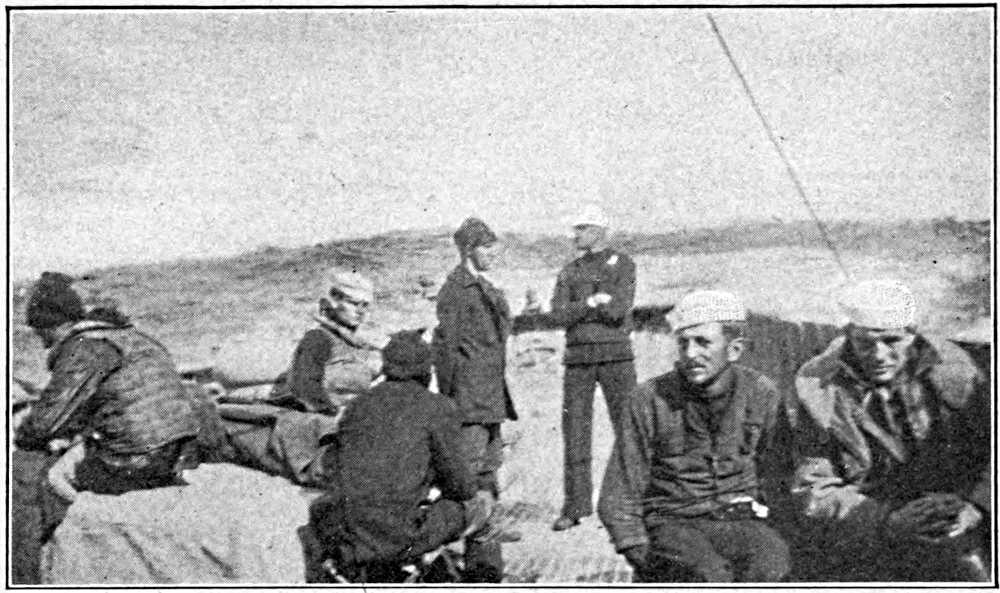
CHIEF QUARTERMASTER FARR STANDS WITH FOLDED ARMS AND
INDICATES THAT HE HAS HIS SEA-LEGS WITH HIM
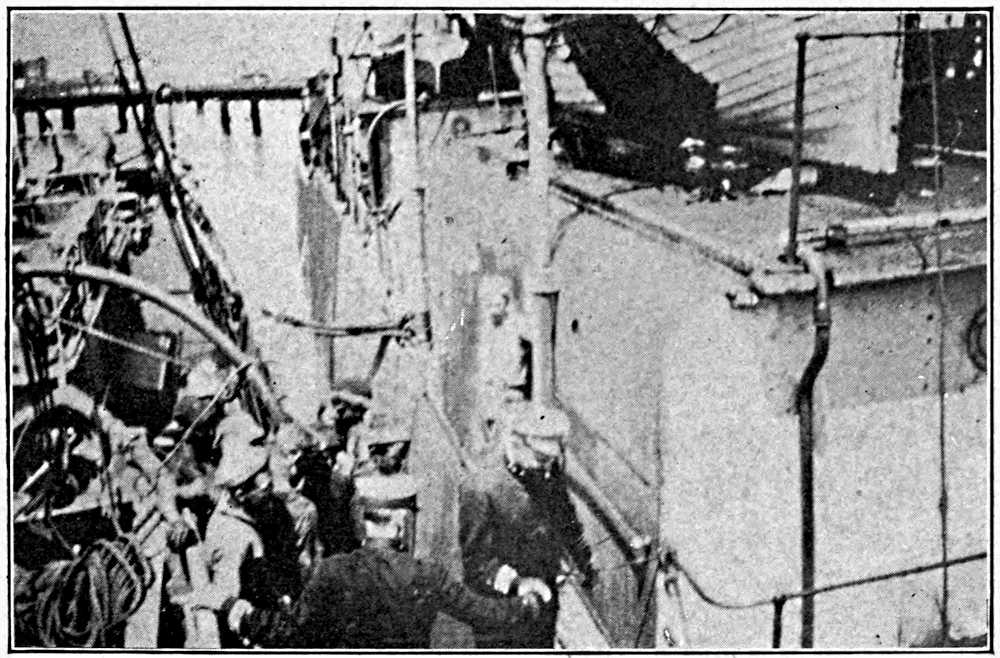
COMMANDER KITTINGER SAYS GOOD-BYE TO LIEUTENANT COMMANDER
PORTER AS THE LATTER TAKES OVER THE COMMAND
[Pg 217]
6. If the ship is trop fort, and you need a corps-mort,
Just to keep her quite safe in the bay,
You have only to go to brave Captain Loiseaux,
Il nous faut le chameau, s’il vous plaît.
7. When they’re coming too strong, and you find you’re in wrong,
In trouble at sea or on land,
There’s just one man to see and his name’s F. T. E.,[6]
To clear out the gear box of sand.
8. There’s a gallant French sailor who’s with us to-night,
He’s bound for a trip ’cross the sea;
So here’s Merci beaucoup, bon voyage, Admiral Grout,
From the Breton Patrol of H. B.
9. There are brave men in plenty and well known to all,
Who have come over here for the war,
But the best known of all is the one that we call
Old Robert E. Tod—Commodore.
10. If you want a good man, just to unload a van,
Or to anchor a ship in the Rade,
Or to work night and day, you have only to say,
“Where in hell is old Robert E. Tod?”
Lieutenant McGuire was made executive officer of the Corsair when Captain Porter took over the command. In time of peace Lieutenant McGuire had been first officer of the yacht, so he was really stepping into his old berth. Ensign Schanze, the efficient gunnery officer, had been commissioned a lieutenant in December. In May he was transferred from the Corsair to the staff of Rear Admiral McCully, the District Commander at Rochefort.[Pg 218] For some time he acted as liaison officer on board of the French station ship Marthe Solange, and his scientific training was later employed in experimenting with and testing listening devices for detecting enemy submarines.
Ensign Gray, the communications officer who had helped to make the radio service of the Corsair notable throughout the fleet, was anxious to have a whirl at the destroyer game, like any proper-minded young Navy man, and on May 28th he was transferred to the Monaghan of the Brest flotilla. Assistant Surgeon Laub was sent to the Moccasin in April and Assistant Surgeon R. H. Hunt exchanged billets with him for a short time, shifting from the Corsair to the destroyer Nicholson. Chief Engineer Hutchison stood by the ship until September, although his health was poor and he had been compelled to seek hospital treatment ashore. After leave at home he regained his strength and sailed in the big transport Agamemnon. His position in the Corsair was filled by Lieutenant J. J. Patterson as engineer officer. Assistant Engineer Mason received an appointment as ensign in May and went ashore for staff duty at Bordeaux in the autumn. His partner in the engine-room, Assistant Engineer Hawthorn, left the Corsair in June and was assigned to the naval auxiliary service as a senior engineer officer. Boatswain Budani, who had polished off the aspiring bluejackets and taught them to be regular, sea-going gobs, was summoned[Pg 219] to the Naval Aviation Headquarters at Paris and later sent to Italy.
At the ward-room table were new officers to be welcomed into the briny brotherhood of the Corsair, Ensign A. H. Acorn, Jr., Lieutenant Gerald Nolan, Ensign J. W. McCoy, Ensign P. F. Wangerin, Ensign C. R. Smith, Ensign S. K. Hall, Ensign R. V. Dolan, several of whom were promoted to be lieutenants, junior grade. After the armistice and while the Corsair was in the North Sea and at Queenstown, there were other changes which will be noted later.
Through the winter and spring the task of studying for commissions which had bred so many headaches in the bunk-rooms below was getting on famously. There were gloomy moments when, as has been said, one candidate felt sure that the captain would recommend him for nothing else than a firing squad, or another had believed that a “bawling out” had utterly wrecked his prospects, but such dark forebodings were mostly unfounded. Examining boards of officers were duly convened, or recommendations made for the intensive course at Annapolis, and the Corsair was like a college grinding out diplomas at Commencement time, excepting that the Navy course was far stiffer than the requirements of the campus. There were no “snap courses” in the Bay of Biscay and no bluffing the faculty.
The following enlisted men, with one warrant[Pg 220] officer, were examined, qualified, and given commissions with the rank of ensign:
| Enlisted as | ||
| W. F. Evans, Jr. | Seaman | Sent to Annapolis |
| David Tibbott | Seaman | ” ” ” |
| R. G. Seger | Seaman | ” ” ” |
| E. B. Prindle | Q.M. 2c. | ” ” ” |
| E. L. Houtz | Seaman, 2c. | ” ” ” |
| C. N. Ashby | Seaman, 2c. | ” ” ” |
| W. J. Rahill | Seaman | ” ” ” |
| H. F. Breckel | Elec. 1c. Radio | Commissioned Overseas |
| A. C. Smith, Jr. | Q.M. 2c. | ” ” |
| C. S. Bayne | Seaman | ” ” |
| A. L. Copeland | Seaman | ” ” |
| J. T. Herne | Seaman | ” ” |
| A. J. Marsh | Seaman | ” ” |
| A. V. Mason | Machinist | ” ” |
Chief Quartermaster F. S. Fair and Chief Commissary Steward H. A. Barry passed the examinations successfully, but failed on the tests for eyesight and were thereby disqualified for commissions, a misfortune which keenly disappointed them and their shipmates. Commander Kittinger volunteered this high opinion of them: “Two of the best men we had, I regret to say, received no rewards and it was a loss to the service. Fair and Barry get 100 per cent from me in every department. If they were physically fit to be bluejackets it might seem as though they were physically fit to be officers, but such were the regulations.”
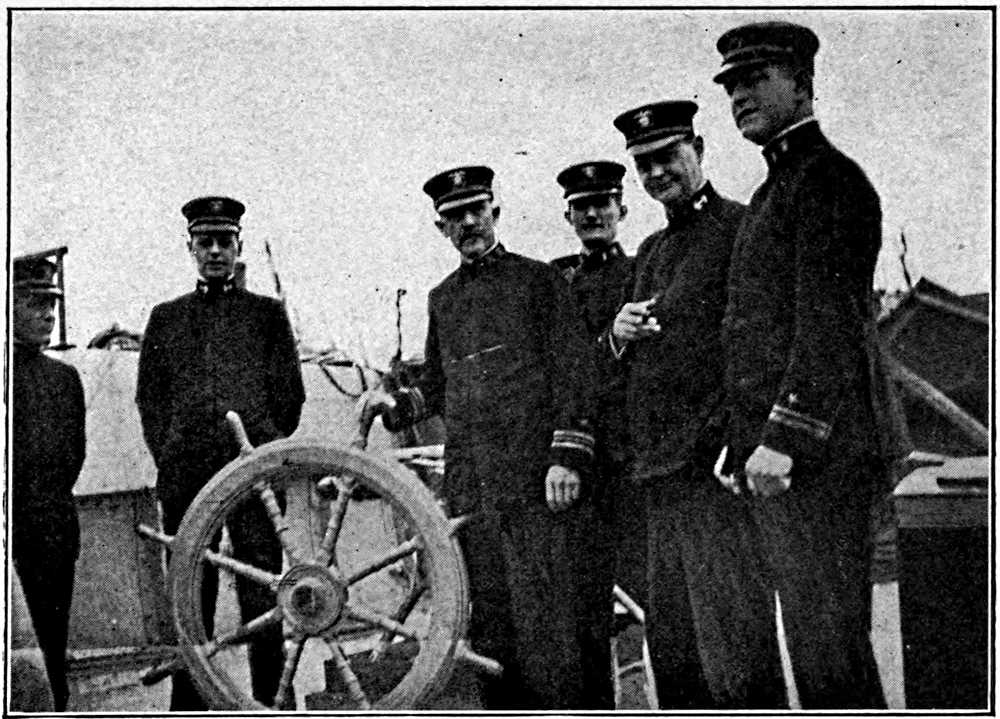
FROM THE LEFT, LIEUT. SCHANZE, ENSIGN GRAY, LIEUT. COMMANDER PORTER, CHIEF ENGINEER HUTCHISON, COMMANDER KITTINGER, AND LIEUT. McGUIRE
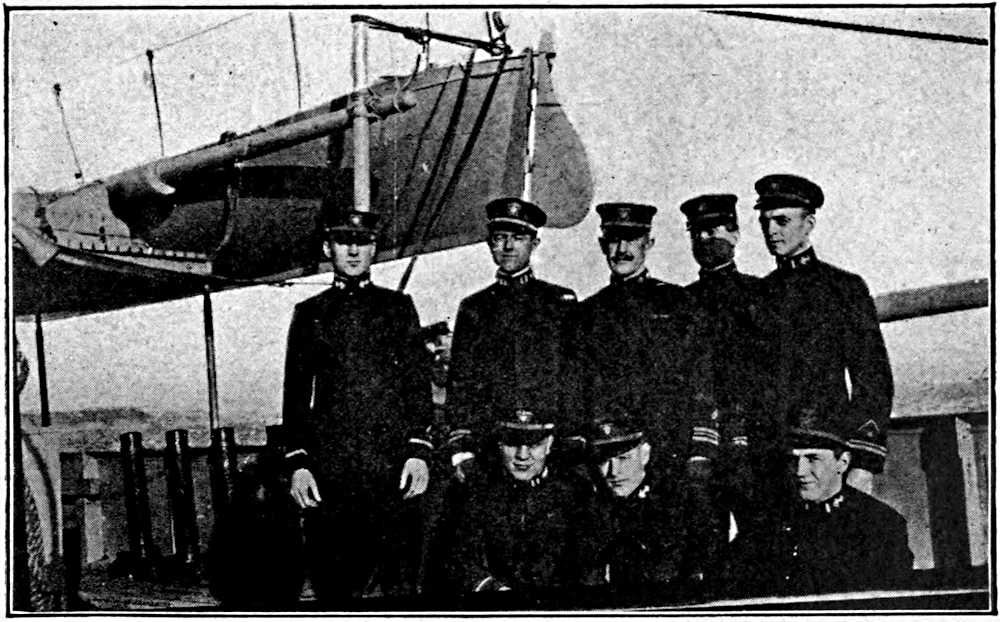
AT ROSYTH. BACK ROW, FROM RIGHT, LIEUT. NOLAN, DR. AGNEW, COMMANDER PORTER, LIEUT. McGUIRE, ENSIGN ACORN FRONT ROW, LIEUT. PATTERSON, ENSIGN WANGERIN, PAYMASTER ERICKSON
Ensign Carroll Bayne stayed in the Corsair for a little while as an officer and was then transferred [Pg 221]to staff duty at Brest, assisting Lieutenant Commander Tod who was Port Officer at the time. In his diary Bayne indicated what his duties were, and they suggest that the Naval Reserve officer was expected to turn his hand to almost everything, and at very short notice:
Mr. Tod took me around to-day to call on all the French admirals, etc., and they were very courteous. I got an awful call down from an American three-striper for not saluting him. I started to, but he did not see me, so I knocked off. However, he came back and gave me particular fits.... The Leviathan came in to-day with ten thousand troops. She is the most enormous thing I ever saw. It took three hours to moor her. She bumped a tanker coming in, almost sank the Burrows destroyer, and ended by sinking a French tug. The soldiers began coming ashore before she was moored. That packet needs considerable elbow-room. I went aboard the Leviathan at 6 A.M. and almost got lost in her. In fact, I did. Her bridge is much higher than the Corsair’s foretop. Weather beastly and we spent most of the day getting coal barges to and from her....
June 25th. The Leviathan sailed for the States. I was out there until she left, helping to unshackle her and get her under way. I have the night trick, so will have to sleep in the office. This is some job.... The Great Northern and Northern Pacific came in with troops and will leave to-morrow night. They are certainly making speed back and forth these days.... July 1st. Started out at 6 A.M. and boarded fifteen ships. One had run aground on a rock and her bow was smashed and the fore-peak full of water. I made arrangements to dock her to-morrow.
[Pg 222]
July 4th. Big parade to-day, but I saw none of it. Twenty-three American transports came in and I had to board them all, a four-hour job. We are expecting more troop-ships to-morrow. It is up to me to get them coaled, watered, and ready to turn around.... July 11th. The Von Steuben left to-night in a heavy storm. Commander Tod, Major O’Neil, and I went out to meet a convoy of thirteen ships, all carrying troops. The Major got very sick in the rough sea. We had the devil of a time, and no other word applies. Got back at 3 A.M. and had to anchor and then board all these ships in total darkness. Another one of those ships from the Great Lakes broke down and that means work for me to-morrow. This is the fourth one of the kind that has gone to pot here. I wish they could be left at home.
July 18th. Roughest day yet, seas very high. I went over to assist in getting the Leviathan under way. She started off at seventeen knots and her back-wash came within an ace of upsetting us. Had a tough time making landings on this batch of troop-ships. When I got alongside the Westerdyke a huge wave slammed my boat against her, carrying away all my superstructure and chewing things up generally. We managed to get clear and stay afloat.
I got in wrong with the Army who claimed I stole a ship from them. A collier came in, and as the Navy was badly in need of coal, I refused to look at her manifest and sent her over to our repair ship Panther and began to coal her. The Army got wise and put up a yell, but it was too late and I got away with it. They say that if the trick is done again they will report it to Pershing. Let ’em go to it, as long as the Navy gets the coal when it needs it.
[Pg 223]
While the Corsair was driving through the blustering winds and seas of March, there came bright days now and then which were a harbinger of springtime in Brittany. In a letter written on Palm Sunday, Chief Quartermaster Farr depicted the following contrast with the grim routine of the war by sea and land:
I have had a delightful day. In the first place, the weather is like June and now it is moonlight and a dead calm is resting on the bay and I feel the joy of life and the beauty of Nature. This morning I went ashore to the Catholic church, and the entire population of the little Breton fishing town must have been there. Of course I couldn’t understand what was going on, but it was restful and soothing to say your prayers and think a little and listen to the organ. A Frenchman with a good voice sang “Hosanna, Glory to God,” and I prayed hard for the English armies in the great battle which is now raging. Their losses are heavy and I think of the terrible anxiety in England for their boys. Not that there is any doubt of the outcome, but so many brave men are dying, and when you read of the Ninth Division, say, as particularly distinguishing itself, you can imagine the feelings of the mothers of those men.
This afternoon several of us walked out to a little château built in the time of Louis XVI which was very interesting. The old French people were extremely hospitable, gave us tea, and showed us everything. They had a beautiful little garden with lots of vegetables growing, peach and cherry blossoms, wonderful hawthorn hedges, spring flowers everywhere, the birds singing, and the whole landscape peaceful and happy. It[Pg 224] was hard to realize that the greatest battle of the war is raging in the north.
We walked back to the Y.M.C.A. where we each had four fried eggs with some of the Army engineer troops. They come from California and Oregon, and are the best and huskiest-looking soldiers I’ve seen yet. A darky was in the party, a Navy cook, and he was as good as a minstrel show. He ordered six eggs, and as soon as they came on the table he ordered another half-dozen. He said he was honin’ and pinin’ for to get to Dunkirk, and would probably get killed by a bomb if he did, but “befo’ the Lawd, boss, I jes’ itches to go anyhow. It’s mah destination, she sure is.”
I am mighty glad to have had this service in the ranks. I wouldn’t have missed it for anything. It is the only way to know the real Army and Navy.
[4] A Year in the Navy. Houghton Mifflin Co.
[5] H. B. Wilson.
[6] Commander Frank T. Evans, U.S.N.
[Pg 225]
This business gets more interesting every day and is by far the most fascinating industry I have ever undertaken [declared Lieutenant Schanze, in letters written during the autumn and winter]. Of course it is extremely strenuous, the long sea voyages into an eternally rough ocean, the cold, wet days and nights, and the everlasting vigil that must be kept despite wind, rain, fog, and storm. It gets to the nerves of the boys and a few of them show signs of weakening at times, but on the whole, and in my humble opinion, the Corsair has the most pugnacious and indefatigable bunch of fighters in the whole Navy.
You see, the Corsair and the Aphrodite were the first American war vessels to patrol the Bay of Biscay; consequently we are old-timers here and are looked up to by the others as being well versed in this game. The hard service is the best thing that could have happened to us. Being in a war without actually serving on the firing line would drive me looney, but as things have turned out I have the most wonderful opportunity to exercise all my mechanical ingenuity and experience and they have more than stood me in good stead.
This war work agrees with me better than anything I have engaged in. I am growing stouter and more vigorous and enjoying every minute of it.... If we bean a submarine and crow about it, everybody ashore gives us the horse laugh because we did not have the propellers or conning tower to show for it; and if some misguided sub takes a shot at us and the torpedo happens[Pg 226] to miss and biffs one of the empty buckets we are escorting over the horizon, the Admiral roars until we dare not show our faces ashore. I recently heard the anti-submarine campaign assailed on the ground that the submarines are still at large and going strong. They are. But the submarine campaign of Germany is away past its zenith. It was passed several months ago and the lid is now being nailed down on its coffin.
We are over here in this mess up to our ears and we know what has taken place when the whole ocean seems to tremble and that sickening, muffled roar, whose direction defies discovery, comes to our ears. We know that another torpedo has found its mark. Does it make us gloomy? It does not. It cheers us up. Why? Because we can instantly diagnose just how it was done and we recognize that our enemy is becoming more timid, impotent, and desperate. Very soon every successfully exploded torpedo will cost the life of the sub that sent it. Instead of being the terror of the seas that they were last June and July, the U-boats now advertise the fact that the terror of the seas is the American destroyer.
The war goes booming along on an ever greater scale, and to those who are given this opportunity of viewing the panorama, it unfolds itself with a magnitude that defies all description. Could I but tell you of the vast works that America alone has put upon the landscapes here in France, you would believe my enthusiasm exaggerated. Details I cannot give, but as a comparison imagine a contract for the construction of a series of communities, each one about as large as Newark was ten years ago, and imagine them equipped with every modern improvement such as wharfage on a river-bank formerly barren, manufacturing plants for the fabrication of everything from wooden legs to steel ships, and then accept this as a fact already accomplished [Pg 227]and doing business, and you can gather some idea of the tremendous efforts that have been put forth.
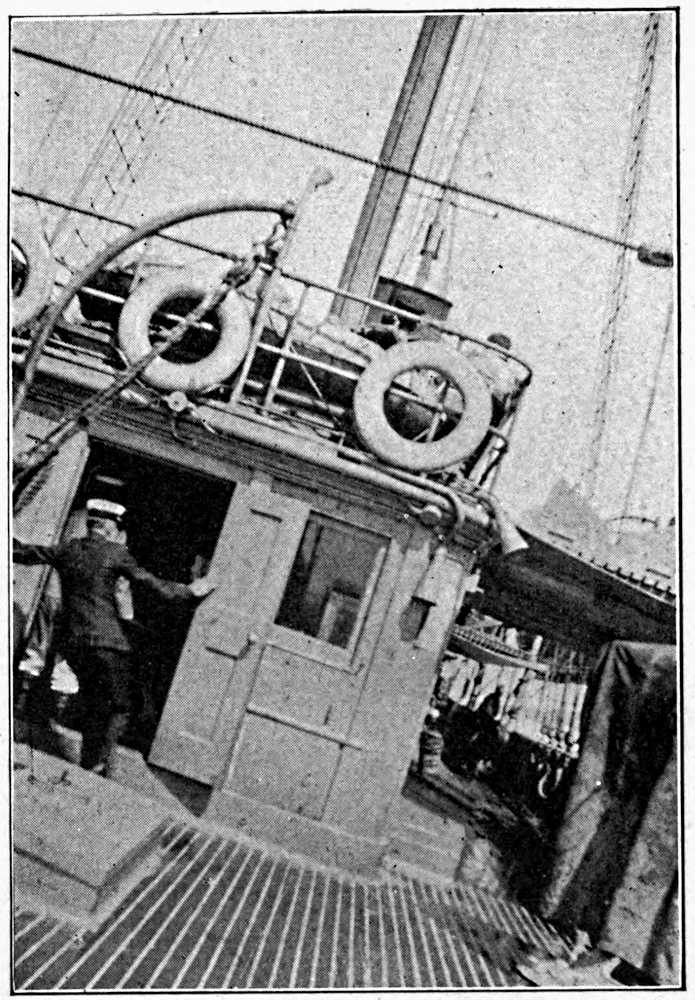
ROLLING OUT TO FIND A CONVOY
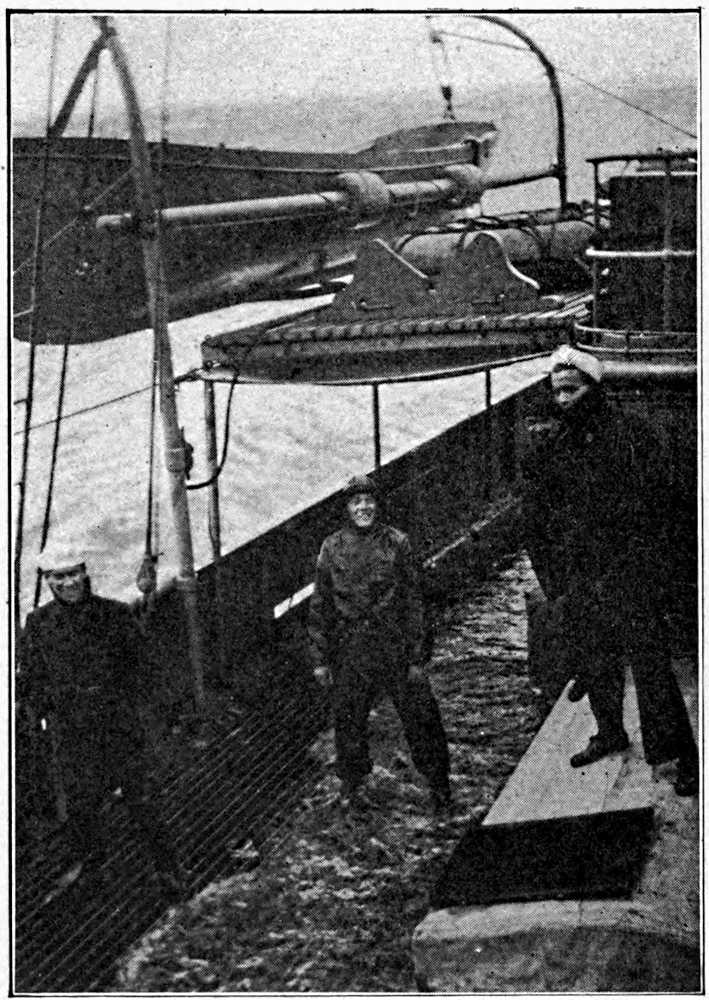
A LITTLE WATER ON DECK
For all this we are indebted, not nearly so much to the men here at the front as to those whose untiring efforts at home, in face of all kinds of criticism of the most venomous kind, have driven this enormous task to a successful culmination. I have a wonderful respect for our men at home who have had to stay home and accomplish things which they could never disclose to a naturally impatient and clamoring public. Had the Germans done such things as I have seen here accomplished by Americans, I would have taken off my hat to them and acknowledged the fact that German efficiency coupled with the advantages of a despotism was at least worthy of a close look. I dwell upon this phase of the situation because it has recently come to my attention, from most reliable sources, that there is a tendency toward gloom in certain quarters at home. The constant attacks made by conscientious critics, aside from the braying of the eternally discontented and the insidious whispers of the disloyal, are liable to make even the stoutest hearts falter at times.
I cannot too emphatically contradict every reason advanced to sustain a gloomy attitude of mind. There is every reason for the greatest enthusiasm and confidence. In fact, we over here on the firing line have a spontaneous kind of enthusiasm that comes only to the victorious. This war is a long and ferocious process in which each battle must be considered as a single shot fired only as a part of the ensemble. On land and sea things look better than they have in a long time. Every American effort is pure velvet for the Allied side. I trust our nation will now begin to see that America is a big and powerful fellow among the nations of the world and that, with just a little bit of careful[Pg 228] attention, this European situation can be hammered into shape. The women of the country are, after all, pretty much the whole thing, for they can inculcate the spirit of fight and of happy confidence that nothing else can put into their boys. If the mother will adopt the old Spartan admonition of “Come home either with your shield or on it,” the boys will keep surging into this war with an ardor that no enemy can stop.
... My experiences thus far have brought me more laughs than it has been my pleasure to have in any other period of time. I must confess, however, that many of the laughs come when I view some of the situations in retrospect. At times, especially in the middle of a ruction, when literally tons of high explosives are being launched, we are too busily engaged to laugh. On such occasions we have to think rapidly and work fast.
One incident may be worthy of note. A flock of troop-ships was under escort through the torpedo zone. The eagle eye of a trained observer caught the tell-tale symptoms of a submarine trying to manœuvre into striking position. Activities began at once, if not sooner. Those of us whose job it was to look after the sub, did it. Those of us whose job it was to screen the troop-ships, did that. On one of the transports were many negroes who knew more about shore duties than seafaring. On the ship they were passengers pro tem.
The process of dealing with a submarine certainly must send thrills through a spectator who has never attended any rehearsals. The negroes in question were all novices and their chief emotion was primitive terror. The simultaneous explosion of forty or fifty barrels of dynamite made the whole ocean heave and rumble. Even those of us who were used to dropping ’em over and who were braced for the shock, felt considerably jolted.
[Pg 229]
The darky soldiers thought the end of creation had sure busted loose in epidemic form. One of them excitedly dug down into his pack and fished out a Bible. Opening it on deck, he knelt upon it, wrung his hands to Heaven and cried in accents that could be heard above the racket of the explosions, “O Lawd, O Lawd, I’se never gwine roll dem bones no mo’. Ah promise it. Ah promise it absotively.”
Another one decided that this method of imploring grace was worth imitating in the terrible crisis, so he rushed over and tried to get knee-room on the same Bible. Shoving his comrade aside, he managed to find a sacred anchorage and his supplication was, “Good Lawd Jesus, lemme see jes’ one green tree. Ah ain’t askin’ you to send me back home across dis yere big ocean till th’ war is done. Ah’ll stay right where I is put, but lemme see jes’ one green tree befo’ all dem German su’marines gobble dis pore niggah like Jonah an’ th’ whale.”
Half an hour after the excitement was over, these devout passengers were shooting dice as busily as ever. There were negroes in another unit which we escorted into France. In wandering about the port, they came across some of their own race, black troopers from the French African colonies. Negotiations were opened to start a conversation going, but they could find no common language until one of the bunch produced a pair of dice. This, it seems, instantly broke down the barrier, and they soon had going as fine a little game of international craps as a man ever saw. Both sides whooped and haw-hawed until traffic was blocked and the police interfered.
The convoy work in which the Corsair took part during the four months from February 15 to May[Pg 230] 30, 1918, comprised the following cruises, arranged in the form of a summary so as to make the record more complete and also to suggest the volume of the shipping which was entrusted to the protection of the yachts and destroyers in French waters:
Feb. 16-20. (Westbound from Verdon.) Ships in convoy: Eugene Grozos, Mont Pelvoux, Kalfarli, Lenape, Mariana, Lamertin, Mundiale, Bergdalen, Amphion, Northern, Joseph Cudahy, Stensland, Ariadne, Lady of Gaspe, Thibet.
(Vessels in escort.) Corsair, Aphrodite, May, Regulus (F), Aventurier (F).
Feb. 25-28. (Westbound from Verdon.) Ships in convoy: El Occidente, Anglo Saxon, Erny, Borinquen, Montanan, Aurelien Sholt, Appelus, Balti, Gusta Vigiland.
(Vessels in escort.) Corsair, Aphrodite, May, Cassiope (F).
March 7-10. (Westbound from Verdon.) Ships in convoy: Luckenbach, St. Stephen, Millnock, Munares, Pearl Shell, Crecarne, Strathlone, Eschwick, Stellina, Anglo Mexican, Pennsylvanian, Hilda, Frances L. Kinney, Eagle, Felix Taussig, Dalblair, Camaguey, Oslang.
(Vessels in escort.) Corsair, Aphrodite, Nokomis, Rivoli (F), Cassiope (F).
March 16-19. (Westbound from Verdon.) Ships in convoy: Charlton Hall, Santiago, Mont Ventoux, Penmarch, Bay Douglas, New York, Dumfurland, Alf, Beaverton, Cantal, W. Mace, Bay Nyassa, Wachusett, El Orients, Woonsocket, Augvald, Ionian.
(Vessels in escort.) Corsair, Aphrodite, Nokomis, Rivoli (F), Marne (F).
March 20-21. (Eastbound to Gironde.) Ships in convoy: Mercury, Tenadores.
[Pg 231]
(Vessels in escort.) Corsair, Noma, destroyers Balch, Winslow, Sampson, Porter, Drayton, Parker.
March 25-27. (Eastbound to Gironde.) Ship of convoy: Mallory. (Vessels in escort.) Corsair, Noma, Wakiva, destroyers Rowan, Winslow, Benham.
April 3-4. (Eastbound to Gironde.) Ships in convoy: Powhatan, Martha Washington, El Occidente.
(Vessels in escort.) Corsair, Noma, destroyers Duncan, Caldwell, Sampson, Winslow, Parker, Connyngham.
April 8-22. Corsair acting as communication ship, at Verdon, and overhauling machinery at Bordeaux.
April 24-27. (Westbound from Verdon.) Ships in convoy: Indiana, Clare, Alexander Kielland, Daphne, Lyderhom, Peter H. Crowell, Canto, Kentuckian, Hunwood, Seattle, Oregon, Californian, Mocassin, Munindies, Munaires, Lake Tahoe, Santa Rosalia, Drake, Amphion, Oregonian, Newton.
(Vessels in escort.) Corsair, Aphrodite, Nokomis, Wakiva, Rivoli (F).
May 5-9. (Westbound from Verdon.) Ships in convoy: Mesopotamia, Jean, West Wind, Guantanamo, Monticello, Cristobal, Margaret, American, Iroquois, Chian, Artemis, Buenaventura, Sudbury, Lamertin, Edith, Nyanza, Amiral Grouse, Ariadne.
(Vessels in escort.) Corsair, Aphrodite, Wakiva, Rivoli (F).
May 13-16. (Westbound from Verdon.) Ships in convoy: El Capitan, Munsano, Castleman, Bergdalen, Westerner, Clara, Vaarli, Lake Placid, Gusta Vigiland, Winnebago, Luckenbach, Joseph Cudahy, Saxolin, Robert H. Thomas, Quincy, Thorwald Halvorson, Andre.
(Vessels in escort.) Corsair, Aphrodite, Nokomis, Rivoli (F).
May 21-23. (Westbound from Verdon.) Ships in[Pg 232] convoy: Matsonia, Powhatan, Martha Washington, El Oriente, Minnesotan.
(Vessels in escort.) Corsair, destroyers Wadsworth, Nicholson, Monaghan, Roe.
May 27-30. (Westbound from Verdon.) Ships in convoy: Shoshonee, Crown of Seville, Walter Munson, Tunica, West Arrow, East Gate, Charlton Hall, Luciline, Absaroka, Westbridge, Corozal, Lorna, Westward, Pensacola, Millinocket, Darnholm, Admiral Neilly, Elmore, Sagua, Tamano, Texas, New York.
(Vessels in escort.) Corsair, Aphrodite, Nokomis Aisne (F).
Industriously employed in this service with the convoys, the Corsair encountered no slant of misfortune until June. Then came the loss of the fine cargo steamer Californian with holds and decks full of several million dollars worth of supplies for the American Army in France. This disaster was not the result of submarine attack. The ship was unlucky enough to bump a German mine about fifty miles off the entrance of the Gironde River while nearing port with the convoy and escort.
The Corsair stood by and made every possible effort to save the precious Californian endeavoring to haul her along at the end of a tow-line, but the damage was vital and salvage hopeless. It was one of those numerous episodes of the warfare at sea, as waged by the enemy, which seemed so enormously wasteful, so impossible for civilization to endure, this senseless obliteration of property on a scale without precedent in the whole history of mankind.
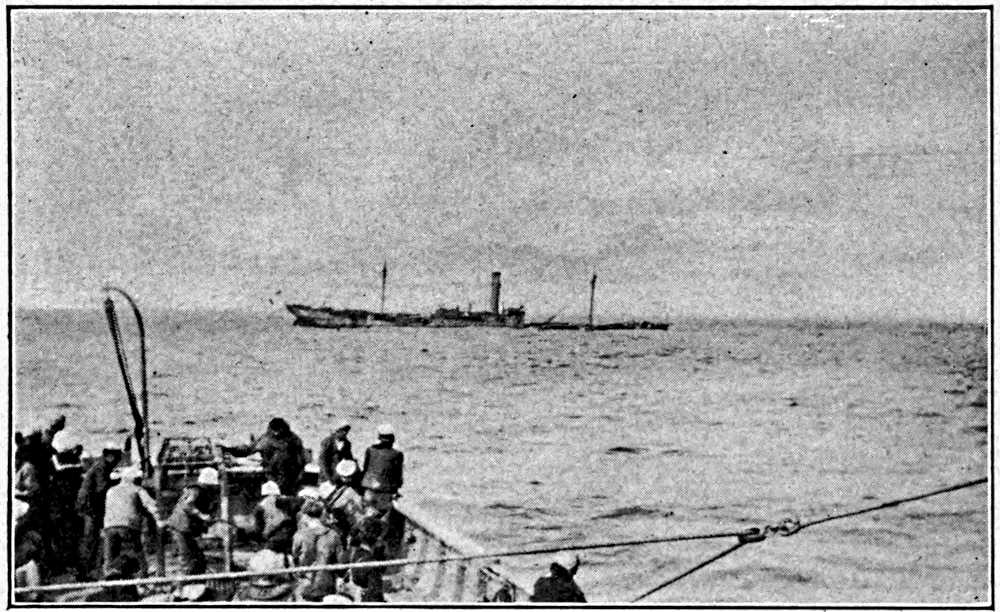
THE SINKING CALIFORNIAN. GOING, GOING, ALMOST GONE!
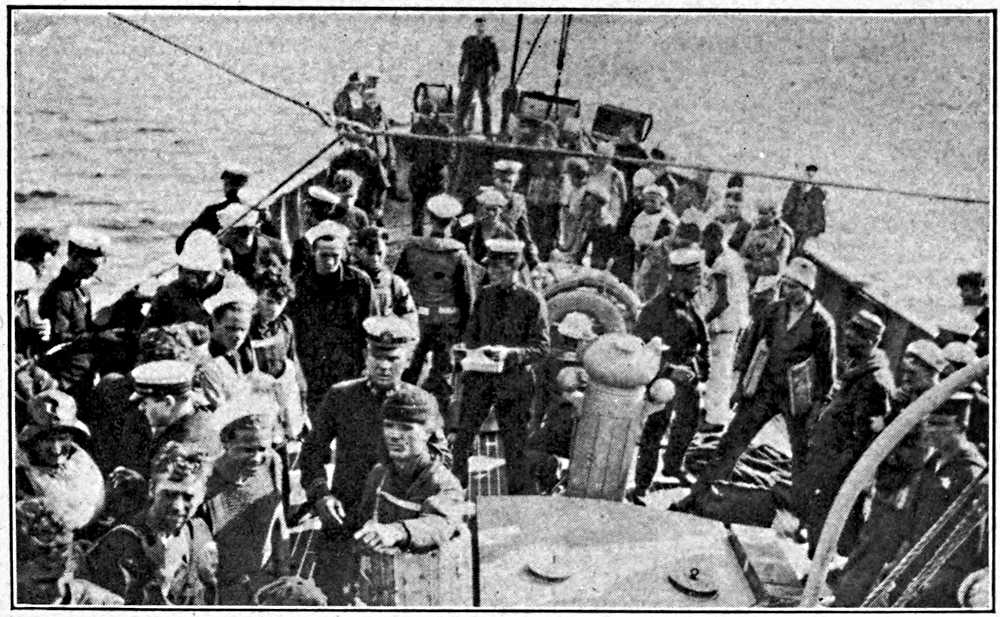
CALIFORNIAN SURVIVORS ABOARD THE CORSAIR
[Pg 233]
The Corsair found the convoy of eight ships in the afternoon of June 20th and took position with the other escort vessels, Aphrodite, May, Nokomis, and two French patrol boats. They steamed toward the coast at eleven knots without misadventure until early in the morning of the 22d. Then the Californian made a turn to the right, quitting the formation, and slowed speed until she came to a halt. Her crew could be seen jumping into the boats and letting them drop from the davits. There was no more ado about it than this, no sound of an explosion nor any disturbance of the sea. It was an uncanny, inexplicable thing to witness. From the bridge of the Corsair it was easy to perceive that the sailors of the Californian were proceeding, earnestly and eagerly, to abandon ship. It was done without disorder, but they were wasting no time.
The Corsair promptly swung to go near, at the order of Lieutenant McGuire, who was the officer of the deck. The yacht moved to the rescue with a speed which surprised even the Californian. Already the long, deep-laden steamer was settling by the head. One of the little French escort vessels had also hastened to the scene, but as she rolled in the trough of the ground swell, the sea slapped across her deck and the first boat to pull away from the Californian found so much difficulty in trying to lay aboard that the men semaphored the Corsair: “Will you please come and pick us up?” Presently[Pg 234] the master of the big steamer and many of his crew were scrambling up the side of the Corsair, where Commander Porter strongly urged that an attempt be made to save the Californian. He was ready to tow if the water could be kept down in the flooded compartments. It was a sporting chance, but better than letting the ship drown before their eyes.
Cheered by this readiness to lend a hand, the executive officer of the Californian, with sixteen volunteers from their crew, returned on board and a ten-inch manila hawser was passed from the Corsair. Because the bow of the stricken ship had filled so fast and was almost buried in the sea, the hawser was made fast astern and the Corsair tried to tow her wrong end to, as offering the least resistance. The sluggish mass moved very slowly, perhaps two knots, but it was impossible to steer it. The plucky Corsair dug her toes in, as one might say, and pulled like a thoroughbred horse harnessed to a wagonload of stone.
When this first attempt proved futile, it was decided to try towing by the bow, but while they were dragging the hawser forward the engine-room bulkheads collapsed with a roar and the sea rushed in to fill the dying ship. She went down by the head, the stern rearing higher and higher in air, until the great hull towered in a vertical position, and there it hung for an amazingly long time. It was surmised that the bow had struck the bottom of the sea. Then the stern slowly dropped and vanished[Pg 235] while the crew of the Corsair watched and wondered and felt very sad at heart.
No lives were lost; this was the redeeming feature, and the eighty-five officers and men of the Californian were all safely aboard the yacht where they were as hospitably cared for as the crowded quarters permitted. On the decks of the lost steamer were hundreds of Army motor-trucks, and one of the Corsair’s men, for lack of anything better to say, was heard to murmur as the sea swallowed them up:
“There’s some water in your carbureters this trip, and that’s no foolish jest.”
The dog rescued from the Californian remained aboard the Corsair as a souvenir and mascot, but the life in the Bay of Biscay was not to his taste, in spite of the efforts of the crew to make him feel at home. He was therefore detached and assigned to the U.S.S. (Auxiliary) Balti and sent to the United States, but fell down a hatch at Hoboken and was a total loss. For an epitaph, Kipling’s line seems apt, “We’re safer at sea again.”
Commander Porter’s official account of the loss of the ship reads as follows:
June 22, 1918
From: Commanding Officer,
To: Commander U.S. Naval Forces in France,
Via District Commander, Rochefort.
At 4.50 A.M. observed the U.S.S. Californian stop, turn to the eastward, and abandon ship. The Corsair[Pg 236] immediately went about and closed on the Californian. At 5.15 A.M. two boats from the Californian were alongside and survivors came on board. I informed their Executive Officer that we were close to land and suggested that it might be possible to get the ship into port. He immediately ordered his firemen into a boat and returned to the Californian. The Corsair circled about the ship.
At 7.05 A.M. all hands abandoned the Californian and came on board the Corsair. The captain informed me that he could do nothing as the engine-room was filling with water. I told him that we would attempt to tow. He returned to the Californian with a boat’s crew, taking the end of our tow-line with him. As the Californian was down by the head and we had a fair wind, our tow-line was made fast to the stern.
At 7.55 A.M. we started ahead. At 8.20 A.M. it was found that we could not handle the ship by the stern; stopped and attempted to take the line forward. Before it could be made fast, the ship settled so rapidly that the crew was obliged to abandon her, and we hauled the tow-line on board. At 8.54 A.M. the bow of the Californian went down, apparently resting on bottom. At 9.04 A.M. the stern disappeared and Corsair proceeded. While waiting we hoisted two of the Californian’s boats on board. During these operations one French destroyer stood by.
It is believed by the Commanding Officer of the Californian that the damage was caused by a mine. Nothing was seen. No radio message was sent as antennæ was disabled by the explosion. There were no casualties.
The lost ship was commanded by Lieutenant Commander D. Mahlman, U.S.N.R.F., and was[Pg 237] under charter to the United States Government. To the Board of Inquiry convened for the purpose, he presented his own story of the disaster, which was as follows:
At 4.50 A.M. felt an explosion amidships. Stopped the ship and ordered all hands to stand by the boats. The Engineer Officer reported water and oil leaking into the forward stoke hold. Sounded bilges and found three feet in No. 1; No. 2 full; and Nos. 4 and 5 empty. On examining the engine-room and stoke hold again, I found the water over the floor plates, the engineers meanwhile having the pumps working on the stoke hold bilge. The water was steadily gaining so I ordered the boats to be lowered and the ship abandoned.
Sent two boats away to the U.S.S. Corsair which was standing by, while I remained on board with Ensign Schwartz and boat’s crew to investigate further if it were possible to do anything to keep the ship afloat, the pumps being worked to the full capacity continually. Soon afterwards two boats from the Corsair returned to the ship with some of the officers and crew.
Extra efforts were made by the engineer force to gain headway on the incoming water. When the water had risen to the fire-boxes and continued to increase, on the report of the Chief Engineer that the water was beyond control, I ordered all hands to abandon ship. Having gone aboard the Corsair, the Commanding Officer asked me how long I thought the ship would keep afloat, to which I replied four or five hours. He then suggested towing, so I returned to the ship with my Executive Officer and sixteen men, taking a tow-line which was made fast to the stern, the best method of towing under the existing circumstances. No results[Pg 238] were obtainable and an attempt was made to shift the tow-line to the bow.
While the tow-line was being shifted forward, from observations made by me in the engine-room it was evident that the ship could not stay afloat much longer as she was then rapidly settling by the head. I again gave orders to abandon the ship, which was done, and the Californian soon began to sink rapidly, going down bow first until the stern was almost perpendicular. Later the ship slowly righted and the stern disappeared entirely at 9.04 A.M. in Latitude 46° 17′ 15″ North, Longitude 2° 10′ 30″ West.
The Corsair had tried and failed, which was ever so much better than not trying at all, and as one of her men mournfully observed, “With any sort of a break in luck, we would have salvaged her and a cargo that was so valuable that the Army organization was figuring out some way of raising it during the summer.”
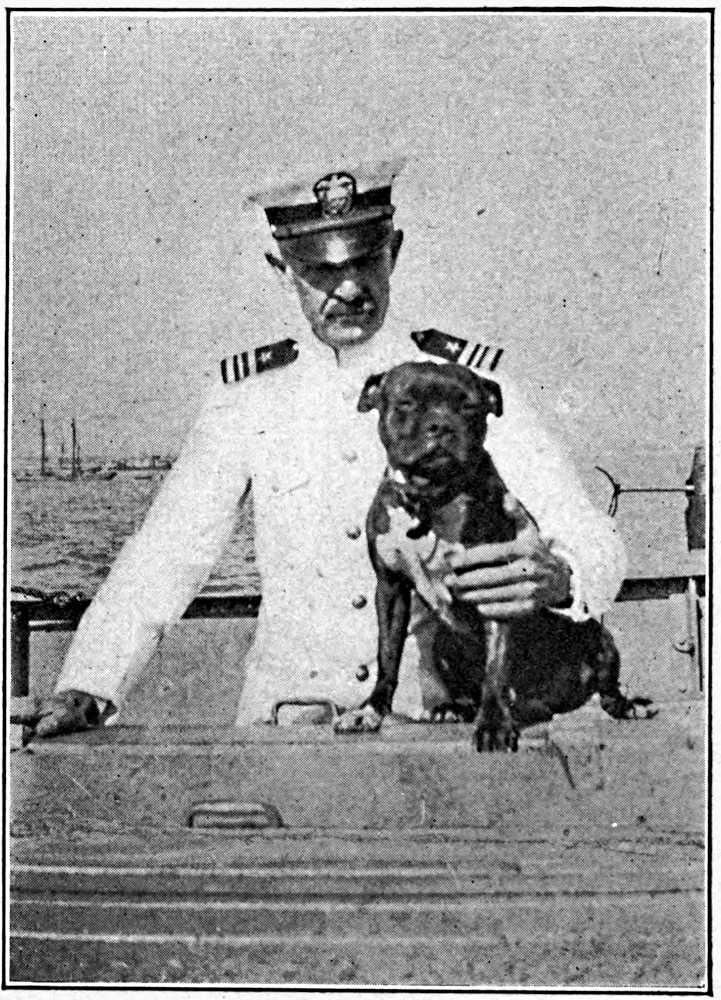
A MASCOT FROM THE CALIFORNIAN KNOWN AS “THE MUTT”
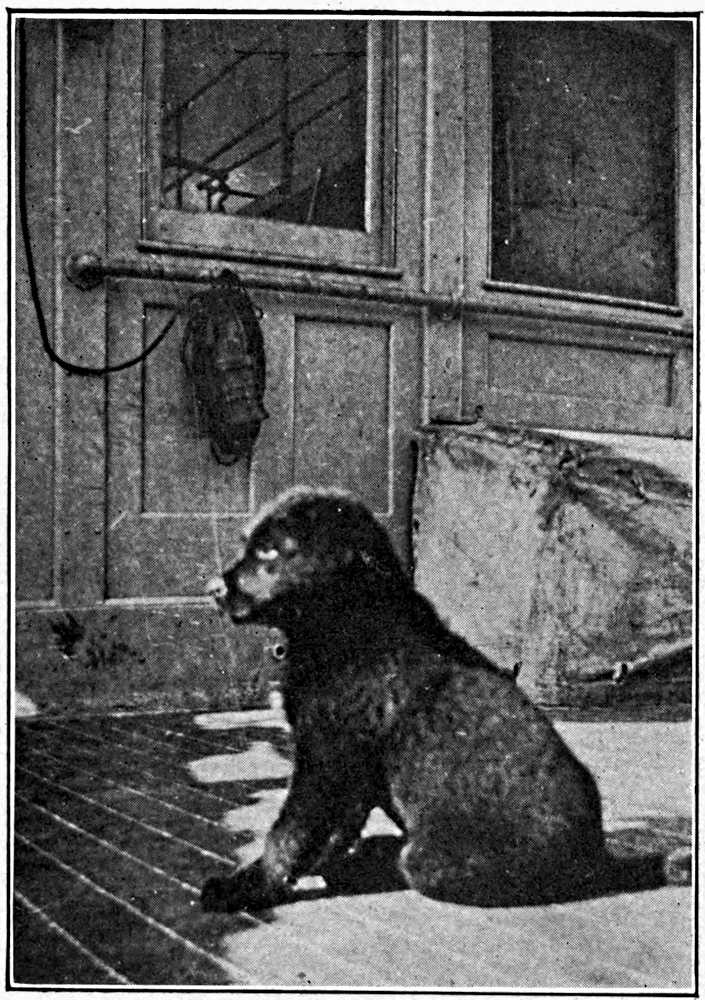
THE NEWFOUNDLAND PUP SAVED FROM THE FRENCH FISHING BARK
This was the only ship lost out of a convoy with which the Corsair operated during the long period of this service in and out of the Gironde, from June to November of 1918. On several occasions steamers were attacked and sunk or damaged just before joining or just after leaving the escort. These included the Montanan, the Westbridge, the Westward Ho, the Cubore, and the French cruiser Dupetit Thouars. When the S.O.S. calls came, the Corsair hurried to stand by, but other naval vessels happened to be nearer the scene and were able to save the survivors, or the ship managed to remain [Pg 239]afloat, as in the case of the Westward Ho. A cruise in August, beginning on the ill-omened 13th, turned out to be anything but monotonous, from start to finish. The air was full of tragic messages from torpedoed ships. It was like a dying flurry of the German submarine campaign.
The excitement began with this entry in the Corsair’s record:
S.S. Tivives (third ship in right-hand column) signalled “Torpedo just passed our stern from starboard.” This ship notified Aphrodite by radio. Went to general quarters and searched but saw nothing except whales and porpoises. Wind was light and sea smooth. French destroyer Aisne, which was astern of us, apparently intercepted radio as he was observed to be searching.
A little later in this voyage came the following tale of disaster, as caught by the radio:
Intercepted from Marseilles, “Montanan torpedoed.”
Intercepted from Noma, “Westbridge torpedoed.”
Intercepted from Aphrodite, “Cubore torpedoed, 10 P.M. Friday.”
The Corsair and Aphrodite had left their outward-bound convoy at this time, according to orders, to steer for the rendezvous and make contact with a fleet of fourteen ships bound in for France. During the night a green Véry light flared against the cloudy sky to the southward. The Corsair headed for it at full speed, but could find no ship in distress and it was later conjectured that the signal might[Pg 240] have come from the French destroyers which had remained to pick up the survivors of the Cubore.
Soon after this, several lights were sighted close to the water. It is hard to realize how unusual and arresting was such a phenomenon as this upon an ocean where ships had long shrouded themselves in darkness, screening every ray and glimmer lest it might betray them to a lurking enemy. The vision of officers and lookouts had so adapted themselves to these conditions that they were able to discern a shadow of a ship a mile away. In this instance, when vessels’ lights, several of them, were boldly displayed, the Corsair approached warily until it was possible to make them out as showing aboard a little flock of Breton fishermen. It was known that a French submarine was operating in this patrol area and the officers of the Corsair plausibly assumed that the lights might be a decoy for Fritz, so they concluded not to meddle with the situation.
Next morning another bevy of fishing vessels was seen, and the French submarine was with them, while a steamer was also standing by. Meanwhile the Corsair and Aphrodite had found the inbound convoy which had also a destroyer escort, and one of these, the Lamson, ran down to investigate the startling picture of a submarine calmly loafing about. The Frenchman promptly exploded a smoke bomb as the proper recognition signal, for he was taking no chances with a venomous Yankee destroyer[Pg 241] which was known to be exceedingly quick on the trigger when a periscope or conning tower was etched against the horizon. It was agreed that there were much more healthy pursuits than to be ranging the Bay of Biscay in a French submarine.
Fortune had been unkind when the Corsair tried to pull the Californian into port, but the story was a happier one when next she had the opportunity to snatch a good ship from the greedy maw of the sea. How it was done is summarized in a letter written by Vice-Admiral Wilson, after the event:
U.S. Naval Forces Operating in European Waters
Forces in France
U.S.S. Prometheus, Flagship
Brest, France, 8 October 1918
From: Commander U.S. Naval Forces in France.
To: Lieutenant Commander W. B. Porter, U.S.N.R.F.
Subject: Commendation.
The Commander U.S. Naval Forces in France takes pleasure in commending the excellent seamanship and judgment displayed by you in the salvage of the Norwegian steamship Dagfin, as reported in your letter of September 17, 1918.
The Dagfin, a vessel of 2100 tons, loaded with general supplies for the Italian Government, had been totally disabled for six days with a broken shaft when sighted by the Corsair on September 10th, in Latitude 45° 3′ North, Longitude 8° 03′ West. The U.S.S. Corsair under your command maintained touch with the Dagfin until the heavy weather then prevailing had moderated, and towed her into port, a distance of[Pg 242] three hundred miles through the submarine zone, arriving at Verdon on September 14th.
(Signed) Wilson
The Corsair happened to find this helpless Dagfin while scouting in search of a steamer of the convoy which had somehow gone astray. Insistent radio calls had failed to awaken a response from this missing Macona. She appeared to have lost her bearings and totally mislaid the rendezvous. The Corsair was too courteous to express annoyance, but her radio queries became more and more emphatic. The Macona was as elusive as a Flying Dutchman. At length the yacht concluded that she had done her honest duty and so turned in the general direction of the destroyer rendezvous, still keeping an eye lifted for the lost sheep of the convoy.
At 8.35 o’clock on the morning of September 10th, with the Macona still on her mind and the quest continued, the Corsair descried a steamer against the misty horizon and soon it was discovered that she was in distress and making no headway. By way of precaution the Corsair’s crew scampered to general quarters, because nothing could be taken for granted in war-time. Bearing down, the yacht hovered close to a sea-worn, dingy Norwegian tramp which wallowed inert and wore an air of profound discouragement. The sailors of the Dagfin flourished their caps and yelled with delight. It was obvious that they yearned to be[Pg 243] plucked out of the submarine zone after six days and nights of exposure as a stationary target to any U-boat which might wander that way. Fritz was too unsportsmanlike to hesitate to shoot at a sitting bird.
The Corsair was willing to undertake a towing job in order to save the forlorn Dagfin and her cargo, but it was necessary to ask permission to leave the duty already assigned, and a radio was therefore sent to the Admiral at Brest. Meanwhile the sea was too rough to undertake the ticklish manœuvre of hooking onto the melancholy Norwegian and Commander Porter shouted through a megaphone that he would return and stand by. There was profound gratitude on the bridge of the Dagfin, but some deep-sea curses along the rail. To have rescue so near, and to behold the American warship depart! It was too much like having the cup of salvation snatched from one’s lips. Were they to be left at the mercy of the hell-begotten submarines?
Steering northward to take another look for the Macona, Commander Porter changed course to sweep a wider area and, after several hours, received a radio reply from Brest, “Stand by Dagfin. Tug will be sent when weather moderates.” This order was to be obeyed, blow high, blow low, and through two stormy days the Corsair rolled and plunged within sight or signalling distance of the Dagfin before any attempt could be made to board her. It[Pg 244] was a furious gale, with squalls of snow and sleet, and the Corsair was so knocked about while heading into it that she had to turn and run before the sea under steerageway of four knots. The water came piling over the stern until the depth charges had to be shifted amidships to change the trim of the ship and lift the overhang a little. It was a man’s-size job, from beginning to end, this playing friend in need to the Dagfin.
With a sea anchor out, the Dagfin had been lying broadside to the waves, and this could not have increased the comfort of her crew. She was swept and drenched and miserable, and, at best, there is no luxury in a two-thousand-ton Norwegian tramp. At last the wind lost something of its evil temper and the sea was less confused. On the morning of September 12th the Corsair tried to get a line aboard, after receiving another radio from Brest, “Take Dagfin in tow when weather permits.” It was still too rough to put a boat over, so Commander Porter steamed to windward and attempted to float a line, buoyed by empty boxes, to the Dagfin, but the freighter’s drift was so much greater than the yacht’s that this scheme failed.
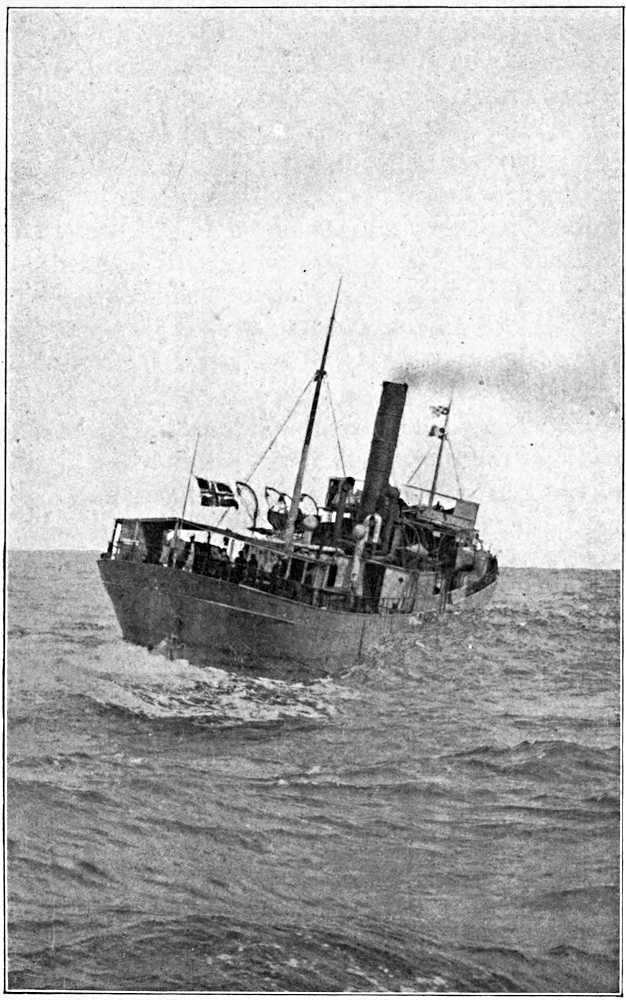
THE DAGFIN, BROKEN DOWN AND HELPLESS. THE CORSAIR STANDS BY
Nothing daunted, the skipper of the Corsair hauled his own ship around to leeward and deftly placed her where the line floated so close to the Dagfin that it was caught and hauled up by a boat-hook as she drifted upon it. To this light line the Corsair secured one hundred and fifty fathoms of [Pg 245]ten-inch manila hawser, and the Dagfin heaved it aboard with a turn about the winch. To the end of the hawser the Norwegians bent fifty fathoms of chain, for the longer the tow-line the easier the strain in heavy weather. The Corsair secured her end of the hawser by means of a wire span leading to the two after gun mounts, and then she was ready to go ahead and pull her heart out. It is needless to remark that the yacht had not been designed or built to yank disabled freighters through the Bay of Biscay in the tail-end of a nasty gale of wind.
They went ahead, Corsair and Dagfin, and worked up to a speed of five knots, reducing it a trifle when the strain seemed too great. They slogged along in this manner until 8.30 P.M. when the chain parted and the Dagfin went adrift. Commander Porter describes the rest of it in his report:
We observed that the Dagfin had broken adrift, and when attempting to haul in our tow-line I found that it was weighted with the Dagfin’s chain which had parted in the hawse-pipe. A six-inch line was bent and used as a messenger to the forward capstan, but as this would hold only four turns, which rendered, the starboard capstan was used to assist. No lead blocks of sufficient size were available to keep the line clear of the deck-house, and both houses were damaged. It was difficult to stopper and secure the messenger to the wet hawser. This was chafed its entire length, although the ship went ahead slowly to angle the hawser slightly and reduce the bend over the lip of the chock.
[Pg 246]
After three hours’ work the hawser was all in and the chain let go. Had conditions been favorable, of course the chain could have been hove in through the hawse-pipe, but I desired to intercept the French tug Penguin, sent out from Brest, which was then close by. The strain had unlaid the hawser, and releasing the chain allowed the turns to take up again. Removing numerous kinks from a wet, ten-inch rope is a long, tedious job.
As the tug had passed us in the night and was not in sight at daylight, I closed in to pick up our tow. Attempting to throw a line on board, we could not get near enough to reach, as there was still a moderate swell and we were both rolling and surging. A boat was lowered and our hawser bent to the Dagfin’s cable, and at 7.45 A.M. we went ahead at six knots. The average speed for twenty-six and a half hours was actually six and a quarter knots.
At 8.15 the Penguin arrived and I had difficulty in communicating, as she could not comprehend semaphore signals nor was our language perfectly clear to them. Our radio communication had been very good, although I was more reluctant to use it than was the Penguin, especially in stating latitude and longitude. To my question, “What are your orders?” the reply was, “Bordeaux.” She also informed me that she could tow four knots and as this would not bring us into port before dark of the following day, I decided to continue towing and requested that the Penguin escort. I considered that the advantages of greater speed and a much shorter time at sea gave us the larger margin of safety.
In my opinion (with a very limited experience in towing) the method adopted was by far the best way of towing a ship. Not only is the windlass usually the[Pg 247] strongest and most convenient place to secure to, but in the absence of a very long hawser the weight of chain sagging down makes an effective spring. There was never any undue strain and the Dagfin’s chain could not have parted if it had been in good condition.
In the early morning of September 14th the Corsair trailed into the mouth of the Gironde, doggedly kicking along at six knots, with the Norwegian water-bruiser dragging in her wake. There the Penguin took hold and the yacht went on alone to a berth at Pauillac, none the worse for the experience. It was all in the job, not so sensational as dropping depth bombs on a submarine, but perhaps requiring more courage, endurance, and seamanship. Commander Porter’s description of the tussle with the hawser is highly technical, but one catches glimpses of the hard and heavy toil of the sea and the ability to do the right thing in time of stress which comes only with experience. The sailors of the Corsair, many of them landlubbers only a year before, were learning the tricks of the trade.
It was back to the convoys again, the same old round of discomfort at sea and coaling ship in port, but the spirit of the great adventure had not been dulled. By way of change and respite, the Corsair was twice chosen to carry distinguished official visitors from one French base to another. The first occasion was on August 24th when the passengers comprised the party of members of the House Committee on Naval Affairs who were inspecting[Pg 248] for themselves the American naval and military forces overseas—Chairman L. P. Padgett, D. J. Riordan, W. L. Hensley, J. R. Connelly, W. B. Oliver, W. W. Venable, J. C. Wilson, T. S. Butler, W. J. Browning, J. R. Farr, S. E. Mudd. J. A. Peters, and F. C. Hicks.
They were the guests of the Corsair from Royan to the great American aviation base at Pauillac, and their enthusiastic approval of the work of the Navy in the war was pleasant for the crew of the Corsair to hear. Their report, later submitted to the Secretary of the Navy, contained this non-partisan opinion, signed by Republican and Democratic members alike:
The committee visited and inspected the United States naval activities at Bordeaux, Moutchic, Pauillac, Rochefort, La Rochelle, La Pallice, Fromentine, Paimbœuf, Saint-Nazaire, Montoir, Le Croisic, L’Orient, Île Tudy, and Brest. The amount of money expended at these various stations mounts into the hundreds of millions of dollars and the activities involve the employment of thousands upon thousands of men. They represent activities on land and water, under the water, and in the air. They involve transportation of troops, munitions, equipment, food, and clothing from the United States into France of the value of untold millions. The duties and responsibilities of the Navy were to escort and convoy ships transporting troops, and all manner of effort and activity in the air, patrolling the seas against German submarines, and safeguarding the arrival and departure of ships, the construction of bases for the operation and the care of the enormous [Pg 249]aviation organization, and also at the various bases providing first aid and hospital accommodations for the sick and disabled and the establishment of sanitary conditions, housing facilities, and numerous other activities essential to the proper care of the men, besides the many other efforts essential to the successful prosecution of the war.
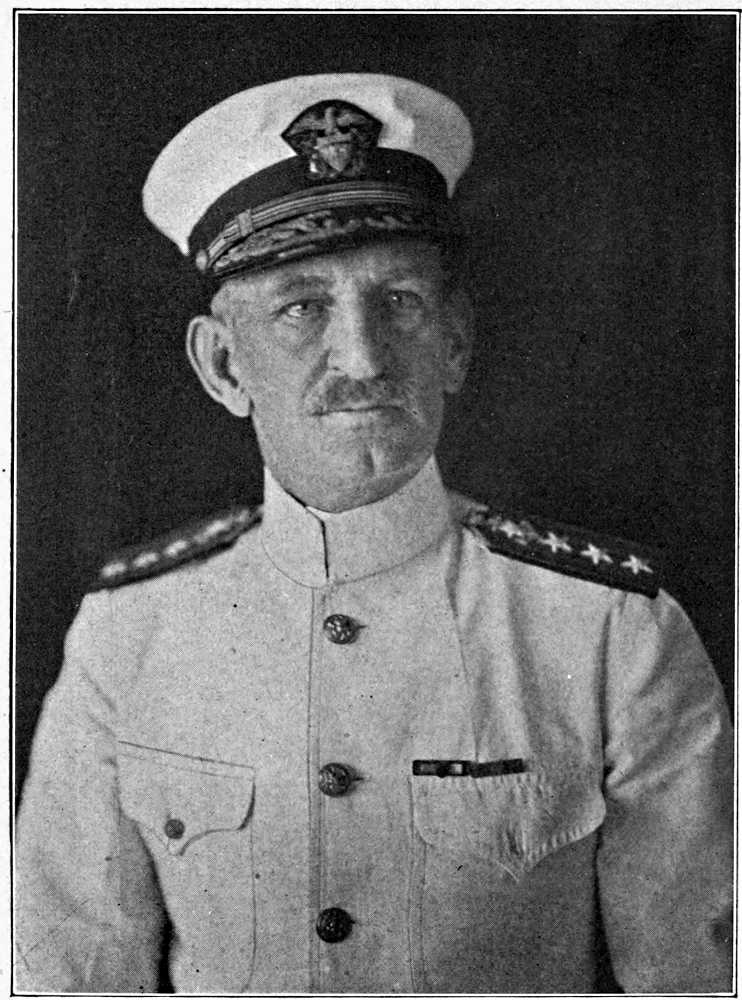
Copyright by Underwood and Underwood, N. Y.
ADMIRAL HENRY T. MAYO, COMMANDER-IN-CHIEF OF THE ATLANTIC FLEET
The whole work was so colossal that while there may have been mistakes and matters subject to criticism in small details, they were lost in the magnitude of the success accomplished. Taken as a whole, by and large, the Navy has achieved a great work and is entitled to approval and commendation.
Late in October the word came to the Corsair that the Commander-in-Chief of the Atlantic Fleet, Admiral Henry T. Mayo, and staff, would be graciously pleased to use the yacht (or fourth-class gunboat, to be precise) to take them from Royan to Pauillac. Now a four-starred admiral is absolutely top-hole in naval rank and dignity, and the three gold stripes above the broad band on his sleeve are viewed with awe and bedazzlement by the younger officers. To be a vice-admiral, or even a rear admiral, is a resounding distinction, but an admiral is so much more imposing that there are very few of him extant.
You may be sure that the Corsair was fit for minute inspection when the Commander-in-Chief of the Atlantic Fleet stepped aboard at Royan, with side boys at the gangway and the boatswain’s mate to pipe him with proper ceremony. The ship’s[Pg 250] officers found him to be the affable gentleman and manly sailor which his reputation in the Navy had led them to expect. Admiral Mayo later recalled this trip in a letter to the writer of this story of the Corsair, and was kind enough to say:
Department of the Navy
General Board
Washington, August 22, 1919
Dear Sir:
Your letter of August 12th with reference to the war story of Mr. J. P. Morgan’s yacht Corsair reached me while absent on leave. My only opportunity to observe the Corsair was in a very short trip during which I was a passenger on board, but I do not hesitate to say that I received a most favorable impression as to the condition of the ship and the efficiency of the personnel at that time, and that the reports as to the general efficiency and good work of the vessel during her service on the French coast were of an extremely high character.
(Signed) Henry T. Mayo
[Pg 251]
In this strange warfare against an enemy who fought, for the most part, under the sea, there was no more effective agency than the wireless telegraph or radio. It enabled the convoys to receive warnings and to steer safe courses, it brought help to hundreds of ships in distress, and as an offensive weapon enabled the Allied naval forces to locate and destroy a large number of German submarines. Without the highly developed employment of radio communication, it would have been impossible to protect the transportation of troops, food, and material. More than any other factor, the radio won the war at sea.
As soon as directional wireless was perfected and used, it became practicable to fix the position of a U-boat by means of the messages sent from it, and, as Admiral Sims has said, “Their commanders were particularly careless in the use of wireless. The Germanic passion for conversation could not be suppressed, even though this national habit might lead to the most serious consequences. Possibly also the solitary submarine felt lonely; at any rate, as soon as it reached the Channel or the North Sea, it started an almost uninterrupted flow of talk. The U-boats communicated principally with each other,[Pg 252] and also with the Admiralty at home, and in doing this they gave away their position to the assiduously listening Allies. The radio direction-finder, by which we can instantaneously locate the position from which a wireless message is sent, was the mechanism which furnished much of this information. Of course, the Germans knew that their messages revealed their locations, for they had direction-finders as well as we, but the fear of discovery did not act as a curb upon a naturally loquacious nature.”
The radio service of the Corsair was considered unusually efficient by no less an authority than Admiral Wilson, who had occasion to write the following commendation:
Brest, France
29 April, 1918
From: Commander U.S. Naval Forces in France.
To: Commanding Officer U.S. Corsair.
Subject: Forwarding of radio dispatch.
1. An important message from the U.S.S. Seattle, addressed to the Commander U.S. Naval Forces in France, was intercepted by the U.S.S. Corsair and forwarded to destination via the District Commander Rochefort. This message was received in the Communication Office, Brest, about three P.M. Sunday, 28 April, 1918.
2. The Commander U.S. Naval Forces in France is greatly pleased with this proof of the alertness and efficiency of the radio personnel on board the U.S.S. Corsair. The message was not heard by the French high powered station, Brest, and while it was heard[Pg 253] by the Flag Radio Station in Brest, it was not copied in its entirety because of interference from near-by stations, and the correct copy as received from the U.S.S. Corsair was of great assistance.
(Signed) Wilson
The Communications Officer of the ship, Ensign Gray, took the keenest interest in maintaining the radio operations at the top notch and a technical training at Annapolis aided a natural ability for this sort of work. The chief radio operator, H. C. Breckel, was an unusually valuable man for his position and felt a pride in the reputation of the Corsair’s radio-room which was shared by his “gang” of assistants. The spirit of the organization was indicated in the incident which caused Admiral Wilson to compliment it. The yacht was moored at Pauillac at the time, and was not required to keep a radio watch, but the operators were on the job nevertheless. The Seattle was standing by a Luckenbach steamer, more than a thousand miles out at sea, which had stripped its turbines and was in urgent need of help from Brest. The message went through because the Corsair caught and relayed it.
Every hour of the day and night an operator sat at a table in the little room which none of the crew was allowed to enter. With a receiver clamped to his head, he listened and heard a myriad faint and phantom voices. The air was filled with them. The mystery, the incredible magic and romance of it all,[Pg 254] had become commonplace. Ships were talking to each other hundreds of miles apart, mere routine sometimes, and then the call for help, or the thrilling report of an escape from a submarine attack. And woven through it all was the continuous communication of the high-powered shore stations which shot into space the secret orders and inquiries of admiralties and war departments and statesmen.
The radio log of the Corsair recorded an immense variety of conversations, some of them quite informal, such as this chat with another vessel of the Breton Patrol:
“What do you know? What did you see last night?”
“We don’t know anything. We saw two submarines last night.”
“We saw a ship torpedoed about 7.00 this morning, but did not see the submarine.”
“Have you been copying much?”
“We have been copying mostly GLD messages and SOS messages and a few CHGT.”
“Here is an SOS that came in at 1.10 P.M.—CG. GLD de FFK de “VEK” 47:45 08:40 W. 11025.”
“We got that one and it did not mean that the last message was at 8.00 P.M. last night. We have got a few SOS messages. Have heard a lot of work.”
“Yes, yes.”
“Did you get that Allo from FFK?”
“I just got part of it and am waiting for a repetition.”
“Here it is. Allo 47:30 09:34 W. 1219.
“Thanks. Thanks.”
[Pg 255]
The garrulous U-boats seem to have kept up an endless stream of chatter, and the radio force of the Corsair learned to know and identify some of them, by their manner of sending, as if they were old acquaintances. One of the reports will give an idea of this curious interchange of communication which was carried on between hostile craft, unseen and hunting each other with deadly intent:
On November 21, 1917, the Corsair, Smith, Preston, Flusser, and Lamson were returning to Base, position approximately Latitude 47° 30′ North, Longitude 8° 40′ West. A number of enemy submarines were intercommunicating as follows:
At 8.36 P.M. one sub called another who answered, and two messages were sent. These signals came in very strong which indicated that subs were close to us.
At 8.59 P.M. the same sub transmitted another message to the one communicated with before.
At 9.01 P.M. a different sub called three others, one of which was the first sender.
At 9.18 P.M. Bruges began sending a message to the sub that called at 9.01 P.M.
At 9.57 P.M. Bruges was still heard.
At 10.16 P.M. a different sub called another which was the one who received the messages at 8.36 P.M.
At 9.36 P.M. the Corsair was called and received a message from Brest.
At 10.54 and again at 10.56 P.M. the Corsair was called by an enemy submarine using P.F.B., the same call used by Brest.
At 10.59 Corsair answered and told him to go ahead. Sub sent “3 H 5” and then his signals died out.
[Pg 256]
At 11.04 P.M. sub called Corsair and told Corsair to go ahead with message.
At 11.10 P.M. the same sub called a British convoy.
At 11.15 P.M. sub called Corsair and said go ahead with message.
At 11.16 Corsair called sub and sent a message, the groups of which were taken from several intercepted German messages.
At 11.17 sub acknowledged Corsair’s message.
At 11.25 P.M. sub called Corsair and asked for a repetition of the second group.
Corsair did not answer.
Sub repeated message. This time he was impatient as he said “Go ahead” twice.
The subs continued to intercommunicate during the night, and also with Bruges.
The radio service of the Corsair in the war zone was so important and essential a part of her activities that a description of it in some detail seems well worth recounting. Chief Radio Electrician H. F. Breckel went to the trouble of preparing a narrative which reads as follows, and it goes without saying that he was the man best fitted to undertake such a task:
I reported on board the U.S.S. Corsair, then at the Navy Yard, Brooklyn, during the last week in May, 1917, in accordance with orders from the Bureau of Navigation. At that time I was attached to the U.S.S. Ohio, then at Yorktown, Virginia, which was the war base of the Atlantic Fleet. Reporting to Ensign Gray, Communications Officer of the Corsair, I was told that I would be in charge of the operation of the radio [Pg 257]department and to get things in shape for a long cruise away from any established base of supplies.
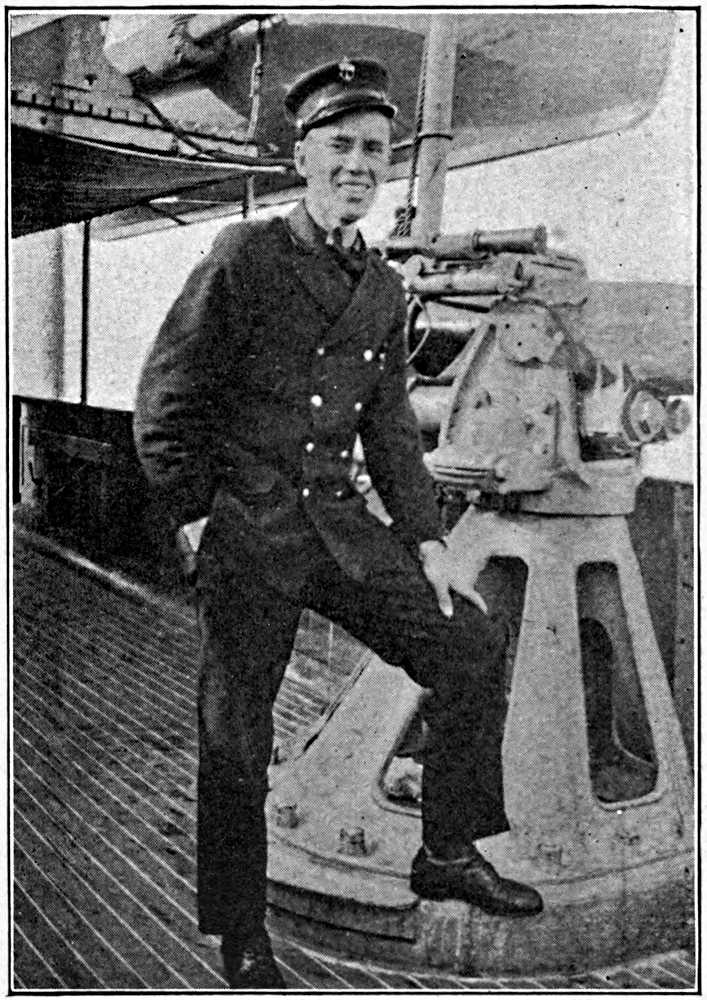
H. A. BRECKEL, CHIEF RADIO OPERATOR
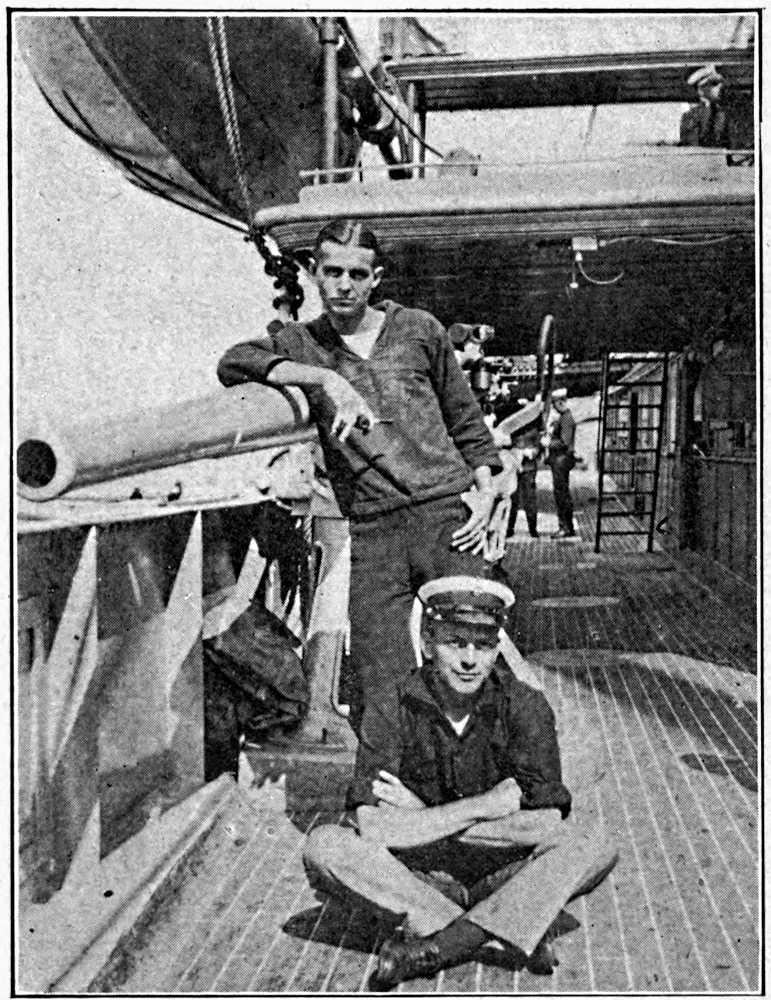
ELECTRICIANS SWAN AND PLUMMER, OF THE HIGHLY EFFICIENT “RADIO GANG”
My first step was to make sure of a personnel which would furnish efficient service under all conditions. Four operators were necessary and this number was soon sent to the ship, and a better group of men could not have been found in any vessel. The radio force comprised:
Ensign Gray, U.S.N.R.F. (Radio Officer)
Harry F. Breckel, U.S.N. (Chief Electrician, Radio)
James A. Plummer, U.S.N.R.F. (Electrician, 1st Class, Radio)
Meriam H. Swan, U.S.N.R.F. (Electrician, 2nd Class, Radio)
Ivan E. Davis, U.S.N. (Electrician, 2nd Class, Radio)
Each man was given a thorough examination when he reported on board and the results indicated that all of them were proficient and reliable operators. We promptly set to work and the radio-room fairly hummed, day and night. The transmitting apparatus was inspected, calibrated to the proper wave lengths, and tested. The receiving apparatus was also overhauled, minor repairs made, and adjusted to receive the various wave lengths used by other U.S. naval vessels. Then the inspection included the various switch-boards, storage batteries, heating and lighting systems, motor generators, etc.
The radio-room was located on the main deck with doors opening directly on deck, so it was necessary to devise a lighting circuit which should automatically switch off the lamps when the doors were opened, as the ship moved in total darkness. After stocking up with spare parts, the antenna was given careful attention, for nothing is more exasperating than to have[Pg 258] your wires carry away and to have to replace them in heavy weather.
During a trial run in Long Island Sound, the radio installation was tested under normal conditions of service and was found to be in first class shape. The very fine type of apparatus aboard the Corsair made only a few changes necessary in order to make it conform with the standards of the Navy. We operators were fortunate in stepping into a radio-room so efficiently and completely furnished. There was a large desk with space for the Radio Officer in his work of coding and decoding despatches, a bookshelf, several chairs, a large wall settee which I used as a bunk, and a safe in which were kept the code books, ciphers, and other confidential material. With regard to comfort, there was no better “radio shack” aboard any ship of the Navy.
There was steam heat and running water which was cold, but we discovered that we could obtain hot water for scrubbing clothes, paint-work, etc., from the steam radiator. I ask you, fellow “Sparks” and “ex-Sparks” of the Navy, can you picture such comfort and convenience in a real, honest-to-goodness man-of-war? And it all helped to maintain good service. Our gang also had a percolator along with the necessary watts from the ship’s generator, and the outfit could turn out a brew of “boiler compound” that would keep a Mississippi colored gentleman with the hook-worm wide awake. We surely had a home on board the old Corsair!
At last, on that memorable 14th of June the ship pointed her bow to the eastward and steamed slowly down the Bay, with the dreary moans of fog-horns for farewell, and no cheers or blaring bands or fluttering flags. In the radio-room there was very little to[Pg 259] do as we had been instructed to keep communication down to the minimum, for the enemy might infer from the amount of radio traffic in the air that some unusual movement was under way, or he might plot the exact positions by means of a direction-finder or radio compass. At the beginning of the war, naval vessels had a characteristic “spark” or “tone” quite different from the average commercial or naval shore stations, and an operator familiar with these variations could readily tell which was which. It was easy to understand why the troop convoys were kept as silent as possible.
For several days there was little radio work besides copying the Time and Weather reports which were broadcasted from the Arlington station, and intercepting for the skipper’s information all radio traffic heard by the operator on watch. In mid-ocean almost nothing was heard because we were out of range of the ordinary “spark stations,” but our “long wave” receiver, constructed by our own force, had no trouble in copying messages from such stations as Darien (Canal Zone), Tuckerton, New Jersey, Boston, and other high-powered naval radio stations while the Corsair was half way across the Atlantic. It was excellent work when you consider the fact that the special apparatus and “hook up” used were of the simplest type and that an amateur Audion detector bulb was employed.
When about five days out, the real job began. The Corsair was called by the flagship Seattle and a long code message received by the operator on watch. The apparatus functioned perfectly and there was every reason to believe that very little trouble, barring accidents, would be encountered. Soon we received orders to get in touch with the Birmingham, flagship of the second division of the convoy and to forward a message[Pg 260] to her. After joining the second division, there was absolute silence for several days, and no radio signals were heard at all until we drew near to the coast of France and the edge of the war zone. Then traffic began to be heavy and the operators were busy copying messages into the “intercepted log book” almost every minute of the day and night.
This log was of great value to the captain, for the radio station of a fighting ship is an information bureau which maintains intimate touch with events occurring in other areas. In these days a man-of-war without a radio-room would be almost deaf, dumb, and blind. We knew that we were actually in the war when the distress calls from sinking ships or those which were under attack by submarines began to come hurtling through the air. This in itself was enough to prove the priceless value of the radio in saving life. For some time I kept a chart upon which were plotted all the positions of vessels which transmitted radio calls for help, but within two months so many of these calls had been received that I had little space left in which to record the new ones.
A typical distress call would come in like this:
SOS SOS SOS 48° 12′ North, 12° 00′ West. Torpedoed Sinking. S.S. John Luckenbach 1025.
When a submarine was sighted by an Allied vessel, a simple form of position report was broadcasted by the operator at once, as follows:
Allo (French for Hello) 49° 15′ N. 09° 06′ W. 0815 MXA.
The radio operator continued to broadcast these signals until an acknowledgment was received from one of the larger, more powerful coastal radio stations which immediately broadcasted the message on high power to all ships and stations for their information.[Pg 261] The radio operators on vessels at sea which received this general warning would at once notify the captain who could thereby avoid the dangerous locality or proceed to the aid of the ship in distress.
After we had arrived at Saint-Nazaire the work of the radio-room did not cease, for we kept a continuous watch, intercepting every message of importance which we were able to copy. When the Corsair was ordered to proceed to Brest, it was necessary to observe the regulation which required all vessels desiring to enter that port to transmit by radio a special form of message, addressed to the port authorities, requesting permission. Failure to do so would have risked bombardment by the shore batteries. The reply from Brest stated whether or not the channel was clear of mines and enemy submarines.
The radio shore station at Brest was about five miles from the American naval base and was an old type, low frequency installation. The “spark” at the time of our arrival was very difficult to read through atmospheric electrical disturbances, and did not have sufficient range. However, after the American base was permanently organized, a modern installation replaced the old one and American naval operators were placed on duty to handle all radio traffic that concerned our naval and other shipping. This was a great improvement over the early method of letting the French operators handle it.
When the Corsair went out on patrol duty, the radio force caught many distress calls and submarine warnings, and the information enabled the ship to render aid on several occasions. In working with the Aphrodite when we covered adjoining patrol areas, the captains were able to exchange information concerning new situations to be dealt with and to operate in concert.[Pg 262] The messages intercepted from the British radio station at Lands End were particularly useful and the operators kept a sharp lookout for them. At least one crew of survivors of a French fishing vessel was rescued by the Corsair because of a message intercepted from this coastal station.
In the later duty on escort with the convoys, the amount of traffic handled by the radio force was largely increased. Because of difficulties unforeseen, such as stormy weather, break-downs, etc., it was rarely that a convoy was sighted in the exact position designated. The radio enabled the escort commander to ask the convoy for definite information as to location, course, direction, and speed. It also kept the convoys clear of the enemy mine-fields. I recall an instance when the Corsair put into Penzance. The day before sailing from that port the radio operator on duty intercepted a message from the French high-powered station at Nantes, stating that the entrance to Brest had been mined by German submarines and that all ships were forbidden to approach. The Corsair thereupon waited at Penzance with her convoy until word was received that the Brest channel had been swept clear.
The severest test for the radio personnel came in December, 1917, when a hurricane almost finished the yacht. Early in the storm it was almost impossible for the operator on watch to stay in his chair although it was screwed to the deck. The climax came in the dead of night when a terrific sea struck the Corsair on the port side, stove in bulkheads, and lifted the hatch over the radio-room clear of the deck and allowed about a ton of icy sea water to pour in. The operator was half-drowned, as well as the whole installation, and the apparatus was rendered useless for the time. As the seas got worse, the water forced itself into the radio-room [Pg 263]through the doors in spite of the fact that every crack was calked as tightly as possible. More than a foot of water piled up on the floor and there was no system of drainage, so every time the vessel rolled or pitched it all swashed up at one side of the room or the other.
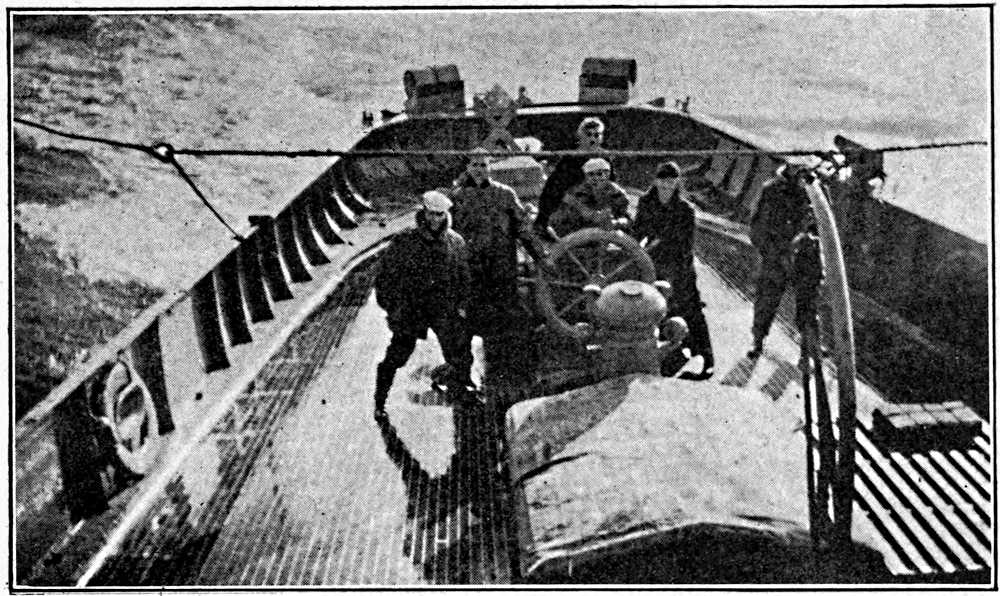
AT THE EMERGENCY WHEEL. HEAVY WEATHER OFFSHORE
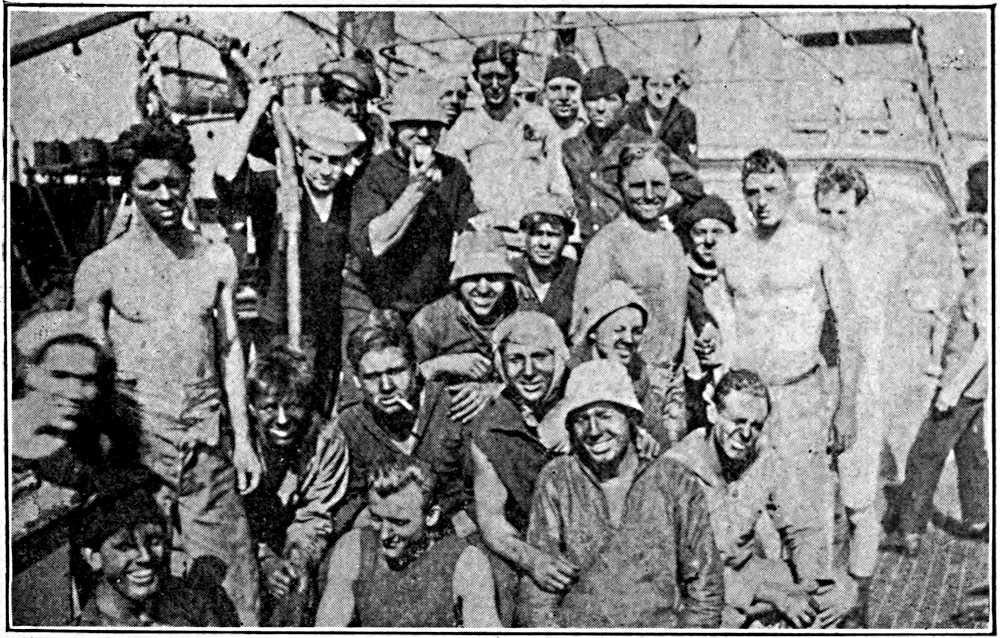
THE TRIM, IMMACULATE NAVY MAN. AFTER COALING SHIP
About this time the depth charges washed overboard and I can tell you that the “Sparks” on board the Corsair were sure they were up against a big proposition. Here we were, with the entire receiver swimming in water, the transmitting panel splashed with it, the motor generator submerged most of the time, our lead-in insulator and lead-in frequently grounded by the huge waves which swept clear over us, and yet facing a probable order from the skipper to send out a distress call. We were all soaked to the skin, impossible to brew any Java to warm us up, and all the time working hard to get the apparatus back into shape.
I gave up the receiver as hopeless and tried to clear the grounds on the motor generator while the rest of the gang tried to bale out the water, but the ocean came in faster than they could scoop it out. However, we managed to keep the water below the level of the commutator and the collector rings of the motor generator, and after clearing some of the worst grounds, during which the toilers were most beautifully “jolted,” we gave the transmitter a short test and it worked fairly well, considering the circumstances. Then I made my way up to the boat deck and between seas managed to clean a layer of salt off the lead-in insulator and gave it a heavy coat of oil.
Plummer and the rest of the gang were drying the various switches and other parts of the transmitter and we managed to fix things so that an S.O.S. could have been sent out. And all hands thought it was about[Pg 264] time to shoot it. The deck force succeeded in nailing up some doors and canvas along the weather side of the radio-room, which was all that prevented it from being smashed in. If our bulkheads had gone there would have been no chance of keeping the transmitter in working condition.
When we found refuge at Vigo, a survey of the damage was made. The radio-room was simply a mess, like the rest of the ship, but within eight hours we had the entire installation restored to the best of health and ready for any emergency. Considering the fact that the radio-room had been flooded with sea water for two and a half days, we flattered ourselves that it was mighty speedy work.
During the long stay at Lisbon for repairs, we made a thorough overhauling of the radio equipment but had no traffic to handle excepting the press news from the Eiffel Tower which we copied for the crew and for the American Legation. Our visit at Lisbon will always be remembered as a very happy one. The people were most hospitable and seemed to enjoy entertaining the bluejackets. The radio-room was still in communication with Brest, 850 miles distant, but there was no occasion for talking with the base station.
The work of the radio force while on escort duty, after we returned to France, was much like that of the earlier cruises. It made us proud to receive a letter of commendation from Admiral Wilson for forwarding a message intercepted from the Seattle. I was sorry when, for a time, I was transferred to shore duty with the District Commander at Cherbourg and had to leave the radio-room of the Corsair. Plummer, my right-hand man, was left in charge of the situation. Shortly before the yacht sailed to the United States, I was lucky enough to make a little visit aboard. Nothing[Pg 265] would have pleased me more than a chance to make the homeward bound voyage with the old crowd.
When the Corsair went to France, she had as fine a crew of men as were ever assembled on a deck. The radio force, with whom I worked and lived, got on splendidly together and made a record of successful operation which, I feel sure, compared favorably with that of any other naval vessel engaged in similar duties and laboring under the same kind of difficulties.
[Pg 266]
Although foreshadowed by rumor and report, the news of the armistice which meant the end of the war came as a certain shock to the ships and sailors on the French coast. It was curiously difficult to realize, because long service had made the hard routine a matter of habit and the mind had adjusted itself to the feeling that things were bound to go on as they were for an indefinite period. The old life, as it had been lived in the days of peace, seemed vaguely remote and discarded, and the Navy thought only of guarding convoys and hunting submarines, world without end. Then, at a word, on November 11, 1918, the great game was finished, the U-boats turned sullenly in the direction of their own bases to harry the seas no more as outlaws, and the darkened transports and cargo steamers ran without fear, the cabin windows ablaze with light.
It was this which most impressed the crews of the yachts and destroyers, that they would steer no more shrouded courses and dice with the peril of collision while they zigzagged among the huge ships that threatened to stamp them under, or dodged to find the rendezvous where the routes of traffic crossed and the nights were black and menacing.[Pg 267] More by instinct than by sight, the Navy had learned to feel its way in the dark, and it was actually true that the ocean seemed unfamiliar when the running lights shone again and the almost forgotten rules of the road had to be observed.
The job was finished. Two million soldiers were in France to testify that the Navy had done its share. And now, as soon as the sense of bewilderment lifted, with one common impulse all hands of this battered, intrepid fleet that flew the Stars and Stripes talked and dreamed of going home. There was nothing else to it. All the sundered ties and yearnings awoke and the faces of these young sailors were turned westward, toward Sandy Hook instead of the roadstead of Brest and the fairway of the Gironde. Every wife and sweetheart was tugging at the other end of the long tow-rope.
The Corsair went to sea for her last convoy cruise on October 24th. Returning from this errand, she was ordered to Bordeaux and was moored there until November 10th for necessary repair work. On the day of the armistice she dropped down the river to Royan and the log-book makes no mention of one of the greatest events in the history of mankind, excepting this entry in the “Communication Record,” as a signal sent from shore by the Port Officer:
Have you any colors you can lend the French balloon station to-day?
In the sailors’ diaries there was one brief note,[Pg 268] but it concerned itself also with a mishap to the beef stew served on that day, as a matter of importance:
Armistice signed. Great stuff. Found a cockroach in the mulligan. Could you beat it?
From Royan the Corsair moved to Verdon, and there received orders on November 13th to proceed to sea and intercept incoming ships, warning them how to keep clear of mine-fields and instructing them as to destinations. The yacht went out, but received a radio next day from the District Commander, telling her to return to Pauillac. Another message set the crew to wondering:
Corsair detached from this District and will go to Brest. State requirements.
As soon as he could get ashore, at midnight, Commander Porter used the telephone to Rochefort and was informed by the District Commander that the Corsair “had a fine job ahead of her,” but here the information stopped. This was just enough to set everybody guessing wildly and once more “the scuttle-butt was full of rumors.” Pursuant to instructions the Corsair promptly took on supplies and sailed for Brest, arriving on November 16th. There the other yachts were all astir with the expectation of flying their homeward-bound pennants. They were soon to set out on the blithe voyage across the Atlantic, by way of the Azores and Bermuda—the first division comprising the Vidette, [Pg 269]Corona, Sultana, Emiline, and Nokomis; in the second division the Christabel, May, Remlik, and Wanderer, veterans of the coastal convoy routes and the wild weather offshore.
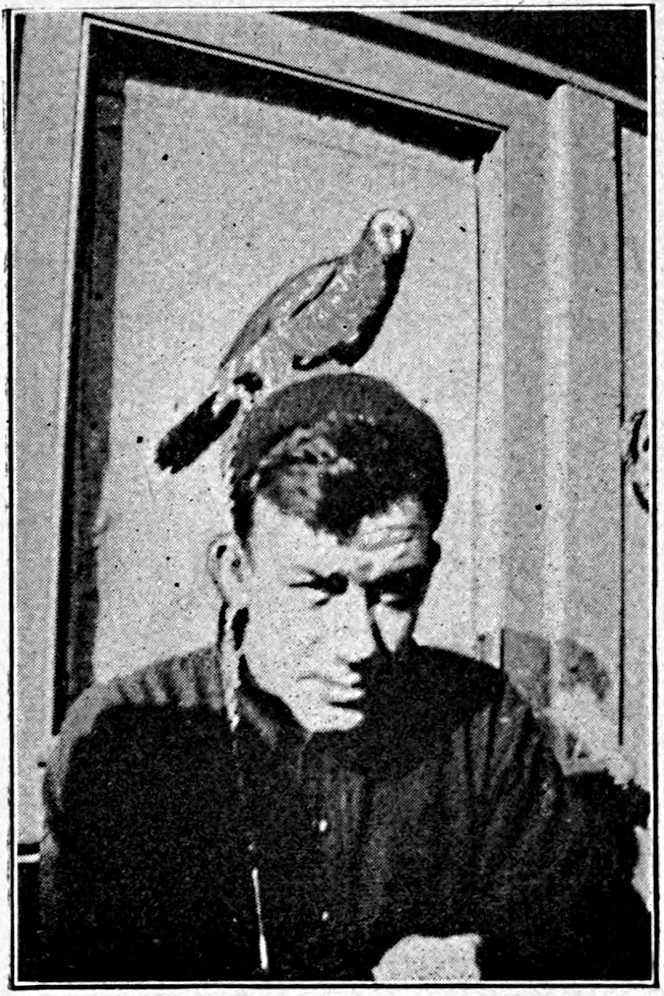
BOATSWAIN’S MATE FRENCH BOUGHT A PET PARROT IN LISBON
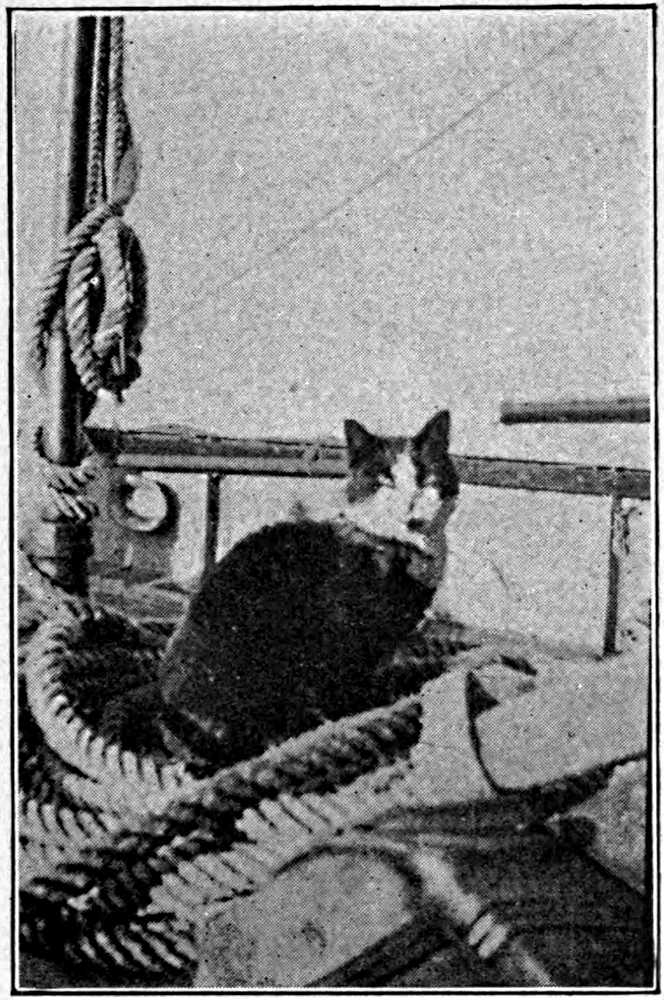
“TOMMY,” THE SHIP’S CAT, WHO FINISHED STRONG IN THE HURRICANE
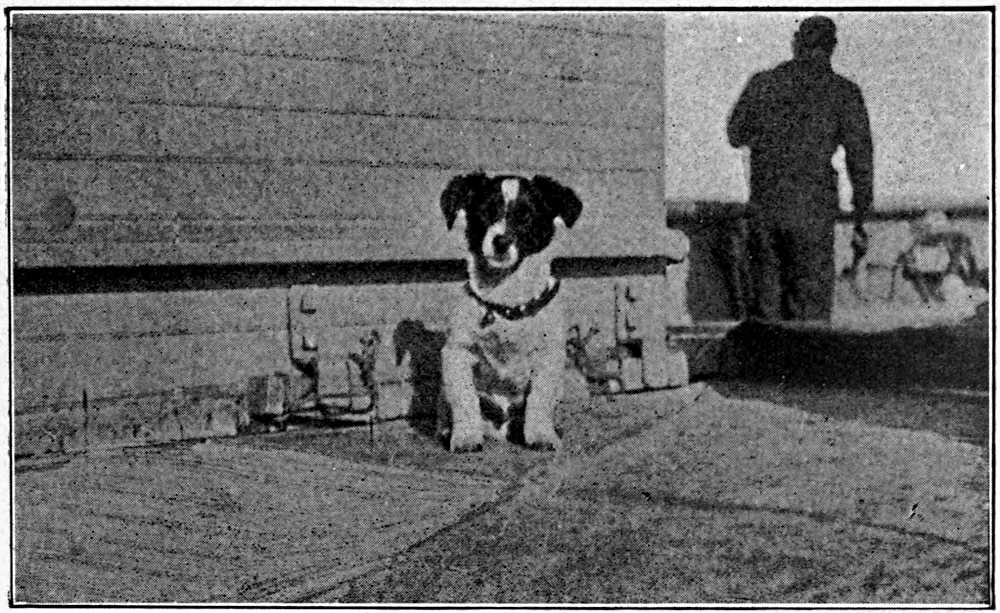
“TEDDY,” WHO WAS GIVEN A MILITARY FUNERAL WHEN HE SWALLOWED A NAIL
It was decreed otherwise for the Corsair and she was to remain six months longer in foreign waters, thereby rounding out a service of almost two years as a naval vessel. Captain John Halligan, chief of staff to Admiral Wilson, was kind enough to end the suspense and vouchsafe the information that the Corsair would go to England and hoist the flag of Rear Admiral S. S. Robison who was about to sail for Kiel to inspect what was left of the German Navy. This was a highly interesting assignment and the Corsair was envied by the other ships. In order to make her fit to serve as a flagship the depleted stock of china, linen, and silver was replaced, after persuasive arguments with the naval storekeeper at Brest. Several officers were detached at this time, which made room on board for an admiral’s staff. These were Ensign J. W. McCoy, Lieutenant S. K. Hall (J.G.), Lieutenant C. R. Smith (J.G.), Lieutenant R. V. Dolan (J.G.), and Ensign A. V. Mason, Assistant Engineer. The new arrivals in the war-room were Ensign E. F. O’Shea and Lieutenant E. B. Erickson, Assistant Paymaster.
On November 18th the Corsair sailed from Brest with the expectation of acting as the flagship representing the United States in the surrender and[Pg 270] internment of the naval forces of Imperial Germany. As passengers she carried to England Captain E. P. Jessop, U.S.N., and Commander C. T. Hutchins, Jr., who had been commissioned to examine the German submarines. The orders included a stop at Saint Helens, Isle of Wight, for routing instructions. There the Corsair was told to seek further information from the patrol off Folkstone. War restrictions concerning war channels, mine-fields, pilotage, and closed ports were still in force.
Commander Porter jogged along until Folkstone was reached in the evening, and was there informed that there was no patrol, but that the channel was clear to Dover. A fog came down thick while the Corsair waited off Dover Breakwater for a pilot, but none appeared, so she went on her way through the Strait and past the Goodwin Sands, pausing to inquire at the North Gull light-ship if anybody had seen a Thames pilot thereabouts. Deal was suggested as a good place to look, so the Corsair returned and anchored there at midnight. No pilot could be found, however, so at five o’clock in the morning the skipper hove up his mud-hook and “trailed along” as he said, with some ships that were bound to the northward.
The pace was too slow to suit him, so he joined company with another group of vessels ahead and discovered, a little later, that they were mine-sweepers engaged in clearing the channel. This was considered a fairly good joke on the skipper. He[Pg 271] said good-bye to this dangerous flotilla and steamed along alone, anchoring twice in a fog that was like a wool blanket, and fetched up for the night eight miles below Sheerness.
Asking permission of the patrol next morning to proceed up the Thames to Gravesend, the Corsair learned that her destination had been changed to Sheerness. Here she met with a disappointment. The cruiser Chester arrived unexpectedly and was selected as the flagship of Rear Admiral Robison, as was quite proper. It’s an ill wind that blows nobody good, however, and just after starting north for Rosyth and the Grand Fleet, the Chester was compelled to return with machinery disabled. The Corsair was ordered to proceed to Scotland in place of the cruiser and she left the Thames on November 30th to steam up into the gray North Sea, and the great war base near Edinburgh.
It was fondly believed on board that the yacht would be employed to take the American admiral across to visit the German naval ports, but they found him in the British battleship Hercules with the other admirals of the Allied naval commission, and they all sailed next day in this big ship for Kiel. This was rather hard medicine for the Corsair, to be disappointed again after singing for so long in hearty chorus that on the Kiel Canal they’d float and likewise knock the hell out of Heligoland, and now they were deprived of a sight of these notorious nests of the enemy’s warships.
[Pg 272]
It was something to remember, however, this visit to the North Sea and a sojourn with the grim squadrons of Admiral Sir David Beatty which had, through four weary, vigilant years held the German High Sea Fleet in check and made safe the surface of the seas for the shipping of the world.
The Corsair dropped anchor at Rosyth on the day that the American battleship division sailed for home, the first-class fighting ships of Rear Admiral Hugh Rodman which had shared the vigil at Scapa Flow in the gloomy Orkneys and had earned that farewell tribute which Admiral Beatty paid the American officers and men when he called them his “comrades of the mist.” A storm of British cheers bade a fare-you-well to the New York and her sister ships as their flag hoists and semaphores and blinkers talked for the last time in the British signal code, which they had used because they were, not an independent American squadron, but the Sixth Battle Division of the Grand Fleet and gladly operating as such.
The Corsair’s crew had seen much of the French Navy on active service, but this was the first opportunity for intimate contact with British ships and sailors. They found a spirit of cordial welcome and there was a pleasant interchange of calls, of entertainment on shipboard, motion-picture shows, and inspection of the mighty fighting craft which bore the scars of Jutland. Shore liberty at Edinburgh was a most interesting diversion, and the American[Pg 273] sailors found that the Scotch people were fond of them and proud of the record for behavior left by the thousands of their comrades who had landed from Admiral Rodman’s battleships.
After twelve days in the Firth of Forth, the Corsair was relieved by the Chester and received orders to report at Portland, England. During the voyage north, Commander Porter had navigated through four hundred miles of swept war channels where the abundance of German mines was presumed to require the most ticklish care. The cleared passages were strewn with wrecks and most British merchantmen were anchoring at night. The Corsair had picked her way, not in a reckless spirit, but because she was due to reach her destination at a specified time and it was the habit of the ship to arrive when she was expected. While returning south to Portland, a pilot was taken on at Yarmouth and casual reference was made to the fact that the yacht had chosen the north channel into the mouth of the Thames while coming over from France.
“My word, but you are lucky beggars!” exclaimed the ruddy pilot. “You should have gone in by the south channel, you know. The other one is a bloomin’ muck o’ mines that ain’t been swept. You couldn’t wait a week for a bally pilot, eh? The sportin’ chance! I fancy it’s the proper spirit in a navy, what?”
At Portland the Corsair found the U.S.S. Bushnell[Pg 274] which had served as the mother ship of the American submarine flotilla in Bantry Bay. With her waited five mine-sweepers and five submarine chasers all ready and anxious to sail for home. The yachts Harvard and Aphrodite had come over from Brest and were attached to the North Sea patrol. Later in the winter they were sent to Germany. The Aphrodite hit a mine en route, but luckily its action was delayed and, although damaged, she was able to make port. What aroused eager interest at Portland was a group of five German submarines, moored close to the Bushnell, which comprised an installment of the surrendered fleet of U-boats. Their frightfulness was done. Meekly they had crossed the North Sea, at the bidding of the victors, to be tied up all in a row as a rare show for the jeering comment of British and American bluejackets.
To the sailors of the Corsair it was fascinating to inspect and investigate these uncouth sea monsters which they had hunted and bombed with no more mercy than if they had been vermin. Instead of winning the war for Germany, they had turned the tide against her by arousing the United States to launch its armed forces in the cause of the Allies. And they had branded the German name with infamy and reddened German hands with the blood of thousands of slain seamen.
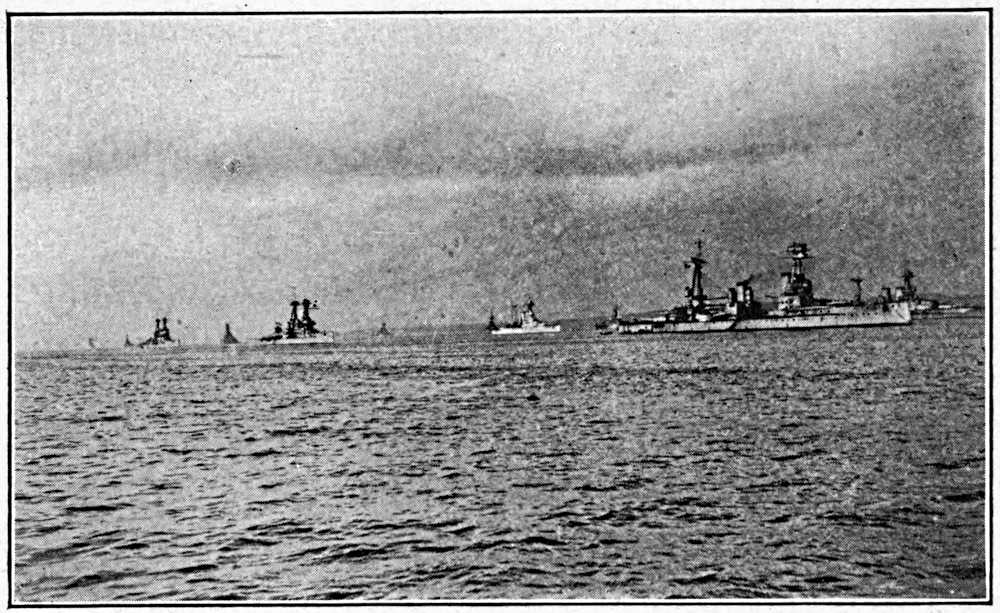
WITH THE GRAND FLEET AT ROSYTH
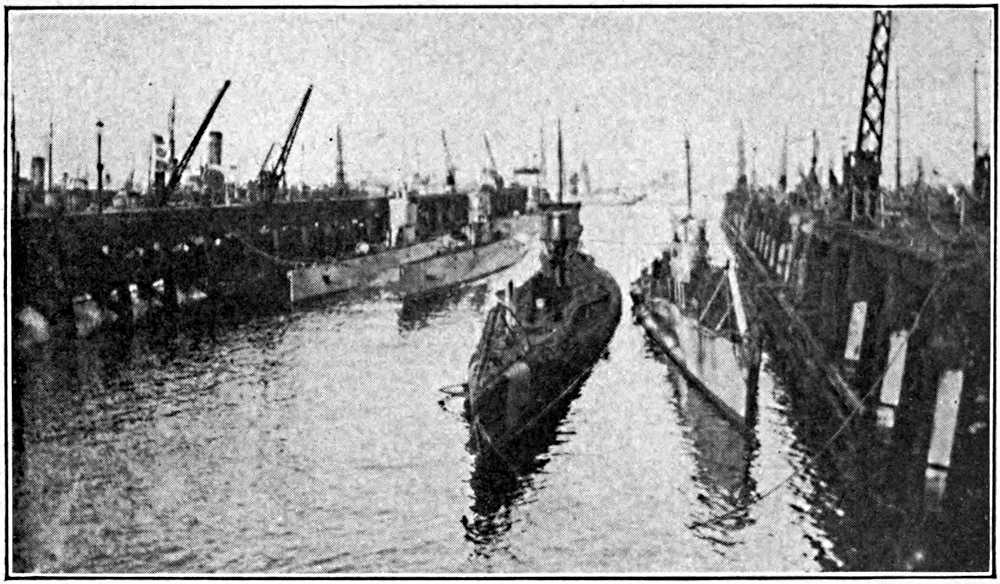
SURRENDERED GERMAN SUBMARINES TIED UP AT PORTLAND TWO AMERICAN SUBMARINES ARE WITH THEM
Christmas Day of 1918 was spent in this English harbor of Portland and the occasion was not as joyous [Pg 275]as might have been, although the Corsair’s log of December 24th contained this entry:
Received the following general stores: 118 lbs. geese, 23 lbs. ducks, 12 bunches celery, 100 lbs. cauliflower, 50 lbs. Brussels sprouts, 85 lbs. beets, 700 lbs. bread, 5040 lbs. potatoes.
The home-made poetry inspired by this Christmas in exile seemed to lack the punch of former ballads as sung by the bluejackets’ glee club. One of the productions went like this, with a perceptible tinge of pathos:
On the day after this rather subdued Christmas, the Corsair was informed of her destination, which was Queenstown, Ireland, and her mission was to relieve the U.S.S. Melville as the flagship of Admiral Sims, Commanding the U.S. Naval Forces in European Waters. The Melville, the last word in naval construction as a repair and supply ship, had been nominally the flagship during the service of the destroyer flotillas at Queenstown, although the official headquarters and residence of Admiral Sims were in London. During this time the Melville had quartered Captain J. R. P. Pringle, the American chief of staff and his organization which coöperated with the British Admiral Sir Lewis Bayly in maintaining and directing the destroyer force.
The elaborate and smoothly running machine of operation, supply, equipment, and personnel had come to a halt with the armistice. The destroyers had fled homeward. The barracks and dépôts for[Pg 277] material at Passage, a little way up the river, had been almost emptied, and the great naval aviation base on the other side of Queenstown Harbor was like a deserted city. All that remained was what Admiral Bayly called the job of “cleaning up the mess.” For this the American chief of staff was required to linger on the scene, but it was decided to send the Melville home and the Corsair was elected to take the place, or, as her men said, “it was wished on her.”
On December 27th the yacht tied up alongside the Melville in Queenstown Harbor, and three days later Captain Pringle and his staff transferred their offices and living quarters. This group of officers comprised Commander A. P. Fairfield, Lieutenant Commander D. B. Wainwright (Pay Corps), Lieutenant A. C. Davis, Ensign W. B. Feagle. Soon the Corsair was alone as the only American naval vessel in this port which had swarmed with the keen activity of scores of destroyers and thousands of bluejackets. To build up this force and keep it going at top speed had been an enormous task, but it was no slight undertaking to pull it down again. Winter rains and sodden skies made Queenstown even drearier than when the liberty parties of destroyer men had piled ashore to fill the American Sailors’ Club, or surge madly around and around in the roller-skating rink, or live in hope of cracking the head of a Sinn Feiner as the most zestful pastime that could be offered.
[Pg 278]
Dashing young destroyer officers no longer lingered a little in the pub of the Queen’s Hotel for a smile from a rosy barmaid with the gift of the blarney, and a farewell toast before going to sea again, while the Royal Cork Yacht Club, down by the landing pier, seemed almost forlorn without the sociable evenings when American and British naval officers had swapped yarns of the day’s work and talked the “hush stuff” about mystery ships and U-boats that would never see their own ports again.
High up the steep hillside, the White Ensign flew from the mast in front of Admiral House, and Admiral Sir Lewis Bayly, austere, efficient, but very human, one of the ablest officers of the British Navy, still toiled at his desk or puttered among his flower gardens in the rare hours of leisure, but his occupation as Commander-in-Chief of the Coasts of Ireland was mostly in the past tense. Soon he was to retire, with the stripes of a full admiral on his sleeve and a long list of distinctions following his name, Knight Commander of the Bath, Companion of the Victorian Order, the Legion of Honor of France; but more than these he valued the friendship and high respect of the American naval force at Queenstown, memorable because it was here that, for the first time, the British and the American navies had worked and dared as one, salty brothers-in-arms, to conquer the sea and make it safe against a mutual foe.
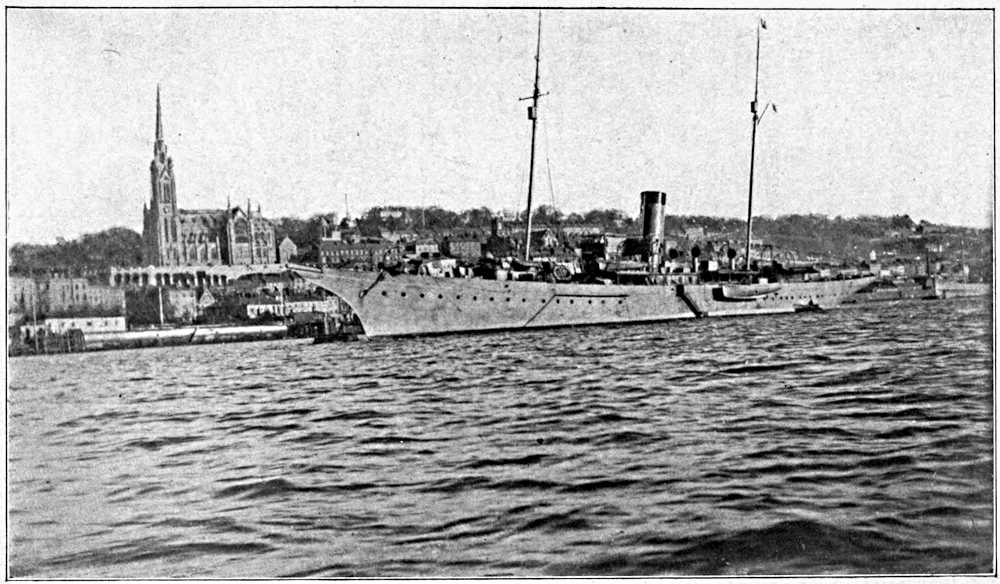
THE CORSAIR AT QUEENSTOWN, AS FLAGSHIP OF ADMIRAL SIMS
[Pg 279]
All of this the Corsair perceived in retrospect while Captain Pringle finished his fine record of service by disposing of all the odds and ends of work demanded of him before the Stars and Stripes could be hauled down and Queenstown finally abandoned as a base. As soon as the Corsair arrived in port, opportunity was offered the Reserve officers and men to quit the ship and go home, instead of detaining them longer on foreign service. Three officers and thirty men took advantage of the chance and felt, fairly enough, that the war was over and the call of duty no longer imperative. Other officers came to the ship in their places—A. T. Agnew, Assistant Surgeon, who had joined at Rosyth, Ensign C. R. Bloomer, Boatswain A. R. Beach, and Boatswain H. W. Honeck.
It was a long and tedious duty, lasting almost three months, this serving as the flagship at Queenstown, but he also serves who only stands and waits, and this was true of the Corsair. The aftermath of the war was mostly drudgery, with all the fiery incentive and thrilling stimulus removed, but the need was just as urgent and the Navy responded, displaying the spirit which was best exemplified by Rear Admiral Strauss and his mine-laying fleet which placed a barrier of forty thousand mines across the upper end of the North Sea and then manfully, uncomplainingly, spent a whole year in sweeping them up again.
One pleasant souvenir of the stay at Queenstown[Pg 280] was a copy of the following letter from Admiral Sir Lewis Bayly:
The Captain of the Dockyard has informed me that valuable assistance was given by officers and men of the U.S. Navy in extinguishing the fire in the Dockyard yesterday, Tuesday. I desire to thank you very much for the assistance so smartly and ably given.
On March 20th the Corsair left Queenstown for Spithead and Cowes to meet a number of large German merchant ships and, as the flagship of Admiral Sims, represent the United States in the business of transfer to the American flag, as provided in the terms of the armistice. The departure from Ireland caused no heart-breaking regrets, although many congenial friendships had been formed ashore. For weeks the crew had been more interested in sewing stitches in the homeward-bound pennant than in any attractions that foreign ports could afford. Rumor had been misleading as usual, and hopes often deferred.
At Cowes the Corsair found four American destroyers, the Woolsey, Lea, Yarnell, and Tarbell, and the naval tug Gypsum Queen which had been sent to do the work in hand. Drafts of American sailors had been brought from Brest, La Pallice, Queenstown, and English ports to man the German liners after their own crews had been taken out of them. Commander T. G. Ellyson, U.S.N., acted as the representative of Admiral Sims and was in charge of the transfer. While at Cowes he lived on[Pg 281] board the Corsair, with his staff. The London Times described the episode as follows:
During the last few days a number of German merchant ships which have been surrendered to the Allies under the Armistice conditions have arrived at Cowes roadstead. The Hamburg-American liners Cleveland and Patricia were the first to arrive, and they were followed by the Cap Finisterre, the Kaiserin Auguste Victoria, the Graf Waldersee, the Zeppelin, and the Kronprinz Friedrich Wilhelm, making seven of the eight expected at this port. The La Plata is expected to arrive in a day or two.
In place of the smart, spick-and-span German merchant sailors of pre-war days, these large vessels, ranging up to 24,500 tons, were mostly manned by motley crews of Germans, many wearing bowler hats and untidy civilian dress. Many of them speak English and in conversation showed that they were familiar with the Solent and local shipping, while others had been to Cowes in Regatta times. One officer stated that he had been there on the ex-Kaiser’s yacht Meteor. These Germans are not allowed ashore but are transferred to the Cap Finisterre, in which they will return to Germany when the La Plata arrives. They have brought their own provisions with them but they have been reprovisioned here.
New crews have been provided for the surrendered ships by the American Navy, representatives of which are superintending the transfer of the crews and the dispersal of the German ships which have left for other ports. The Cleveland, Kronprinz Friedrich Wilhelm, and Pretoria have sailed for Liverpool, the Kaiserin Auguste Victoria and Graf Waldersee for Brest and the Zeppelin for Plymouth. The German ships fly[Pg 282] the blue and white flag of the Inter-Allied Nations and have an American escort, including the armed yacht Corsair, destroyers, submarine chasers, and store-ships.
The North German Lloyd liner Zeppelin, with an American crew on board, arrived at Devonport yesterday. The remainder of the American naval forces at Plymouth will embark on her to-day, and after coaling and taking on stores, the Zeppelin will leave for Brest and the United States.
Up to yesterday twenty-four of the one hundred German vessels allocated to Leith had arrived there. A number of the ships were new; in fact this voyage was their maiden one. When the total is complete, the vessels will form a very handsome addition to the shipping in the port. The conduct of the sailors is said to be satisfactory. There were rumors that there was among the crews of some of the vessels a revolutionary spirit, but these had no foundation. The crews are reported to be eager and willing to do all that is required of them.
The duty of taking part in the distribution of German shipping, in which the naval representatives of the United States were concerned, took the Corsair next to Harwich, the important East Coast base of England, at which the main fleet of German submarines was surrendered to Rear Admiral Sir Reginald Tyrwhitt, R.N. It was at Harwich that the British submarines had rested and refitted between their perilous patrol tours across the North Sea when they stalked the U-boat in a deadly game of hide-and-seek which Fritz lacked the courage to play. The British losses had been heavy, many a [Pg 283]gallant submarine erased from the list as missing with all hands, but the toll of U-boats had been much greater and the results were worth the price they cost.
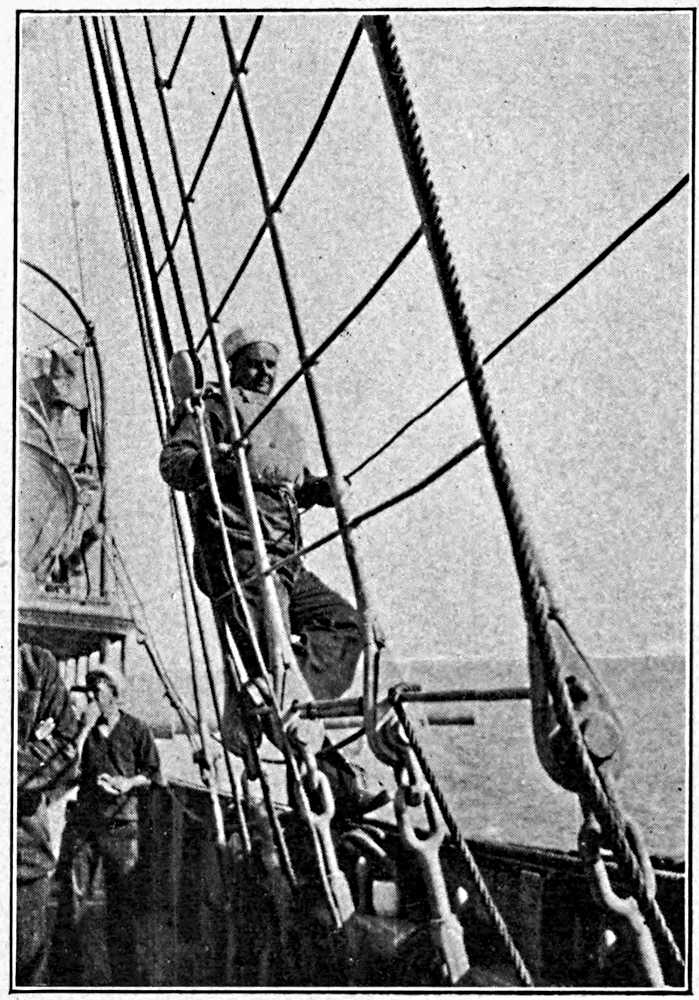
SEAMAN HENRY BARRY, BEFORE THEY WISHED ANOTHER JOB ON HIM
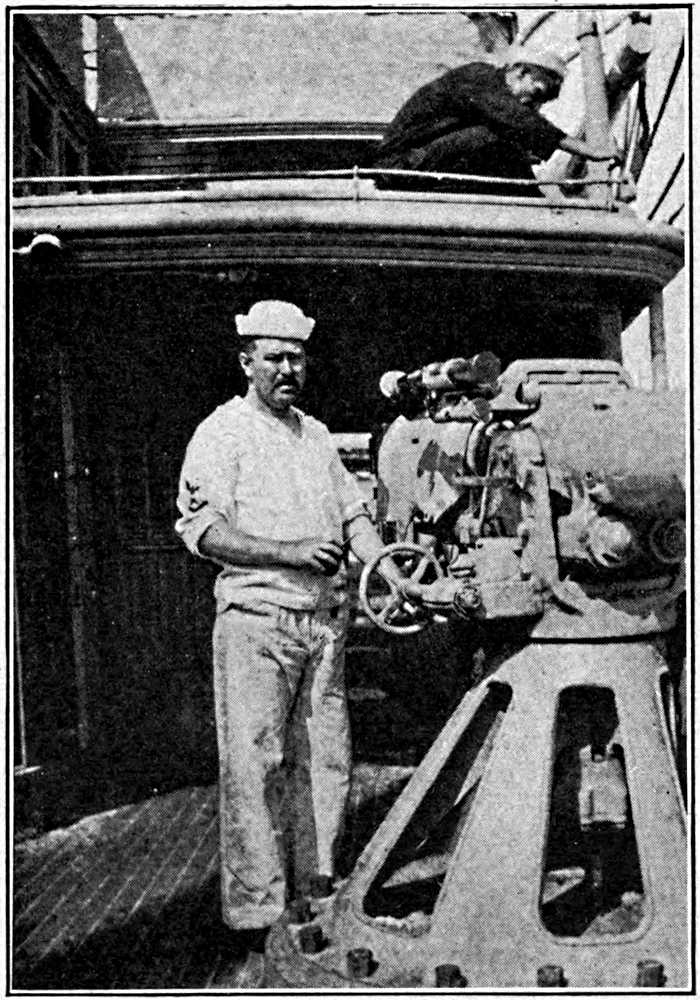
GUNNER’S MATE SIMPSON HOPES TO SPOT THAT SUB
Out of Harwich had dashed that wonderful light cruiser division under Admiral Tyrwhitt, always under two hours’ steaming notice to run north as a tactical unit of the Grand Fleet or to tear at thirty knots for the Strait of Dover to help defend and keep clear the main road to France. And now the cruisers and destroyers and submarines no longer moved restlessly in and out of Harwich Harbor to patrol the North Sea, and Harwich was again a railway terminus on the route to Antwerp and the Hook of Holland. As the American flagship, the Corsair tarried there through part of April before sailing to Southend to execute similar orders and duties. England was green and blooming with the loveliness of its rare springtime, and the men of the lonely American yacht were more than ever absorbed in thoughts of flying that homeward-bound pennant.
At length there came an order from London, transmitted through the cruiser Galveston which was also at Southend, that seemed to promise the Corsair a start on the long road home:
On completion of transfer of stores and quota of draft of the German steamship Brandenburg, you will proceed to Plymouth, England, with the vessel under your command, arranging to arrive in the afternoon of[Pg 284] May 7th. On arrival report to the Commander-in-Chief, U.S. Naval Forces, European Waters, for use of the Secretary of the Navy.
Secretary Daniels and his party were at this time on their way to France and the United States after visiting the Allied naval organizations. The Corsair was designated to carry them from Plymouth to Brest, and the British Admiralty carried out its part of the programme with the most punctilious attention to detail, as is shown in the printed memorandum under “Devonport General Orders” which was signed by Admiral Cecil F. Thursby:
Embarkation of Mr. J. Daniels, Secretary of the U.S. Navy.
U.S. Yacht Corsair and one U.S.T.B.D. will arrive P.M. 7th May and will be berthed as follows,—Corsair alongside Resolution, bows to southward, if possible. T.B.D. alongside No. 1 wharf, unless she requires oil when she will proceed to Orangeleaf and complete with fuel.
The train conveying Mr. Daniels and party will arrive at No. 6 wharf at 0800 on Thursday, 8th May. The Commander-in-Chief will receive Mr. Daniels. The Vice Admiral Commanding First Battle Squadron and staff and the Admiral Superintendent are requested also to be present at the wharf. (Dress No. 5 without swords.)
A working party of three petty officers and twenty men in No. 5 dress, in charge of a warrant officer, is to be provided by Depot, and to be at No. 6 wharf by 0745 to transfer baggage from train to Corsair. As soon as Mr. Daniels and party and all baggage have been[Pg 285] embarked, Corsair will proceed down harbor. Admiral Superintendent is requested to arrange for a tug to be in attendance.
The Corsair arrived punctually at Plymouth and was waiting to obey the foregoing instructions when, at midnight, there came a telegram which quite overshadowed the episode of carrying the Secretary of the Navy, with all due respect to the dignity of his office. The message, for which the yacht had waited so long, came in the form of a smudged carbon copy as sent through the U.S. Naval Post-Office, but in the eyes of those who scanned it the document was beautiful. It read:
U.S.S. Corsair hereby detached duty European Waters. Proceed Brest with Secretary of Navy and report to Admiral Halstead. Load any personnel for which space is available and then proceed New York, touching at Azores if necessary. Transfer any flag records to U.S.S. Chattanooga before leaving Plymouth.
Escorted by the American destroyer Conner, the Corsair made a fast and comfortable run to Brest. The passengers were the Secretary and Mrs. Daniels; Rear Admiral David W. Taylor, Chief of the Bureau of Construction and Repair; Rear Admiral Robert S. Griffin, Chief of the Bureau of Steam Engineering; Rear Admiral Ralph Earle, Chief of the Bureau of Ordnance; Commander Stewart E. Barber, Pay Corps, who was officially attached to the Corsair; Commander Percy W.[Pg 286] Foote, personal aide to the Secretary; and Private Secretary May.
Brest Harbor was a familiar panorama to the few men aboard the Corsair who had shared the toil and excitement of those early months of patrol work offshore, almost a year before. Now, however, the transports were crammed with troops homeward bound, and there was no more convoying the “empty buckets” out of Saint-Nazaire and Bordeaux and Quiberon Bay, nor was there any chance of a brush with the persistent U-boat which had been dubbed “Penmarch Pete.”
The Corsair undertook her good-bye courtesies and ceremonies, one of them a luncheon party on board, at which the guests were Rear Admiral A. S. Halstead who succeeded Admiral Wilson as commander of the naval forces in France; Major General Smedley D. Butler, commanding the embarkation camp at Brest; Vice-Admiral Moreau and Rear Admiral Grout of the French Navy and Mme. Grout; and Commander Robert E. Tod, Director of Public Works at Brest.
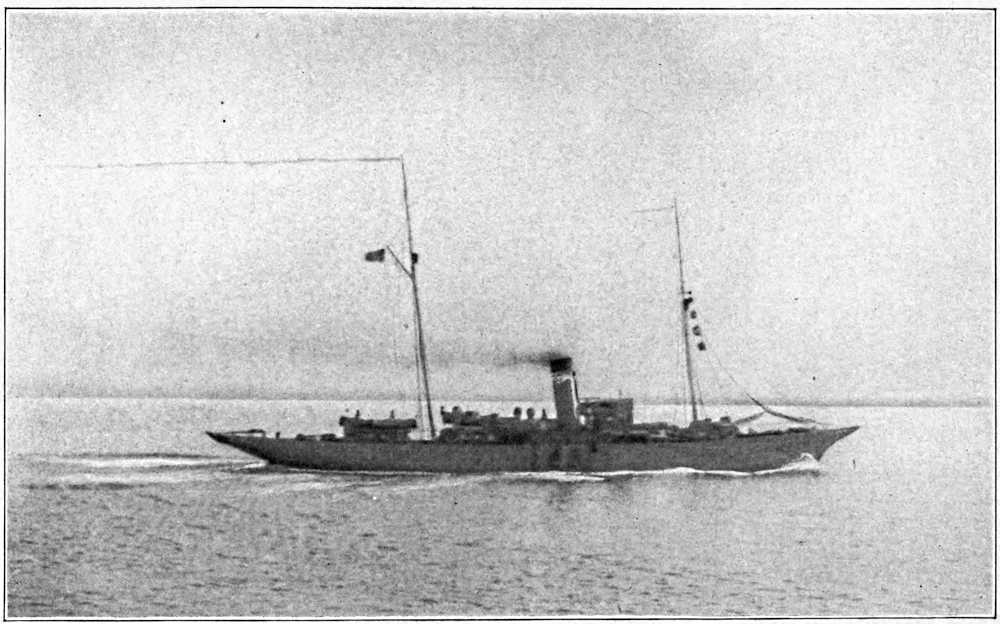
THE HOMEWARD-BOUND PENNANT. “WE’RE OFF FOR LITTLE OLD NEW YORK, THANK GOD”
Not much time was wasted in port. Two days after arriving, on May 10th, the bunkers were filled with coal, and there was precious little cursing over the hard and dirty job which had so often caused the crew to agree that what General Sherman said about war was absurdly inadequate. It was different now. Every shovel and basket of coal meant steam to shove the old boat nearer home. [Pg 287]That homeward-bound pennant trailed jubilantly from the masthead, a silk streamer of red, white, and blue, one hundred and eighty feet long, into whose folds had been fondly stitched the desires, the yearnings, the anticipations of every man in the ship. Only a few of them had stood, with bared heads, on the Corsair’s deck when she had been formally commissioned as a fourth-rate gunboat of the United States Navy in May of 1917, and the bright ensign had whipped in the breeze.
Many of that company had seen service in other ships and some were civilians again, but memory was apt to hark back to the Corsair with a certain affection and regret. And wherever they were to be, these youthful sailors would feel a thrill of pride and kinship at sight of a Navy man and they would kindle to the sentiment:
Lieutenant McGuire, bred to the sea and experienced in ships, thought it over after he came home and wrote these opinions of the Corsair’s company and the work they did:
It was a pleasure to watch how eagerly the boys took hold of their new jobs and how rapidly they became good sailors. For a comrade to stand by in danger, give me first of all a plain, every-day, American gob. He is not so much on the parade stuff, but offer him[Pg 288] a chance to risk his skin or his life for his friend or his flag and he is there every time.
If this war has helped us as a nation in no other way, it has, I believe, taught hundreds of thousands of men the meaning of their country’s flag, taught them to love it as their own, and that to die for it is an honor to be prized.
While the duty abroad was pretty strenuous at times, yet the average American has the faculty of making friends in every port, which helped to pass the few hours at his disposal when not engaged in coaling ship. How we did envy the boys in the oil-burners!
The chief petty officers and petty officers of the American Navy are exceptionally intelligent and proficient in their duties, and on many occasions helped the average Reserve officer over rough places. I also felt great admiration for the officers with whom I served and came in contact, both Regular and Reserve.
[Pg 289]
Of the old crew, the crew which had sailed with Pershing’s First Expeditionary Force, only two officers and eighteen men watched the frowning headlands of Brittany sink into the sea as the Corsair turned her bow to follow the long trail that led to the twin lights of Navesink and the skyline of New York. A day at the Azores for coal and she laid a course for Bermuda and another brief call before straightening out for the last stretch of the journey. On May 28th she steamed into her home port after an absence just a little short of two years. There was no uproarious welcome when the gray Corsair slipped through the Narrows and sought a berth at the Brooklyn Navy Yard. The war had ended more than half a year earlier. It was already an old story, but the ship had done her duty and was content with this.
A few days later she ceased to be enrolled in the United States Navy. There was no ceremonious formality and the documents in the case were exceedingly brief, but they signified the end of a story which had added a worthy page to the annals of American manhood. “Ships are all right. It is the men in them,” said one of Joseph Conrad’s wise old mariners. This was true of the Corsair and the other[Pg 290] yachts of the Breton Patrol. And so the Navy Department spoke the last word in this concise order:
Headquarters of the Third Naval
District, Brooklyn, New York
June 6, 1919
From: Officer in Charge, Material Department.
To: Commanding Officer U.S.S. Corsair, S.P. 159.
Subject: Orders.
Proceed to W. & A. Fletcher Shipyard, Hoboken, N.J., June 9, 1919. Place the vessel out of commission in accordance with orders enclosed herewith, and deliver the vessel to representative of the owner, Mr. J. P. Morgan. Have enclosed receipts in duplicate signed and return to this office.
(Signed) C. L. Arnold,
Captain, U.S.N.
(Enclosure.) The U.S.S. Corsair is hereby placed out of commission, June 9th, 1919.
Her owner surmised that the Corsair had been run to death and worn out in the Bay of Biscay, that she was to be regarded rather as a relic than a yacht; but in this Mr. Morgan was happily disappointed. The staunch ship was still fit to be overhauled and made ready for the peaceful and leisurely service of other days. In her old berth at Fletcher’s Yard she swarmed with artisans instead of bluejackets, and they found many things to be done besides restoring the furniture, fittings, partitions, and so on.
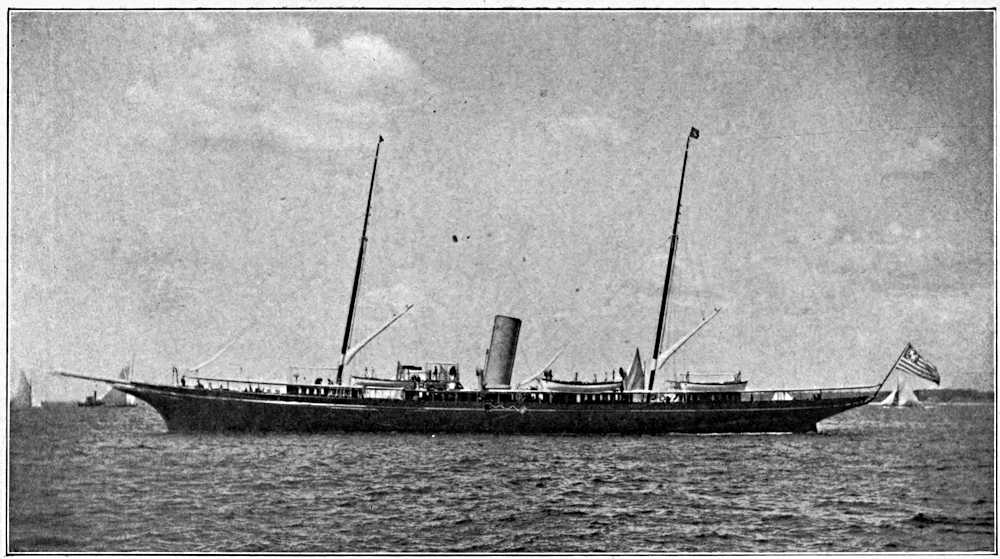
Copyright, 1899, by C. E. Bolles, Brooklyn
THE CORSAIR WHEN IN COMMISSION AS A YACHT BEFORE THE WAR
A stalwart man may tumble down three flights of stairs and escape without a broken neck, but he [Pg 291]is bound to be considerably shaken up. This was painfully the case with a yacht which had been kept going month in and month out, the fires drawn from under her boilers only when she positively declined to make steam enough and was in a mood to protest against such unfair treatment. That December hurricane had been a bruising, almost fatal experience, and the repairs made at Lisbon could not be called final.
As a ship, however, the Corsair had strongly survived the ordeal, and soon she began to resume the semblance of a shapely, sea-going yacht. The graceful bowsprit was restored to the clipper stem, the deck cleared of gun mountings, and the overhang was no longer cluttered with the gear of the depth bombs. Chief Engineer Hutchison returned to his own engine-room, and there was clangor and clatter as gangs of mechanics repaired, replaced, and tuned up machinery which had been driven to the limit of endurance.
The Corsair’s steaming record in foreign service had amounted to 49,983.6 miles from June, 1917, to December, 1918, when she ceased cruising to spend her time in English ports and at Queenstown. The distance, by months, was as follows:
| 1917: | |
| June | 3244.4 miles |
| July | 3358.7 |
| August | 3441.5 |
| September | 3343.7 |
| October | 2994.4 |
| November | 3045.6 |
| December | 557.1 (Engine counter disabled in hurricane)[Pg 292] |
| 1918: | |
| January | 880.9 miles (at Lisbon) |
| February | 2635.8 |
| March | 2519 |
| April | 1279.3 |
| May | 3554.5 |
| June | 3823.8[7] |
| July | 3609.8[7] |
| August | 4300[7] |
| September | 4027[7] |
| October | 1155.7 (Repairs) |
| November | 1030.4 |
| December | 1182 |
On July 31st, less than two months after being placed out of commission as a naval vessel, the Corsair hoisted the Commodore’s flag of the New York Yacht Club. Trim and immaculate, she proceeded to her anchorage at Glen Cove, to await cruising orders. There were differences, however, and the Corsair was not the same as of old. Freshly painted, the hue of her funnel and hull was the gray of the Navy. For a season, at least, the glistening black of her hull was not to be restored. It seemed more fitting, somehow, that in this way she should recall her long service in helping guard the road to France.
Upon her funnel were two service chevrons. The regulations awarded a stripe for the first three months overseas and another for a full year thereafter, until the date of the armistice. The decks were scraped and holystoned and spotless, but where the guns had been there were wooden plugs[Pg 293] to mark the half-circles of the mounts, and the pine planking was scarred where cases of shells had been dragged to be ready for the swift team-work of the agile gun crews. These, too, were marks of honor which it seemed a pity to obliterate. They signified that the Corsair was something more than a yacht.
Another memento and reminder, to be highly regarded by the ship’s company of those stirring days, is a letter from the Commander-in-Chief of the United States Naval Forces in European Waters, who desired that his “well done” should be included in this record. It is placed here by way of “good-bye and fare-ye-well,” as the old chantey sang it. Admiral Sims writes as follows:
Naval War College
Newport, Rhode Island
1 December, 1919
My dear Mr. Paine:
To undertake to write the complete story of any one ship of the American Navy and its experiences in the war zone seems to me a task very well worth while. Needless to say, the work of the yachts and their personnel on the coast of France was splendid, and I am only too glad to have an opportunity to express my appreciation of them.
Because of the shortage of vessels suitable for convoy and escort duty, and the gravely urgent circumstances, the yachts were sent across with little time for preparation or training and with few officers and men of the Regular Navy in their complements. They were an emergency flotilla, but I felt confident that[Pg 294] they would quickly adapt themselves to the arduous conditions of their service in European waters.
What did surprise me was that they were able to weather a winter in the Bay of Biscay and to stay at sea with the convoys when yachts were presumed to be tucked in harbor. This was greatly to the credit of the courage, seamanship, and hardihood of the men who served in them. It was conspicuously true of the Corsair’s encounter with the December hurricane in which she almost foundered, but succeeded in making port at Lisbon. A similar spirit was shown when this vessel stood by the disabled steamer Dagfin and towed her three hundred miles through an area in which enemy submarines were operating.
With a steaming record of 50,000 miles on foreign service, with the unusual number of fourteen enlisted men appointed as commissioned officers, and with repeated commendations from the Force Commander in France, such a yacht served with honor to the flag and the Navy and deserves the verdict of “Well Done, Corsair.”
Very sincerely yours
Wm. S. Sims
Rear Admiral, U.S. Navy
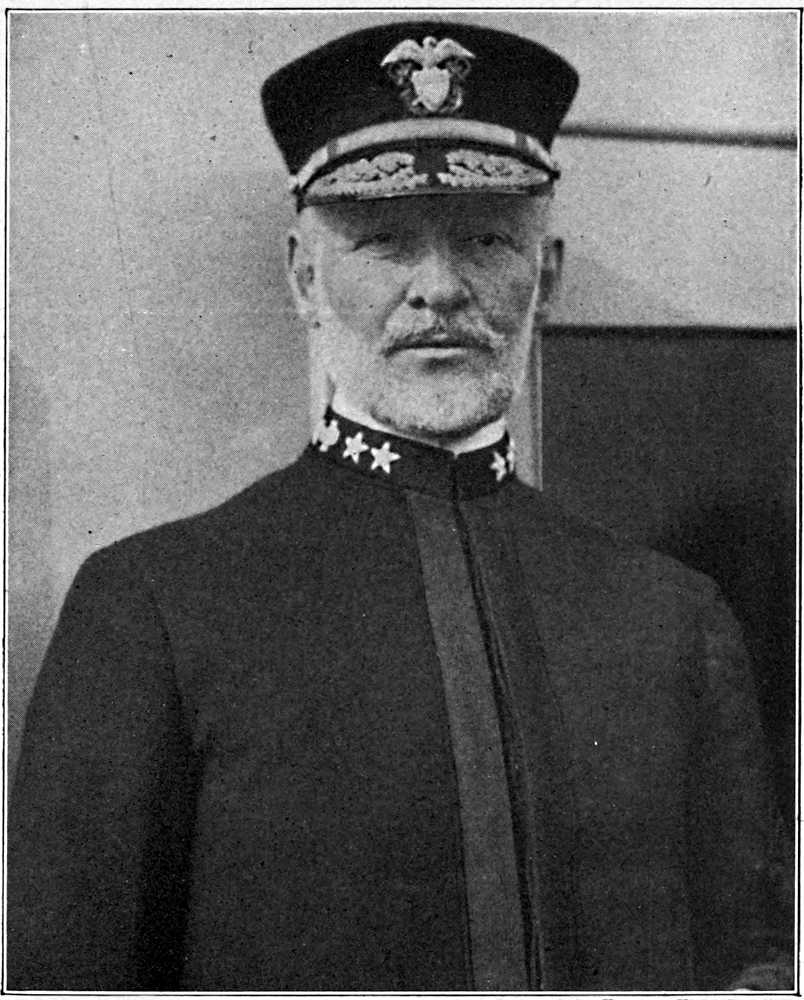
Copyright by Keystone View Co., N. Y.
ADMIRAL WILLIAM S. SIMS, COMMANDING THE U.S. NAVAL FORCES IN EUROPEAN WATERS
The yacht will always be tenanted with brave memories. And I am sure that to her owner and to Captain Porter, as long as she shall float, the Corsair will seem to have caught and held in the fabric of her somewhat of the spirit of those high-hearted young Americans who manned and sailed and fought her in the war zone. For a ship which has faithfully withstood the manifold ordeals of the sea becomes something more than a mere artifice [Pg 295]of wood and steel. She seems almost sentient, like a living thing to those who have shared her fortunes, and therein is the immemorial romance of blue water.
[7] Mileage for this month greater than any of the yachts or smaller destroyers.
[Pg 296]
In order to make the record complete, the following is a list of the enlisted personnel of the Corsair during her enrollment in the United States Navy. So many changes occurred from time to time that the roster includes almost three hundred names. Those marked with an asterisk (*) sailed for France in the original complement and remained on board until the armistice.
| Joined as: | Rating advanced to: | |
| Ashby, Corydon N. | Sea. 2c. | Q.M. 1c. (Ensign) |
| Anderson, Boyd J. | Appr. Sea. | S.C. 1c. |
| Auerbach, J. | Sea. | |
| Appleton, J. W. | F. 2c. | Sea. |
| Armstrong, Melvin L. | Shipwright | C.M. 3c. |
| Adair, W., Jr. | Sea. | |
| Arensburg, H. | Sea. 2c. | |
| Aguas, I. C. | F. 1c. | Eng. 2c. |
| Antle, A. A. | M.M. 2c. | |
| Allen, Raymond F. | Q.M. 1c. | |
| Best, Jesse G. | C.Ph.M. | |
| Bolyard, Berton | Cox. | |
| Browning, J. M. | C.Q.M. | |
| Bragg, Thomas W. | Sea. | |
| Booker, C. R. | Yeo. 2c. | |
| Brinkman, F. L. | Sea. 2c. | |
| Birmingham, Frank J. | Sea. 2c. | Sea. |
| Bailey, Early | Sea. 2c. | M.Att. 2c. |
| Barr, Dee F. | F. 3c. | F. 1c. |
| Banister, Charles | F. 3c. | H.A. 2c.[Pg 297] |
| Bennett, Austin O. | F. 1c. | M.M. 1c. |
| Bedford, H. H. | F. 1c. | |
| Black, Samuel | Sea. 2c. | Sea. |
| Benedict, Raymond D. | Sea. 2c. | Yeo. 2c. |
| Bradford, W. H. | F. 1c. | |
| Berg, O. J. | F. 2c. | F. 1c. |
| Bonsall, T. C. | Cox. | B.M. 2c. |
| *Benton, Edward M. | Sea. | C.Q.M. |
| *Brillowski, Anthony J. | F. 2c. | Eng. 1c. |
| *Barry, Henry A. | Sea. | C.C.S. |
| Bayne, Carroll S. | Sea. | Ensign |
| Byram, C. S. | F. 2c. | |
| Breckel, H. F. | Elec. 1c. R. | Ch. E.R. (Ensign) |
| Barko, A. W. | G.M. 3c. | G.M. 1c. |
| Balano, F. | Sea. | Cox. |
| Bischoff, H. J. | F. 2c. | F. 1c. |
| Conners, Martin | Sea. | |
| Crenshaw, Charles E. | Sea. | |
| Cutlip, H. | F. 3c. | |
| Choiniere, F. | C.C.M. | |
| *Copeland, A. T. | Sea. | Q.M. 1c. (Ensign) |
| Connolly, C. | Yeo. 3c. | Yeo. 2c. |
| Cramer, F. A. | M.M. 2c. | |
| Clark, Wm. McK. | M.Att. 3c. | |
| Corbett, D. C. | F. 3c. | F. 2c. |
| Caruso, James | F. 3C. | F. 1c. |
| Carroll, Ross | F. 3c. | S. 2c. |
| Crowther, S. F. | S.C. 2c. | |
| Carroll, James A. | F. 1c. | W.T. |
| Clayton, E. E. | Elec. 2c. R. | |
| Chapman, Wm. F. | F. 2c. | F. 1c. |
| Collins, Geo. R. | Sea. 2c. | Sea. |
| Chase, Vaughn E. | Sea. 2c. | Cox. |
| Cordt, J. W. | F. 3c. | F. 2c. |
| Clinch, T., Jr. | Elec. 2c. G. | |
| *Cure, Henry | S.C. 2c. | C.S. |
| Curtin, J. J. | F. 1c.[Pg 298] | |
| Carey, N. J. | Bugler | |
| Coffey, Arthur H. | Sea. | |
| *Carroll, Owen | W.T. | C.W.T. |
| Durham, Wm. H. | F. 2c. | |
| Dvorak, J. J. | Sea. 2c. | |
| Dykstra, Harry | F. 2c. | F. 1c. |
| Dodson, LaM. A. | Sea. 2c. | Sea. |
| Dames, E. E. | Sea. 2c. | |
| Duke, W. M., Jr. | Sea. | |
| David, I. E. | Elec. 3c. R. | Elec. 2c. R. |
| Davis, Raymond T. | C.C.M. | |
| *Donaldson, Stanley J. | Sea. 2c. | Elec. 2c. G. |
| De Amorsolo, V. | M.Att. 3c. | W.R. Cook |
| Ehrlich, Lester | Sea. | |
| Endicott, W. H. | Sea. 2c. | Sea. |
| *Emmons, L. Clarence | Sea. 2c. | G.M. 1c. |
| Evans, Wm. F., Jr. | Sea. | C.C.M. (Ensign) |
| Egan, L. C. | G.M. 3c. | G.M. 2c. |
| Foley, Wm. F. | Sea. | |
| Freeman, Aurie L. | Sea. | |
| Frezon, George | Sea. | |
| Fechter, John L. | S.C. 2c. | S.C. 1c. |
| *French, Leroy A. | Sea. | C.B.M. |
| Farr, F. Shelton | Q.M. 3c. | C.Q.M. |
| Fox, Harold J. | Sea. 2c. | Sea. |
| Fusco, N. D. | S.C. 3c. | S.C. 1c. |
| *Flynn, James | M.Att. 1c. | |
| Feeley, N. | M.Att. 1c. | P.M. 2c. |
| Garside, Geo. L. | S.C. 2c. | |
| Gunning, G. L. | Sea. | |
| Gabby, J. E. | Sea. 2c. | |
| Gaynor, L. J. | Sea. 2c. | Sea. |
| Goessling, Richard F. | Elec. 3c. | G. Elec. 1c. |
| Gibbons, John R. | Sea. 2c. | Sea. |
| Gould, Charles I. | Sea. 2c. | Cox. |
| *Gillett, Howard E. | F. 2c. | C.M.M. |
| Griffin, L. H. | F. 3c.[Pg 299] | |
| Gray, A. O. | Sea. 2c. | Sea. |
| Goring, H. D. | H/A. 1c. | P.M. 1c. |
| Gilhooley, J. P. | G.M. 3c. | G.M. 2c. |
| Graul, R. W. | F. 1c. | W.T. |
| Ganz, C. A. | M.M. 2c. | |
| Hawkins, Paul E. | Sea. | |
| Heidt, Clifford B. | F. 1c. | |
| Haun, Lloyd N. | Sea. | |
| Holdway, Dave | F. 1c. | |
| Horn, Irvin R. | C.Q.M. | |
| Howard, Frank L. | F. 2c. | |
| Hurley, John P. | F. 2c. | |
| Hyre, Raymond C. | Yeo. 2c. | |
| Haberthier, Alfred R. | F. 2c. | M.M. 2c. |
| Hensley, Raymond C. | F. 2c. | F. 1c. |
| Herne, J. G. | Elec. 3c. R. | (Ensign) |
| Huth, J. | F. 3c. | F. 2c. |
| Hulet, M. | Sea. 2c. | Sea. |
| Haase, H. E. | G.M. 3c. | G.M. 2c. |
| Hollis, F. J. | Sea. 2c. | Sea. |
| Houtz, E. L. | Sea. | B.M. 2c. (Ensign) |
| Hamilton, G. C. | B. Smith | |
| Haling, C. | W.T. | |
| Hill, F. C. | C.M. 3c. | |
| Hiss, S. W. | F. 1c. | Eng. 2c. |
| *Hanley, Joseph | M.Att. 1c. | W.R.Std. |
| *Heise, Wilner F. | F. 1c. | C.M.M. |
| Herrman, H. | Oiler | Eng. 1c. |
| Haley, Wm. W. | Sea. 2c. | Sea. |
| Jensen, Arthur C. | F. 1c. | |
| Jones, Charles H. | W. R. Strd. | |
| Johnson, E. E. | Sea. 2c. | Cox. |
| *Jones, Thomas W. | F. 1c. | M.M. 1c. |
| Jones, Cecil I. | F. 3c. | Eng. 1c. |
| Johnson, Jesse | M. Att. 3c. | |
| Jones, R. D. | Oiler | C.M.M. |
| Jetter, R. T. | Sea. | B.M. 2c.[Pg 300] |
| Kerr, George M. | Sea. | Q.M. 1c. |
| Kimbach, G. F. | F. 2c. | F. 1c. |
| Katushe, John F. | Sea. 2c. | Painter 3c. |
| *Kleine, Julius F. | Oiler | C.M.M. |
| Krause, F. | F. 3c. | F. 1c. |
| Kimball, Rollie W. | Sea. | |
| Keenan, A. E. | B. Maker. | |
| Kaetzel, H. D. | Sea. 2c. | Sea. |
| King, Albert | C.Yeo. | |
| Lally, T. | F. 2c. | |
| Lyles, John S. | F. 2c. | |
| Leal, R. | M.Att. 3c. | M.Att. 1c. |
| Loescher, H. A. | Elec. 2c. | G. C. Elec. G. |
| Leveritt, Albert B. | Sea. 2c. | Sea. |
| Lyle, Joel A. | G.M. 2c. | C.G.M. |
| *Luke, Edward E. | C.M.M. | |
| *Lindeburg, Frank R. | Sea. | B.M. 1c. |
| Loftus, John P. | C.B.M. | |
| Lewis, F. W. | Cox. | |
| Loefke, Wm. | Sea. | |
| Marando, Joseph | F. 2c. | W.T. |
| Mark, Felix | F. 2c. | F. 1c. |
| Miller, Fred R. | F. 3c. | F. 2c. |
| Melton, H. | F. 3c. | |
| Mask, Joseph E. | F. 3c. | F. 2c. |
| Morel, J. S. | Elec. 3c. G. | Elec. 2c. G. |
| Mullen, W. P. | Sea. | Cox. |
| Mariano, B. F. | Sea. 2c. | Sea. |
| Morse, E. N. | M.M. 2c. | M.M. 1c. |
| Moon, A. W. | Sea. 2c. | Sea. |
| Martin, O. F. | F. 1c. | W.T. |
| Martin, Gustave | Sea. 2c. | Eng. 2c. |
| Moore, W. C. | G.M. 2c. | C.G.M. |
| Martinez, M. | M.Att. 3c. | M.Att. 1c. |
| Marsh, A. J. | Sea. | Q.M. 3c. (Ensign) |
| Marsden, Christopher | Cox. | |
| Montaux, R. C. | Cox.[Pg 301] | |
| Mullins, T. | Q.M. 1c. | C.Q.M. |
| Mulcahy, W. W. | Cox. B.M. 1c. | |
| Murphy, W. F. | Sea. | |
| *Moore, James E. | Sea. 2c. | Q.M. 2c. |
| Miller, A. E. | Yeo. 2c. | C. Yeo. |
| Margot, John M. | Cox. | B.M. 1c. |
| Masur, Joseph J. | Sea. | |
| Mayers, Best A. | Sea. | |
| Mitchell, Jas. A. | C.M. 1c. | |
| Muckelroy, Marvin D. | S.C. 1c. | |
| McCarthy, James E. | F. 2c. | F. 1c. |
| McGlauflin, I. L. | Elec. 3c. R. | Elec. 2c. R. |
| McLellan, R. B. | B.M. 1c. | |
| Nicholson, Chas. M. | Sea. | |
| *Nardo, Stephen | M.Att. 1c. | |
| Nelson, George | F. 3c. | Sea. |
| Nolan, F. | M.Att. 2c. | M.Att. 1c. |
| Neal, Olin E. | Sea. | |
| Owens, Rea E. | Sea. | |
| Outwater, Henry | Sea. | Cox. |
| Phillips, E. | S.C. 2c. | |
| Pollert, L. W. | Elec. 3c. R. | |
| Poole, W. H. | Sea. 2c. | Sea. |
| Percy, J. H. | Cox. | B.M. 2c. |
| *Plummer, James A. | Elec. 2c. R. | C. Elec. R. |
| Ponder, Austin | F. 3c. | G.M. 2c. |
| Parson, James | F. 2c. | F. 1c. |
| Paulson, G. | C. Yeo. | |
| Prindle, E. B. | Q.M. 2c. | (Ensign) |
| Pease, A. E. | F. 1c. | Eng. 2c. |
| Phalen, H. R. | App. Sea. | Sea. 2c. |
| Padula, Jerry | M.Att. 3c. | |
| Rowley, Victor A. | S. 2c. | Sea. |
| Richardson, Roy M. | Sea. 2c. | Q.M. 3c. |
| Rubein, S. | F. 1c. | |
| Rahill, W. J. | Sea. | Q.M. 2c. (Ensign) |
| *Reynolds, Francis J. | Sea. | Cox.[Pg 302] |
| Robinson, F. M. | S.C. 4c. | S.C. 2c. |
| Redden, John R. | F. 3c. | F. 1c. |
| Rachor, J. | Cox. | C.B.M. |
| Reed, O. D. | C.Q.M. | |
| Reed, I. | C.E.R. | |
| Regent, A. A. | Sea. 2c. | Cox. |
| Robertson, C. A. | Oiler | |
| Redwitz, M. | Sea. 2c. | Sea. |
| Santiago, Isaac | M.Att. 1c. | |
| Schwind, Walter R. | C.M.M. | |
| Smith, Archie K. | Sea. 2c. | Sea. |
| Smith, Homer C. | Sea. | |
| Stokes, Charles W. | F. 1c. | |
| Stone, Wm. L. | Sea. | |
| Smith, J. | F. 1c. | W.T. |
| Smith, Augustus C., Jr. | Q.M. 2c. | Q.M. 1c. (Ensign) |
| Sweeney, M. J. | Sea. 2c. | |
| Schaefer, Henry | Sea. 2c. | Yeo. 2c. |
| Seward, G. H. | Sea. 2c. | |
| Spooner, F. H. | Sea. 2c. | Sea. |
| Smith, J. J. | Sea. 2c. | Sea. |
| Smith, Geo. A. | Sea. 2c. | Q.M. 3c. |
| Smith, Edward F. | Sea. | G.M. 2c. |
| Sill, L. E. | F. 3c. | S.C. 3c. |
| Saben, Cornelius W. | F. 3c. | F. 2c. |
| Sweaga, Thomas R. | Sea. 2c. | Sea. |
| Sorenson, Walter C. | Sea. 2c. | Sea. |
| *Sellers, Eugene H. | Sea. 2c. | Bugler |
| Sironen, V. V. | F. 2c. | F. 1c. |
| Stillwell, Austin E. | Sea. 2c. | Sea. |
| Strom, E. A. | F. 2c. | |
| Schlaepfer, Arnold J. | Sea. 2c. | Sea. |
| Samuelson, W. | Yeo. 3c. | |
| Seivert, C. A. | F. 3c. | F. 1c. |
| *Schlotfeldt, Hugh B. | F. 2c. | W.T. |
| *Swan, Meriam H. | Elec. 3c. R. | C. Elec. R. |
| Stephenson, H. | F. 1c.[Pg 303] | |
| Seger, Reginald G. | Sea. | B.M. 2c. (Ensign) |
| Smock, T. F. | Sea. 2c. | |
| Simpson, J. F. | G.M. 3c. | G.M. 2c. |
| *Sholander, Edward | Sea. 2c. | B.M. 2c. |
| Skolmowski, S. J. | Sea. 2c. | Sea. |
| Schmidt, H. L. | S.F. 2c. | S.F. 1c. |
| Sullivan, V. J. | F. 2c. | |
| Taylor, Thomas E. | Sea. | Cox. |
| Thorgerson, Paul W. | Sea. | |
| *Teuten, Walter W. | F. 1c. | Eng. 2c. |
| Templeton, Darrell C. | Q.M. 2c. | Q.M. 1c. |
| *Thysenius, Ernest E. | Cabin Strd. | |
| *Tepelman, L. W. | F. 1c. | W.T. |
| Tucker, R. | S.C. 3c. | S.C. 1c. |
| Tibbott, David W. | Sea. | Cox. (Ensign) |
| Underhill, P. W. | Sea. 2c. | Sea. |
| Vanvoran, Edward | M.M. 2c. | |
| *VanCamp, Louis R. | Sea. 2c. | G.M. 1c. |
| Van Vorst, E. C. | Yeo. 1c. | |
| Van Arsdale | F. 3c. | F. 1c. |
| Valyon, L. J. | Sea. 2c. | Sea. |
| Williams, Luther M. | Sea. | |
| Wright, Frank | F. 1c. | |
| Walter, F. | Sea. 2c. | B.M. 1c. |
| Whipple, Leslie A. | G.M. 3c. | |
| Whitteried, James E. | C. Yeo. | |
| *Washburn, Charles F. | Sea. 2c. | Cox. |
| Wilson, A. | W.T. | |
| Wolter, W. H. | F. 1c. | W.T. |
| Workman, G. J. | Sea. 2c. | Q.M. 3c. |
| Waters, L. | Sea. 2c. | Cox. |
| Woodward, H. E. | Sea. 2c. | Sea. |
| Welsh, John E. | F. 3c. | F. 1c. |
| Wyllie, A. A. | G.M. 1c. | C.G.M. |
| Waters, C. W. | Yeo. 2c. | |
| *Wheatcroft, Wm. A. | S.F. 2c. | M.M. 1c. |
| Wallace, E. | C.W.T. | |
| Wysocki, P. P. | Elec. 3c. | Elec. 2c. |
[Pg 304]
The Riverside Press
CAMBRIDGE . MASSACHUSETTS
U . S . A
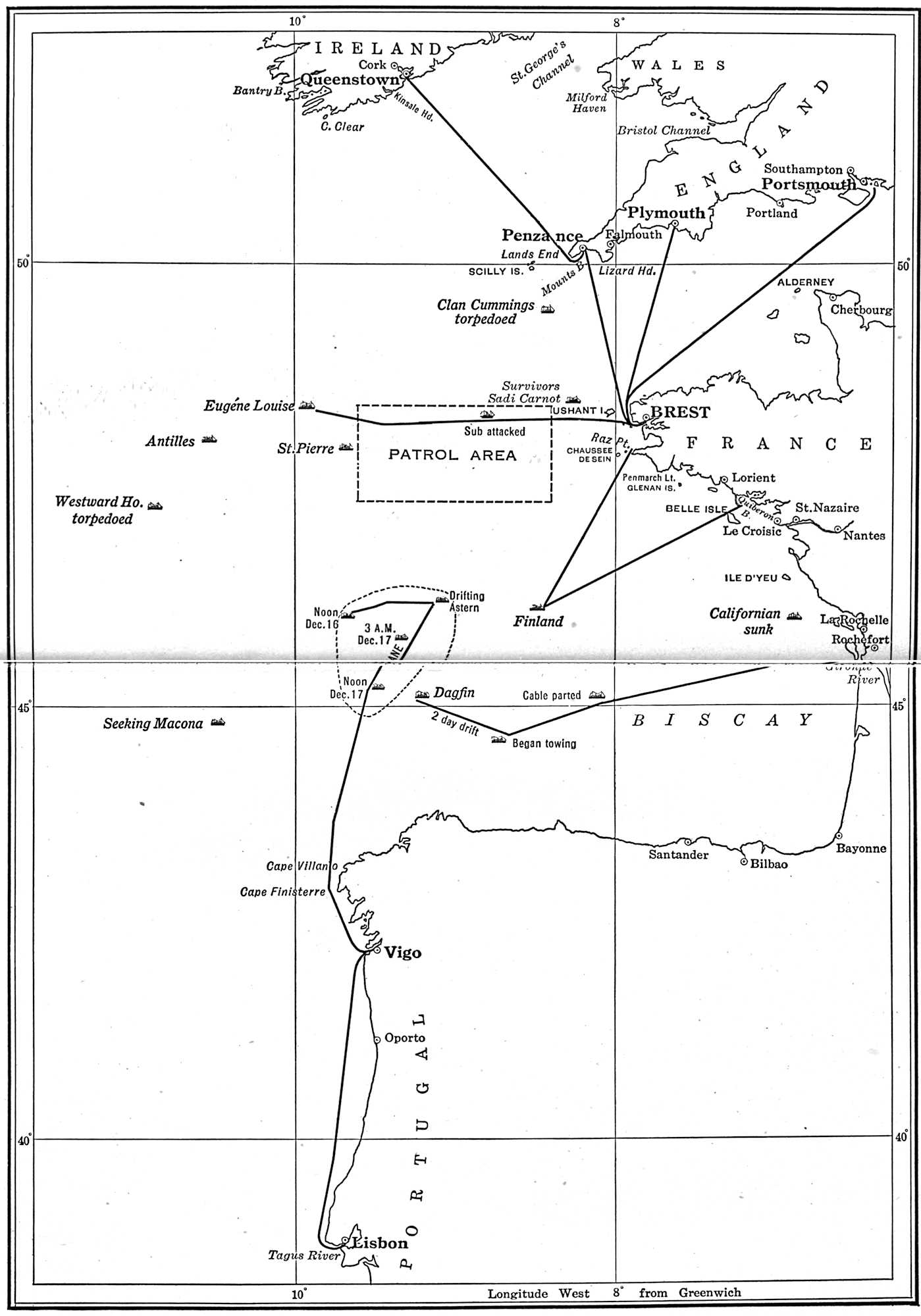
MAP SHOWING THE CORSAIR’S WANDERINGS IN THE WAR ZONE